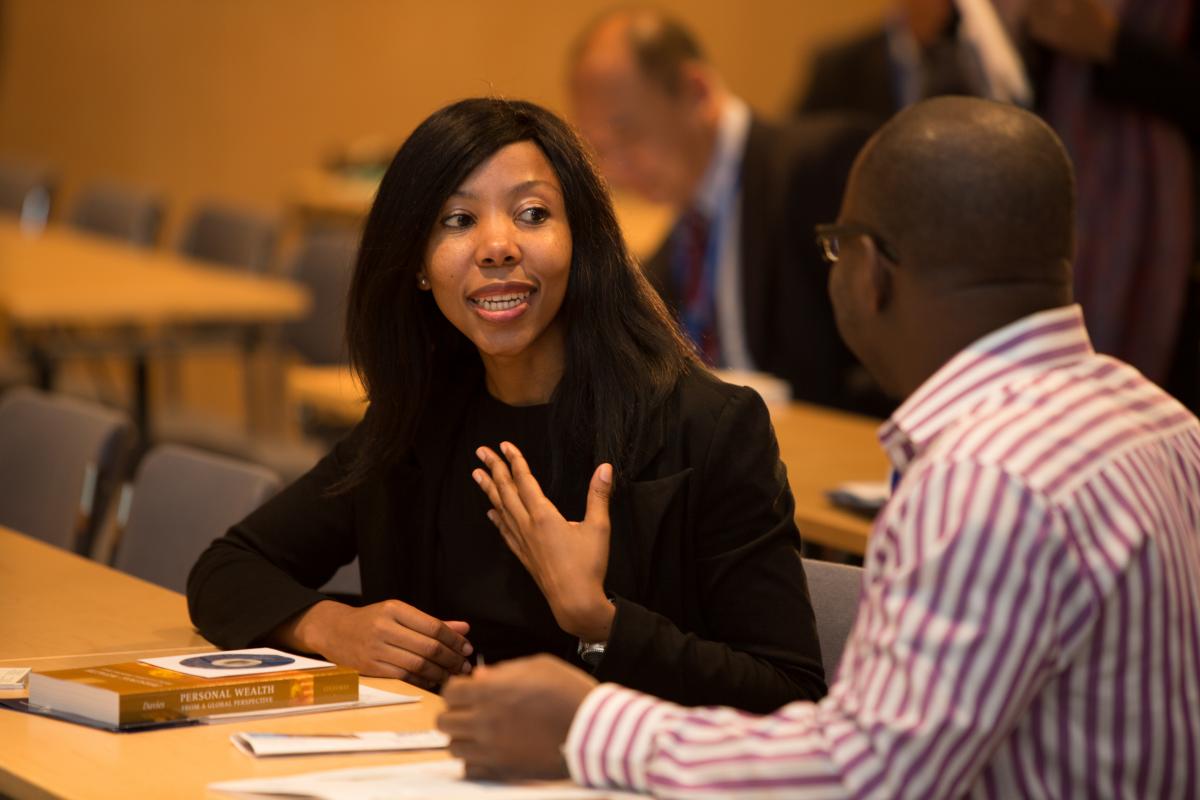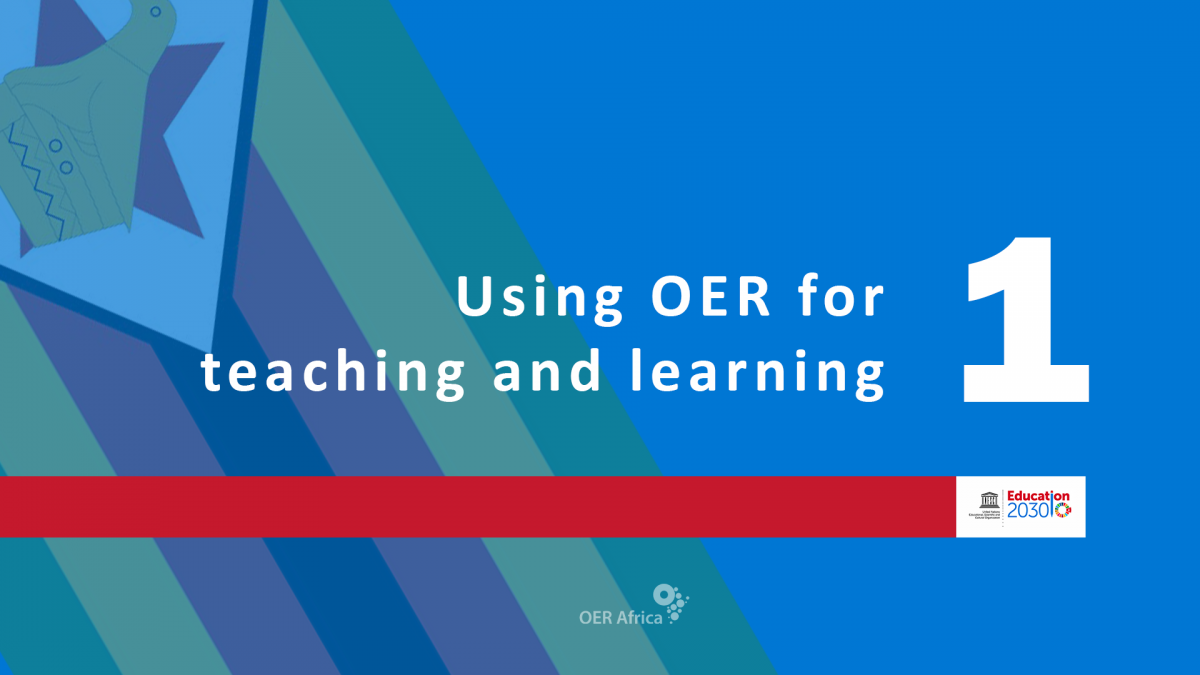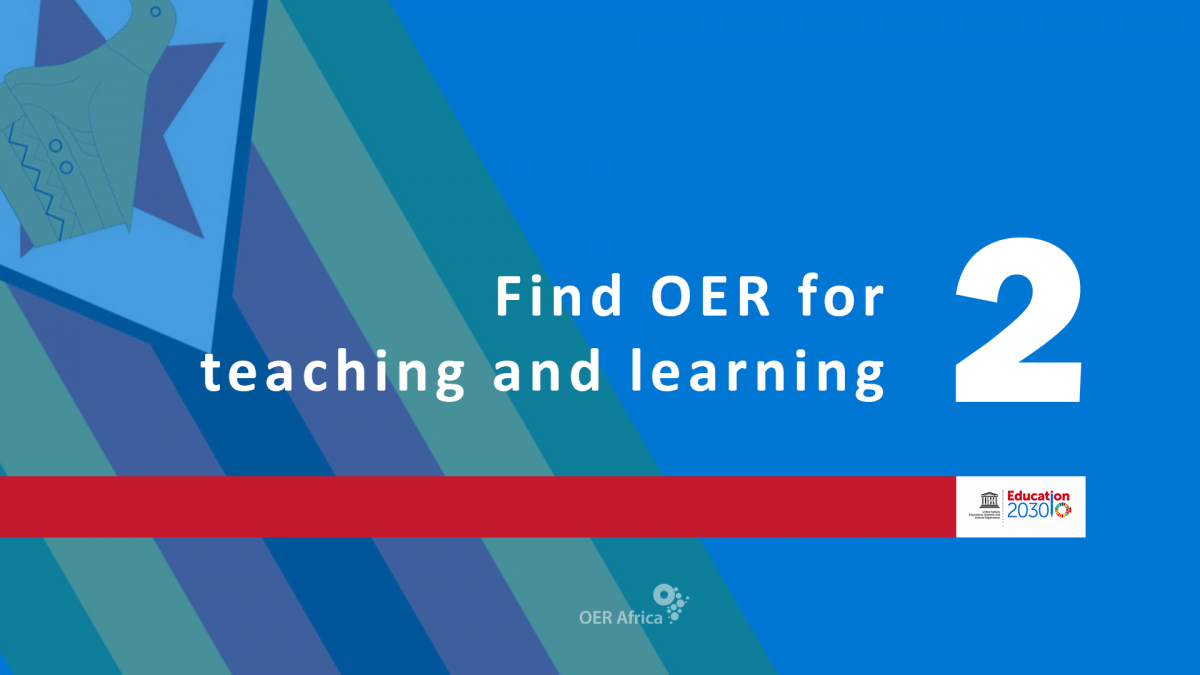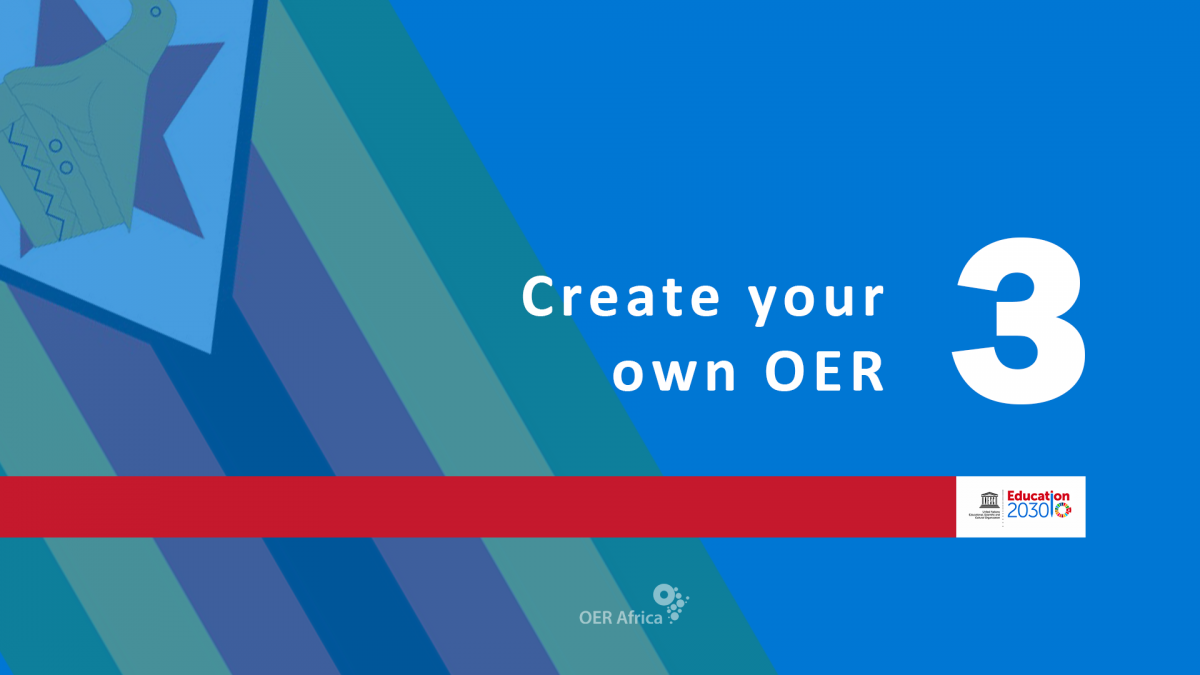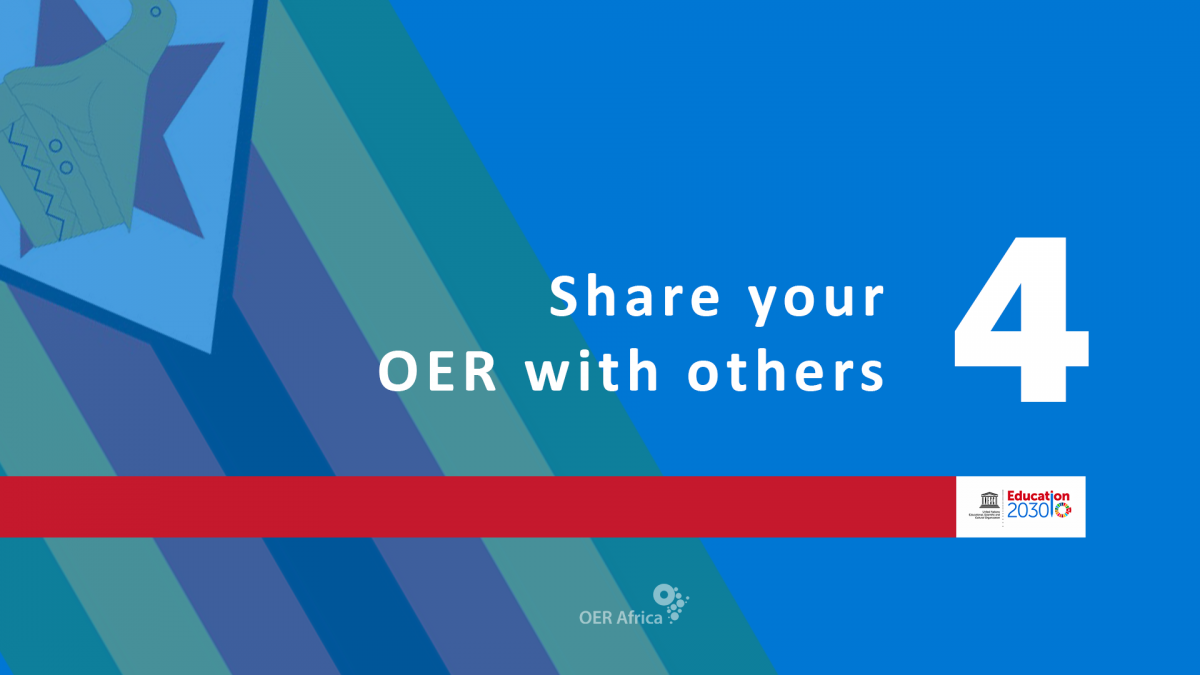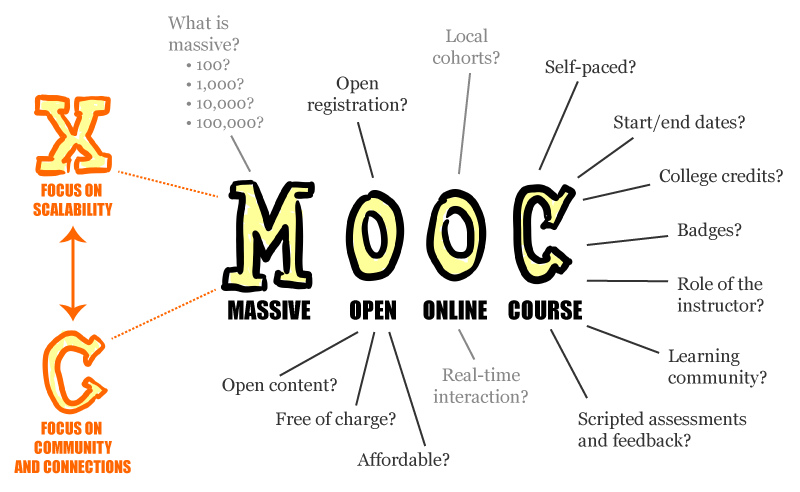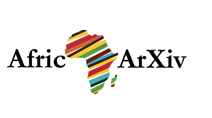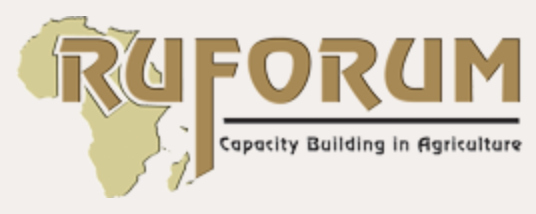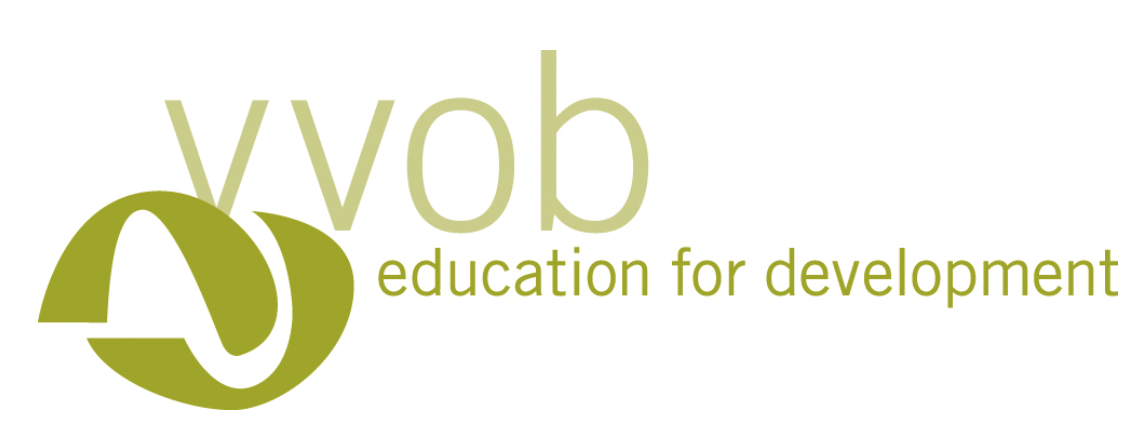What's Happening in OER in Africa
What's Happening in OER in Africa
This section provides latest updates to news and events relating to OER in African higher education and will include notices to new policies, research, events/conferences.
Displaying 1 - 107 of 107Academic librarians can be at the forefront of helping users wade through the hyperbole, challenges, and benefits of AI. They have always been considered ‘the gatekeepers’ of knowledge. They can also open the door to better understanding of new technologies and concepts.

Image courtesy of Hal Gatewood, Unsplash
Artificial Intelligence (AI) has assumed a leadership role in discussions about education. Neil Butcher’s blog on AI’s false promises in education lays out major issues and pinpoints the easy assumptions on AI’s importance to educational systems.[1]
Academic librarians can be at the forefront of helping users wade through the hyperbole, challenges, and benefits of AI. They have always been considered ‘the gatekeepers’ of knowledge. They can also open the door to better understanding of new technologies and concepts.
African libraries have been trailblazers in adopting technology. In the 1990s, librarians in countries like Malawi, Ghana, and Nigeria were responsible for email in their institutions and countries. In those days, there was no viable Internet, and email was based on store and forward messaging. Emails would be stored on a computer system and then forwarded to the organization responsible for distributing them.[2]
Christine Kisiedu, then university librarian of the University of Ghana wrote:[3]
"It is often said that once ICT [Information and Communications Technology] development gets underway, it is unstoppable. This was certainly the case in Ghana. When a workshop on Electronic Networking for West African Universities (sponsored by the Association of African Universities and the American Association for the Advancement of Science) took place in Accra in December 1993, Ghana was not counted among the Internet savvy countries of the sub-region. Two years later, in 1995, a nationwide store-and-forward e-mail system had been established, and the first professional ISP in Ghana appeared on the scene and introduced Internet access to an interested but cautious Ghanaian public. In another year, development and patronage had reached such a level that Ghana could be said to be on the verge of an Internet explosion! Yet coming to grips with the new technology was not without its ups and downs.
…Learning to use the system proved more difficult than anticipated. I had just completed my second year as University Librarian at the Balme Library when we acquired e-mail…Nobody on the library staff had a clue as to how to operate this technology, much less how it worked. I submitted myself to a brief half hour’s explanatory session, which I must now publicly admit went in one ear and out the other. The consultant took too much for granted!"
Artificial Intelligence (AI) is the latest and trending ICT development, and again academic libraries are playing a leadership role.[4] The librarian of Northwestern University in the United States curates a page on the library platform on Using AI Tools in Your Research.[5] Other universities have done the same. A Google search for ‘library guides AI’ pulled up scores of university libraries offering AI guidance:

In a recent blog post on AI and educational technology, referred to above, Neil Butcher pointed to the disparities between what we know about AI and its impact on education. He emphasized that international groups like UNESCO are promoting AI’s success with little evidence to go on. Butcher wrote:[6]
"ChatGPT was only launched in November, 2022 but, by 2021, UNESCO had already launched a full publication entitled AI and Education that provides guidance to policy-makers. It seems a remarkable achievement that the world’s largest educational intergovernmental organization already felt confident enough in its understanding of the educational use of technologies about which we know so little and whose potential wider social impact is so little understood to offer unequivocal policy guidance on their use to governments. Having worked in educational policy for many years, my instinct is that it will be several years before we know enough about these issues to be clear about the policy implications."
The African Library and Information Associations and Institutions (AfLIA) and OER Africa decided to ask African academic librarians about their experiences and thoughts on AI. Nkem Osuigwe, AfLIA Director of Human Capacity Development and Training, put out a call on the AfLIA-OER Africa WhatsApp group. She wrote:[7]
"Have you ever noticed how technology seems to throw up opinions about the relevance of libraries?. Remember when the Internet went mainstream, and there were all sorts of permutations about the survival of libraries? Many asked if the Internet would replace libraries. When artificial intelligence became the new buzz concept, quite a number of librarians jumped in to talk about robots and what they can be used for in libraries.
Now, generative AI is the new rave. Young and old can do research on AI platforms, and within seconds, 'everything' is delivered, including references. Generative AI is creating art, writing essays, poems, short stories, drama, newspaper articles, and even social media posts.
Who needs libraries now, one may ask!. The verdict is not in yet. However, in Africa, we want to begin to tell our stories by ourselves about how libraries could use this technology so that we can 'own' the narrative about the tool.
• what impediments do we foresee in the advancement of AI?
• Can information literacy modules/classes and/or Use of Library courses introduce our users to 'ethical' AI?
• Can librarians assist in detecting when people are attributed for work by generative AI?
• Copyright and licensing issues are bound to crop up with the continued use of AI. Can African librarians help on creating awareness about this?
Generally, we’d love to hear about our interactions with AI as African librarian."
Librarian responses have been numerous and interesting. They are still coming in. Below are some examples of experiences reported:
The University of Ghana has revised its plagiarism policy to include use of AI:[8]
"Any employment of AI or associated technologies that compromises the authenticity of academic output will be deemed unacceptable,’ the document stated.
The University stresses originality in scholarly work, addressing AI's role in academic integrity.
The policy update underscores a commitment to ethical academic practices, leveraging technology while upholding original thought."
Researchers from the global South are accused of using AI if the language of their research papers and proposals use uncommon words like ‘delve’. One participant commented on vocabulary and AI:
"There was an uproar last week on Twitter. An American funder got a good project proposal, but ditched it because he saw the word 'delve' and thought the proposal was AI generated, because he doesn't write using these fancy words; only machines do.
Apparently, some words are already been termed AI generated words, and so AI detectors would look for such words and flag.
What happens when we use these words frequently in our write ups?"
The tweeter was Paul Graham, co-founder of Y-Combinator and this is what he wrote:[9]
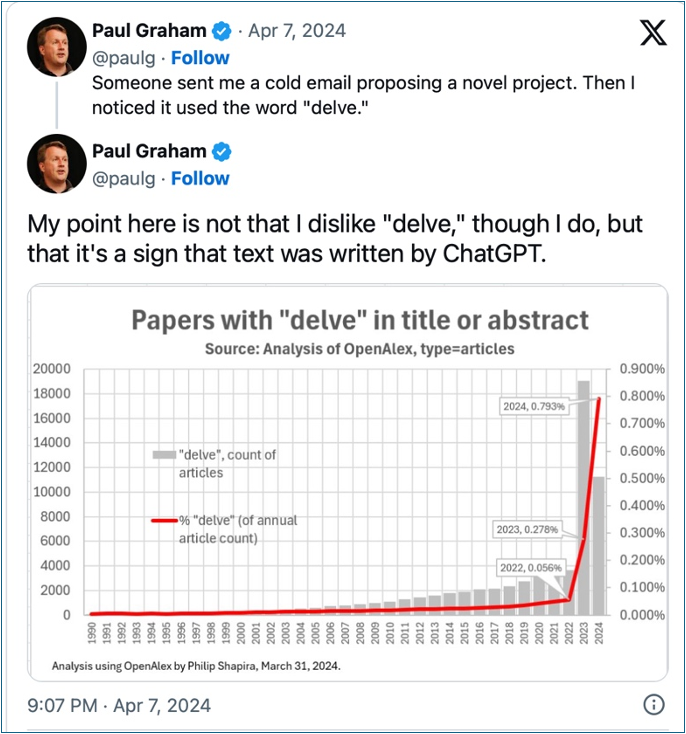
Graham’s post has been widely controversial, with many researchers responding that they use these types of vocabularies. For many people for whom English is a second language or who normally use an extensive vocabulary, words like ‘delve’ are a part of their writing and not AI generated.
Another participant noted:
"Africans, mostly Nigerians, jumped on the Twitter (now X) thread to point out that we write that way. I actually do. It appears that AI is yet to learn the difference between English spoken or written as a first language and how those who got it as a second language communicate with it.
It is functional prejudice that has been taken on by AI. What do I mean? If you play word games online, especially those created by those who have English as their 1st language, you would be amazed at the words that pop up as correct options. This supposition is still being tested, though, but Africans use more of 'official' and 'bogus' words more than the owners of the language. AI may have picked up that trait from the owners of the language."
In general librarians agreed that neither Internet nor AI can replace the library and used Nile University in Egypt as an example:
"If the Internet could not replace libraries, I don't see how AI could take the place of a library. Remember, we provide many services, and for now, I have seen scholars use AI Mostly for research purposes. Any good researcher should know that in conducting research, you cannot depend on AI tools alone; you have to consult other information resources. Just like what Nile University library is undergoing, librarians should see the coming of AI to our advantage and introduce newer services such as information literacy, how to detect plagiarism, and ethical issues among others."
More broadly and beyond AI, libraries play an essential role for all members of the academic community:
"Libraries need to consider transforming their spaces in research and learning Commons. The trend is catching on fast as some libraries also have worker and creator spaces. The client should feel as though they are in a one-stop shop where they can learn something and transform it into a prototype or sample product. Not only can we help job seekers, but we can hold meetings with guest authors. We can, if funds permit, partner a publisher to bring an author’s work to life in the library. My personal concern is the lack of partnerships and the slow evolution in our library spaces and the lack of recognition for those who spark creativity. I miss the time many people would speak about a book or library inspiring them. The voices are few, and a new crop that rejects the education system (inclusive of the library) is getting popular. Save for the places with a strong reading culture and push for education."
The WhatsApp AI discussions were informative and spanned the breadth of existing and possible interactions with their constituencies. AfLIA has made recommendations for libraries that want to engage more fully with their university communities on this topic:
Lack of knowledge about technology creates unfounded trepidation. AfLIA encourages African librarians to view AI as a tool for discovering more knowledge and reference sources for their user communities. Generative AI is a Large Language Model that is trained using large mostly open datasets. Viewing it through this prism will give librarians the understanding that generative AI recycles and collates already existing knowledge. That is an area in which librarians excel! African librarians have another advantage—the datasets AI uses do not include sufficient African source material, AI source materials therefore underrepresent African knowledge. Academic librarians understand the importance of appropriately indexing content, which is essential when considering datasets. African academic libraries and other institutions, such as archives, contain source material coming from Africa—both original sources and research content about African knowledge.
Innovation in information access is unstoppable. It is imperative that academic librarians adopt an open and adaptive attitude toward new developments. AI, including generative AI, just as any other tool or resource, has its limitations. But being apprehensive and unreceptive towards AI, probably with the intention of gatekeeping ‘a profession under threat’, is not sustainable – a lesson history has taught us time and again. In fact, that mindset numbs the innovative capacity of librarians and institutions to adapt and provide valued services to fill the gaps developed because of the limitations of generative AI. We must embrace it as an opportunity to evolve and better serve our patrons.
The time has come for African academic librarians to deepen engagement and collaboration across universities, both locally and internationally. The challenges faced by the profession can no longer be considered local, hence operating in silos is not viable. Through collaboration, we can collectively debate, brainstorm, exchange best practices, and share insights on what actions or decisions are being taken by academic institutions to address pressing issues like academic ethics, plagiarism, originality of thought, copyright, misinformation, disinformation etc. that have resurfaced, following the birth of AI resources like ChatGPT and Gemini.
The application of information ethics principles is important while engaging with generative AI. African librarians can lead the way in teaching and inculcating ethical skills in the use of generative AI through information literacy skills or use of library tutorials. The Wikipedia article on ethics and AI outlines key points of intersection:[10]
"The ethics of artificial intelligence covers a broad range of topics within the field that are considered to have particular ethical stakes. This includes algorithmic biases, fairness, automated decision-making, accountability, privacy, and regulation ."
AfLIA strongly encourages African librarians to understand and promote Openness as an avenue for making datasets available for training generative AI. In an article on AI and data, published by European Data, the authors make a number of points about the relationship between AI and data, including:[11]
"Open data and AI have the potential to support and enhance each other’s capabilities. On the one hand, open data can improve AI systems. In general, exposing AI systems to a larger volume and variety of data increases the chance of the system returning accurate and useful predictions. As such, open data can be a supply of large amounts of diverse information for AI systems. In this way, the availability of open data contributes to better performing AI."
If African librarians are to play a role in discussions about data, openness, and AI, they must understand the importance of data. The AfLIA collaboration with Wikimedia on data short courses[12] is important. But this work must delve more deeply into the significance of these relationships.
Library and information institutions may not directly dictate the data utilized in training various generative AI models to ensure a balanced perspective on African knowledge. However, it is vital for stakeholders to intensify advocacy so that African researchers, educators, librarians, and authors in general can embrace openness. Making African knowledge more accessible through open research, open data, and open educational resources can improve the availability of diverse and representative data used to train AI models.
Related articles:
- Artificial Intelligence and the Underrepresentation of African Languages
- Three Ways Artificial Intelligence Could Change How We Use Open Educational Resources
- Opening Education: What Role Do Librarians on the African Continent Play?
[1] Neil Butcher, False Promises about ‘AI’ in Education. 19 April 2024. https://www.nba.co.za/encounters/blog/false-promises-about-ai-education
[2] See Wikipedia on store and forward messaging. https://en.wikipedia.org/wiki/Store_and_forward - :~:text=Store and forward is a,or to another intermediate station.
[3] [3] Christine Kisiedu’s story featured in Rowing Upstream: Stories of the Information Age in Ghana published with Ford Foundation funding in 2002. It is available on the Wayback machine. Go to https://web.archive.org/web/20031220201222/http://www.piac.org/rowing_upstream/chapter7/ch7bringing.html for Christine’s recounting of email introduction into the University of Ghana.
[4] Go to AI, the Next Chapter for College Librarians by Lauren Coffee in Inside Higher Ed, November 3, 2023, https://www.insidehighered.com/news/tech-innovation/libraries/2023/11/03/ai-marks-next-chapter-college-librarians
[6] False promises about ‘AI’ in education, Neil Butcher, April 19, 2024, https://www.nba.co.za/encounters/blog/false-promises-about-ai-education
[7] Nkem Osuigwe, AfLIA-OER Africa Training WhatsApp group
[8] University of Ghana revises its plagiarism policy to clamp down on AI usage in academic work. Jemima Okang Addae. February 26, 2024. Graphic Online. https://www.graphic.com.gh/news/general-news/university-of-ghana-revises-its-plagiarism-policy.html - :~:text=The updated policy notably includes,unacceptable,’ the document stated
[9] Ana Altchek, Y Combinator cofounder Paul Graham says seeing this word in an email pitch is a sign it was written by ChatGPT, Business Insider. April 10, 2024. https://www.businessinsider.com/y-combinator-paul-graham-delve-ai-chatgpt-giveaway-email-pitch-2024-4
[10] Ethics of Artificial Intelligence, Wikipedia, https://en.wikipedia.org/wiki/Ethics_of_artificial_intelligence - :~:text=The ethics of artificial intelligence covers a broad range of,accountability, privacy, and regulation.
[11] Open data and AI: A symbiotic relationship for progress. European Data. June 9, 2023. https://data.europa.eu/en/publications/datastories/open-data-and-ai-symbiotic-relationship-progress
[12] Wikidata short course, https://web.aflia.net/aflia-wikidata-online-course-registration-now-open/
Following the adoption of the OER Recommendation in 2019, UNESCO initiated a programme to support governments and educational institutions in implementing it.
One aspect of this programme was the development of a series of five guidelines to inform implementation of each Action Area in the Recommendation.
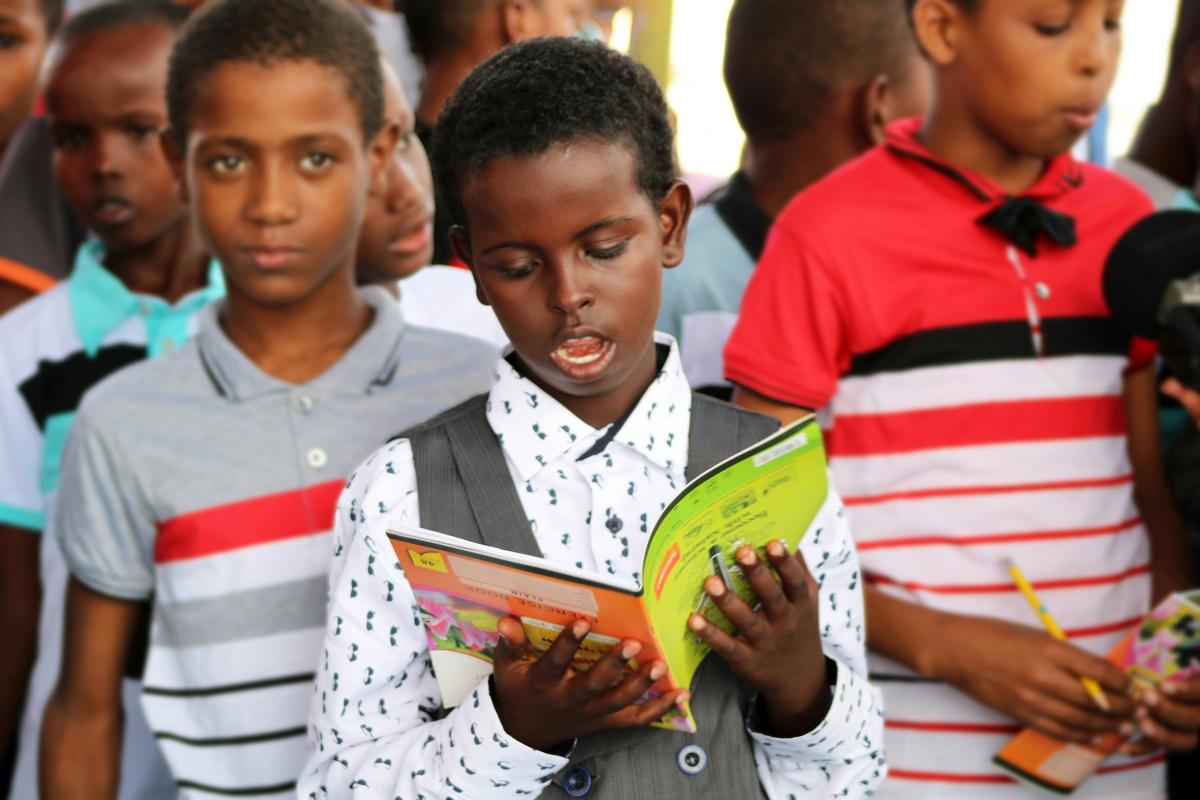
Image courtesy of Ismail Salad Osman Hajji dirir, Unsplash
As the digital age continues to reshape the global educational landscape in fundamental ways, the need for governments and educational institutions to champion Open Educational Resources (OER) has never been more relevant. Freely accessible, openly licensed educational content can help tackle some of the most pressing needs in education systems, including equity, access, and quality.
Following the adoption of the UNESCO Recommendation on OER at the 40th UNESCO General Conference in Paris on 25th November 2019, UNESCO initiated a programme to support governments and educational institutions in implementing the Recommendation.
One such action was the development of a series of five guidelines for governments. These guidelines were developed through a comprehensive consultative process and in cooperation with OER experts worldwide. They draw heavily on in-depth background papers prepared by OER experts from around the world in each of the five Action Areas of the OER Recommendation: Prof. Melinda dP. Bandalaria (building the capacity of stakeholders to create, access, re-use, adapt and redistribute OER); Dr Javiera Atenas (developing supportive policy); Dr Ahmed Tlili (encouraging inclusive and equitable quality OER); Dr Tel Amiel (nurturing the creation of sustainability models for OER), and Ms Lisbeth Levey (facilitating international cooperation).
OER Africa has provided logistical and editorial assistance to UNESCO on this work as part of a formal cooperation agreement with UNESCO to provide support in implementation of the OER Recommendation.
Aimed at governments and educational institutions, each set of guidelines has the following structure:
- An overview of recommendations in the Action Area;
- An introduction to the main issues surrounding the Action Area;
- A matrix of possible actions recommended for governments and institutions to implement each point in the Action Area;
- An in-depth discussion of the key issues surrounding the Action Area; and
- Examples of good practice.
By actively supporting and implementing the OER Recommendation, governments and educational institutions can not only make high quality education more accessible but can also promote transformation in their education systems. This commitment to OER is essential for building resilient, adaptable education systems that can meet the demands of a rapidly changing world.
Related articles
With the ever-increasing costs of textbooks, how can university students get access to the resources they need to study? This article examines the benefits of using open textbooks in the Global South.
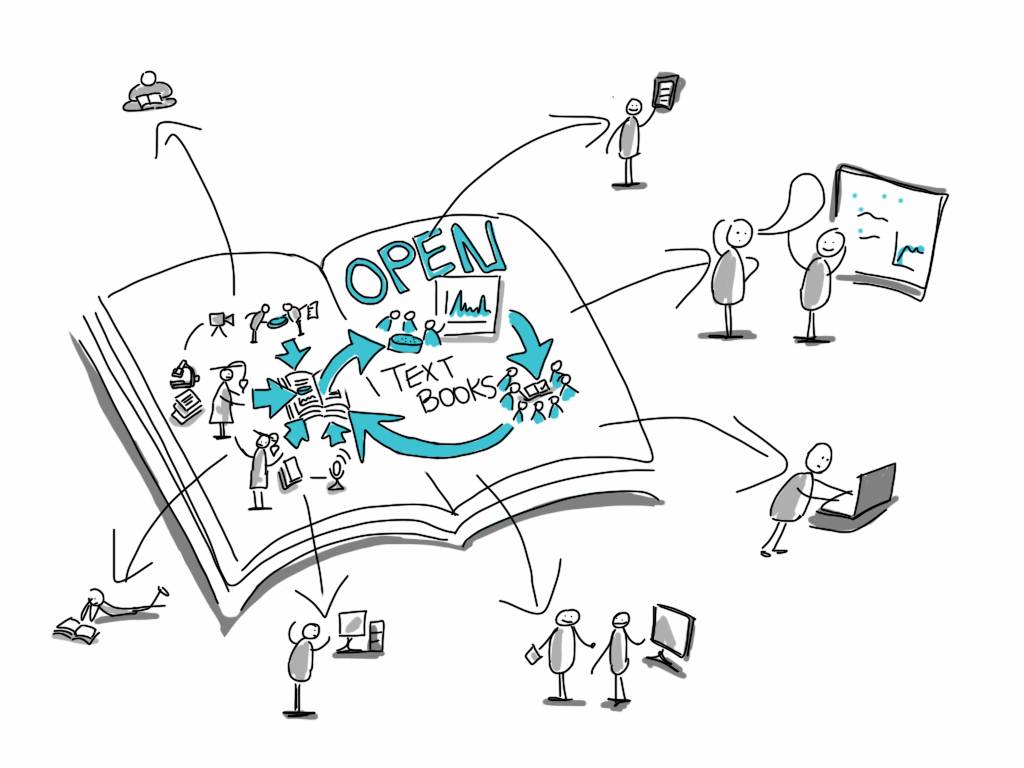
Image: CC0 (Public domain)
With the ever-increasing costs of textbooks, how can university students get access to the resources they need to study?
Worldwide, university students find it difficult to purchase textbooks for their courses as they are too expensive. Already in 2014 in South Africa[1], and in 2011 in the United States[2], there were reports that students didn’t buy textbooks due to expense. The situation has not improved in recent years; for example, in a study of nearly fifty thousand respondents in South African universities, nearly two thirds indicated that they spent between R500 and R2500 on textbooks, and while 87% of students’ first semester modules had prescribed textbooks, 27% of students did not buy any prescribed books in the first semester of 2020. Students were opting not to purchase textbooks either because of a lack of affordability, because they did not find them contextually relevant, or because a course would only use a small portion of the textbook. [3]
Open textbooks can be regarded as a subset of Open Educational Resources (OER). They are digital textbooks published under an open licence, which means that they are freely downloadable and adaptable to suit a range of contexts (as long as the licence permits adaptation). The right to adapt is particularly important for educators who may want to tailor the textbook to their specific curriculum. An open textbook can be published with different Creative Commons licences,[4] depending on how open or restrictive the author wishes the licence to be. The principal advantages of an open textbook are its accessibility and affordability to the students, as long as they have a digital device, or have access to print at low or no cost. However, open textbooks have other advantages as well. These include:[5]
- Local Contexts: Open textbooks can be regularly updated, and tailored to suit the local context, providing cultural relevance and addressing specific needs of students.
- Partial Use: In some courses, only a portion of the overall textbook content is relevant. Students may hesitate to purchase an expensive textbook when they will only use a few chapters. In contrast, open textbooks allow educators to select and integrate specific sections, reducing unnecessary costs.
- Collective Authorship: Open textbooks encourage collaborative authorship strategies. Locally produced open textbooks can involve input from multiple experts, resulting in richer and more contextually relevant content with diverse perspectives.
- Flexibility: Open textbooks can be accessed in different formats and stored digitally, so that they are easy to share and adapt.
Of course, open textbooks also have some disadvantages, namely:
- Availability: We provide examples of open textbook repositories below, but educators may find that there is limited selection for certain subjects or specialised topics.
- Quality: There may be inconsistencies in writing style, accuracy, and depth of content but these can be easily mitigated by evaluating the textbooks prior to use, as should be done for all resources to be used, including commercial textbooks.
- Author incentives: Authors of traditional textbooks normally receive royalties from publishers as their books are sold. The open licence by which open textbooks are released means that other forms of incentive may be needed, for example in the form of grants, that may not be sufficiently enticing for many potential authors.
Research on open textbooks
Most research has been carried out in the Global North. For example, a meta-analysis of 22 studies of 100,012 students found that there were no differences between open and commercial textbooks for learning performance.[6] A research study Adoption and impact of OER in the Global South[7] had similar findings, with open textbooks being more effective that traditional ones in several instances. However, the studies reported that careful pedagogical scaffolding, including a mix of OER, produced the most effective learning. Within Africa, research findings from the Digital Open Textbooks for Development (DOT4D) Project[8] found that open textbooks addressed economic, cultural, and political injustices faced by their students, issues not considered by traditional textbooks. Summarising the research overall, we can say that open textbooks have several advantages over traditional ones, as listed above, and in terms of learning, they are equivalent.
Examples of African institutions who have benefited from using open textbooks
Probably the best example of collaborative development of open textbooks is the University of Cape Town’s DOT4D Project. If you want to learn about the experiences of their staff and students, read UCT Open Textbook Journeyswhich documents the stories of 11 academics at the University who embarked on open textbook development initiatives to provide their students more accessible and locally relevant learning materials.
Other African universities’ libraries list sites where open textbooks and other OER are available, usually from outside the continent. Finding open textbooks for your own institution is not always easy. Here we list three sites where you can search for open textbooks. Bear in mind that, if you choose an American or European textbook, you may need to spend time adapting it for your own context.
University of Cape Town Catalogue
26 textbook titles ranging from medical texts, through sustainable development to marketing, but also many other titles on OpenUCT.
Based at the University of Minnesota in the United States, this repository has 1,403 titles. The view shown here groups the titles by subject.
This LibGuide lists 17 platforms where you can search for open access textbooks and other free books.
Resources on developing and using open textbooks
Below is a list of resources to help you explore this growing field. The first three assist you to develop an open textbook, while the last two guide you to adopt or modify an existing open textbook.
- Commonwealth of Learning Guide to Developing Open Textbooks
- Open Education Network: Authoring Open Textbooks
- Rebus Community: A guide to making open textbooks with students
- BC Campus: Steps to Adopting an Open Textbook
- Open Education Network: Modifying an Open Textbook: What You Need to Know
Finally, although they are not designed for higher education, the open textbooks developed by Siyavula for high school mathematics, technology, and sciences may be useful for colleges and access courses in universities.
In summary, there are considerable benefits to using open textbooks, but with a few exceptions, African institutions have not yet taken on the challenge of producing open textbooks themselves. Clearly, funding is required for the development of open textbooks, and institutions might consider making funding applications to create (or adapt) these highly useful open education resources for the benefit of more African students.
Related resources:
- Researching OER initiatives in African higher education
- The Revised Open Knowledge Primer for African Universities
- Self-Publishing Guide: BC Open Textbook
Access the OER Africa communications archive here
[1] Nkosi, B. (2014). Students hurt by pricey textbooks. Mail & Guardian. Retrieved from https://mg.co.za/article/2014-10-03-students-hurt-by-pricey-textbooks/
[2] Redden, M. (2011). 7 in 10 Students Have Skipped Buying a Textbook Because of Its Cost, Survey Finds. The Chronicle of Higher Education. Retrieved from https://www.chronicle.com/article/7-in-10-students-have-skipped-buying-a-textbook-because-of-its-cost-survey-finds/
[3] Department of Higher Education. (2020). Students’ Access to and use of Learning Materials—Survey Report 2020. Retrieved from https://www.usaf.ac.za/wp-content/uploads/2021/02/DHET_SAULM-Report-2020.pdf
[4] See https://creativecommons.org/share-your-work/cclicenses/#:~:text=Creative%20Commons%20licenses%20give%20everyone,creative%20work%20under%20copyright%20law.
[5] Digital Open Textbooks for Development. (2021). ‘Open Textbooks in South African Higher Education’ Roundtable Report. University of Cape Town. Retrieved from https://open.uct.ac.za/server/api/core/bitstreams/3a7e1a09-0617-4ba4-b6dd-4572bd870d60/content
[6] Clinton, V. and Khan, S. (July 2019). ‘Efficacy of Open Textbook Adoption on Learning Performance and Course Withdrawal Rates: A Meta-Analysis’ AERA Open. 5 (3): 233285841987221. doi:10.1177/2332858419872212. ISSN 2332-8584.
[7] Hodgkinson-Williams, C. & Arinto, P. B. (2017). ‘Adoption and impact of OER in the Global South’. Cape Town & Ottawa: African Minds, International Development Research Centre & Research on Open Educational Resources. DOI: 10.5281/zenodo.1005330
OER Africa is honoured to have contributed two chapters to the recently published book ‘Does Distance Education in the Developing Context Need More Research? Building Practice into Theory’. Edited by Dr Folake Ruth Aluko and Prof. Daniella Coetzee, the book explores the reciprocal relationship between theory and practice in distance education.
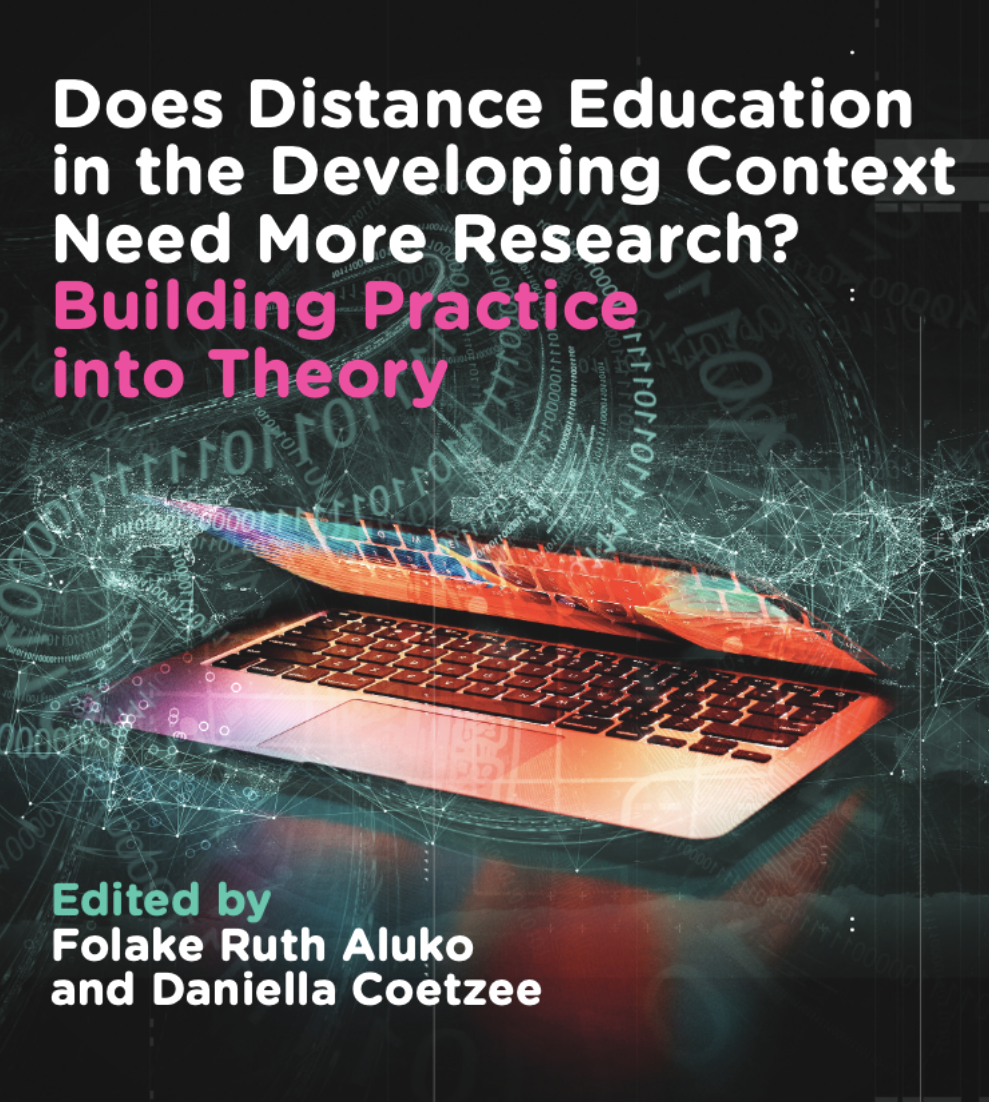
Research can have a transformative impact on any field, and distance education is no exception. It can, for example, contribute to more effective use of new educational strategies, provide insights into technological advancements, and contribute to our understanding of the key successes and challenges in distance education delivery.
While the concept of distance education dates back more than a century, research in this area is relatively nascent when compared to the development of educational research in general.[1] The body of literature on the practice, influence, and impact of distance education is therefore limited, and even more so when considering developing world contexts. This, combined with the fact that distance education is experiencing significant shifts in terms of new demands and evolving technologies that provide new potential and pitfalls alike, mean that the recently published book Does Distance Education in the Developing Context Need More Research? Building Practice into Theory is a critical addition to the distance education research literature.
The book explores the reciprocal relationship between theory and practice in distance education, and OER Africa is honoured to have contributed two chapters to it. Edited by Dr Folake Ruth Aluko and Prof. Daniella Coetzee, the book is divided into two volumes which explore various themes:
Volume 1 focusses on the history, approaches and paradigms in distance education; building frameworks in distance education research; and praxis in this area.
Volume 2 moves on to address regional trends and gaps in distance education research; scholarship in this area; and quality assurance.
The two chapters that we contributed focus on the intersection of distance education and catalysing open education praxis, with each chapter approaching this intersection from a different angle. Each is outlined below.
The COVID-19 pandemic brought the importance of professional development on effective teaching and learning for university academics into sharp relief. Universities found themselves having to close their campuses and were unable to teach their students face-to-face. Universities in Africa resorted to various strategies to reach students, ranging from no teaching taking place, through emergency remote teaching (ERT) with some form of online teaching, to fully implemented e-learning. Whatever form the teaching has taken, academics have found that traditional lecturing has not been effective when implementing ERT or online teaching. Those who are experienced in adult pedagogies have been expressing the inadequacies of the lecture mode for many years, and the realities of the new forms of teaching required have brought such shortcomings to the fore. Several recent opinion pieces have expressed the need for continuing professional development (CPD) of academic staff, especially with respect to their teaching competence, arguing that it needs to be a central strategy within higher educational institutions (HEIs) around the world, supporting academics with digital teaching and communities of practice.
This chapter opens with a review of successful and innovative CPD models and approaches used in HEIs around the world. It examines recent CPD activities created by OER Africa and describes their development, piloting, and deployment, together with the implications the pilot findings have for ODL institutions and research in the field.
Chapter 13 - Measuring implementation of UNESCO’s OER Recommendation: A possible framework
Drawing on a comprehensive literature review of best practice in OER measurement, as well as experience of working with UNESCO to support implementation of the Recommendation, this chapter presents an initial framework for the measurement of the effectiveness of the OER Recommendation and proposes indicators that regions, countries, and/or institutions could adopt or adapt to rigorously measure both how OER is used and its effectiveness for improving learning. Putting in place shared understandings of what counts as effectiveness for OER is critical to inform ongoing developments and improvements in the field. Such measures can also provide an evidence base that can be used for advocacy work around the importance of OER for quality open and distance learning.
Access both volumes below:
Related articles
- How can we plan professional development in universities?
- The UNESCO OER Recommendation and effective, inclusive, equitable access to quality OER
- Continuing Professional Development strategies in Higher Education Institutions Report
[1] Zawacki-Richter and Naidu (2016) quoted in Aluko, F.R. and Coetzee, D. (2023). Chapter 1: Setting the scene – Why research distance education? In Does Distance Education in the Developing Context Need More Research? Building Practice into Theory. ESI Press:
Why might you want to publish your research in an open access journal? Open access journals use Creative Commons licences, which lay out the terms under which they can be used and distributed. Although most open access journals are highly respected and entirely legitimate, there are scores of journals that can be classified as ‘predatory’; they prey on the unwary who want to publish or to read a reliable article.
Introduction: Why is open access publishing beneficial to academics?
Why might you want to publish your research in an open access journal? Open access journals use Creative Commons licences, which lay out the terms under which they can be used and distributed. All Creative Commons licences require full attribution. Open access can benefit scholars because wider access to their research, enhances visibility and citations.[1]
Figure 1 shows some of the possible benefits of OA publishing, many of which are relevant to researchers around the world, including those in Africa.
Figure 1: Benefits of open access publishing

What are predatory journals?
Most open access journals are highly respected and entirely legitimate. The Directory of Open Access Journals (DOAJ) lists more than 20,000 journals, many without an author processing fee:
Figure 2: DOAJ coverage[2]

The Department of Higher Education and Training (DHET) in South Africa includes the DOAJ journals amongst its list of accredited journals. Academics, researchers, and librarians are sure to find a reliable open access journal on the DOAJ database or any of the others that DHET lists.[3]
Even so, there are scores of journals that can be classified as ‘predatory’; they prey on the unwary who want to publish or to read a reliable article.
What is a predatory journal? In 2019, a group of legal experts and publishers agreed on this definition:
"Predatory journals and publishers are entities that prioritize self-interest at the expense of scholarship and are characterized by false or misleading information, deviation from best editorial and publication practices, a lack of transparency, and/or the use of aggressive and indiscriminate solicitation practices."
Though it might seem straightforward, there are so many forms of predatory practices that this group of specialists had trouble agreeing on a definition to describe how predation manifests itself.[4]
Experts [5] believe that there are now more than 15,000 predatory journals, which promise:
- Peer review with a fast turnaround time.
- Low author processing fees—low in comparison to some of the top tier journals, but high in terms of what authors get for their money.
- Online publication and visibility.
- Indexing in platforms such as Scopus and Web of Science.
Figure 3: How to spot a predatory journal[6]

OER Africa has a free online tutorial on open access publishing, which includes suggestions on how to verify a journal’s legitimacy.[7] There is also a discussion in Open Knowledge Primer for African Universities on the ways in which DOAJ tries to ensure that the journals in its database are legitimate.[8]
All researchers are under pressure to publish to keep their jobs and become eligible for promotion. The pressure on African scholars is increased because they cannot afford the high publication fees some journals charge, and some may not be familiar with the steps necessary to evaluate journals.
Two researchers are quoted in a 2022 article in the Africa Edition of University World News to illustrate the dilemmas facing African scientists who must publish but have neither the funds to pay the APC costs of top-tier journals nor the knowhow to discern the legitimate from the predatory.[9]
One scientist, Euclides Sacomboio of Agostinho Neto University in Angola, had two articles published in disreputable journals. His preference would have been high-impact journals, but, as he told University World News:
"I earn US$500, and the article processing fee in reputable journals is about US$2,180. Where do I get the money without any support?"
Sacomboio added:
"To me, it was important to share my data. Worse, it was difficult to choose [where to publish] because some of these journals we call predatory have peer review processes."
The second scientist, Moses Samje of the University of Bamenda, Cameroon and a member of the African Academy of Sciences Chapter of Affiliates, was also taken in—this time because the journal’s focus was on research like his and because of the journal’s allegedly high impact factor. Samje said:
"The impact factor was quite attractive. It was too good to be true … We had to try and we submitted a paper and, in the space of 24 hours, they [the publishers] asked for the processing charge, which was getting way more affordable. In less than 48 hours, we received an e-mail [saying] our paper was online. I was quite excited."
Samje subsequently went online and discovered that the journal’s peer review process was not as it seemed; he believes that the journal is a sham.
‘Plagiarism, fraud, and predatory publishing’
The noted bioethicist, Arthur Caplan, wrote those words in 2015 and called predatory journals ‘polluting journals.’[10]
Although the points in figure 3 elucidate the major ways to identify a predatory journal, there are two additional strategies they employ. Predatory journals are noted for accepting plagiarized articles and those that have already been published elsewhere. Even though predatory journals may report that they check for plagiarism, they typically don’t.
A 2018 blog post in the Indian newsletter, The Wire, succinctly described the situation in India and gave examples. The authors wrote:[11]
"Fake journals and plagiarism in academics go hand-in-hand. The lack of peer review and a complete absence of quality checking provides a safe channel to publish plagiarised articles. It is therefore no coincidence that along with fake journals, almost all academic fields have also seen an epidemic of plagiarism."
Sometimes plagiarism is intentional; other times it is the result of a researcher’s lack of expertise on what the concept means.
It isn’t always easy to find specific examples of plagiarism. Science Integrity Digest is one source of information. In 2020, it reported on a clear case of plagiarism in which the work of the OstrowskiLab was stolen and published in a predatory journal.[12] In 2019 in the Journal of Nursing Scholarship, authors wrote about numerous instances of plagiarism in three predatory nursing journals.[13]
In South Africa, Professor Nicki Tiffin, a former researcher at the University of Cape Town (UCT) found that not only had she been plagiarized in a predatory journal, but her name had been stolen too.[14]
Unwary researchers are also trapped because some predatory journals have titles very similar to those of reputable journals. The three journals in the figure below all have similar titles but the similarity ends there.
What's in a name?

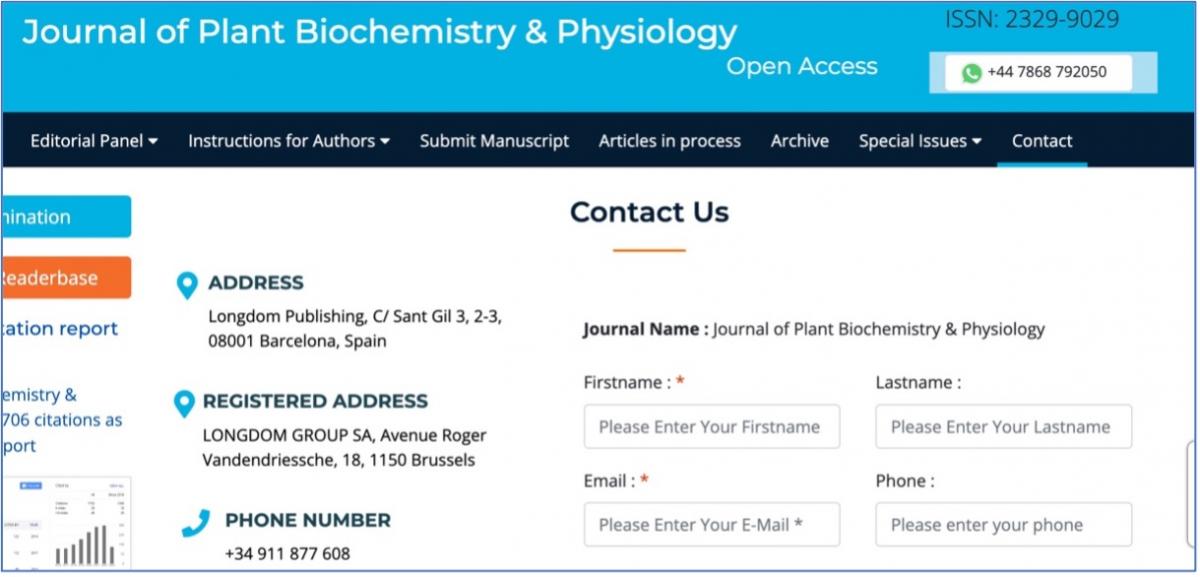

The first journal, Plant Physiology and Biochemistry is published by Elsevier, a reputable scientific publisher. The second, Journal of Plant Biochemistry and Physiology, is published by Longdom Press. Note it has phone numbers in Great Britain and in Spain and a registered address in Brussels. The journal is not included in any of the major indexing services that have quality controls, such as Web of Science, Scopus, or PubMed. The third, Journal of Plant Biochemistry & Physiology, is published by Omics, a publisher that was sued by the US Federal Trade Commission for predatory practices and ordered to pay a fine of more than $50 million.[15]
How to help researchers distinguish between the fake and the real
Above, we outlined several ways to determine legitimate journals from predatory ones. The two OER Africa publications we cited offer detailed help to students, researchers, and librarians.
Intellectual property rights, plagiarism, and referencing are taught in the Use of Libraries or embedded in the Use of English course, which is an integral part of the compulsory General Studies (GS) for first year students in Nigerian universities. However, the effect of the course on students has been found to be minimal.[16] Traditionally, African academic libraries run library orientation activities for new students. This window of opportunity could be widened to include provision of information packs or tutorials (online and physically) on information literacy, copyright, and plagiarism issues (including an introduction to plagiarism detecting software), as well as information about predatory journals.
Figure 4: AfLIA poster for use in libraries
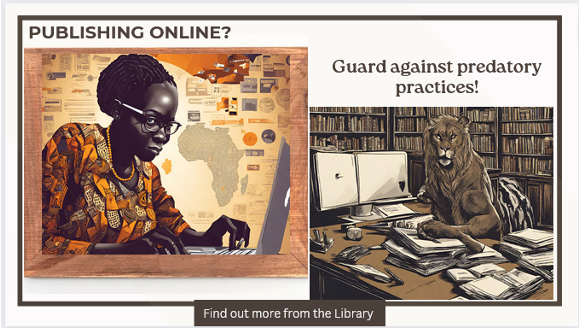
Academic libraries can play an important role in raising awareness to the need to be wary of predatory practices. But universities as a whole should be engaged in preventing staff and students from falling prey to these journals. They can list the open access journals for which academics associated with their institution can use for purposes of promotion, tenure, and contracts. The DHET site discussed above would be a good place start. Supervisors can advise their PhD students about conducting a literature review without including predatory journals. Sarah Elaine Eaton of the University of Calgary wrote the following about the need of universities to support their students and academics against predation: [17]
"There are implications for mentors of graduate students and early-career stage academics, as well as for institutions as a whole. The issue of questionable conferences and publications is so complex that early-stage academics require support and mentorship to cultivate a deeper understanding of how to share their work in a credible way."
Dr. Eaton’s statement is valid around the world, particularly in circumstances such as Drs. Sacomboio and Samje described—insufficient funds to pay fees and insufficient guidance within the institution.
[1] See Sharing Africa’s knowledge through openly licensed publishing for more information on open access. https://www.oerafrica.org/content/sharing-africa’s-knowledge-through-openly-licensed-publishing
[3]See https://www.up.ac.za/news/post_3048195-the-department-of-higher-education-and-training-2022-accredited-journals-
[4]Grudniewicz, A., Moher, D., Cobey, K.D. et al. (2019). Predatory journals: no definition, no defence. Nature, Vol. 576: 210-212. Retrieved from https://media.nature.com/original/magazine-assets/d41586-019-03759-y/d41586-019-03759-y.pdf
[5]The Interacademy Partnership. (2022). Combatting Predatory Academic Journals and Conferences. Retrieved from https://www.interacademies.org/project/predatorypublishing
[6]European Pain Federation. (2021). How to Spot Predatory Journals. Retrieved from https://europeanpainfederation.eu/news/how-to-spot-predatory-journals/
[7]Lelliott, T. (2023). Publish Open Access revised. OER Africa. Retrieved from https://www.oerafrica.org/communication/publish-open-access/ - /
[8]Levey, L. (2023). Open Knowledge Primer for African Universities Revised and Updated Edition. Retrieved from https://www.oerafrica.org/system/files/12591/open-knowledge-primer-june-2023.pdf?file=1&type=node&id=12591
[9]Makoni, M. (2022). The battle against predatory academic journals continues. University World News. Retrieved from https://www.universityworldnews.com/post.php?story=20221213224021432
[10]Caplan, A.L. (2015). The Problem of Publication-Pollution Denialism. Mayo Clinic, Vol 90(5):565-566. Retrieved from https://www.mayoclinicproceedings.org/article/S0025-6196%2815%2900190-1/pdf
[11]Raniwala, R. and Raniwala, S. (2018). 'Predatory' Is a Misnomer in the Unholy Nexus Between Journals and Plagiarism. Retrieved from https://thewire.in/the-sciences/predatory-journals-fake-journals-plagiarism-peer-review-mhrd-ugc
[12]Bik, E. (2023). Investigation finds ‘egregious misconduct’ by CUNY scientist. Retrieved from https://scienceintegritydigest.com/2020/07/28/plagiarism-in-chemistry-a-case-report/
[13]Owens, J.K. and Nicoll, L.H. (2019). Plagiarism in Predatory Publications: A Comparative Study of Three Nursing Journals. Journal of Nursing Scholarship, Vol. 51(3):356-363. Retrieved from https://sigmapubs.onlinelibrary.wiley.com/doi/10.1111/jnu.12475 - :~:text=This focused study has clearly,evidence accurately to inform practice.
[14] Simon, N. (2023). Protecting research integrity from predatory journals. University of Cape Town. Retrieved from https://www.news.uct.ac.za/article/-2023-11-09-protecting-research-integrity-from-predatory-journals
[15]Federal Trade Commission. (2019). Court Rules in FTC’s Favor Against Predatory Academic Publisher OMICS Group; Imposes $50.1 Million Judgment against Defendants That Made False Claims and Hid Publishing Fees. Retrieved from https://www.ftc.gov/news-events/news/press-releases/2019/04/court-rules-ftcs-favor-against-predatory-academic-publisher-omics-group-imposes-501-million-judgment
[16] Ogunmodede, T. A., Adio, G. and Odunola, O. A. (2011). Library Use Education as a Correlate of Use of Library Resources in a Nigerian University. Library Philosophy and Practice (e-journal). Vol.604. Retrieved from https://digitalcommons.unl.edu/libphilprac/604
[17] See Sarah Elaine Eaton’s Resource Guide Avoiding Predatory Journals and Questionable Conferences. https://files.eric.ed.gov/fulltext/ED579189.pdf
Education systems around the world have traditionally been characterized by closed knowledge systems, overly prescriptive curricula, narrow conceptions of success, and a failure to fully empower teachers as facilitators of learning. A recent paper by Neil Butcher & Associates argues that a key reason for these issues is that many education systems are inhibited by complex policy environments that, likely unintentionally, impede learning and create educational closure.
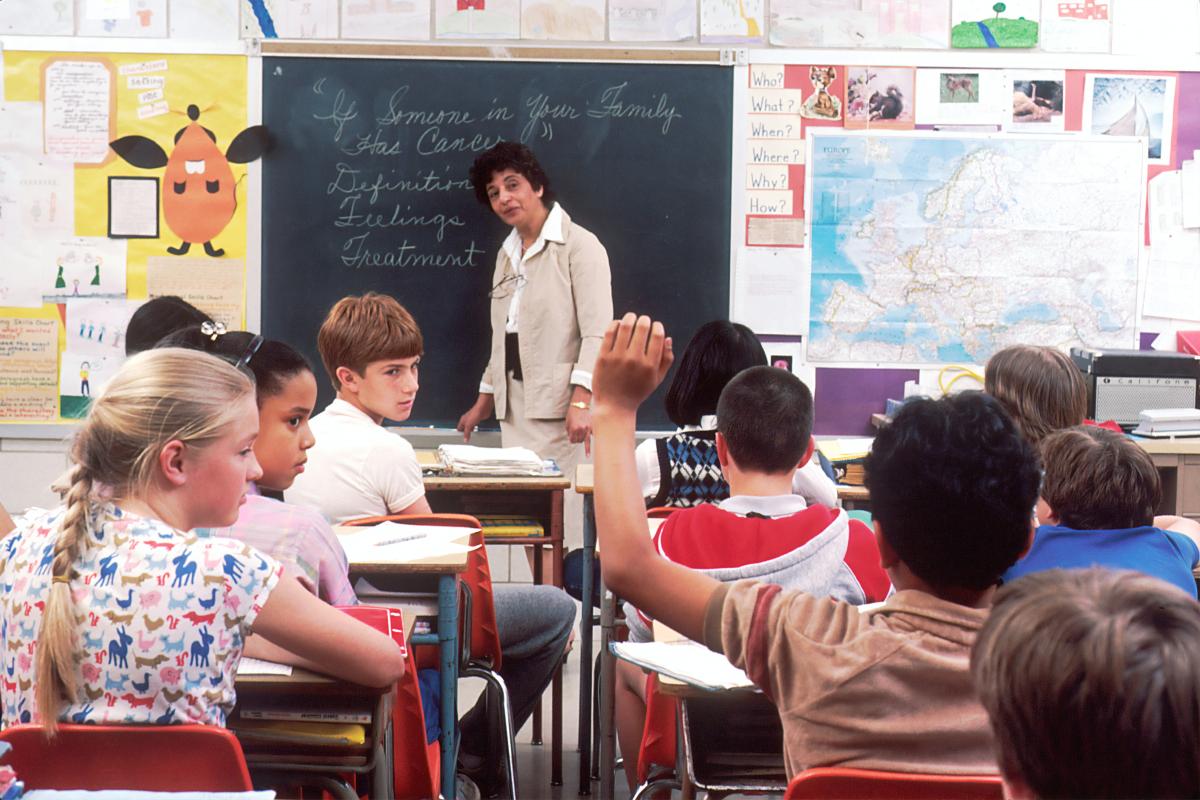
Image courtesy of Michael Anderson, Unsplash, Unsplash licence
Education systems around the world have traditionally been characterized by closed knowledge systems, overly prescriptive curricula, narrow conceptions of success and achievement, and a failure to fully empower teachers as facilitators of learning. This inhibits their ability to develop a full spectrum of human learning capabilities amongst learners, especially in their formative schooling years. A recently published paper by Neil Butcher & Associates (NBA) argues that, while there may be various reasons for these issues, one critical problem is that many education systems are inhibited by complex policy environments that, most likely unintentionally, impede meaningful learning and create educational closure.
Education policies often create new rules that accumulate over time, giving rise to inefficiencies and unnecessary constraints that do not support (and often obstruct) learner success. One manifestation of policy complexity within education systems is the growing granularization and rigidity of the formal national curriculum, which has led to the proclivity to use standardized testing and high-stakes examinations as a proxy for learner success. This complexity has also eroded autonomy for teachers, constraining what they can do in the classroom and increasing the tendency to ‘teach to the curriculum’ (or, worse even, to the examination). Standardized testing and high-stakes examinations have also increased anxiety and tension amongst learners, parents, and teachers, who perceive a false equivalence between test performance and success in later life.
The paper argues that despite the diverse nature of education systems around the world, many share a common problem of complex policy environments. Increased use of standardized testing models and resulting curriculum rigidity does not lead to better quality education but can have a deleterious effect on learner achievement. As complexity filters down into the classroom, another consequence is that the teachers who are tasked with delivering curricula are increasingly constrained and disempowered by these central policies. The consequences of this are far reaching as they emphasize rigidity and closure in knowledge acquisition, leaving little space for substantive learner-teacher engagement, contextual adaptation, and discovery.
In response to these challenges, we can use the principles of open learning as a tool to reflect on policy complexity in education systems, including the extent to which a policy environment is facilitating openness or promoting closure. A useful mechanism to tackle policy creep and ensure that education systems are geared toward a broader definition of learner success is to adopt and systematically implement the concept of openness within education systems, which begins at the policy level. Prioritizing openness offers significant opportunities for teachers and learners to reclaim what happens in the classroom and become more engaged members of society.
Integrating open learning principles into policy discourse would be a step forward in reducing unnecessary complexity and closure within education systems.
African languages are vastly underrepresented in the global knowledge pool, even though scholars at Harvard University believe that Africa is home to about one third of the world’s languages. This week, we delve into how Artificial Intelligence can assist with African language representation, and some of the challenges therein.
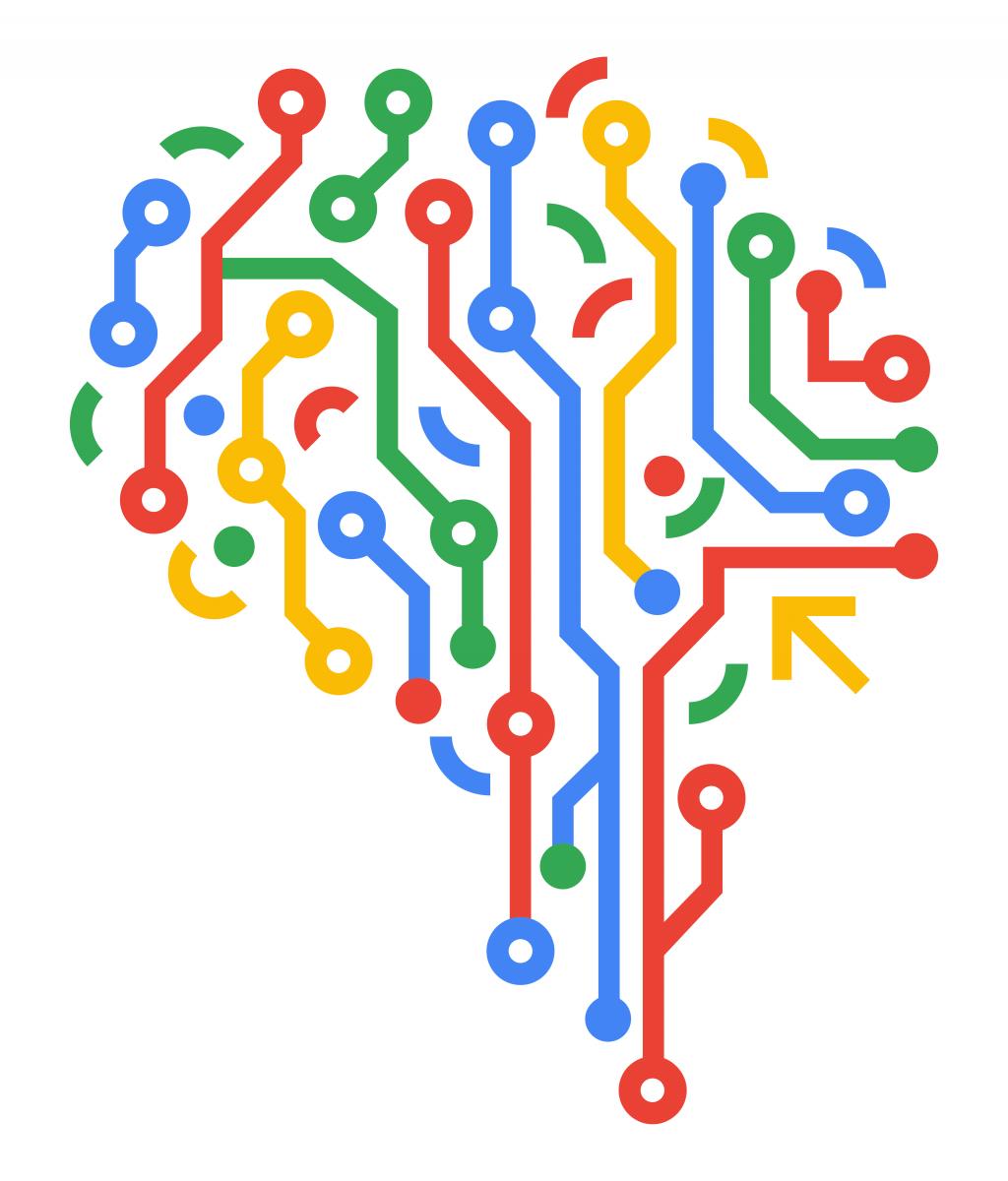
Much has been written about Artificial Intelligence (AI), mainly in English, including by OER Africa.[1] English is the predominant language on the Internet, in research and publications, and in education. African languages are vastly underrepresented in the global knowledge pool, even though scholars at Harvard University believe that with between 1,000 and 2,000 languages, Africa is home to about one third of the world’s languages.[2]
Artificial intelligence (AI) can play an important role in mitigating these language challenges. Already, international search engines, such as Google, play a large role in using AI to translate English into African languages and vice-versa. Efforts are constrained, however, by the paucity of documents on the web written in most African languages. Additionally, networks of African researchers have become actively engaged in looking for ways to increase the data on the web in African languages, including documenting scientific terms in the African languages where no such terms currently exist. Such data will then be available for use by AI to improve access to African languages. Importantly, they are trying to grow the field of African AI researchers by building networks and finding AI language technology solutions.
Many of us think about Google Translate when we want to understand what has been written in a language that we do not understand. Google Translate is now supported in 25 African languages: Afrikaans, Amharic, Arabic, Bambara, Chichewa, Ewe, Hausa, Igbo, Kinyarwanda, Krio, Lingala, Luganda, Malagasy, Oromo, Sepedi, Swahili, Sesotho, Shona, Somali, Tigrinya, Tsonga, Twi, Xhosa, Yoruba, and Zulu. Several of these languages are spoken across borders. The good news is that the number of them keeps increasing. The bad news is that there does not seem to be any one place to ascertain which African languages are covered; this can only be determined through searches within Google Translate. Furthermore, Google Translate uses machine translation, which is mostly accurate, but not entirely.
The Nigerian linguist, Aremu Adeola, uses an interesting example about why context matters in many languages, including Yoruba:[3]
"Most translations done by machines render some words wrong, especially words that are culturally nuanced. For example, Yorùbá words ayaba and obabìnrin have their meanings situated in a cultural context. Most machines translate both words as ‘queen.’ However, from a traditional-cum-cultural vantage point, it is essential to note that the meanings of ayaba and obabìnrin are different: Ọbabìnrin means ‘queen’ in English while ayaba is ‘wife of the king.’"
Using AI as a translation tool is not straightforward. Most AI tools:[4]
"Rely on a field of AI called natural language processing, a technology that enables computers to understand human languages. Computers can master a language through training, where they pick up on patterns in speech and text data. However, they fail when data in a particular language is scarce, as seen in African languages."
The South African science journalist, Sibusiso Biyela, gives an excellent example of just how difficult it can be to make scientific discoveries understandable and relatable in African languages, such as isiZulu. Biyela was given an assignment to write about the discovery of a new species of dinosaur, Ledumahadi mafube in isi-Zulu. He explained:[5]
"But there’s no word for “dinosaur” in Zulu. Nor are there words for “Jurassic,” “fossilization,” or “evolution.” Despite the fact that Zulu—or isiZulu, as the language is called in South Africa—is spoken by some 10 million people, it simply doesn’t have the words for communicating science.
So my news piece wasn’t just a news piece. It was an attempt to tell a science story in a language that science overlooked—to help right a societal wrong. It was a small contribution among an increasing number that aim to help decolonize South African science writing. And it was rife with more pitfalls than I could have imagined. The task of describing science clearly, concisely, and accurately—already challenging in English—became exponentially more difficult in my native tongue."
At the end of his article, Biyela gives a lexicon of some of the English-isiZulu scientific terms that he used. Biyela uses technology joined with his expertise in science for his work on conveying scientific terms from English to isiZulu. He was one of the partners in Masakhane, which is discussed below.[6]
The underrepresentation of African languages online makes it more difficult to use AI as a translating tool because computers have trouble identifying datasets with which to work. Several organizations are trying to mitigate this challenge, among them the Masakhane Research Foundation. Masakhane is collaborating with the African scientific preprint server, AfricArXiv,[7] to find a way to translate the papers that AfricArXiv receives into African languages.
Masakhane is a grassroots natural language processing (NLP) network that was formed for NLP research in African languages, for Africans, by Africans. The Masakhane community consists of:[8]
">1000 participants from 30 African countries with diverse educations and occupations, and >3 countries outside Africa. As of February 2020, over 49 translation results for over 38 African languages have been published by over 35 contributors on GitHub."
Masakhane has a trial translation page, but the translation results do not always match those of Google Translate. For example, ‘kisukuku’ is how ‘fossil’ is translated in Google Translate. ‘Mabaki ya Wanyama’ is the translation given by Masakhane. (Most online translations use kisukuku).
Figure 1: What is the correct translation?
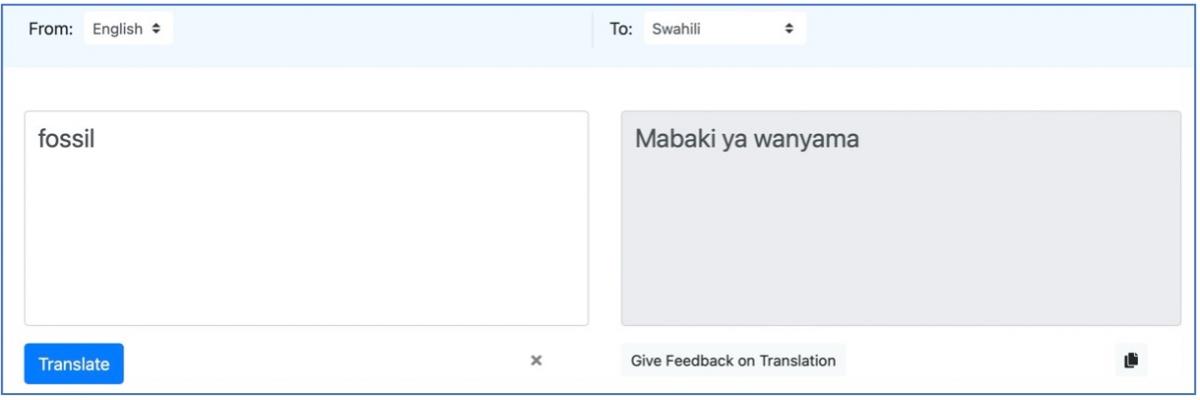

These efforts are just getting started. If Africa is going to join the global knowledge pool, its languages must be represented too. Both AfricarXiv and Masakhane welcome volunteers; there are other such organizations that would also appreciate assistance.
And for those who are interested in the interrelationship between AI and library and information studies, the African Library and Information Associations and Institutions (AfLIA) will host a webinar on this topic on 25 October 2023. Visit the webinar’s information page for more information.
Related articles
- Three ways Artificial Intelligence could change how we use Open Educational Resources
- Where does ArXiv fit into Open Science? But first, how do I pronounce it?
- Panel Discussion: How can AI assist African Librarians
References and attribution
[1] July 28, 2023 https://www.oerafrica.org/content/three-ways-artificial-intelligence-could-change-how-we-use-open-educational-resources
[2] https://alp.fas.harvard.edu/introduction-african-languages - :~:text=With anywhere between 1000 and,third of the world%27s languages.
[3]Lost in Translation: Why Google Translate Often Gets Yorùbá-and Other Languages-Wrong. Aremu Adeola. Rising Voices. 20 November 2020. https://rising.globalvoices.org/blog/2020/11/20/lost-in-translation-why-google-translate-often-gets-yoruba-and-other-languages-wrong/
[4] A roadmap to help AI technologies speak African languages. 11 August 2023. https://www.sciencedaily.com/releases/2023/08/230811115430.htm
[5] Decolonizing Science Writing in South Africa. Sibusiso Biyela. 12 February 2019. https://www.theopennotebook.com/2019/02/12/decolonizing-science-writing-in-south-africa/
Image at the top of the article courtesy of albyantoniazzi, Flickr, CC BY-NC-SA
From 4 to 7 September 2023, we celebrate the inaugural Digital Learning Week – a reframing of what was previously known as Mobile Learning Week. The United Nations Educational, Scientific and Cultural Organisation (UNESCO) will convene in-person events for policymakers, practitioners, educators, private sector partners, researchers, and development agencies.
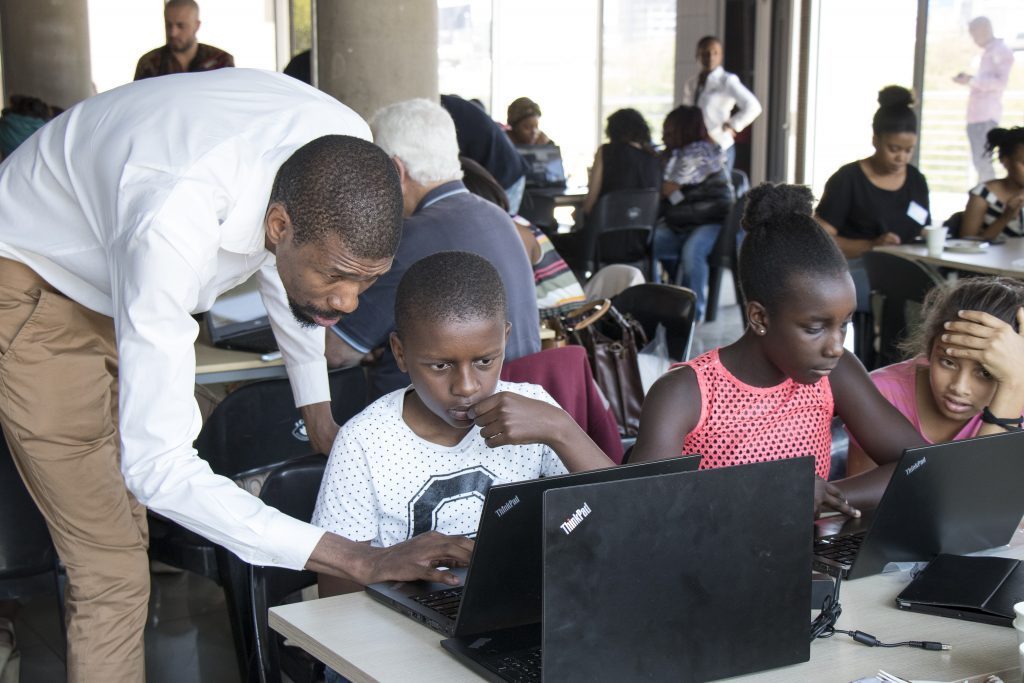
Image courtesy of Siphosihle Mkhwanazi, Wikimedia (CC BY-SA)
This week, we celebrate the inaugural Digital Learning Week – a reframing of what was previously known as Mobile Learning Week. From 4 to 7 September 2023, the United Nations Educational, Scientific and Cultural Organisation (UNESCO) will convene in-person events for policymakers, practitioners, educators, private sector partners, researchers, and development agencies.
Under the theme ‘Steering technology for education’, the event will explore public digital learning platforms and generative AI, examining how both can be steered to reinforce and enrich humanistic education.
Plenary sessions, panel discussions and public lectures will be livestreamed. The full programme, including links to each session, is available here.
Some highlights to look forward to include:
- Release of Guidance for Generative AI in education and research
- Presentation of AI Competency Frameworks for Students and Teachers
- Release of UNESCO policy guidelines on digital learning and AI in education, including AI and Education: Guidance for Policymakers, Guidelines for ICT in Education Policies and Masterplans, Education and Blockchain, and K-12 AI curricula: a mapping of government-endorsed AI curricula
- Progress report on Gateways to Public Digital Learning
For more information, visit the Digital Learning Week page.
Related articles
In August 2023, the African Library and Information Associations and Institutions (AfLIA) and Neil Butcher & Associates (NBA) co-published an Overview for African Librarians on the UNESCO OER Recommendation and Open Knowledge.
A William and Flora Hewlett Foundation grant to NBA funded the research and writing entailed in producing the Overview.
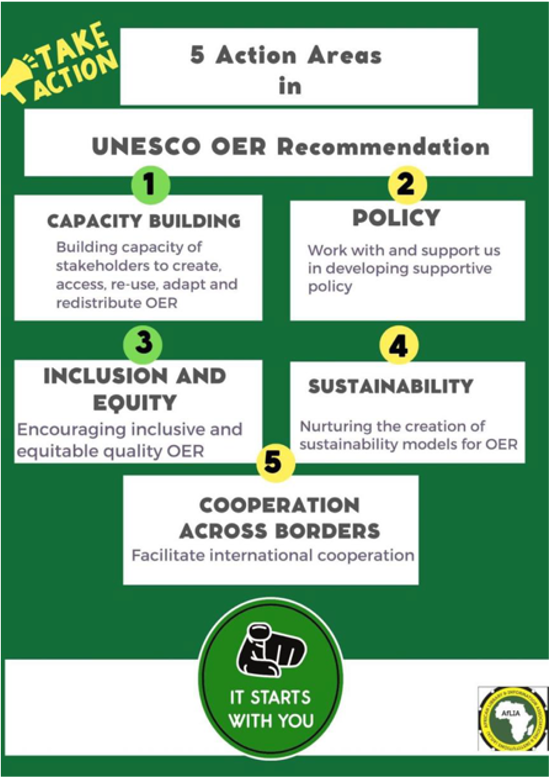
Figure 1: AfLIA poster on the UNESCO OER Recommendation
The UNESCO Recommendation on Open Educational Resources (OER) is significant to all those who are interested in and committed to ensuring that all learners have access to appropriate high-quality educational content, including librarians. It was approved unanimously by UNESCO member states in November 2019.
In August 2023, the African Library and Information Associations and Institutions (AfLIA) and Neil Butcher & Associates (NBA) co-published an Overview for African Librarians on the UNESCO OER Recommendation and Open Knowledge.[1] A William and Flora Hewlett Foundation grant to NBA funded the research and writing entailed in producing the Overview.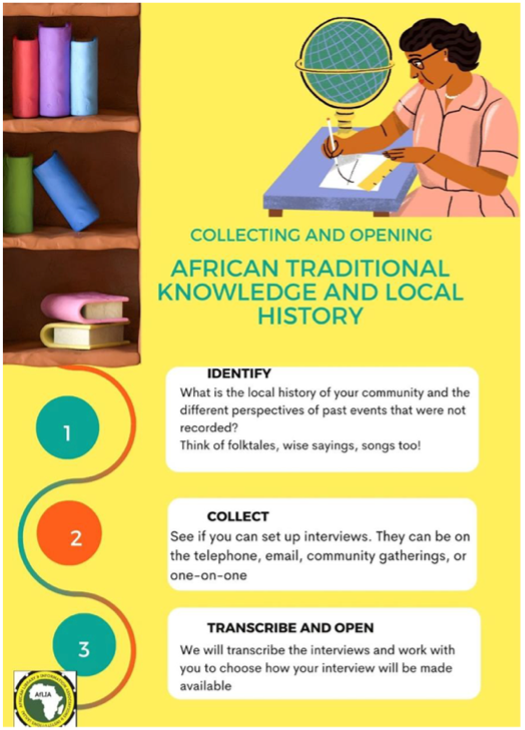
The Overview explores how the OER Recommendation’s five action areas are relevant to librarians and what librarians can do to support their implementation. It examines how the OER Recommendation relates to the different library types in Africa and the user communities the libraries represent.
It further aims to help African librarians develop a deeper understanding of OER, including the kinds of open content that will resonate with library users. OER is consonant with other equally important principles for librarians—access to equitable, suitable, and relevant content for easy sharing and interoperability of knowledge within Africa. All these facets are included in the Overview.
The Overview is filled with insights and stories from librarians on open knowledge and open licensing, including how traditional knowledge, culture, and languages can be used in creating and adapting openly licensed content.
AfLIA also produced a comic strip to explain to librarians why OER and UNESCO’s OER Recommendation are so important. Comic strips on teaching are becoming increasingly popular; Google has a full page of images, as does OER Commons. But we could not find a comic strip to explain open licensing or OER…until AfLIA came along and created one.
If you would like more information on the Overview or would be interested in joining related discussions, please write to Nkem Osuigwe, AfLIA’s Director of Human Capacity Development and Training. Her email address is neosuigwe@aflia.net.
Figure 2: AfLIA poster on collecting and opening up Africa's heritage
Related articles
- Opening education: What role do librarians on the African continent play?
- The Revised Open Knowledge Primer for African Universities
- How can we plan professional development in universities?
- Reinvigorating libraries: South African Library Week 2022
[1] The document is available on both the AfLIA and NBA websites: https://web.aflia.net/wp-content/uploads/2023/08/UNESCO-OER-Recommendation-Overview-for-librarians-_230802_093332.pdf and https://www.nba.co.za/resource/unesco-oer-recommendation-and-open-knowledge-overview-african-librarians
Over the past year, news about Artificial Intelligence (AI) has abounded. Information about breakthroughs and new applications have become commonplace, and we have been thrust into a world where AI-enabled technologies are starting to change how we work and live.
In this article, we consider three ways that AI might change how we use OER.

Introduction
Over the past year, news about Artificial Intelligence (AI) has abounded. Information about breakthroughs and new applications have become commonplace, and we have been thrust into a world where AI-enabled technologies are starting to change how we work and live. For better or for worse, we have ushered in the era of AI.
Many are asking what the implications of this might be for the education sector. Will it affect teaching and learning positively or negatively? How can AI-enabled technologies personalize education – and will this be educationally beneficial? What organizations are already working on AI in education and how, if at all, is this work regulated? An air of uncertainty pervades the sector in terms of the benefits and risks of harnessing AI in education.
At OER Africa, we have written extensively on how Open Educational Resources (OER) might improve aspects of education, including access, relevance, and quality. Likewise, the intersection of OER and AI necessitates greater exploration, particularly given the opportunities that it offers to scale access to high quality education.
In this article, we consider three ways that AI might change how we use OER.
How AI could change our engagement with OER
1. OER Content Development
AI tools can be used to develop new OER using natural language processing and machine learning capabilities. They might be able to help educators create interactive learning materials, assessments, and learning simulations, expanding the range of available OER and enabling novel teaching practices.
One of the most popular platforms that demonstrates such capabilities is ChatGPT (or Chat Generative Pre-Trained Transformer), an AI chatbot developed by OpenAI. Since its release in November 2022, is has amassed over 100 million users.
There is no doubt that generative tools like ChatGPT hold great potential to save time and effort for OER creators. With a few well-crafted prompts, ChatGPT can: generate thousands of words on a subject; create dozens of sample questions that could be included in an open textbook for learners to be able to self-evaluate their own learning; create lesson plans and assignments; and develop question prompts that can be used as asynchronous discussion prompts in discussion forums.[1] However, it is crucial that OER creators use their own expertise to check that what is generated by ChatGPT is indeed correct.
For educators working with OER, copyright ownership of AI-generated works is important to determine as, by definition, OER are materials unencumbered by legal restrictions that may prevent the reuse, sharing, redistribution, and adaptation of copyrightable works. While some are using the rise of generative AI to question the validity of copyright itself, the question of who owns the copyright when a work is created by AI is a very murky area, both legally and ethically.[2,3] When we asked ChatGPT whether the content it produces is openly licensed, it had the following to say:
As of my last update in September 2021, the content generated by ChatGPT and similar AI language models is not openly licensed. AI language models, including ChatGPT based on the GPT-3.5 architecture, are proprietary technologies developed by organizations like OpenAI.
…Therefore, when using content generated by ChatGPT or any other AI language model, it is essential to review the terms of service, usage policies, and any specific guidelines provided by the organization that owns the AI model to ensure compliance with their requirements.
It's worth noting that the field of AI and its legal and ethical implications are continually evolving, and there might be changes or developments in the licensing and usage of AI-generated content beyond my last update. I recommend checking with the organization that provides the AI service for the most current and accurate information regarding the licensing and usage of their AI-generated content.[4]
We recommend that users of these technologies stay abreast of these kinds of debates, read terms of service of the organizations that create these technologies, pay close attention to licensing conditions, and state clearly when they have used AI tools to generate intellectual property.
2. Personalized Learning
Some AI algorithms can develop tailored recommendations for OER based on a learner's performance, learning preferences, and development areas. This implies that learners can use OER that meet their requirements, making the learning pathway more engaging and effective.
For example, Siyavula is a South African organization that provides personalized and adaptive learning platforms. Siyavula has produced book titles from Grades 4-12. These are high quality OER that are aligned with the South African curriculum for mathematics, physics and chemistry. Learners can now also access Siyavula’s adaptive learning software, which adjusts the difficulty levels of exercises through machine learning to cater to each learner’s individual needs.[5]
3. Translation and Localization
AI can enable translation and localization of openly licensed content. Software with machine translation capabilities, such as Google Translate, can translate OER into different languages, facilitating knowledge sharing. It is always recommended that users state when they have used these kinds of tools for translation purposes.
The United Nations Educational, Scientific and Cultural Organization (UNESCO) has been exploring the use of AI for the translation and localization of educational content. It has collaborated with partners to develop machine translation systems and tools that bridge language gaps in accessing OER. For example, the Global Digital Library (GDL) collects existing high-quality openly licensed reading resources and makes them available on the web, mobile and for print. The platform also supports translation and localization of GDL-resources to more than 300 languages. UNESCO partnered with the GDL team under the auspices of the Norwegian Programme for Capacity Development in Higher Education and Research for Development (known as NORAD) and the Global Book Alliance to launch the GDL in Asia. Reading materials in 41 Asian languages, including seven Nepali languages were launched.[6]
Despite the benefits of integrating AI into OER, there are several potential challenges and concerns. For example, the issue of data privacy has received a lot of attention recently, as the use of AI algorithms often entails the collection and analysis of user data. Ensuring that such data is stored securely and used responsibly is critical to maintaining the trust and privacy of both learners and educators.[7]
A second challenge is the potential for AI to exacerbate existing inequalities in education. As AI-powered OER become more widespread, there is a risk that those who cannot access such resources or platforms may be left behind due to unstable internet connections for example. There may also be inherent biases in the data that is used to train AI models, such as a lack of data from Sub-Saharan African countries. Thus, introducing measures to ensure that AI-driven educational tools are accessible to learners regardless of their geography or socioeconomic contexts is key to promoting educational equity.[8]
Conclusion
Regardless of one’s outlook on the impact that AI could have on society over time, its integration into most spheres of our lives in some shape or form is progressing fast. With regard to OER, AI offers exciting opportunities to augment the production, dissemination, and access to quality educational resources. However, rolling out such capabilities means that we need to consider potential shortfalls, including that we might inadvertently inhibit access to such platforms for those who face educational barriers.
Some further reading on this topic:
- Lalonde, C. (2023). ChatGPT and Open Education. BC Campus. Available at: https://bccampus.ca/2023/03/06/chatgpt-and-open-education/
- Downes, S. A look at the future of Open Educational Resources. An Introduction to Open Education. Available at: https://edtechbooks.org/open_education/a_look_at_the_future
- Wiley, D. AI, Instructional Design, and AI. Improving Learning. Available at: https://opencontent.org/blog/archives/7129
Related articles in OER Africa’s archive
- Artificial Intelligence and African Librarians
- Protecting personal information when using and distributing OER
[1] Lalonde, C. (2023). ChatGPT and Open Education. BC Campus. Retrieved from: https://bccampus.ca/2023/03/06/chatgpt-and-open-education/
[2] Lalonde, C. (2023). ChatGPT and Open Education. BC Campus. Retrieved from: https://bccampus.ca/2023/03/06/chatgpt-and-open-education/
[3] See article here
[4] Conversation with ChatGPT on 24 July, 2023. OpenAI's ChatGPT, based on the GPT-3.5 architecture.
[5] See article here
[6] See article here
[7] Frackiewicz, M. (2023). AI in Robotic Open Educational Resources. Retrieved from https://ts2.space/en/ai-in-robotic-open-educational-resources/#:~:text=AI%2Dpowered%20chatbots%2C%20for%20instance,thinking%20and%20problem%2Dsolving%20skills.
[8] Frackiewicz, M. (2023). AI in Robotic Open Educational Resources. Retrieved from https://ts2.space/en/ai-in-robotic-open-educational-resources/#:~:text=AI%2Dpowered%20chatbots%2C%20for%20instance,thinking%20and%20problem%2Dsolving%20skills
OER Africa has just published an expanded and revised 'Open Knowledge Primer for African Universities.' In the five years since we wrote the first edition, open education has now grown to include developments in open access, open data, open educational resources (OER), and open science. We thought it was time for a refresh.
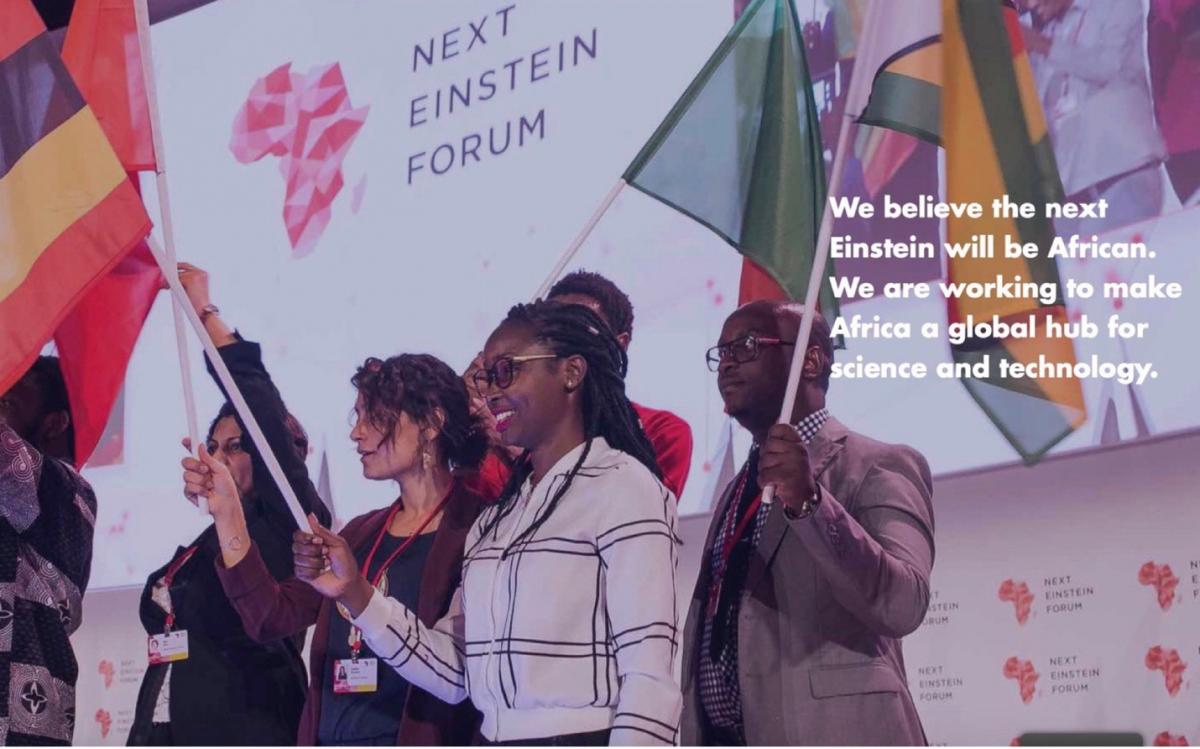
The image above is taken from Next Einstein Forum
OER Africa has just published an expanded and revised Open Knowledge Primer for African Universities. In the five years since we wrote the first edition, open education has now grown to include developments in open access, open data, open educational resources (OER), and open science. We thought it was time for a refresh.
This new primer includes sections on how open access has changed to include more journals and publication mechanisms, new requirements for making data open, and how OER fits into open access. Librarians play a key role in promoting information literacy for students and staff; we have added sections specifically for them. There is also a new section on information resources, subdivided by subject. We have broadened the section on impact factors to explain why researchers in the global South are affected deleteriously by them.
This primer has grown considerably since the first edition. Although you can read it from cover to cover, it might also be useful to keep it handy as a reference document and read sections when you have need of specific information.
We welcome your comments, including on areas where we are not clear or that require expansion. Please email levey180@gmail.com.
The primer can be found here.
Funded by The William and Flora Hewlett Foundation, Saide OER Africa embarks on an impactful project to support the effective development and use of Open Education Resources in higher education systems in selected sub-Saharan African countries. Ashton Maherry, reports on recent travels to Beira, Mozambique, to establish a strategic partnership with UnISCED.
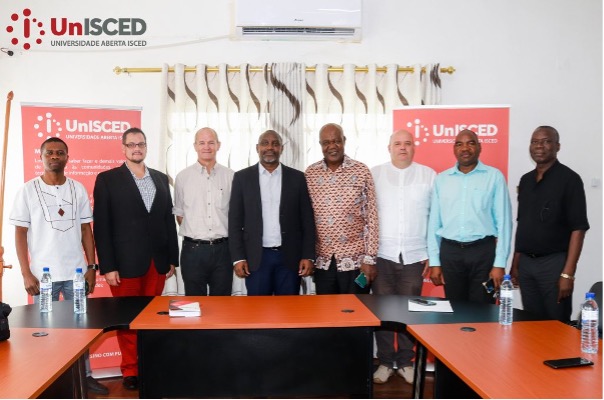
Figure 1: Representatives from OER Africa and UnISCED
As part of Saide’s OER Africa initiative, Ashton Maherry (Saide) and Neil Butcher (Neil Butcher & Associates) recently visited UnISCED to establish a partnership to promote the use of Open Education Resources (OER) at UnISCED. UnISCED (translated as Open University Institute of Sciences and Distance Education) is a Mozambican private higher education institution dedicated exclusively to open and distance education and was established in 2014.
The current William and Flora Hewlett Foundation grant in support of OER Africa, continues its focus of supporting effective development and use of OER in higher education systems in African universities. The project has four outcomes:
1. Development of comprehensive Continuous Professional Development (CPD) Frameworks for academics, senior management and academic librarians.
2. Development of an online collection of Continuous Professional Development Open Education Resources in higher education
3. Collaboration with at least four African universities
4. Establishment of a Continuous Professional Development network
The visit to UnISCED forms part of a planned collaboration with at least four Universities including, Botswana Open University, the University of Namibia and UnISCED and hopefully one other, still to be determined.
Several areas of the strategic partnership were identified during the UnISCED visit, these include the development, implementation and evaluation of policies that support the use of OERs, capacity building of senior management, academics and academic librarians to use OERs to strengthen teaching and learning, the identification of possible free or commercial online resources that can help academics with their teaching and learning materials, such as simulators and virtual labs, and the exciting challenge of translating predominantly English resources to Portuguese. In addition, the possibility of UnISCED becoming a member of the African Association of Librarians (AfLIA) was explored and will be taken forward in the next three months.
UnISCED and Saide are in the process of finalising the Memorandum of Understanding. OER Africa and UnISCED are planning a survey for UnISCED staff to identify focus areas for professional development in relation to OER. A second visit to UnISCED is planned in the next few months to finalise the CPD framework, conduct an awareness-raising session on open licensing to Senior Management and facilitate a training session on how to find, use and adapt OER for academics.
A note on OER Africa's CPD frameworks
This work builds on a series of CPD frameworks we are developing at OER Africa in collaboration with our partners. A CPD framework is a planning guide that supports the career development of higher education professionals. In the case of academics, a framework aims to empower and encourage staff, enhance and develop their pedagogical skills, assist them to reflect, and contribute to quality assurance of the student learning experience (adapted from National Forum for the Enhancement of Teaching and Learning in Higher Education [2016]).
We have used a wheel structure (Figure 1), with wedges showing the professional development domains and levels of progress (foundation, established, and advanced) aligned with Bloom’s Taxonomy (Armstrong, 2020). Each domain is being elaborated with indicators of attainment to align with levels of progress, as well as available openly-licensed materials that can support individual higher education professionals and institutional structures with the CPD. When they are completed, we hope that institutions will (with the support of OER Africa) customise the domains for themselves, develop CPD policies, assess their staff competencies, and provide training to capacitate their staff.

Figure 2: Framework for academics showing possible domains to be supported.
Related articles
In conjunction with OER Africa, AfLIA is hosting a panel discussion on the role of Artificial Intelligence and African libraries on 24 April 2023. This webinar is the second in a series of activities that will help build understanding, adaptable knowledge and skills.
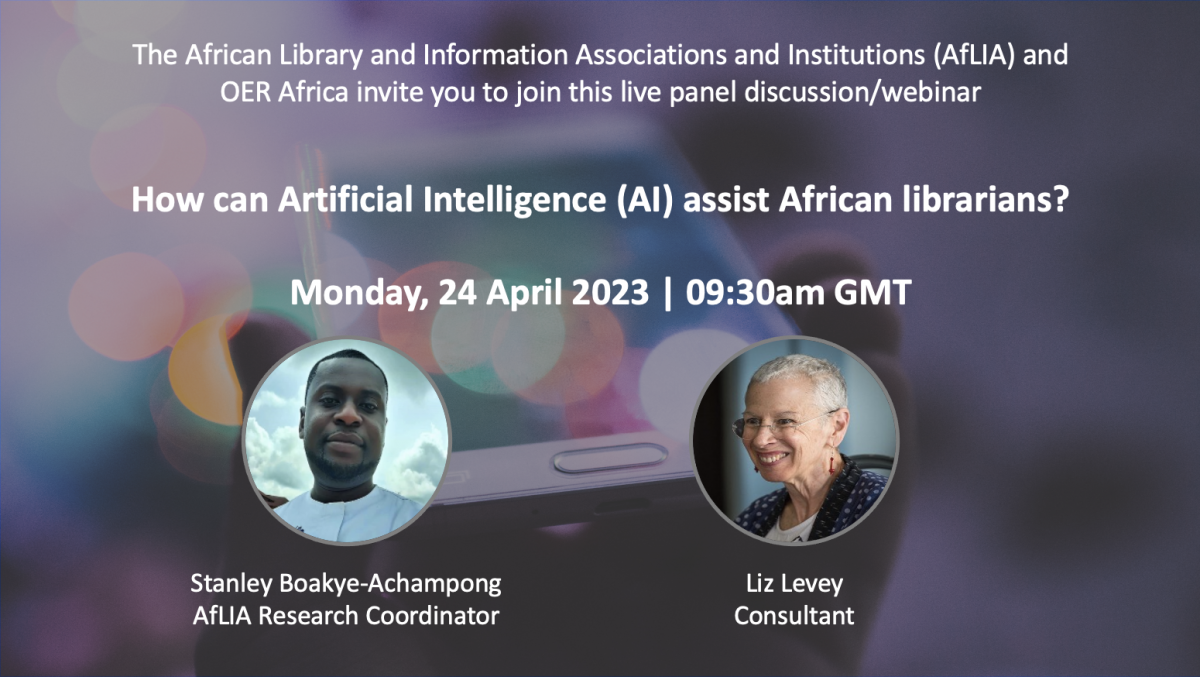
Access the recording
AfLIA has recently signed a memorandum of understanding (MoU) with OER Africa of Saide to build a sturdy CPD framework that will project African librarians into a new era as change agents and leaders in driving open education, open access and open licensing as critical components for driving quality education and creativity in the continent.
In conjunction with OER Africa, AfLIA is hosting a panel discussion on the role of Artificial Intelligence and African libraries. This webinar is the second in a series of activities that will help build understanding, adaptable knowledge and skills. The first 100 participants can register and join the panel discussion on Zoom. Additional participants will be able to follow it live on YouTube.
Date: Monday, 24th April, 2023
Time: 9.30am UTC | 10.30am WAT | 11.30am CAT | 12.30pm EAT
Registration
This is a free webinar. After completing the registration form, you will receive notification via email with details of how to join the webinar.
Carefully read the section on Technical Requirements to help you prepare adequately for this webinar.
Resource persons

Just as the introduction of personal computers revolutionized access to computing power for everyone, AI technology such as ChatGPT, has made advanced language models widely accessible to a broader audience. The conversation about the implications of such AI has been re-ignited since the launch of ChatGPT. Indeed, AI powered technologies, when embraced, can play a vital role by improving access to information and refining the quality of services provided to patrons. As with every other technology, AI may have some undesirable implications on library education, research and service delivery. The global conversation is an interesting mix of divergent views on AI but not so much has been discussed in the area of its impact on Librarianship, especially within the African context. Stanley will briefly highlight general issues of awareness, perception, adoption and the implications of AI on African library education, research and service delivery.
Stanley Boakye-Achampong is the AfLIA Research Coordinator
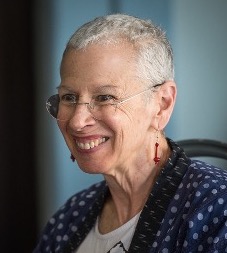
English is the dominant language in most OER repositories. The same is true for open access journal literature; many more scientific journals are published in English rather than in other languages. The two noteworthy exceptions are African Storybook (ASb) and StoryWeaver that focus on African languages and Southern Asian respectively.
It has been demonstrated that if children are to be successful in learning to read with comprehension, they should start out in their mother tongue. Adults, too, would benefit by reading content in their own languages. This is particularly true of scientific terms and concepts. The use of language, therefore, has great significance when considering how to make education truly inclusive and equitable—one of the goals of the UNESCO OER Recommendation.
AI can assist authors and readers to read research in their own languages. Liz will discuss efforts to make science inclusive and equitable in African languages, with a focus on research literature and the role of AI in translation.
Liz Levey is an independent consultant and expert in the field of openness and languages
Drs. Nkem Osuigwe and Tony Lelliott will facilitate the discussion.
Technical Requirements
Upon registration, reminders will be sent to all registrants periodically. This webinar will be hosted on the Zoom Conferencing Platform. Participants, who do not have Zoom on their mobile devices and or computers, need to download, install and create an account on Zoom ahead of time. Webinar attendees are encouraged to join early, preferably 15 minutes before the start of the webinar, as one may need time launch the application. The speaker will use a webcam to connect with attendees. Audio and video for the session will be streamed over computer speakers. Attendees are therefore encouraged to connect with a headset or earpiece for maximum utility. Please note that this webinar does not involve a certificate of participation.
The webinar will also be live-streamed on YouTube.
There have been several recent calls for Continuous Professional Development (CPD) to take a more prominent role at the higher education level. OER Africa is in the process of developing three CPD frameworks to structure capacity building for academics, academic librarians, and senior management in higher education institutions.
Continuous professional development (CPD) frameworks for professionals in Higher Education
The need for CPD in higher education
CPD is ‘professional learning that results in changes to [academics’] knowledge and practices, and improvements in student learning outcomes’ (after Darling-Hammond et al. 2017). There have been several recent calls for CPD to take a more prominent role at higher education (HE) level (e.g. Mihai, 2021; Bruzga, 2022), that highlight the following:
- Professional development planning should be strategic: it should become a fundamental part of the academics’ annual activities, and not a mere “extracurricular” undertaking for a few interested staff.
- Institutions should consider developing a system of incentives and rewards that encourages staff to focus on their teaching.
- Institutions that already offer CPD should evaluate their offerings to determine whether they are the right fit for the current needs of the institution.
- Where feasible, faculties and schools should encourage communities of practice so that professionals can share their experiences, and support and empower each other
Barriers to participation in CPD
Despite the needs, there is evidence that higher education professionals rarely participate in CPD due to barriers such as:
- A reluctance to renounce teaching practices with which they are familiar. Similarly, innovative teaching practices are not normally a requirement for appointment, or for career progression.
- The absence of inducements for self-development in higher education institutions (HEIs).
- A lack of time.
- HEIs’ lack of pedagogical expertise and institutional capacity to develop effective CPD schemes.
Since the need for CPD is great, and many institutions either lack the capacity to provide it or carry it out in an ad hoc manner, OER Africa is in the process of developing three CPD frameworks to structure capacity building for academics, academic librarians, and senior management in HEIs.
CPD frameworks
A CPD framework is a planning guide that supports the career development of higher education professionals. In the case of academics, a framework aims to empower and encourage staff, enhance and develop their pedagogical skills, assist them to reflect, and contribute to quality assurance of the student learning experience (adapted from National Forum for the Enhancement of Teaching and Learning in Higher Education [2016]).
The CPD frameworks we are developing at OER Africa, in collaboration with our partners such as the African Library and Information Associations and Institutions (AfLIA), are adapted from the British Council’s CPD framework for teacher educators. We have used a wheel structure (Figure 1), with wedges showing the professional development domains and levels of progress (foundation, established, and advanced) aligned with Bloom’s Taxonomy (Armstrong, 2020). Each domain is being elaborated with indicators of attainment to align with levels of progress, as well as available openly-licensed materials that can support individual HE professionals and institutional structures with the CPD. When they are completed, we hope that institutions will (with the support of OER Africa) customise the domains for themselves, develop CPD policies, assess their staff competencies, and provide training to capacitate their staff.

Figure 1: Framework for academics showing possible domains to be supported.
The initiative is in its early stages. OER Africa is currently collaborating with a few African universities to tailor the framework to their own needs, and discuss policy development and implementation. Concurrently, we are identifying and evaluating relevant CPD OER available worldwide, with a view to making them available in a repository to support institutions that would like to develop their staff. Once completed, a full set of frameworks will be made available on the OER Africa website, together with associated OER to allow institutions to modify them to suit their own contexts. We welcome comment on the initiative as it develops; you can email us on the form available at https://www.oerafrica.org/contact.
Related research report: Continuous Professional Development strategies in Higher Education Institutions
The following publications were drawn on to create this blog post:
British Council. (nd). Continuing Professional Development (CPD) Framework for teacher educators https://www.teachingenglish.org.uk/sites/teacheng/files/4204_BritishCouncil_CPD_Teacher_Educators_FINAL_040222.pdf.
Bruzga, L. (2022). Why Professional Development in Higher Ed Requires Regular Revisions. EdTech Focus on Higher Education. https://edtechmagazine.com/higher/article/2022/03/why-professional-development-higher-ed-requires-regular-revisions
Darling-Hammond, L., Hyler, M. E., Gardner, M. (2017). Effective Teacher Professional Development. Palo Alto, CA: Learning Policy Institute.
Inamorato dos Santos, A., Gaušas, S., Mackevičiūtė, R., Jotautytė, A., Martinaitis, Ž. (2019). Innovating Professional Development in Higher Education: An analysis of practices, EUR 29676 EN, Publications Office of the European Union, Luxembourg, ISBN 978-92- 76-00580-3, doi:10.2760/26224, JRC115622.
Mihai, A. (2021). This pandemic must bring faculty development to the fore. Times Higher Education. https://www.timeshighereducation.com/opinion/pandemic-must-bring-faculty-development-fore
National Forum for the Enhancement of Teaching and Learning in Higher Education (2016). National Professional Development Framework for all staff who teach in Higher Education. Dublin. https://hub.teachingandlearning.ie/wp-content/uploads/2021/06/NF-2016-National-Professional-Development-Framework-for-all-Staff-Who-Teach-in-Higher-Education.pdf.
Related articles:
Well-designed and implemented national education policy is an indispensable tool for creating and sustaining vibrant Open Educational Resource (OER) ecosystems and promoting OER adoption. A new report by Neil Butcher & Associates provides insight into the current global OER policy landscape, outlining their research on national OER policy development and implementation.
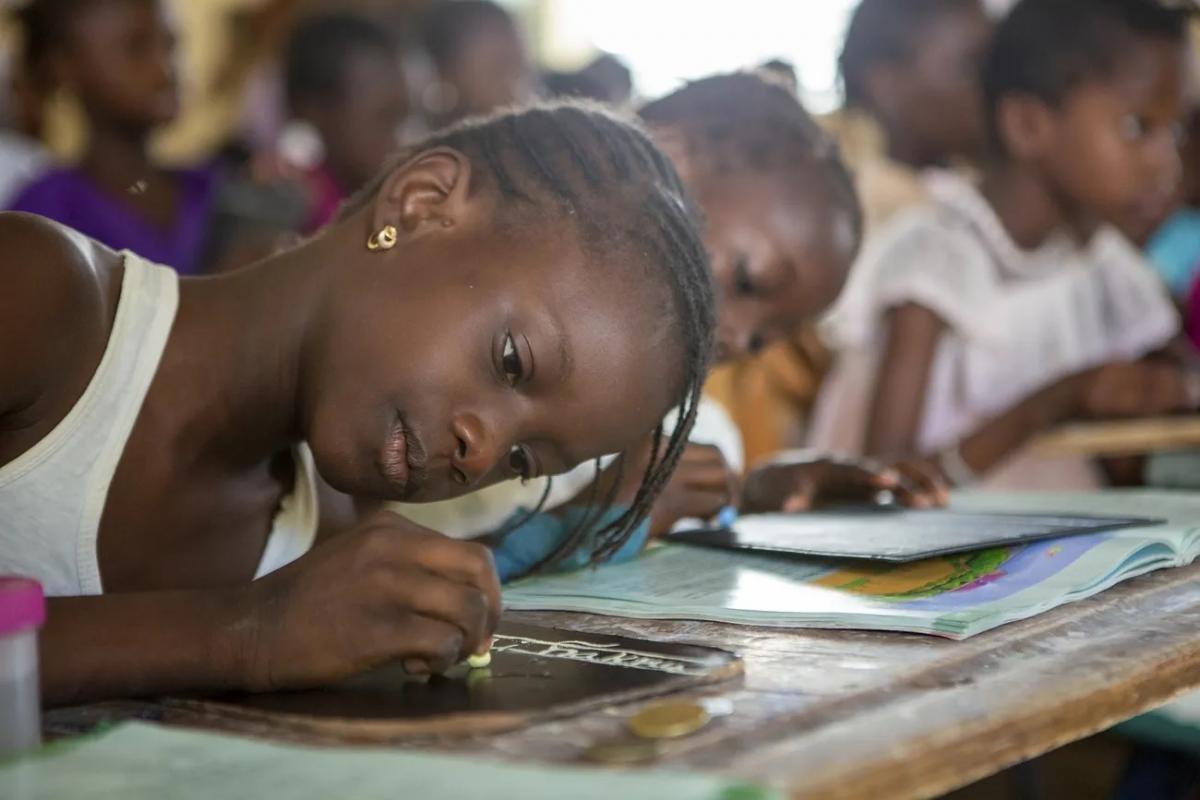
Not only do national education policies determine the educational principles and objectives that a sitting government adopts, they can also have a far-reaching effect on a citizen’s quality of and access to education, including whether that access is equitable and inclusive. Effective education policies can be transformative for a country and its people. This applies equally when one considers the potential impact of national Open Educational Resource (OER) policies on learners, educators, and education systems. OER provide possibilities to innovate in teaching and learning, to reimagine how education systems function and the values that they promote, and to expand access to inclusive and equitable quality education as outlined in Sustainable Development Goal (SDG) 4. [1]
Policy is a key indicator of OER practice. When an OER policy is well-designed and implemented it can act as a driving force for creating and sustaining vibrant OER ecosystems.[2] It thus follows that one of the OER Recommendation’s five objectives and areas of action is to develop supportive policy. The Recommendation notes that this includes:
"Encouraging governments, and education authorities and institutions to adopt regulatory frameworks to support open licensing of publicly funded educational and research materials, develop strategies to enable the use and adaptation of OER in support of high quality, inclusive education and lifelong learning for all, supported by relevant research in the area."[3]
Work on OER policy has already started in many countries around the world and international bodies such as UNESCO are supporting efforts to develop such policies through, for example, the forthcoming release of guidelines for national governments and institutions on OER policy and capacity building in the first half of 2023. But what progress has been made so far on OER policy development and implementation?
A new report by Neil Butcher & Associates (NBA) sets out to understand the effectiveness of OER policies to date and whether there is evidence of integration between OER policy provisions and other mainstream government policy commitments or strategic goals. The research involved a review of 27 standalone OER policies and 16 policies that contained OER commitments. The research also sought to strengthen understanding of the most effective strategies and approaches to create government policy and regulatory environments that facilitate implementation of UNESCO’s Recommendation on OER and OER more generally.
The report contains three key findings.
1. There were unforeseen challenges with finding OER policies that fitted the research criteria
For a policy to qualify for inclusion in the dataset, it needed to meet three criteria. There needed to be:
- Evidence that the policy had been approved by the government.
- Availability of baseline documentation of what OER activities were already underway in the country before the policy came into effect (where available).
- Evidence of meaningful OER practices that were implemented since the policy was approved.
The research team was only able to identify a handful of policies that met our criteria – 27 national standalone OER policies and 16 policies that contained OER commitments.
2. There was limited evidence of policy implementation in line with the policy provisions of standalone OER policies and other policies that contained OER commitments.
Of the 27 national standalone OER policies, only two fitted all criteria and provided sufficient evidence of meaningful OER practices following implementation. There were four instances of OER commitments in other policies (e.g. Information and Communication Technology policies) that matched the qualifying criteria. However, in most cases, there was limited evidence available of sustained and comprehensive policy implementation in line with the policy provisions.
It was not possible to tell which type of policy (standalone versus a different policy containing OER commitments) was more impactful for various reasons, including that there were too few qualifying policies to draw a meaningful comparison. There was also conflicting information online, and sometimes a lack of information online regarding a causal link between OER practices that occurred as a result of policy commitments.
3. When looking at the relationship between OER policy provisions and national plans or strategies, OER policy is not a precondition for meaningful OER practices, but it does seem to be an enabler in creating a coordinated national effort geared towards OER implementation.
For a coordinated national effort to proceed optimally, there needs to be alignment between OER policy provisions and a government’s strategic priorities. Ideally, this should be consistently expressed in the government’s overall vision for the education system and in the documents that it releases and implements including policies, legislation, national plans, and strategies.
Ultimately, the research provides insight into the global OER policy landscape, outlining successes in OER policy development and implementation. It highlights a need to problematise the idea of educational policy as it relates to the OER movement and interrogate why OER policies are developed, their function, and how they are implemented. The report provides a series of recommendations and areas for further enquiry, centred around the suggestion that until OER policy commitments are directly connected to the attainment of national level policy commitments and the overall vision for the national education system as expressed in government documents, they are unlikely to be impactful.
Other recommendations include allocating more resources to policy review processes to determine the validity, relevance, and progress in achieving policy outcomes. The report also encourages governments to consider possible misalignments between national policy provisions and what is realistic to implement. It concludes with a series of questions that governments might reflect on when starting the OER policy development process.
OER Africa will release a subsequent thought piece on these findings and how to take the recommendations forward.
Related articles
- International Day of Education on 24 January 2023
- The UNESCO OER Recommendation and effective, inclusive, equitable access to quality OER
- Why is 'Open Education' important?
References
[1] See https://sdgs.un.org/goals/goal4
[2] Miao, F., Mishra, S. and McGreal, R. (eds) Open Educational Resources: Policy, costs and transformation. Retrieved here
[3] See the UNESCO Recommendation on Open Educational Resources, available here
Since 2019, the United Nations Educational, Scientific, and Cultural Organization (UNESCO) has celebrated the International Day of Education on 24 January. This, year the theme is “to invest in people, prioritize education.” This week, we draw parallels between the International Day of Education, the OER Recommendation, and OER capacity building.
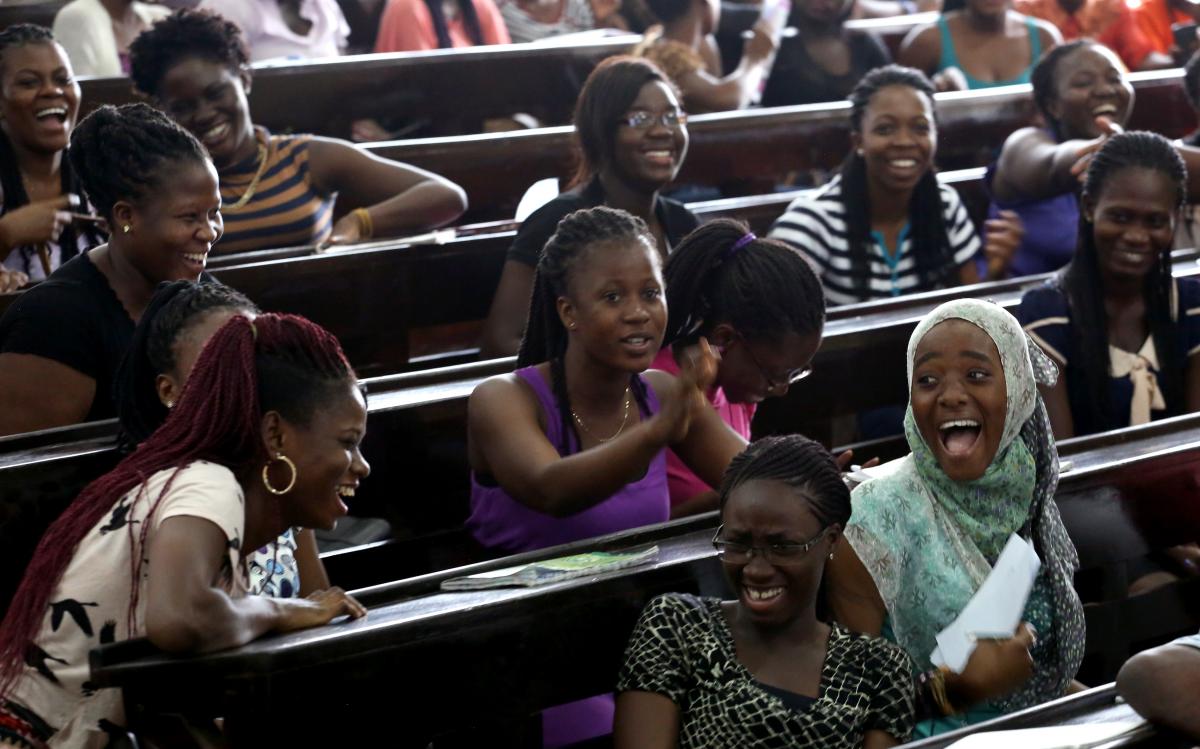
Image: World Bank Photo Collection, Openverse (CC BY-NC-ND 2.0)
The United Nations (UN) set out the Sustainable Development Goals (SDGs) in 2015. SDG 4 concerns “inclusive and equitable quality education.”[1] While there have been a number of proposals[2], it is not clear the extent to which Open Education or OER are assisting with achieving the goal, so the International Day of Education may provide a focal point for associating SDG 4 with the open education movement. The UN designates specific days, weeks, years, and decades as occasions to mark particular events or topics to promote the objectives of the organization. Since 2019, the UN’s educational arm (UNESCO) has celebrated the International Day of Education on 24 January. This, year the theme is “to invest in people, prioritize education.”
This year’s Day will call for maintaining strong political mobilization around education and chart the way to translate commitments and global initiatives into action… Education must be prioritized to accelerate progress towards all the Sustainable Development Goals against the backdrop of a global recession, growing inequalities and the climate crisis.[3]
The concept note for the International Day of Education builds on the UN Transforming Education Summit held in September 2022. It calls for strong political mobilization around education to translate commitments and global initiatives into action. The critical areas highlighted are
- Foundational learning;
- The green and digital transitions;
- Gender equality;
- Education in crisis; and
- Financing.
How do these fit with OER and the UNESCO OER Recommendation that we discussed in March 2022? While the International Day of Education does not specifically link to OER, we note that the day provides an opportunity to showcase OER within each of the critical areas, or create OER where they are not available. The concept note stresses the need to capacitate policy makers, teachers and educators to make education transformative, while one of the OER Recommendation’s areas of action is to build stakeholder capacity, as we highlight below. Here, we briefly examine each of the critical areas from the UN Transforming Education Summit, to show how OER and other available resources can help with operationalising the Recommendation.
- First, a key to foundational learning is literacy. The UNESCO concept note states that “six out of 10 children cannot read and understand a simple story at age 10.” Open licensing is crucial in enabling children to both learn to read and practice reading, as it provides freely accessible and downloadable resources in contexts where they may be none. The African Storybook initiative provides open access picture storybooks in the languages of Africa, while the Early Literacy Resource Network gives access to high-quality books and learning resources in multiple languages.
- The Commonwealth of Learning (CoL) assists learning institutions at all levels to transition to digital learning with their Technology-Enabled Learning initiative. CoL is also at the forefront of green education, as can be seen in its video on Promoting Learning for Sustainable Development. CoL’s policy is that all of its resources are openly licensed.
- The OER Africa post in November 2022 provided instances on how gender intersects with open resources, such as Girls Can Code Initiative, Girl Code Africa, and the Women of Uganda Network (WOUGNET). A Practice Guidance note on gender equality is available here, while Oxfam has produced a book on the subject with practical examples.
- Ideas around education during emergencies and crises have been prevalent even before the shutdowns of 2020 and 2021. Useful openly licensed resources can be found at education in emergencies and protracted crises. Particularly useful from an educational technology standpoint is the rapid evidence review on Education in Emergencies that summarises best practices on access to education, content, support and psychosocial well-being.
- For the critical areas above, the financing of education is crucial. UNESCO has produced an education simulation model to assist sectors to make the best decisions on how to finance education. The World Bank is the largest financier of education in the developing world, so understanding its priorities is important for anyone involved in educational finance.
To operationalise the UNESCO OER Recommendation’s area of action to build capacity of stakeholders to create, access, re-use, adapt and redistribute OER, it is necessary to
- Build awareness regarding the usefulness of OER.
- Capacitate educators at all levels to create, re-use, adapt, and redistribute OER.
- Raise awareness regarding the advantages of Open Access works.
- Make OER widely accessible and findable in appropriate repositories.
- Promote digital literacy skills to enable users to develop, access and adapt OER.
OER Africa, in its association with the African Library and Information Associations and Institutions (AfLIA), the Association of African Universities (AAU), and selected universities on the continent, is building capacity of their members in accordance with the OER Recommendation, so that the ideals of the International Day of Education and the Sustainable Development Goals can be realised. We would welcome hearing from any interested persons who are working along similar lines; our email address is info@saide.org.za
Related articles:
- The UNESCO OER Recommendation and effective, inclusive, equitable access to quality OER
- International Literacy Day 2022: ‘Transforming Literacy Learning Spaces’
- International Youth Day: Open learning as a driver to realising the Sustainable Development Goals?
[3] UNESCO. (2023). International Day of Education. Retrieved from https://en.unesco.org/sites/default/files/education_day_2023-cn-en.pdf
UNESCO’s OER Recommendation contains an action area on accessibility, inclusion, and equity which addresses the underlying issues that are necessary to both produce and use OER. But what does effective, inclusive, and equitable access to quality OER mean and how is it being realized? Just as importantly, what are the inherent complexities?
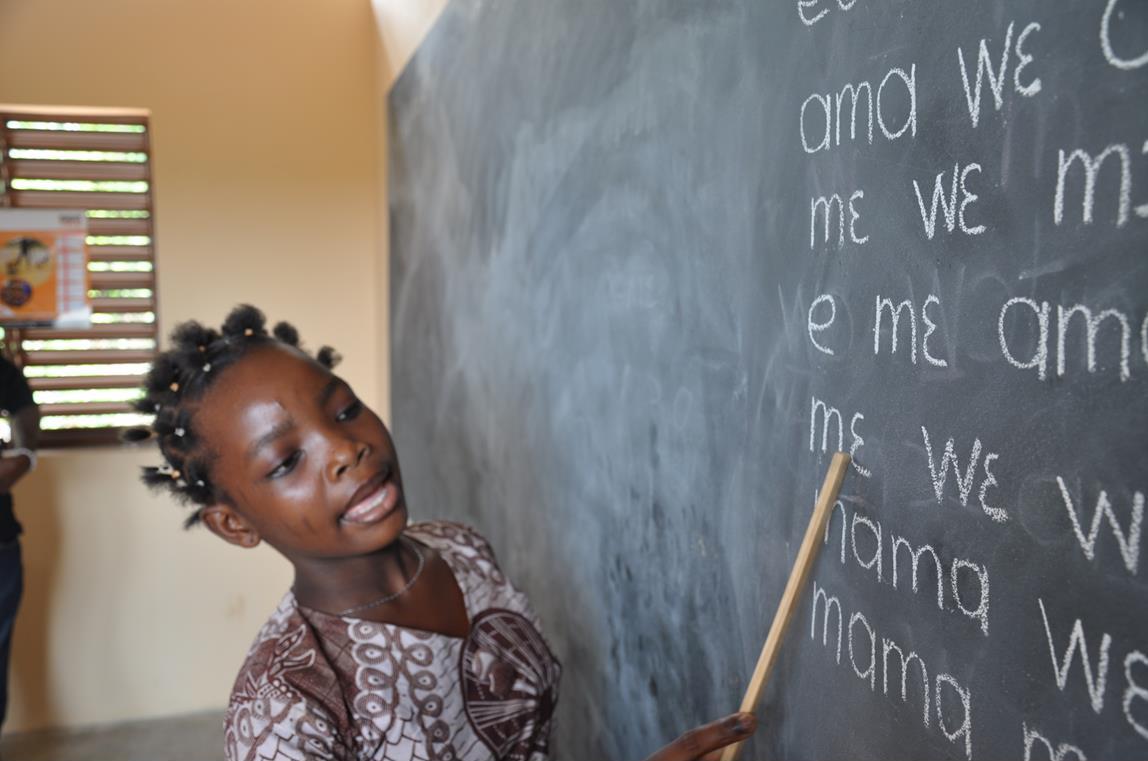
Image courtesy of USAID, Wikimedia Commons (Public domain)
UNESCO OER Recommendation
UNESCO members states unanimously approved the OER Recommendation on November 29, 2019. It is the first international normative instrument to embrace the field of openly licensed educational materials and technologies in education and builds on almost two decades of UNESCO work on OER.
The Recommendation pinpoints five essential areas of action to build and sustain a worldwide OER ecosystem:
- Capacity-building;
- Developing supportive policies;
- Effective, inclusive, and equitable access to quality OER;
- Creation of OER sustainability models; and
- Use of international cooperation to foster OER.
UNESCO will publish guidelines on these five action areas in early 2023.[1] This communication is about action area three—effective, inclusive, and equitable access to OER—which touches on all five areas. We are focusing on areas one to three from the list below.
What does effective, inclusive, and equitable access to quality OER mean?
UNESCO’s list is quite broad:
- Ensuring online and offline technical access;
- Supporting OER stakeholders to develop gender-sensitive, culturally, and linguistically relevant OER, particularly in under-resourced and endangered languages;
- Ensuring that the principles and programmes are in place for gender equality, non-discrimination, accessibility, and inclusiveness;
- Ensuring public and private investments in Information and Communication Technology (ICT) infrastructure and providing increased access to OER, particularly for low-income, rural, and urban communities;
- Incentivizing the development of, and research on, OER; and
- Developing and adapting existing evidence-based standards, benchmarks, and related criteria for OER quality assurance.
The UNESCO guidelines will discuss and analyze this and the other action areas in detail; this article provides examples of innovative ways that OER is being used in educational systems from basic to tertiary education to ensure effective, inclusive, and equitable access to quality openly licensed content.
Policies and implementation
There are some institutional and national policies on technical accessibility, which are reported on in the forthcoming UNESCO guidelines. Policies on gender, culture, and language are less entrenched. In some African countries, there are policies in place to use local languages in teaching through grade three or four. However, a lack of sufficient content, appropriate teacher training, and public attitudes that favour English or other colonial languages, makes implementation difficult. In Kenya, for example, the implementation of mother tongue education policy: [2]
'is likely to flop if it is not supported by careful implementation strategies that take care of teacher training, the production of teaching/learning materials and attempts to change the attitudes of parents towards indigenous languages.'
In Sierra Leone, the politics of language complicate policies in favour of learning in local languages: [3]
'People are looking at it like, if you are literate in mother tongue, what will you eat? Will it get you a job? Are you even considered literate?'
The UNESCO OER Recommendation requires governments to report to UNESCO annually on their progress in meeting the Recommendation using an accepted list of criteria. Governments will begin reporting in 2023. Progress in meeting all of the action areas in the OER Recommendation will be known as reporting continues, including this action item on accessibility, inclusion, and equity.
Online and offline technical access
According to the Recommendation, all content created for the Internet, whether it is used online or offline, must meet certain technical standards to ensure that resources can be accessed by the visually, hearing, or otherwise impaired individuals
In a 2021 briefing paper co-published by UNESCO and the United Nations Partnership on the Rights of Persons with Disabilities (UNPRPD), the organizations identified six barriers to accessible OER for people with disabilities or those who are underserved in education: [4]
- Languages used in the creation of resources (particularly for English language learners) and the readability level; [5]
- Images, charts, and figures which are instrumental to the text, however, do not include alternative text; [6]
- Multimedia such as video, which does not include transcripts or closed caption; [7]
- Lack of access to digital technology for learning; [8]
- Poor assistive technology compatibility with OER; and [9]
- Locating appropriate OER resources can be difficult. [10]
Figure 1: CUNY accessibility logo
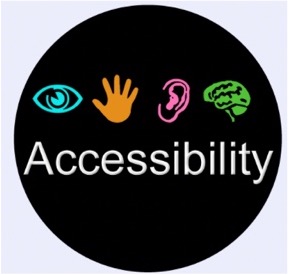
The City University of New York (CUNY) in the United States has created an OER accessibility toolkit to assist librarians, faculty, staff, and developers meet some of the challenges enumerated by UNESCO and UNPRPD. [11] It does not address problems associated with languages, for example, or locating accessible OER resources.
The toolkit contains information on:
Creating Accessible Content: Tips on how to create accessible Word documents, PDFs, images, videos and other multimedia.
Platforms: Which OER platforms are accessible? What are the pros and cons of each one?
Evaluating your OER site: Determine if your site is accessible and see how to fix issues on your site.
Voluntary Product Accessibility Templates (VPATs): Collection of VPATs from various vendors to see relevant information on how a vendor’s product or service claims to conform to IT standards for people with disabilities. (Section 508 Standards in the US Rehabilitation Act).
The University of British Columbia in Canada has published a similar open education toolkit, which is far more detailed than the one produced by CUNY.
There may be a disjuncture in how different authorities determine what is entailed in accessibility. UNESCO includes language, gender, and culture in the OER Recommendation. CUNY, UBC, and other universities examine the technical aspects of accessibility, but not the broader societal issues that also impact on the ability to people to use content.
Much has been written about accessibility policies and there are clearly excellent toolkits available, but it is not always easy to identify accessible OER to support diverse learners. Accessible OERs are not readily apparent on relevant hubs and in Google searches. This appears to be an unmet need for anyone who wants to adapt existing content that is already accessible. In an interview with University World News, Kesah Princely, a blind PhD student in conflict resolution at the University of Buea in Cameroon, outlined some of the accessibility problems he and other students face: [12]
'The challenges are quite enormous. The library is inaccessible to blind students because there are no books in Braille, nor are there audio recorded materials. Infrastructure-wise, it is also not accessible to people in wheelchairs. Some of these students with disabilities are not even aware of the school library, just because things are not well explained to them.
Also, the curriculum is not well designed to suit learners with different abilities. It becomes very difficult for us with visual impairment to comprehend some key courses, especially those which have to do with images. Photojournalism is an example. In other areas, like mathematics and diagrams, the lecturers lack the requisite skills to explain the concepts to learners with visual impairment.'
Gender, cultural, and linguistically sensitive OER
Below are some instances on how gender, culture, and language intersect with content and its use. Not all the examples are openly licensed, but they provide ways to ensure that inclusion is an essential consideration. There is nothing to stop you, the reader, from modelling your efforts on the ideas given in these examples and using an open licence.
Gender
Use of the Internet and other technologies are now essential, for education and much else. UNICEF reports the disparities between the sexes both as users and designers of technology:
'There is a gender digital divide: girls are disadvantaged when it comes to digital adoption, have lower levels of access to and use of digital technology than boys, and often they are not benefitting from digital technology in the same way as boys.'[13]
The UNICEF office for East Asia and the Pacific therefore produced a toolkit of best practices, to support innovators, designers, and implementers of digital products and services, to benefit girls and young women equally and help close the gender digital divide.
Figure 2: Blowing bubbles and writing code at Girls Code Africa
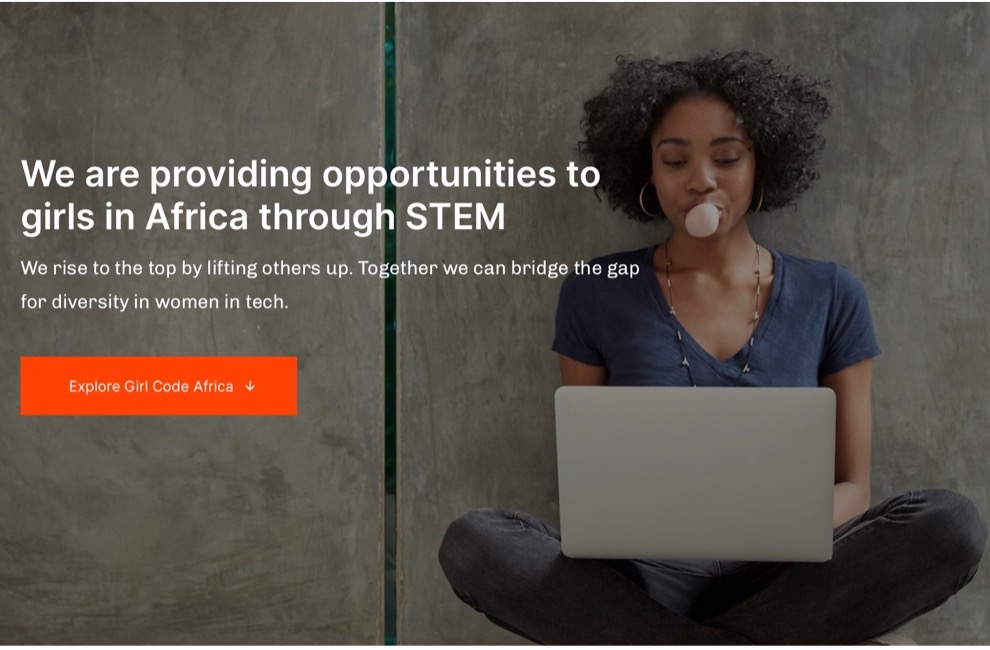
The Women of Uganda Network (WOUGNET) puts ideas about gender-based best practices and training to work. WOUGNET, which partners with many different international organizations, including UN Women, has a mission of promoting the use of ICTs by women and girls for gender equality and sustainable development. There are also many programmes to teach African females of different ages how to code, such as the African Girls Can Code Initiative and Girl Code Africa.
Programs carried out by WOUGNET and the ones to teach girls coding, empower females with the kinds of skills they require in their work and studies. WOUGNET focuses on adult women in training, technical support, networking, and advocacy to empower women. Its workshop on digital security training, for example, showed how social media platforms can be misused to the detriment of women’s safety [14]. Coding is important for a number of reasons. According to the British organization, Funtech, girls who learn to code improve in math, writing, and creativity. Coding also offers girls admission into a variety of tech careers. [15]
Openly licensed digital story platforms, such as African Storybook and StoryWeaver, have numerous stories promoting the roles of girls and women. StoryWeaver has a special section for middle readers on challenging gender stereotypes, which includes a boy who is mocked because he wants to dance and a girl who lifts weights.
Culture and language
In 2019 UNESCO celebrated a Year of Indigenous Languages and marked this effort by releasing the Los Pinos Declaration in 2020. In this document and elsewhere, UNESCO integrates culture and language with several key principles including:
'Centrality of indigenous peoples – ‘Nothing for us without us’, according to the principle of self-determination; the right to use, develop, revitalize, and transmit languages orally and in written forms to future generations which reflect the insights and values of indigenous peoples, their identities and traditional knowledge systems and cultures; the equal treatment of indigenous languages with respect to other languages; and the effective and inclusive participation of indigenous peoples in consultation, planning and implementation of processes based on their free, prior and informed consent right from the start of any development initiative as well as the recognition of the specific barriers and challenges faced by indigenous women, whose identity, cultural traditions and forms of social organization enhance and strengthen the communities in which they live.' [16]
Initiatives that focus on the use of mother-tongue languages sometimes also incorporate gender into their efforts. In 2016, the UNESCO Institute for Lifelong Learning reported on one such instance on maternal health, literacy, and language. In Bolivia, the Ministry of Education, Culture and Sport worked in partnership with the United Nations Population Fund to implement a bilingual literacy project in reproductive health. The project was instituted in response to high levels of illiteracy and high maternal and infant mortality rates among poor people, particularly those from indigenous populations. It employed a gender-based approach and primarily targeted women. Learning was conducted in both indigenous languages and in Spanish. This bilingual approach is vital because it helps learners to comprehend the issues covered, while drawing on the learners' experiences and cultural sensitivities. This initiative was then implemented in Paraguay, Mexico, Peru, Chile, Argentina, and Guatemala, with coordination and support from the Economic Commission for Latin America and the Caribbean (CEPAL/ ECLAC). [17]
In Canada, in response to the COVID-19 pandemic, Indigenous Services Canada works collaboratively with partners to improve access to high quality services for First Nations, Inuit, and Métis. Resources on the platform have been created by the Public Health Agency of Canada, Indigenous Services Canada, and various Indigenous organizations, with a vision to support and empower indigenous peoples to independently deliver services and tackle the socio-economic conditions in their communities. COVID-19 awareness resources are available in English, French, and languages spoken by the indigenous peoples of Canada. [18]
Turning to the youngest learners and nascent readers, Dorcas Wepukhulu of African Storybook explained the importance of using local languages and familiar images as follows:
'For children’s literacy material to be equitable and inclusive, it must be appropriate for the child’s context and age, with images that make sense to the child and support the meaning of the written text, it must also be available, accessible and affordable. With technology and open licensing, ASb aims to get storybooks to every child learning to read, in a language that is familiar to them; with content that speaks to their interests, and experience.' [19]
Interconnections and complexity
The UNESCO OER Recommendation is about creation and utilization of openly-licensed content. This action area on accessibility, inclusion, and equity addresses the underlying issues that are necessary to both produce and use OER. Governmental policies and implementation are critical to the success of the Recommendation if it is to have benefit. Some areas are technical, but others impact on cultural assumptions, towards language, for instance, or girls’ education. The complexity of action item three is therefore notable.
References
[1] Guideline authors include OER experts in the action areas covered by the UNESCO OER Recommendation and listed in alphabetical order: Tel Amiel, Javiera Atenas, Melinda dela Peña Bandalaria, Neil Butcher, Lisbeth Levey, Ahmed Tlili, and Zeynep Varoglu
[2] MANDILLAH, Lucy. Kenyan curriculum reforms and mother tongue education: Issues, challenges and implementation strategies. Educ. as change [online]. 2019, vol.23, n.1 [cited 2022-11-18], pp.1-18. Available from: <http://www.scielo.org.za/scielo.php?script=sci_arttext&pid=S1947-9417201.... ISSN 1947-9417. http://dx.doi.org/10.25159/1947-9417/3379.
[3] “Mother tongue won’t help you eat”: Language politics in Sierra Leone. https://www.researchgate.net/publication/345815874
[4] https://unesdoc.unesco.org/ark:/48223/pf0000380471
[5] Rets, I., Coughlan, T., Stickler, U., & Astruc, L. (2020). Accessibility of Open Educational Resources: how well are they suited for English learners? Open Learning, 1-20. https://doi.org/10.1080/02680513.2020.1769585 (This journal requires a subscription to access articles or a fee of $47 for purchase.)
[6] Coolidge, A., Doner, S., Robertson, T., & Gray, J. (2018). BCcampus open education: Accessibility toolkit (2nd ed.). https://opentextbc.ca/accessibilitytoolkit/
[7] Ibid.
[8] UNICEF. (2021). Responding to COVID-19: UNICEF annual report 2020. https://www.unicef.org/media/100946/file/ UNICEF Annual Report 2020.pdf
[9] Zhang, X., Tlili, A., Nascimbeni, F., Burgos, D., Huang, R., Ting-Wen Chang, Jemni, M., & Mohamed, K. K. (2020). Accessibility within open educational resources and practices for disabled learners: A systematic literature review. Smart Learning Environments, 7(1), 1-19. https://doi.org/10.1186/s40561-019-0113-2
[10] Anderston, T., Doney, J., Hendrix, B., Martinez, J., Stoddart, R., & Wright, M. (2019). The five laws of OER: Observations from Ranganathan. Journal of Librarianship and Scholarly Communication, 7(1), https://www.iastatedigitalpress.com/jlsc/article/id/12846/
[11] CUNY OER accessibility toolkit, last updated 2021. https://guides.cuny.edu/accessibility/home
[12] Njie, Paul. (2022). All students must learn about inclusive education – Activist. University World News. https://www.universityworldnews.com/post.php?story=202211161601561
[13] https://www.unicef.org/eap/innovation-and-technology-gender-equality
[14] https://wougnet.org/website/news/newsingle/70
[15] https://funtech.co.uk/latest/why-should-girls-learn-to-code
[16] https://en.unesco.org/sites/default/files/los_pinos_declaration_170720_en.pdf
[18] https://www.sac-isc.gc.ca/eng/1586548069915/1586548087539
The Association of African Universities (AAU), in collaboration with Saide, invite all suitably qualified persons to respond to this call for the pilot course entitled: 'Continuous Professional Development course for University Leaders.'
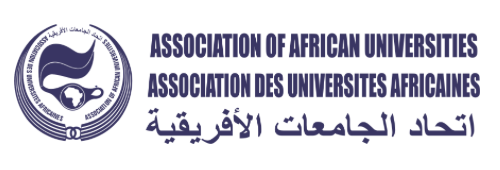
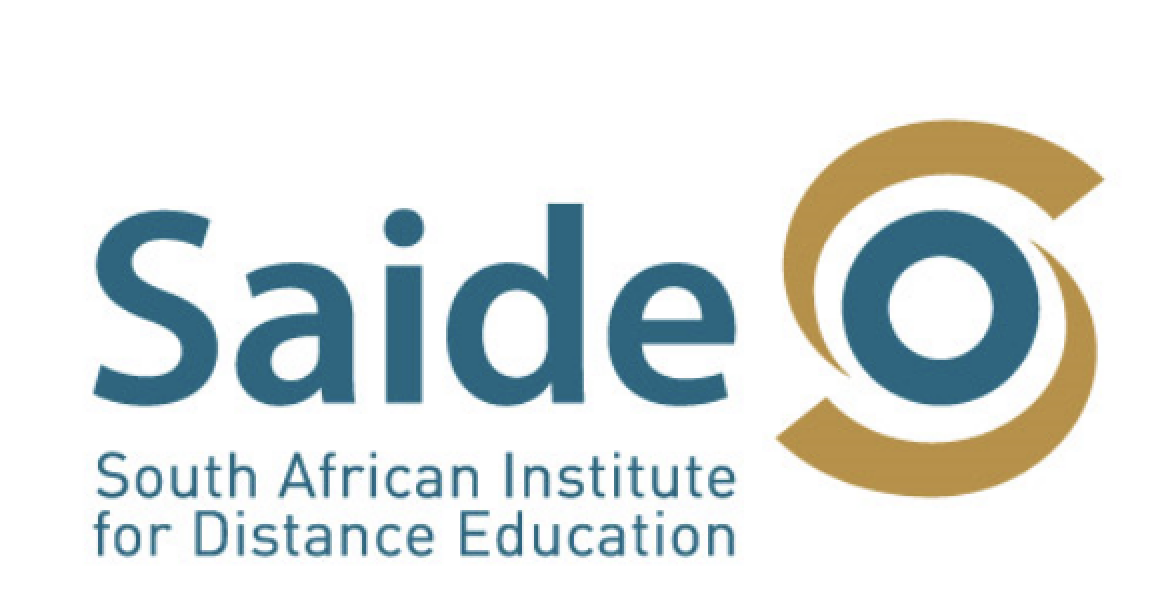
Background
The Association of African Universities (AAU) whose headquarters is in Accra, Ghana (www.aau.org and www.blog.aau.org) invites all suitably qualified persons to respond to this call for the pilot course entitled: Continuous Professional Development course for University Leaders. The course will be presented in collaboration with Saide. The AAU is the Apex Body and Voice of Higher Education in Africa, the implementing arm of the African Union on Higher and Tertiary Education matters as well as the Coordinator for the African Union Commission’s Continental Education Strategy for Africa (CESA 2015-2025) Cluster on Higher Education. The AAU works in four languages - Portuguese, Arabic, English and French. Therefore, facilitators from these linguistic backgrounds are encouraged to respond to this call. Kindly complete the online form through this link which you can copy and paste onto any browser. https://www.surveymonkey.com/r/PILOT16ONLINE9LEADERSHIP2022
Aim
The aim of this course is to enable university leaders to change and improve the Continuous Professional Development (CPD) strategy or develop one if their institution does not have such a strategy.
Course Objectives
By the end of the course participants should
i) be able to address questions related to establishing and improving CPD at an institution
ii) be able to figure out how purposeful academic professional development can take place in their institutions, and how it can be changed and improved.
iii) have a tool that you can share and discuss with colleagues and complete, adapt and implement in your own time.
Start date
Monday 17 October 2022, 13h00 GMT
The course will be offered in English only. It will later be translated into other languages.
For more information, access the document below.
The 5th of October is International Teachers’ Day! Part of why the world nominates one day a year to pat teachers on the back is because parents and students DO appreciate those educators who find ways to keep students excited about learning.
The 5th of October is World Teachers’ Day! It is wonderful to receive global affirmation for the important contribution we teachers make. Please bask in the attention, which is well deserved.
But come the 6th of October the world shifts focus. Apparently, it is World Pumpkin-Seed Day and/or Take Your Daughter to Work Day, depending on who you ask. In the meantime, we will be left to get on with the job of preparing and empowering the next generation for another year.
Part of why the world nominates one day a year to pat teachers on the back is because parents and students DO appreciate those educators who find ways to keep students excited about learning. There is effort required to do this successfully. We are always on the lookout for creative and innovative methods. We are constantly scouring our surroundings for appropriate resources. This all takes time and creativity.
That’s where Open Educational Resources, or OER, can make a difference. According to Creative Commons, the open licensing authority, there are over two billion openly licensed resources on offer[1], free of charge, which permit adaptation to new teaching and learning contexts. In turn, we are encouraged to share our best work with others. The catch is that not all teachers know how to search, find, adapt, and share OER.
OER Africa has recently worked with UNESCO’s Regional Office for Southern Africa, based in Harare, to put together a series of four short tutorials on using, finding, adapting, and sharing OER for Zimbabwean educators. While these tutorials address the Zimbabwean context, they would be of interest for all educators wherever you are in the world.
The tutorials can be accessed here:
Tutorial 1: Using OER for teaching and learning
Adapted: March 2021
Short tutorial that defines OER, outlines their benefits in comparison to fully copyrighted teaching materials and introduces Creative Commons licencing and how to decipher them.
Click here to access the PDF version of this tutorial.
--------------------------------------------------------------------------------------------
Tutorial 2: Finding OER for teaching and learning
Adapted: March 2021
Short tutorial that demonstrates how to search for resources aligned to the MoPSE Zimbabwe curriculum using search tools such as Google Advanced search, Google image search, Creative Commons search and YouTube filters. It also investigates a number of open repositories ideal for primary and secondary educators.
Click here to access the PDF version of this tutorial.
--------------------------------------------------------------------------------------------
Tutorial 3: Create your own OER
Adapted: March 2021
Short tutorial on how to adapt existing OER and also what to consider when developing your own open resources. It also demonstrates how to generate your own licence plate using the Creative Commons Licence Generator tool.
Click here to access the PDF version of this tutorial.
--------------------------------------------------------------------------------------------
Tutorial 4: Share your OER with others
Adapted: March 2021
Short tutorial on how to publish your open resources on both the Zimbabwe EduConnect portal and also on OER Commons. The tutorial also provides teachers with a set of criteria to ensure high quality of published open resources.
Click here to access the PDF version of this tutorial.
--------------------------------------------------------------------------------------------
Why not invest a little time to acquire the skills to harness OER? The payoff is that you will be able to mine quality resources developed by your global peers to make your lessons even richer and more engaging than they already are. And, by sharing your best work, you can, in turn, receive global exposure and affirmation for your creativity and innovation every day of the year. Why wait until the next World Teachers’ Day before people notice the valuable contributions you are making for the next generation?
Related articles:
- What is the Purpose of Assessment? Looking at assessment of, for, and as learning
- International Literacy Day 2022: ‘Transforming Literacy Learning Spaces’
- Reinvigorating Libraries: South African Library Week 2022
- Open Pedagogy
What initiatives or organizations do you know of who are transforming literacy learning spaces in Africa? UNESCO marks International Literacy Day every year to remind people of the importance of literacy as a matter of dignity and human rights. The theme for this year’s International Literacy Day is ‘Transforming Literacy Learning Spaces’.
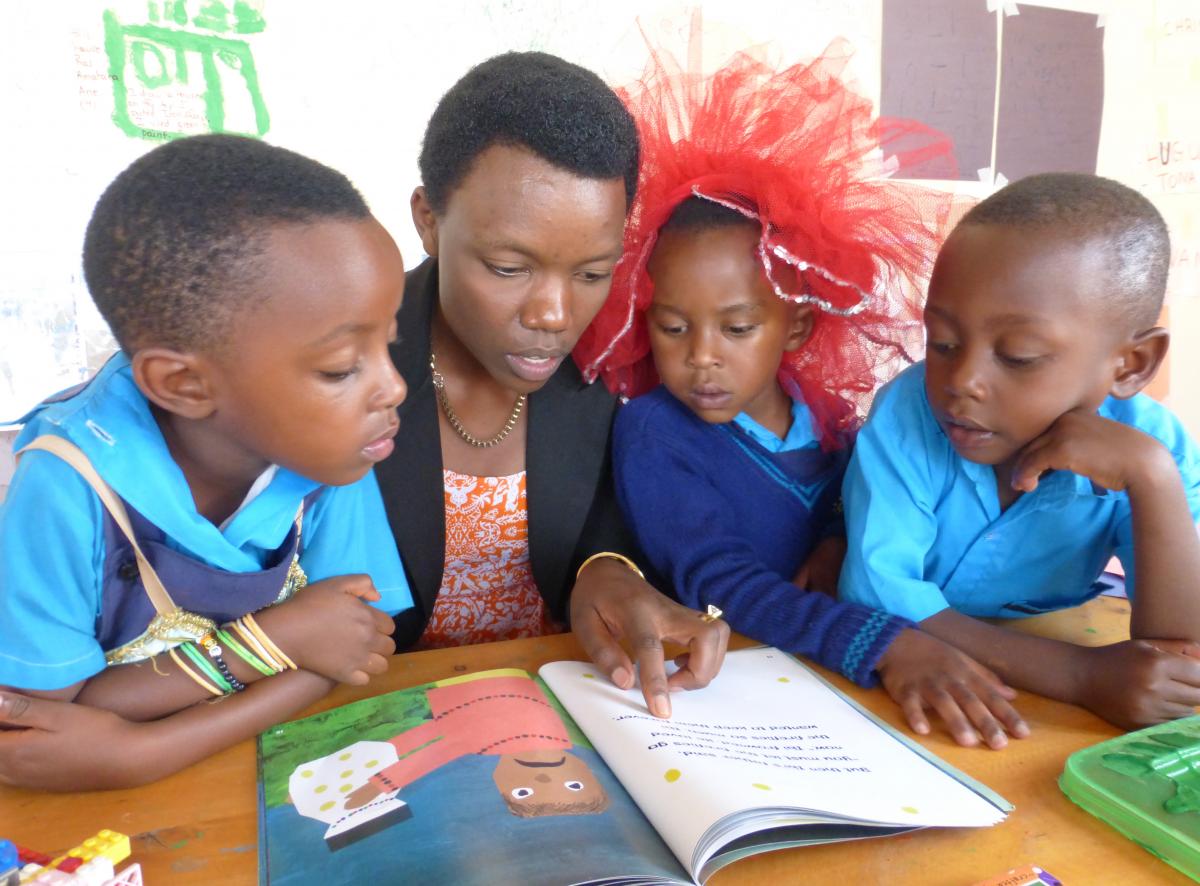
Image courtesy of TEACHRwanda, Wikimedia CC BY-SA 4.0
UNESCO marks International Literacy Day every year to remind people of the importance of literacy as a matter of dignity and human rights. Unfortunately 771 million illiterate people around the world still lack basic reading and writing skills.[1] The theme for this year’s International Literacy Day is ‘Transforming Literacy Learning Spaces’. Because literacy learning goes beyond the classroom, what spaces can we transform to teach reading and writing, especially to more women and girls, to ensure they can become lifelong learners?
Literacy is more than mere cognitive skills; it encompasses the social contexts, purposes, and relationships in which literacy is actively used. Functional literacy implies that a person can apply their skills in social, cultural and economic contexts. Moreover, the notion of literacy should be understood as a continuum of different proficiency levels of literacy and numeracy skills.[2]
Libraries are critical literacy learning spaces for both children and adults. During the piloting of an Early Literacy Development Course for Librarians, Dr Nkem Osuigwe, Director of Human Capacity Development and Training of the African Library and Information Associations and Institutions (AfLIA), asked participants:
"Have you ever wondered why some children find it easy to learn in primary school, while some do not? Have you ever thought about how learning to speak and communicate in the mother tongue affects children when they start school and have to learn concepts in another language that they call official? Don’t you think this affects how we imbibe knowledge, keeping what is learnt at school, different from what we learn and do at home. As library staff, has it ever occurred to you that your library can change the trajectory of the lives of children in your community?"[3]
Public libraries in Africa are increasingly required to do more with less, while providing vital access to reading material and resources for communities and individuals who cannot find such support elsewhere. Dr Osuigwe says of open educational resources (OERs):
"This is an area that people do not know much about, and it’s also an area that will help librarians generate more resources for their user communities. Where they can go and learn how to collaborate with others and to create resources if needs be."[4]
OERs are created to be free to use, share, and adapt. They have the potential to reduce accessibility barriers by implementing best practices in teaching and being adapted for local unique contexts and diverse learning needs, therefore transforming learning spaces to be relevant and effective.
Librarians like Dr Osuigwe are making great progress in transforming libraries in Africa to be more inclusive and ensure access to more books in more local languages, aided by technology and OER. Libraries can provide women and girls the space and opportunity to learn. Across the globe, women face greater literacy challenges than do men. Two thirds of people who lack basic literacy skills are women. Social inequalities, cultural biases, structural barriers to education, and stereotyped gender roles are often at the root of this. And, yet, women’s literacy is key to sustainable development. Educating women contributes to creating a better life for them and their families, as well as enabling the wellbeing and economic productivity of their communities. Better educated women often support and improve their children’s academic achievement.
Some of the ways that libraries can support literacy learning for women and girls include:
-
Creating a safe and welcoming space: for example, ensure there is trustworthy security, establish special events, and promote reading and writing by designing competitions.
-
Building a collection of resources relevant to the lives of women and girls. This could include materials on health, parenting, and entrepreneurship for women, story times for mothers and young children.
-
Establishing partnerships with local organizations such as women’s centres and family planning centres.[5]
African Storybook (ASb) is transforming how African children can access storybooks and even stories that have been passed down orally – and it uses open licensing to do this. Dorcas Wepukhulu[6] discusses how ASb taps into the rich storytelling and oral tradition of Africa and, supported by technology, provides opportunities for stories to be written, published, and openly shared on the ASb website in underserved languages. As she says,
"various social aspects of life are better learnt or passed on from one generation to the other through stories and parables, whether orally or in a written form, rather than more didactically in a formal classroom setting…Language has the power to limit and exclude and it also has the power to broaden opportunities, promote creative expressions and foster social belonging."
Literacy learning does not just rely on physical spaces. Virtual spaces are also now opening opportunities for literacy development, particularly in underserved languages.
AfLIA and ASb are just two initiatives that are working to transform the literacy learning spaces in Africa to foster equality and inclusion through open learning practices and OER. Globally, the UNESCO Institute for Lifelong Learning (UIL) and the Commonwealth of Learning (COL) have published Guidelines on open and distance learning for youth and adult literacy to support literacy providers around the world in planning, implementing, monitoring and evaluating open and distance learning-based (ODL) literacy programmes. It includes practical ideas and a comprehensive list of OER that can be used to incorporate open learning practices into literacy programmes – which now include online and offline spaces to ensure literacy learning is accessible, inclusive, and reaches more youth and adult learners.
What initiatives or organizations do you know of who are transforming literacy learning spaces in Africa? Tag these organizations on social media using the hashtag #OERAfricaCelebratesInternationalLiteracyDay. Follow us on Twitter, Facebook, and LinkedIn.
Related articles:
- International Youth Day: Open learning as a driver to realising the Sustainable Development Goals?
- World Intellectual Property Day: A note on open licensing and intellectual property
- Reinvigorating libraries: South African Library Week 2022
- Opening education: What role do librarians on the African continent play?
[1] UNESCO. (2022). https://events.unesco.org/event?id=2036446720&lang=1033
[2] Hanemann, 2015 in UNESCO Institute for Lifelong Learning and Commonwealth of Learning. (2021). https://unesdoc.unesco.org/ark:/48223/pf0000379397
[3] Rencken, L. (2022.) https://www.earlyliteracynetwork.org/blog/quick-look-aflias-early-literacy-development-course-first-cohort-receives-their-certificates
[5] Code Libraries. (2013.) https://codelibraries.wordpress.com/girlswomen/
Since 2018, OER Africa has partnered with the Partnership for Enhanced and Blended Learning (PEBL) Project, a collaborative project to develop blended learning courses with university partners across East and West Africa. PEBL is using our platform to showcase the courses as OER.
Since 2018, OER Africa has partnered with the Partnership for Enhanced and Blended Learning (PEBL) Project, a collaborative project to develop blended learning courses with university partners across East and West Africa. PEBL is using our platform to showcase the courses as OER.
On the 12th August, we celebrate International Youth Day. This year’s theme is ‘Intergenerational Solidarity: Creating a world for all ages’. The theme encourages people to think about how to harness the full potential of all generations to achieve the Sustainable Development Goals.
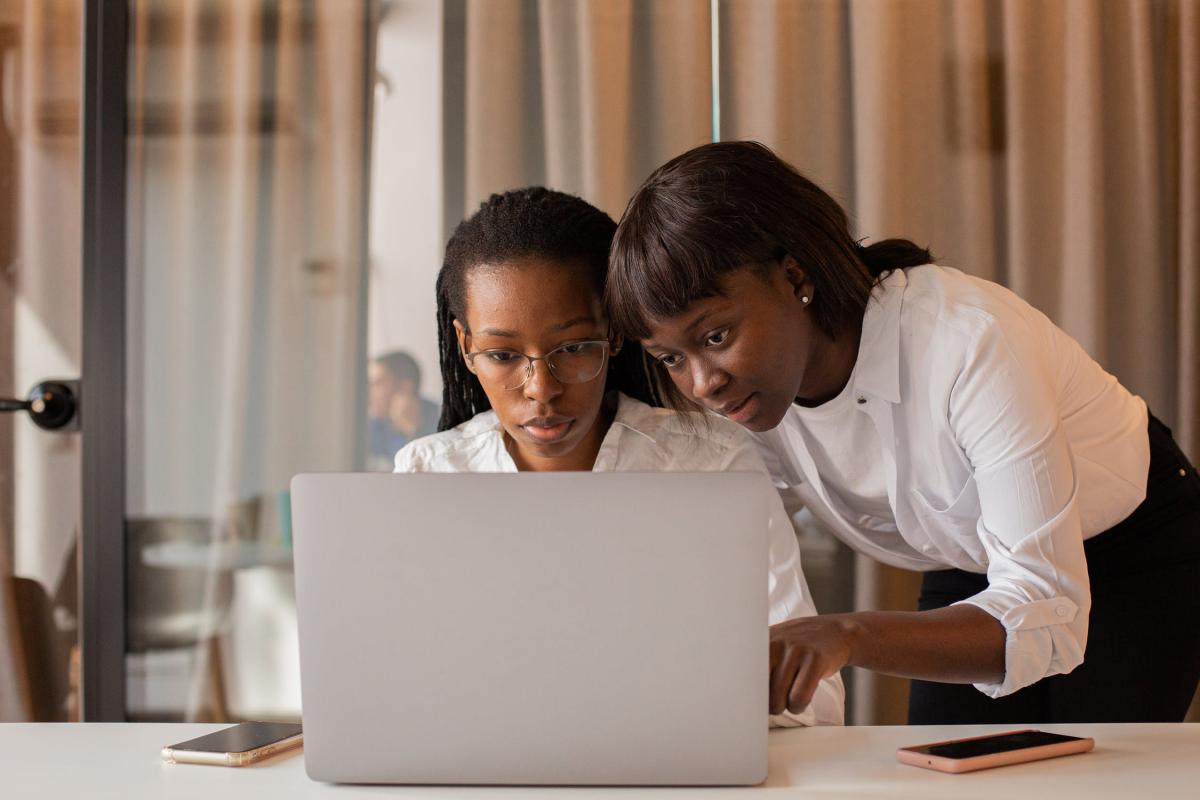
Image courtesy of Monstera, Pexels, see licence
On the 12th August, we celebrate International Youth Day. This year’s theme is ‘Intergenerational Solidarity: Creating a world for all ages’. The theme encourages people to think about how to harness the full potential of all generations to achieve the Sustainable Development Goals. Given that youth[1] constitute approximately 16% of the global population, the decisions and investments we make in empowering them are a strong predictor of success in realising sustainable development for societies. However, one of the main barriers to sustainable development is unequal access to high quality education, which disproportionately affects young people. So, it makes sense to ask: how can we create a world where people of all ages have access to the same educational opportunities, and what role are youth playing in this quest? At OER Africa, we strongly believe that part of the answer lies in open learning.
Around the world, youth have held a mirror to society and have questioned the status quo. They have asked important questions about social structures, politics, economics, and power dynamics. Young people are becoming increasingly influential in different spheres, including the education sector. One would be hard-pressed to find a comparable period in history where youth have been able to voice their experiences to such a wide audience and incite change as a collective. The past decade has seen youth ask valid questions about education systems, how they function, and who they serve. Their concerns have stemmed primarily from inequitable access to high quality education. For example, angry youth in Chile recently protested expensive and poor-quality school and university education, echoing South Africa’s #FeesMustFall protests which have raged intermittently since 2015.
High quality education still eludes a significant proportion of the world’s population, even though the right to education is enshrined in the Universal Declaration of Human Rights. At the United Nations Headquarters’ OpenCon UN in 2018, Rajiv Jhangiani explained,
Many of you will recall these words from Article 26 [of the Universal Declaration of Human Rights]:
‘Everyone has the right to education.’
And yet, over 265 million children are currently out of school.
‘Education shall be free, at least in the elementary and fundamental stages.’
And yet, 57 million out-of-school children are of primary school age.
‘Technical and professional education shall be made generally available’
And yet 617 million youth worldwide lack basic mathematics and literacy skills.
‘higher education shall be equally accessible to all on the basis of merit.’
And yet, by 2025 tertiary education worldwide will need to find a way to provide 100 million additional seats.[2]
Done well, open learning can provide part of the answer to the question of how we can rebuild education systems to be more inclusive, accessible, and meaningful. Open learning is an approach to education which has two primary aims: first, it seeks to remove barriers to learning and second, it aims to give students a reasonable chance of success in an education and training system that directly addresses their needs. At its core is the quest to democratise access to quality education, as it seeks to ‘allow as many people as possible to take advantage of affordable and meaningful educational opportunities throughout their lives through: sharing expertise, knowledge, and resources; reducing barriers and increasing access; and acknowledging diversity of context.’[3] This definition is a fundamentally inclusive one that works toward the idea of an education system that serves all.
Saide (nd) highlights the following key principles of open learning, which acknowledges the need for flexible, meaningful, learner-centred education throughout one’s life:
- Learners are provided with opportunities and capacity for lifelong learning
- Learning processes centre on the learners and the contexts of learning, build on their experience and encourage active engagement leading to independent and critical thinking
- Learning provision is flexible, allowing learners to increasingly determine where, when, what and how they learn, as well as the pace at which they will learn
- Prior learning and experience is recognised wherever possible; arrangements for credit transfer and articulation between qualifications facilitate further learning
- Providers create the conditions for a fair chance of learner success through learner support, contextually appropriate resources and sound pedagogical practices.[4]
One of the most well-known elements of the open learning ecosystem is Open Educational Resources (OER), which are teaching, learning, and research resources that exist in the public domain or have been released under an intellectual property licence that allows others to use and/or repurpose them. If used to support effective pedagogical practices, OER can make a significant contribution to advancing the principles of open learning (though the use of OER should not be conflated with the adoption of open learning principles).[5] There are several case studies that demonstrate the impact of OER initiatives, including OER Africa’s recent research on OER initiatives in African higher education and our collaboration with the Network of Open Orgs to develop a set of seven case study summaries and accompanying report that explore the successes of OER. This research has demonstrated how OER initiatives have succeeded in improving access to educational materials, mainstreaming the use of OER into institutional practices, and developing resources and research, amongst other successes.
The growth and adoption of OER is also spurring the rise to other notable open movements, such as the Open Access (OA) movement. OA generally refers to research outputs that are distributed online, which are free of cost and may be licensed with a Creative Commons licence to promote reuse. OA journals are growing in popularity, and websites like DOAJ curate and index directories of such journals. OA can be used as OER if the open content is used in a teaching/learning context.
However, the use of open licensing does not automatically lead to better education systems, nor does it allay the need to address educational challenges from multiple angles. Butcher and Hoosen (2019) stress that opening access to educational opportunities through tools like open licensing is only part of the work of creating effective education systems.
'… it is important to recognize that designing and implementing effective educational environments is critically important to good education and encompasses many more dimensions than simply opening access to educational materials using open licensing. Thus, OER should not be regarded as a panacea to challenges facing education systems but are nevertheless a potentially important contributor to bridging gaps in access and equity in education'.[6]
Open learning principles provide a foundation on which we can rebuild education systems to better serve people on their lifelong learning journey, starting with the youth. Open learning is one of the most apt expressions of intergenerational solidarity: when we collectively seek to improve access to and quality of education, we can fully harness human potential and move society towards sustainable development. So, as we celebrate this day, let us also remember that we each have a role to play in this pursuit.
Related articles:
- Researching OER initiatives in African higher education
- Researching the benefits of OER through the Network of Open Orgs
- Empowering youth to transform food systems: the role of OER
- Why is 'Open Education' important?
[1] For these purposes, youth are defined as people between the ages of 15 and 24 years
[2] Taken verbatim from Jhangiani, R. (2018). Open Educational Practices in Service of the Sustainable Development Goals. Retrieved from https://thatpsychprof.com/open-educational-practices-in-service-of-the-sustainable-development-goals/
[3] OER Africa. (no date) Understanding OER. Retrieved from https://www.oerafrica.org/sites/default/files/2018.08.Web-Understanding%20OER.pdf
[4] Taken verbatim from Saide. (no date). Open Learning - A brief introduction to open learning principles. Retrieved from https://www.saide.org.za/article.php?id=5
[5] See https://www.oerafrica.org/system/files/13409/oer-africa-2019-research-report.pdf?file=1&type=node&id=13409&force=1
[6] Butcher, N. and Hoosen, S. (2019). Harnessing OER Practices to Drive Pedagogical Improvement: The Role of Continuing Professional Development. Retrieved from https://www.oerafrica.org/system/files/13409/oer-africa-2019-research-report.pdf?file=1&type=node&id=13409&force=1
What is personal information? What is a Cookie Consent popup on a web page? What are the General Data Protection Regulation (GDPR) and Protection of Personal Information Act (POPIA), the GDPR’s South African equivalent? This week’s post looks at recent legislation around personal information and how we need to consider protecting it when working with OER and open education practices.

Data protection by Nick Youngson CC BY-SA 3.0 Pix4free
What is personal information? What is a Cookie Consent popup on a web page? What are the General Data Protection Regulation (GDPR) and Protection of Personal Information Act (POPIA), the GDPR’s South African equivalent? This week’s post looks at recent legislation around personal information and how we need to consider protecting it when working with OER and open education practices.
When you open a webpage, you may have noticed that there is often a pop-up on the page which asks if you accept the website recording your interactions with it. There are many different formats; this is the one we use on the OER Africa website:
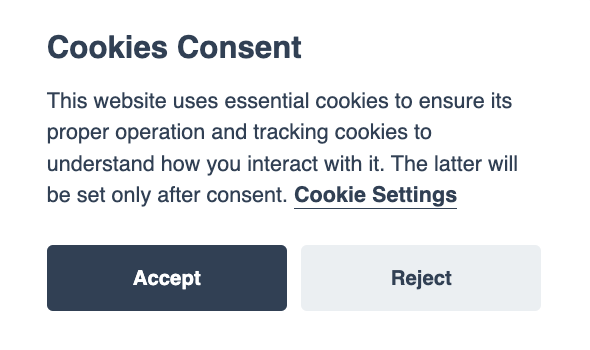
Most websites use HTTP cookies (web cookies, browser cookies). These are small pieces of data created by a web server while a user is browsing a website, which are placed on the user's computer or other device (Source: Wikipedia). Cookies serve important functions, such as authenticating the user and storing sensitive information. If you click “Accept”, then cookies will be set on your device, whereas if you click “Reject”, you may not receive the full user experience on certain websites. ‘Tracking cookies’ collect long-term records of individuals’ browsing histories and can be used to target advertisements to individuals. This has led to concerns about invasion of privacy, resulting in countries and blocs of countries requiring ‘informed consent‘ from the user before data is captured. The European Union enacted the GDPR that requires users to ‘opt in‘ to their cookies being stored. Similar legislation has been legislated elsewhere, for example the California Consumer Privacy Act (CCPA) in the US, and POPIA in South Africa. The African Union has called for the adoption of a common framework on the protection of data and at least six countries have adopted laws for the protection of their citizens (Daigle, 2021).
This short video explains how the GDPR works. Although it relates to Europe, data privacy laws in other countries work in similar ways.
How does this relate to OER?
As the name suggests, privacy and personal data protection legislation is intended to protect people from having their personal information accessed without their consent. There are two main ways in which personal data might be at risk when working with OER.
First, there is evidence that ransomware and related attacks target the education system, specifically school and university websites (Zdravkova, 2019) and that the attackers have accessed email addresses and other data from students and staff to mount the attacks. If you access a site that includes OER or open courseware, ideally you should be presented with a cookie consent form. You can then choose whether you allow yourself to be tracked and what data the website may use. For example, the UK-based Open University website includes a cookie consent popup on opening. While Khan Academy does not have one, it does have a page explaining its policy on cookies. Others, such as the MIT Open Courseware Repositoryand the South African Siyavula website (openly licensed school science and mathematics resources), do not show a popup on opening. Users need to be aware of the possible risks they face when using such webpages; their browsing history may be tracked. In the commercial world, unscrupulous companies sell user data to other companies for profit.
Second, many online activities require users not to be anonymous when working with OER. When creating an OER a person would normally provide their name and (possibly) their affiliation. In giving this information, users should be aware that the information can be shared widely. More importantly, if you are working with students, they need to be aware of their rights to informed consent. For example, if you are working with students on platforms such as learner forums, Twitter, Facebook, and Wikipedia, they should be aware that their data are being shared. Large companies usually list consent within their Terms of Use/Terms and Conditions, which can be very extensive, couched in legal language and are often not read by the user before being signed. We recommend that universities should adopt data consent policies for their students, and that academics and librarians should make students aware that their consent must be freely given, specific and unambiguous. Such consent may constrain existing practices, for example if an academic sets the writing of a Wikipedia article or a series of tweets as an assignment, the student cannot be forced to create a social media account in order to comply with the assignment.
In summary, with the rise of digital technologies (particularly smartphones) personal information of users can be easily accessed and tracked. If they register on a site, the information may include their browsing history, email address and any other details they have entered. People accessing and creating OER should be aware of the risks of allowing access to their personal information: OER repositories should consider including cookie consent popups, while data consent policies need to be made clear to all users.
References
- Daigle, B. (2021). Data Protection Laws in Africa: A Pan-African Survey and Noted Trends. Journal of International Commerce and Economics, February 2021. Retrieved from https://www.usitc.gov/publications/332/journals/jice_africa_data_protection_laws.pdf
- van Valkenburg, W. (2018). GDPR and Open Education. Retrieved from http://www.e-learn.nl/2018/04/08/gdpr-and-open-education
- Zdravkova, K. (2019). Compliance of MOOCs and OERs with the new privacy and security EU regulations. 5th International Conference on Higher Education Advances. Retrieved from http://www.headconf.org/wp-content/uploads/pdfs/9063.pdf
Related articles
This research report on Continuing Professional Development strategies in Higher Education Institutions was developed to provide a basis for the development of an online CPD course for senior managers in African universities. It comprises a review of global CPD initiatives; Learnings from the piloting of CPD learning pathways; A framework for CPD activities for higher education; and Preliminary guidelines for supporting Open Educational Resource practices through CPD.
This research report on Continuing Professional Development strategies in Higher Education Institutions was developed to provide a basis for the development of an online CPD course for senior managers in African universities. It comprises a review of global CPD initiatives; Learnings from the piloting of CPD learning pathways; A framework for CPD activities for higher education; and Preliminary guidelines for supporting Open Educational Resource practices through CPD.
What have been the experiences of African Open Educational Resources (OER) initiatives focussed on higher education? What can we learn from these experiences? Although the concept of OER initially gained publicity in the Global North, OER are gaining traction in Africa. OER Africa researched several African OER initiatives to assess their long-term contribution to establishing sustainable OER practices in African higher education.
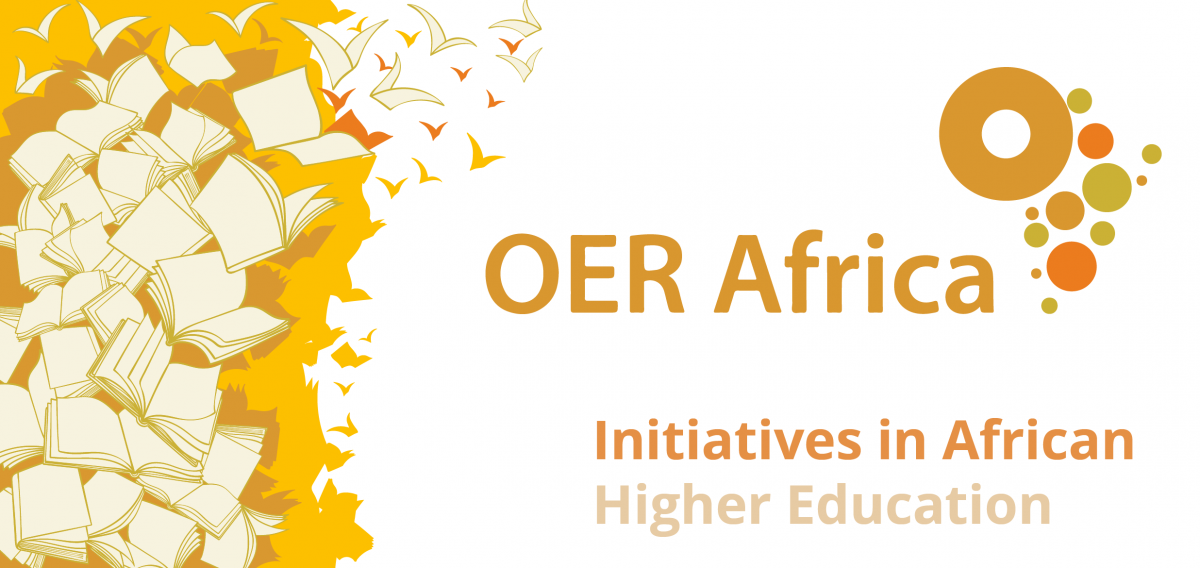
What have been the experiences of African Open Educational Resources (OER) initiatives focussed on higher education? What can we learn from these experiences? Although the concept of OER initially gained publicity in the Global North, OER are gaining traction in Africa, with an increasing number of OER initiatives focusing on areas such as OER advocacy, practice, and research. Today, the concept has been mainstreamed around the world, as exemplified through the unanimous adoption of the UNESCO Recommendation on OER in 2019.
OER Africa researched several African OER initiatives to assess their long-term contribution to establishing sustainable OER practices in African higher education. This work explored their effectiveness and identified lessons to enable better development and support of OER practices. It also helped to deepen OER Africa’s understanding of professional development needs amongst African academics to enable more effective OER practices.
To do this, we developed case studies on eleven African OER initiatives in higher education to gain an understanding of the effectiveness of each initiative, followed by an analytical summary report. The report collates the findings from the OER initiatives , highlighting the implications of the findings for better development and support for effective OER practices.
Access the case studies and report here.
Related articles:
Museums tell ancient and recent histories as they collect, safeguard, and make accessible artefacts and specimens that they hold in trust to inspire and enable people to explore, learn, and enjoy. They continue to evolve in their roles and contribution to education as they embrace open access and Open Educational Resource (OER) principles.
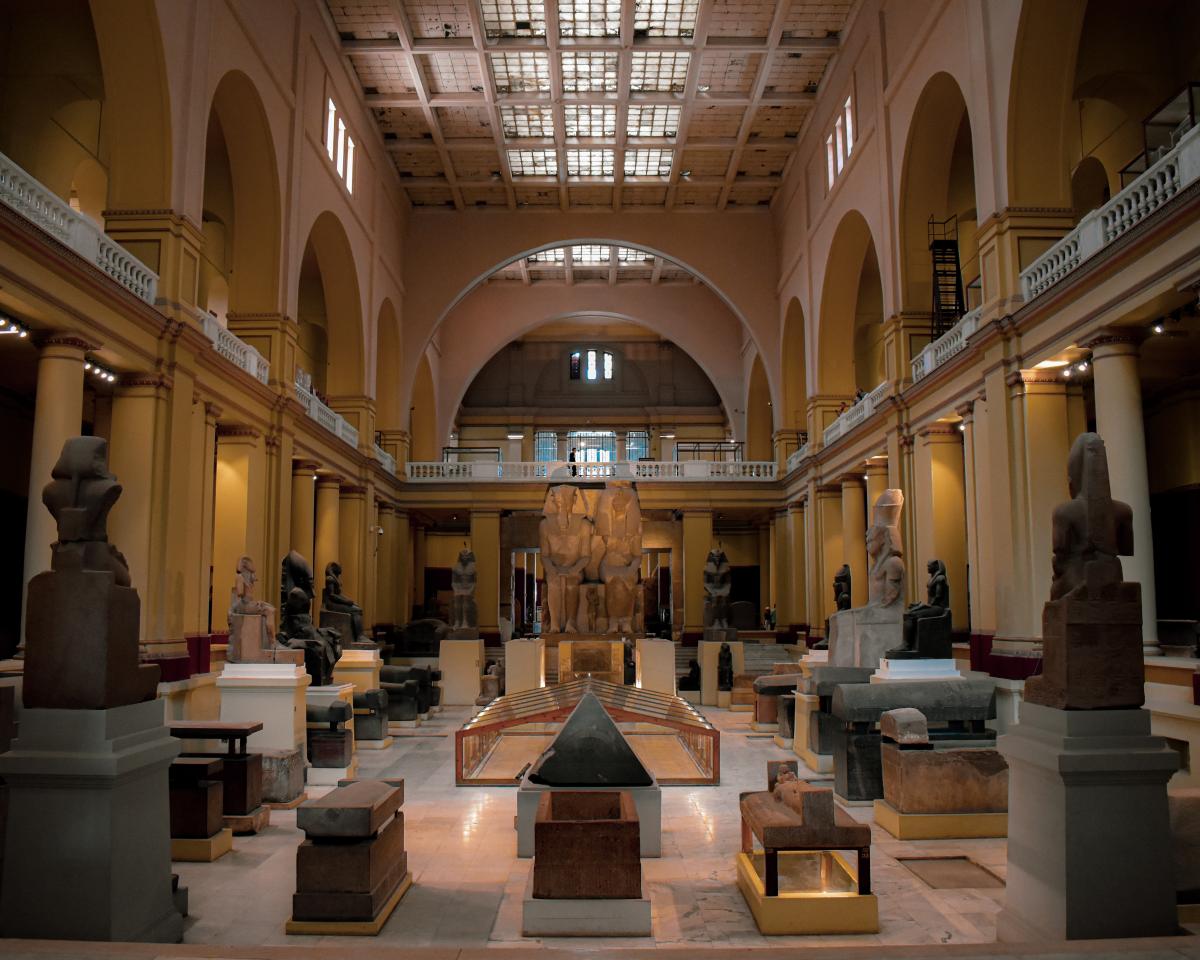
Image courtesy of Abdullah Elhariry, Unsplash (Unsplash licence)
Museums continue to evolve in their roles and contribution to education as they embrace open access and Open Educational Resource (OER) principles. Museums are joining the open access movement by, for example, providing high-resolution downloadable images free of charge to maximise the ability of people to interact with, share, and reuse their collections.
Museums tell ancient and recent histories as they collect, safeguard, and make accessible artefacts and specimens that they hold in trust to inspire and enable people to explore, learn, and enjoy. All museums support education as they provide unique prospects and platforms to engage students in their spaces and through their exhibitions, presentations, lectures, and discussion sessions on history, science, mathematics, technology, medicine, arts, politics, religion, humanities and social sciences, among others.
The Shenzhen Declaration on Museums and Collections of the UNESCO High-Level Forum on Museums from 2016 promoted the educational role of museums and the adaptation of museums' contents to provide a variety of formal, non-formal, and lifelong open learning experiences through universal accessibility for various audiences and removal of barriers to disadvantaged groups and persons with specific needs and capacities.
Learning about history and culture includes learning about all the aspects of the human ‘being’ and their day-to-day life. For example, if a student visits a museum and explores an exhibition dealing with historical figures or events involving aviation, the student is likely to be intrigued to want to learn more about flying which may not have been introduced as a vocation in the classroom. In such a case, the museum experience could well be an initial influence on future life choices of the students.
Museums are adopting open access to increase public engagement with their collections, introduce news areas of operation, and collaborate with creators and other institutions of learning, including universities, colleges, and schools.
The challenges of COVID-19 lockdowns in the past two years left museums without visitors, prompting them to accelerate digitization of their collections and adopt open licences for learners and academics to access their holdings as part of their learning or academic research. Since the start of the COVID-19 pandemic, nearly 1,000 cultural heritage institutions around the world have adopted open licences to provide virtual access to their collections and resources.
Open access for museums refers to efforts made by museums to digitise their collections allowing for the creation of virtual exhibitions and databases or libraries, which are accessible online, containing high-resolution downloadable collections of digitised images of artefacts and information resources, including text, photos, movies, audio files, maps, graphs, and links to other sites.
Some of the digitised museum collections for Africa and African resources include the following:
African Online Digital Library (AODL) – AODL is an open access digital library of African cultural heritage materials created by Michigan State University in collaboration with museums, archives, scholars, and communities globally.
Smithsonian Open Access National Museum of African American History & Culture – The Smithsonian Institution is the world’s largest museum, education, and research complex, with 21 museums and the National Zoo—shaping the future by preserving heritage, discovering new knowledge, and sharing resources with the world. The Smithsonian National Museum of African American History and Culture is exclusively devoted to the documentation of the African American life, history, and culture. The museum has collected more than 40,000 artefacts. The images and data are in the public domain under the Creative Commons Zero (CC0) licence, allowing use, transformation, and sharing of the open access assets without asking permission from the Smithsonian.
COM Library - African Art – This hub of open access resources for African art features Google Arts and Culture content from over 1,000 leading museum and archives that have partnered with Google Cultural Institute to bring the world’s treasures online.
Adoption of open access and OER principles by museums increases the diffusion of knowledge for both education and information. It helps students, researchers, and education providers access unique material locked up in museums all over the world. Open access can also help provide the education sector in Africa access to some of Africa’s artefacts in many museums in the global north collected during colonialism.
Related articles:
OER Africa coordinated a project with members of the Network of Open Orgs, a coalition of organizations that meets regularly on implementing and supporting the UNESCO OER Recommendation. The project involved a collaborative effort among several members of the Network to develop a set of seven research summaries that explore the success of OER.
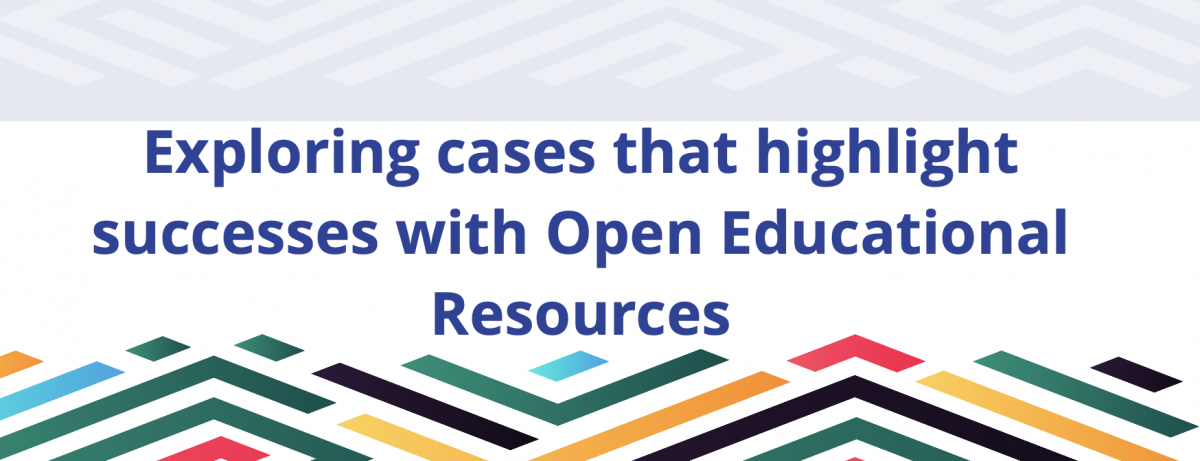
Advocates of Open Educational Resources (OER) often promote their perceived benefits, such as increasing access to educational materials; improving scalability and circulation of resources; and providing opportunities to adapt resources to suit learners’ needs and contexts. However, the past five years alone have seen significant shifts in education systems. Transformative forces such as the ongoing COVID-19 pandemic, leaps in technology development, and global economic reconfiguration mean that now more than ever, education systems need to remain dynamic and responsive.
Key to this responsiveness is ensuring that there is ongoing research on the actual benefits of using OER, so that we can gain a comprehensive, measured understanding of its implementation, benefits, challenges, and lessons. Such research can provide insight on how to most effectively implement the goals of the UNESCO OER Recommendation.
Within this context, OER Africa coordinated a project with members of the Network of Open Orgs, a coalition of organizations that meets regularly on implementing and supporting the UNESCO OER Recommendation. The project involved a collaborative effort among several members of the Network to develop a set of seven research summaries that explore the success of OER. The summaries were then analysed to extract key findings, which were presented in a short report.
The Network aims to make such analyses an ongoing activity to remain abreast of OER implementation around the world. Ultimately, this will assist in realising the goals of the OER Recommendation.
Access the case studies and summary report here.
Half a century ago, on 26 April 1970, the World Intellectual Property Organization (WIPO) Convention came into force and is commemorated as World Intellectual Property (IP) Day, with the aim of increasing general understanding of IP. At OER Africa, we respect the right of individuals to protect their IP and we understand its importance in driving innovation. However, in the case of educational materials, we believe that All Rights Reserved may often not be the most appropriate copyright in today’s world.

Image courtesy of Markus Winkler, Unsplash
Half a century ago, on 26 April 1970, the World Intellectual Property Organization (WIPO) Convention came into force and is commemorated as World Intellectual Property (IP) Day, with the aim of increasing general understanding of IP. WIPO is a self-funded agency of the United Nations and serves as a global forum for an IP system that enables innovation and inventiveness for the benefit of humankind. Almost all sub-Saharan African countries are members of WIPO. IP refers to property that does not necessarily have any physical substance (‘creations of the mind’), such as inventions, designs, artworks, books etc. It provides for ways in which the IP embodied in such works can be protected. This protection is provided through, for example, copyrights, patents, and trademarks. These give creators rights over information and intellectual goods that they have produced, often providing economic incentives by protecting their ideas. A WIPO resource that explains the concept of IP is Making IP Work, and the organization is a leader in protecting people’s IP to drive innovation.
Critics of the concept of IP maintain that it prevents the free flow of ideas, hampers progress, and harms the public interest by concentrating on the benefits for the few at the expense of the many. A recent example would be the patenting of Covid-19 vaccines, resulting in enormous profits for certain pharmaceutical companies at the expense of global public health. For educational materials, the mechanism used to protect the rights of the creator is the concept of copyright.
At OER Africa, we respect the right of individuals to protect their IP and we understand its importance in driving innovation. However, in the case of educational materials, we believe that asserting copyright with all rights reserved may often not be the most appropriate copyright in today’s world. Many of the resources are produced with public funds, so these should be available for reuse. Higher education institutions are coming under increasing pressure to produce better results, massify enrolments, and lower costs. Embracing the concept of Open Educational Resources (OER) by replacing All Rights Reserved with an open licence (such as one of the Creative Commons licences) can assist educational institutions to provide resources that can be accessed freely, used, adapted, and redistributed by others without restriction. You can find out more about open licensing on our online tutorial called Find Open Content.
The theme of World Intellectual Property Day for 2022 is “IP and youth innovating for a better future.” Correctly, WIPO aims to encourage youth to develop their ingenuity and creativity by using the tools of the IP system to build a better future. However, we would like to urge youth to consider openly licensing educational materials they may develop, and in turn, to make use of openly licensed materials.
A Creative Commons CC BY licence allows educationists to freely access and adapt educational resources for their own contexts. Enabling materials to be used in this way is especially important in developing country settings where resources are often not available or too expensive for students to access. For example, a better future for many young children in Africa would be learning to read for understanding. The African Storybook initiative provides openly licensed picture storybooks to encourage children to read for pleasure in numerous African languages. Encouraging youth to translate existing storybooks into their own language or adapt them for a different context or reading level are ways they can contribute to the development of literacy across the continent. If they have the skills to do so, they might also contribute storybooks to the website. Authors who develop such resources retain the copyright to their work; the open licence merely enables others to use the materials for their own purposes – which is very useful for youth, teachers, and parents alike. There are currently 3,210 storybooks available on the website, in 224 languages. An evaluation of the early years of African Storybook noted that ‘The number of stories and range of languages is … a powerful testament to the open publishing model which enables one story to be adapted …. or translated into many languages, quickly and easily and cost-effectively.’
At the higher education level, academics can develop course materials which they can openly license for adaptation and use by others. Many academics are concerned that they are giving away their IP by releasing them as OER. This however is not the case; as mentioned above, the course developer is the copyright holder, and all open licences require attribution of the original source. As Butcher (2011) explains in A Basic Guide to Open Education Resources, only a small percentage of teaching and learning materials generates revenue through direct sales, while teaching resources that have commercial resale value are few, and are declining still further due to educational material being freely accessible on the Internet. Releasing them under an open licence extends their longevity and brings recognition rewards to the author. Where there is a real potential for resources to be marketed for profit, the individual or the institution can maintain all rights reserved copyright, using WIPO’s guidelines. An academic wishing to openly license their work can refer to OER Africa’s Copyright and Licensing Toolkit, to find out about licensing options, applying a licence, and understanding copyright clearance.
IP clearly has a role in driving innovation. However, it is important to remember that it is a social construct, not a law. When considering World IP Day, we believe that all educationists should aim to strike a balance between using IP for their own personal benefit and openly licensing their works for the benefit of the constituencies they work within.
Related articles:
As of 2022, activities by UNESCO to support implementation of its OER Recommendation are gathering pace and OER Africa is pleased to be assisting UNESCO in this important work. The Recommendation on Open Educational Resources (OER) (40 C/32) was adopted at the 40th UNESCO General Conference in Paris on 25th November 2019 as the culmination of a long process of UNESCO engagement with the concept of OER.
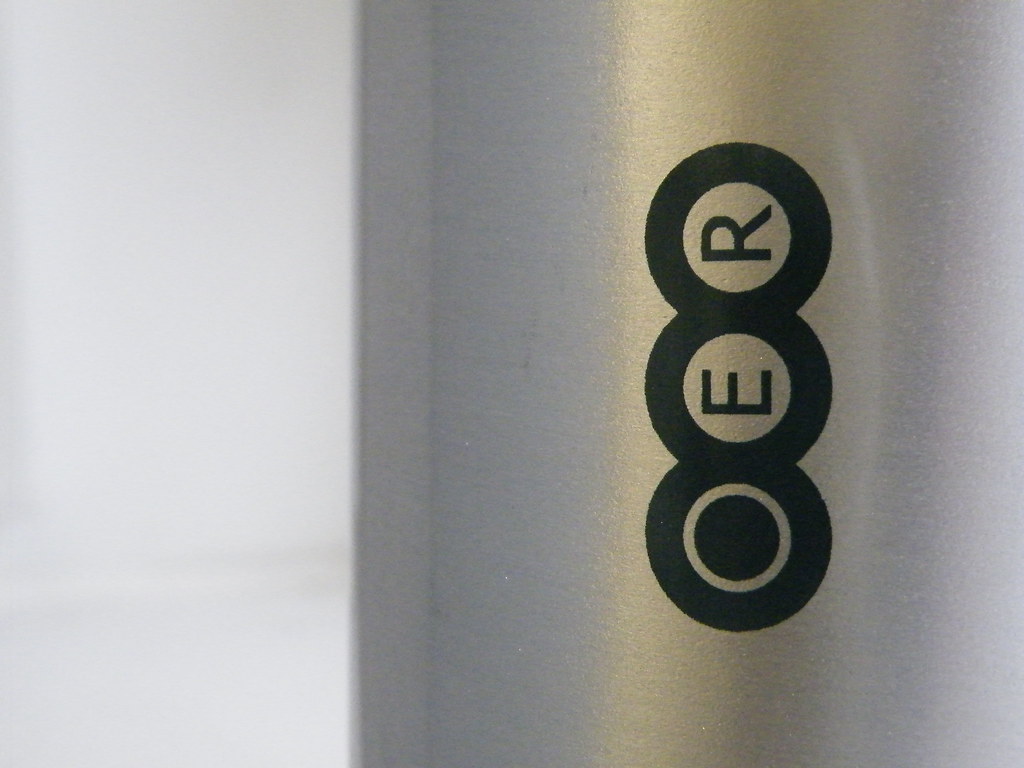
Image courtesy of Martin Weller, Flickr (CC BY-SA 2.0)
As of 2022, activities by UNESCO to support implementation of its OER Recommendation are gathering pace and OER Africa is pleased to be assisting UNESCO in this important work. The Recommendation on Open Educational Resources (OER) (40 C/32) was adopted at the 40th UNESCO General Conference in Paris on 25th November 2019 as the culmination of a long process of UNESCO engagement with the concept of OER.
First and foremost, UNESCO is planning a series of regional virtual consultation workshops around the world, with at least one workshop to be organized for each of the five regions into which UNESCO organizes member states (Africa, the Arab States, Asia and the Pacific, Latin America and the Caribbean, and Europe and North America). These workshops will provide a first platform for member states to re-convene formally since the OER Recommendation was adopted, allowing an opportunity for them to share information on how they have progressed with implementation and discuss ideas for the way forward. This will be an important opportunity for such discussion and for UNESCO to share key messages learned in the first two years since adoption. It will also enable member states to begin planning what and how they would like to report on their progress with operationalization of the OER Recommendation, a process which occurs for all UNESCO Recommendations every fourth year at the UNESCO General Conference (and is thus due to occur in 2024 for the OER Recommendation).
In parallel, with this work, UNESCO has begun a process to develop a guide on the integration of OER into national policies and strategies, which will be developed in French with a focus on Francophone Africa and particularly the Sahel Region. Although many such guides exist, they have typically always been developed in English first with a global audience in mind, so development of a guide such as this, with its specific geographical focus, is a global first and will help to resolve some of the inequities associated with rate of progress of adoption of OER globally. OER Africa is glad to be providing technical and research support to a Consultant contracted by UNESCO Dakar who has been appointed to undertake this important work.
While this is all happening, UNESCO continues its work in advocacy and information-sharing through the OER Dynamic Coalition. Regular webinars are held online (the most recent, on Quality OER, was held on 10th March, 2022) and a monthly newsletter keeps interested parties up to date on latest developments. Anyone interested in receiving the newsletter can request to be added to the mailing list. Please fill out the form here.
OER Africa is proud to continue to support UNESCO in its important work in facilitating implementation of the OER Recommendation around the world.
Related articles:
- UNESCO and the Dynamic Coalition for OER (7 May, 2020)
- Taking forward the work of UNESCO’s OER Recommendation through the Dynamic Coalition (29 July 2020)
- UNESCO’s OER Recommendation Dynamic Coalition Consultations: The way forward (26 August, 2020)
- How can governments and institutions operationalize the OER Recommendation? (17 November, 2020)
This week (14-20 March 2022) is South African Library Week. In 2001, the Library and Information Association of South Africa (LIASA) established Library Week for all types of libraries in South Africa to market their services and create awareness of the important role that libraries play in a democracy.
Msunduzi Public Library, South Africa. Courtesy of AfLIA
This week (14-20 March 2022) is South African Library Week. In 2001, the Library and Information Association of South Africa (LIASA) established Library Week for all types of libraries in South Africa to market their services and create awareness of the important role that libraries play in a democracy. This includes advancing literacy, making the basic human right of freedom of access to information a reality, and promoting tolerance and respect in society. Although South African Library Week is only recognized in South Africa, these values resonate with libraries in countries across Africa and globally.
This year, the theme for Library Week is ReImagine! RePurpose! ReDiscover... Libraries! It will explore how libraries reimagine their services and their ability to render those services, repurpose both their spaces and their services to continue being effective in the communities that they serve, and allow library users to rediscover the library and the ways in which it benefits them. An ongoing collaboration between the African Library and Information Associations and Institutions (AfLIA) and OER Africa aims to encourage librarians in Africa to be able to reimagine libraries as spaces for opening access to information for their communities. This has been done through a series of activities to raise awareness about the importance of open licensing and open knowledge, including the 2020/21 piloting of a series of learning pathways on open education, with 50 librarians across Africa participating.
Increasingly, public libraries in South Africa and around the continent are required to do more with less, while providing vital access to reading material and resources for communities and individuals who cannot find such support elsewhere. Libraries continue to be affected by the COVID-19 pandemic and many are looking for new ways to provide services to their communities. While they battle under current challenges, they remain valuable places for people to be able to read books and newspapers, do homework or research, and use computers and the Internet. Could open education practices assist librarians to reimagine how their communities access the information they need?
In an interview for OER Africa, Dr Nkem Osuigwe, the Human Capacity Development and Training Director at AfLIA, described the importance of libraries to the community after a visit to a library in Nakaseke, just outside Kampala,
"This little library could get news from the radio, TV, newspapers, but also books. They knew when and where it was going to rain, the cost of seedlings, how to get better produce. They were passing this information down to members of the community, so, in turn that made the community go there to find out, 'where do I sell my bananas today, at what price, how do I sell them, which market will give me higher prices…' That was the first time I realized that public libraries can really do awesome things when the people that work there understand what it is all about, when they engage their user communities more."
Dr Osuigwe believes the open licensing and open educational resources (OER) can enable librarians to help their communities rediscover libraries: "This is an area that people do not know much about, and it’s also an area that will help librarians generate more resources for their user communities. Where they can go and learn how to collaborate with others and to create resources if needs be."
African libraries are in good hands, with the support of AfLIA, which is constantly striving for equitable access to information for all. Through engagement with critical issues around open knowledge and open licensing, AfLIA encourages its members to reimagine their services and repurpose their spaces and services to help users rediscover how the library will benefit them. Open knowledge initiatives, such as the #1Lib1Ref campaign and the Wikipedia project for African Librarians, and free webinars AfLIA that presents with partners from across the globe, are establishing AfLIA as the platform for all librarians in Africa to come together, learn from each other, and encourage one another. AfLIA is creating an online space for African librarians to share knowledge, insights and perspectives that represent African voices, cultures, and philosophies as well as making sure that African narratives are represented in the global body of knowledge available online. In doing so, AfLIA is ensuring that African libraries and their users are able to reimagine and rediscover libraries as accessible knowledge centres for the global open knowledge community.
This week, join us in celebrating libraries and the important work they do in our communities.
Related articles
Every year, the team at OER Africa looks forward to Open Education Week (OE Week). This year is no different, as we prepare ourselves to engage with this vibrant community and participate in the many diverse activities on offer. Launched in 2012 by Open Education Global, OE Week is a collaborative, community-built open forum. It raises awareness about open education and highlights innovative open education successes worldwide.

Every year, the team at OER Africa looks forward to Open Education Week (OE Week). This year is no different, as we prepare ourselves to engage with this vibrant community and participate in the many diverse activities on offer.
Launched in 2012 by Open Education Global, OE Week is a collaborative, community-built open forum. It raises awareness about open education and highlights innovative open education successes worldwide. OE Week provides practitioners, educators, and students an opportunity to build a greater understanding of open educational practices and be inspired by the wonderful work being undertaken by the community around the world (OE Global, 2022).
OE Week will run from 7 to 11 March, 2022 this year. There are several ways to participate in OE Week:
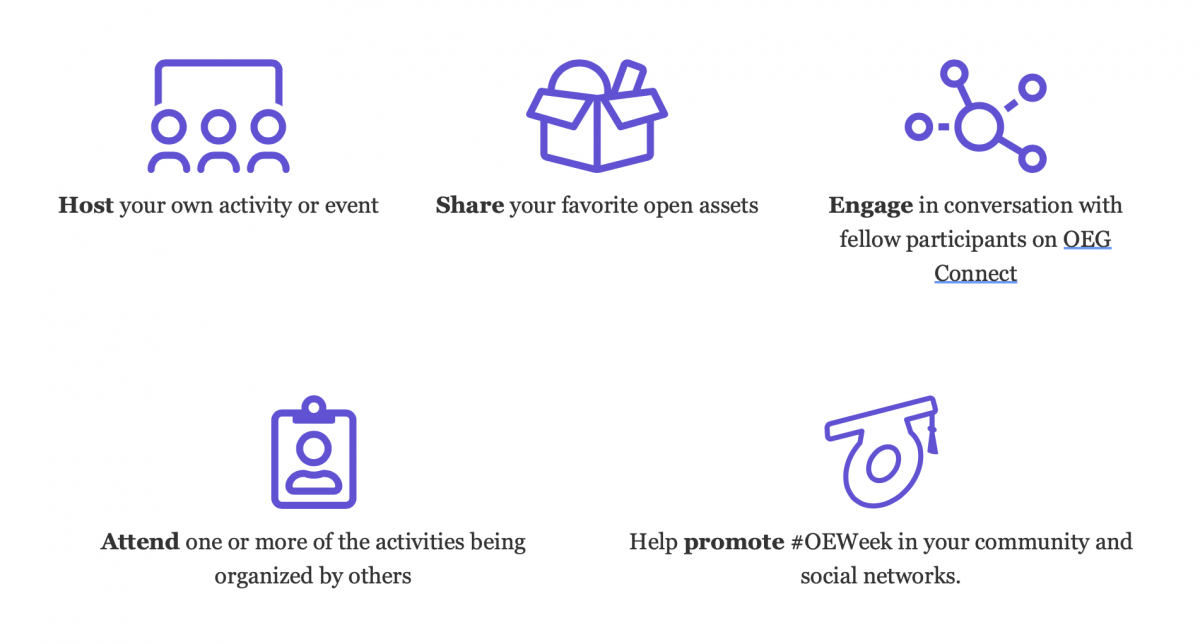
Source: Open Education Global, 2022
Join us for what promises to be an inspiring week filled with new ideas, a celebration of open education, and vibrant community engagement. Access information about the event here.
Source:
Open Education Global. (2022). Open Education Week. https://www.oeglobal.org/activities/open-education-week/
Related articles
- Why is 'Open Education' important?
- How do I create a Community of Practice for Open Educational Resources?
- Opening education: What role do librarians on the African continent play?
- Open Pedagogy
Assessment always has a purpose. We need to be clear on that purpose in our learning design work. But that purpose can vary. In this article aimed at educators, we explore assessment of, for, and as learning to think about the purpose of assessment and to help us think about integrated summative assessment.
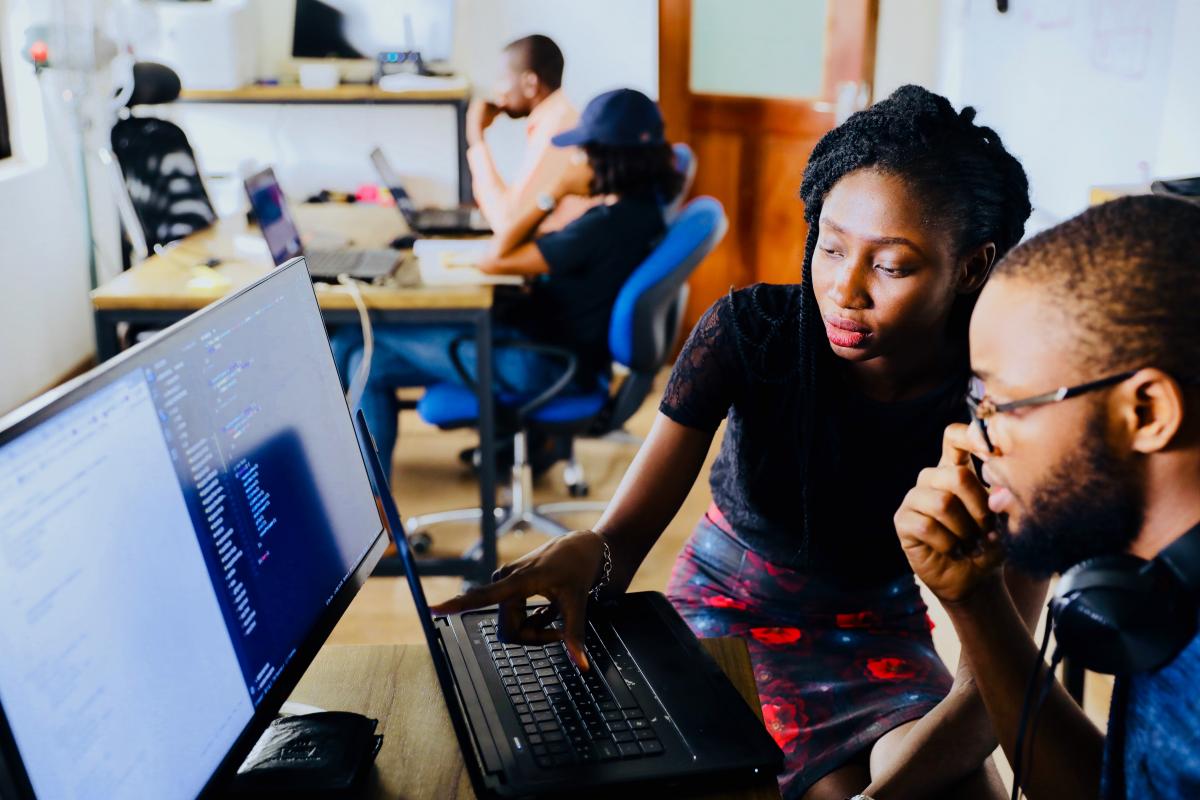
Image courtesy of Lagos Techie. Unsplash
Assessment always has a purpose. We need to be clear on that purpose in our learning design work. But that purpose can vary. In this article aimed at educators, we explore assessment of, for, and as learning to think about the purpose of assessment and to help us think about integrated summative assessment.
In a previous article about online assessment, we asked ‘How do we know if students are learning?’ We spoke about the value of formative assessment as part of activity-based teaching and learning. We suggested that formative assessment activities form an important part of an integrated summative assessment strategy.
But what do we mean? Traditionally,
"Formative assessment occurs before or during teaching. It is a way of assessing students’ progress, providing feedback and making decisions about further instructional activities. It is assessment for learning purposes. Summative assessment is conducted after instruction primarily as a way to document what students know, understand and can do. It is an assessment of learning and its aim is to ‘sum up’ the learning that has taken place." (Waspe, 2020)
But Waspe goes on to say:
"There isn’t always a clear split between formative and summative assessment: some activities may fall somewhere in the middle. For example, a test at the end of a section of material may be used for marks (summative) but the lecturer may also analyse it to identify which competences need strengthening going forward (formative)." (Waspe, 2020)
Assessment and learning
We know there is an integral relationship between assessment and learning. We can see this when we unpack three important forms of assessment:
Assessment of learning
Assessment of learning measures the knowledge, skills, attitudes, and values students have demonstrated at the end of a learning cycle.
Assessment for learning
Assessment for learning checks what students understand and can do as part of the learning process. It helps to identify any misunderstandings, difficulties, or gaps in knowledge so educators can adjust teaching to address these.
Assessment as learning
Assessment as learning involves the student ‘thinking about how they are thinking’ and using what they discover to make adjustments to how they approach learning. Assessment as learning helps students notice their own thoughts and processes, called metacognition, and make changes to those thoughts and processes, called self-regulation.
Let’s think about these three forms of assessment in relation to formative and summative assessment.
In his article about assessment for learning, Wiliam (2011) agrees with Bennett (2009) that it is unhelpful, and simplistic, to equate assessment for learning with formative assessment and assessment of learning with summative assessment. Bennett suggests that assessments designed primarily to serve a summative function may also function formatively, while those designed primarily to serve a formative function may also function summatively.
Let’s look at an example:
This is an example of an activity in which students are learning about the impact of globalisation in an economics course. Let’s analyse the activity for opportunities for assessment of learning, assessment for learning, and assessment as learning.
|
Activity: The impact of globalisation |
|
|
Purpose |
Create a diagram which reflects the impact of globalisation on an industry of your choice |
|
Resources |
Reading A Reading B |
|
Task [60 minutes] |
|
|
Reflect, share and respond |
|
|
Feedback |
|
Example adapted from OER Africa: https://www.oerafrica.org/supporting-distance- learners/case-studies-using-asynchronous-communication
In this example, we believe we can identify all three forms of assessment:
|
Assessment of learning |
Assessment for learning |
Assessment as learning |
|
|
As part of the discussions, reflections, responses and feedback with each other and from their educator, students will be able to think about how they learned, what helped them to learn and how they can improve their learning strategies in future.One way of enhancing this aspect of assessment and learning would be to ask students explicit reflection questions about their learning. |
Integrated activity-based summative assessment
What does this mean for how we think about integrated summative assessment?
Most definitions of integrated assessment include ideas about gathering and presenting evidence for judgement against standards, outcomes and criteria, using a combination of assessment methods and instruments, in different contexts, supporting learners to demonstrate understanding of theory in practice.
When we integrate assessment of, for, and as learning into activity-based teaching and learning, we design integrated (summative) assessment that supports integrated learning. In certain cases, it might be useful to think about summative (and formative) assessment as gathering evidence for the purposes of marking, recording, and promotion. But when we want to ‘stop worrying about testing and start thinking about learning’ and we are challenged to think about assessment differently for whatever reason, we can use activity-based teaching that integrates assessment for, of, and as learning to support and guide students’ learning towards success.
In the ‘Impact of globalisation’ example above, we saw the integration of assessment of, for, and as learning in a single activity. But integrated summative assessment could also be the integration of formative and summative assessment over a series of activities for a whole unit or module of study, or even a whole course.
The same basic rules of assessment will apply, so that activities are fair, reliable, and valid. Let’s consider what criteria and elements activity-based design would need to incorporate in order to constitute valid, fair, reliable, and integrated assessment of, for, and as learning:
- Do the activities have a clear purpose that is clear to students?
- Are the activities aligned to one or more outcomes?
- Are the activities logically sequenced along a learning pathway?
- Are the activities and tasks fit for purpose for different students in different contexts?
- Is there a range of activities or tasks that give students the opportunity to engage and learn in different ways?
- Are there clear guidelines that help students understand what they are expected to do individually or collaboratively?
- Are all the activities accessible to all students, whether they have an Internet connection or not, whether they are on campus or not, whether they have access to devices or not?
- Do all students have access to the resources necessary to do the activities?
- Do the activities provide sufficient opportunities for students to collaborate?
- Do the activities provide sufficient opportunities for students to reflect on their own and each other’s learning (self and peer reflection)?
- Do the activities encourage students to give and receive feedback in meaningful ways?
Consider an assessment activity or task you have recently given to students. To what extent does the activity promote assessment of, for, and as learning? Which of the above criteria and elements does the activity address? What tasks can you add to the activity to ensure students have opportunities for assessment of learning, for learning, and as learning? What activities could you add, before or after this activity, to create a more integrated activity-based learning and assessment pathway as part of your materials design?
References
Bennett, R. E. (2009). A critical look at the meaning and basis of formative assessment (ETS RM-09-06). Princeton, NJ: Educational Testing Service.
Waspe, T and Louton, B. (2020). Rethinking TVET Assessment, Advanced Diploma Technical and Vocational Training, DHET. (See also https://nols.gov.za/dhetnols/)
Wiliam, Dylan. (2011). ‘What is assessment for learning?’ Studies in Educational Evaluation. 37. 3-14. 10.1016/j.stueduc.2011.03.001.
Related articles
You may have seen ArXiv pop up in your science-related or open access repository searches. ArXiv is an open access repository for pre-prints and post-prints that have been moderated but not peer reviewed.

Image courtesy of National Cancer Institute, Unsplash
What is ArXiv?
You may have seen ArXiv pop up in your science-related or open access repository searches. For those of us who are still wondering how to say it, it is pronounced ’archive’. The X represents the Greek letter, c, which is pronounced ‘ch’ and thus spells out archive.
ArXiv is an open access repository for pre-prints[1] and post-prints[2] that have been moderated but not peer reviewed. It was the first freely available, open access repository, established years before Creative Commons or other mechanisms were available or the Internet became ubiquitous. ArXiv was established in 1991 as a way for physicists and mathematicians to circulate their research for comment before peer review and publication in a journal. It was developed with distribution formats few people use today — File Transfer Protocol (FTP), Gopher, and Mosaic (the world’s first Internet browser). According to Wikipedia:[3]
In many fields of mathematics and physics, almost all scientific papers are self-archived on the arXiv repository before publication in a peer-reviewed journal. Some publishers also grant permission for authors to archive the peer-reviewed postprint.
ArXiv has become tremendously important for scientists worldwide. On this, its 30th birthday, there are almost 2 million articles posted on the site in physics, mathematics, computer science, quantitative biology, quantitative finance, statistics, electrical engineering, systems science, and economics.
In the 30 years since ArXiv’s founding, many additional servers for different disciplines and regions have been established, all on the Xiv model. AfricArXiv, for Africa, is discussed in detail below. Two preprint servers in the biomedical sciences have received considerable attention because of the COVID-19 pandemic, including the publication of several highly quoted articles in the mass media and research publications.[4] But how much relevance do ArXiv and the other servers have for Africa?
How relevant are preprint servers to Africa?
ArXiv and the disciplinary servers that followed aim to help scientists worldwide share results and get feedback quickly without waiting for publication in journals. Although bibliometric surveys have not been done for all of the servers, two in the biomedical sciences point to the paucity of African research appearing in them. A 2020 survey of in eLife, of over 67,000 articles posted on bioRxiv found that international authorship and collaboration of African researchers was scant and most were not principal author. Table 1 shows which were the 11 most published African countries in bioRxiv.[5]
Table 1: Which African countries publish the most in bioRxiv?
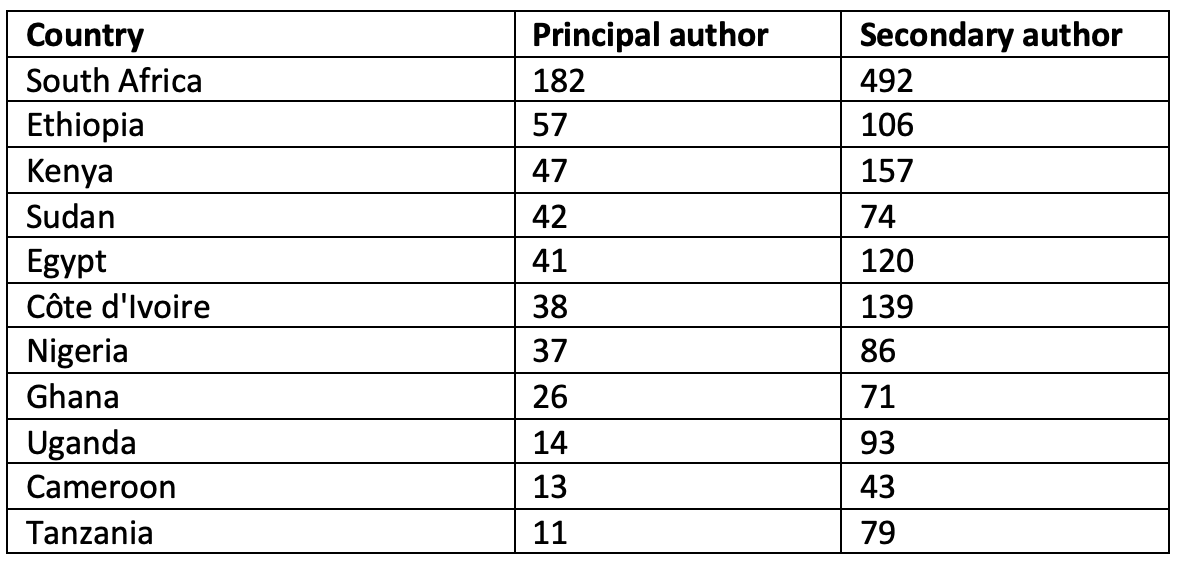
Figure 1: The good news[6]

When the researchers dug deeper into subject matter and where the research was carried out, they found:
Figure 2: Digging deeper[7]

This is important research for those of us who care about the contribution of African scientists to the global knowledge pool. The role of scientists has evolved over the course of the pandemic – they are becoming more public-facing, which can significantly improve dissemination of accurate information in any given country. Examples include Dr. Anthony Fauci[8] and Dr. John Nkengasong.[9] It is also important to encourage representation so that we can learn from other approaches and develop solutions that cater for diverse populations.
AfricArXiv
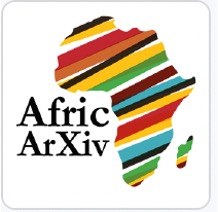 In 2018, African scientists established an open access African preprint server, called AfricArXivto promote better visibility for African research and enhanced collaboration throughout the continent. AfricArXiv’s African focus has a special set of objectives, among them:
In 2018, African scientists established an open access African preprint server, called AfricArXivto promote better visibility for African research and enhanced collaboration throughout the continent. AfricArXiv’s African focus has a special set of objectives, among them:
- It is an African-owned open scholarly repository, a knowledge commons of African scholarly works to catalyze the African Renaissance.
- Submissions must be relevant to Africa, with at least one African author.
- Language is important in Africa, where AfricArXiv estimates that over 2,000 are spoken, a number which has been confirmed elsewhere.[10] All submissions must be accompanied by a summary in English and French to ease language gaps. Automated translation is allowed and must be acknowledged because these translations are not always accurate. AfricArXiv also uses volunteer translators. In addition, AfricArXiv encourages postings in African languages and is partnering with Masakhane to undertake human translation of articles into African languages. AfricaArXiv writes about the significance of translation as follows:[11]
We encourage submissions in languages that are commonly used by the scientific community in the respective country, such as English, French, Swahili, Zulu, Afrikaans, Igbo, Akan, or other native African languages. Manuscripts submitted in non-English languages will be held in the moderation queue until we can get them verified. We herewith encourage you to suggest people who could assist in moderating in your language.
For those who want to know more about the significance of preprint servers, we encourage you to read Ten simple rules to consider regarding preprint submission, which was published in May 2017 in PLOS Computational Biology, an open access and highly prestigious journal. The article has been viewed over 44,000 times and cited 61 times.[12]
For those who would like more information on the lack of representation of African science in the journal literature, please see Where there is no local author: a network bibliometric analysis of authorship parasitism among research conducted in sub-Saharan Africa, published on 27 October 2021 in BMJ Global Health.[13] It demonstrates how few African biomedical researchers receive recognition for research results from their own countries. See also the journal’s editorial on ‘parachute’ research: Using scientific authorship criteria as a tool for equitable inclusion in global health research.[14]
This has been one of OER Africa’s communications on open knowledge, which we will continue to explore in future communications.
Related articles
- What is Open Science and how does it relate to open knowledge? (29 April 2021)
- Open Pedagogy (19 April 2021)
- How can OpenCourseWare help you to improve your courses? (16 July 2020)
- Sharing Africa’s knowledge through open data (18 June 2020)
- Sharing Africa’s knowledge through openly licensed publishing (11 June 2020)
- Sharing Africa’s knowledge through open African research repositories (29 May 2020)
- OER Repositories in Africa (8 May 2020)
Access the OER Africa Communications Archive here
[1] Wikipedia contributors. (2021b, October 8). Preprint. Wikipedia. Retrieved October 25, 2021, from https://en.wikipedia.org/wiki/Preprint (CC BY-SA)
[2] Wikipedia contributors. (2021b, October 1). Postprint. Wikipedia. Retrieved October 25, 2021, from https://en.wikipedia.org/wiki/Postprint (CC BY-SA)
[3] Wikipedia contributors. (2021, September 7). ArXiv. Wikipedia. Retrieved 13 October 2021 from https://en.wikipedia.org/wiki/ArXiv#Moderation_process_and_endorsement (CC BY)
[4] Ginsparg, P. Lessons from arXiv’s 30 years of information sharing. Nat Rev Phys 3, 602–603 (2021). https://doi.org/10.1038/s42254-021-00360-z (Freely available but copyright protected. Springer Nature has a content-sharing initiative, which does not permit printing; the link for this article is https://rdcu.be/czHnW.
[5] Abdill RJ, Adamowicz EM, Blekhman R. International authorship and collaboration across bioRxiv preprints. Elife. 2020 Jul 27;9:e58496. doi: 10.7554/eLife.58496. PMID: 32716295; PMCID: PMC7384855. (CC BY)
[6] Guleid, F. H., Oyando, R., Kabia, E., Mumbi, A., Akech, S., & Barasa, E. (2021, March 17). A bibliometric analysis of COVID-19 research in Africa. MedRxiv. Retrieved 19 October 2021 from https://www.medrxiv.org/content/10.1101/2021.03.15.21253589v1(CC BY)
[7] Guleid FH, Oyando R, Kabia E, et al, A bibliometric analysis of COVID-19 research in Africa, BMJ Global Health 2021; https://gh.bmj.com/content/6/5/e005690. (CC BY)
[10] Wikipedia contributors. (2021d, October 23). Languages of Africa. Wikipedia. Retrieved November 3, 2021, from Wikipedia contributors. (2021d, October 23). Languages of Africa. Wikipedia. Retrieved November3, 2021 from https://en.wikipedia.org/wiki/Languages_of_Africa (CC BY)
[11] Languages – AfricArXiv. (n.d.). AfricArXiv. Retrieved October 20, 2021, from https://info.africarxiv.org/languages/ (CC BY)
[12] Bourne PE, Polka JK, Vale RD, Kiley R (2017) Ten simple rules to consider regarding preprint submission. PLoS Comput Biol 13(5): e1005473. Retrieved 20 October 2021 from https://doi.org/10.1371/journal.pcbi.1005473 (CC0)
[13] Rees CA, Ali M, Kisenge R, et al Where there is no local author: a network bibliometric analysis of authorship parasitism among research conducted in sub-Saharan Africa BMJ Global Health 2021. https://gh.bmj.com/content/6/10/e006982. (CC BY-NC)
[14] Sam-Agudu NA, Abimbola S. Using scientific authorship criteria as a tool for equitable inclusion in global health research. BMJ Global Health 2021. https://gh.bmj.com/content/6/10/e007632 (CC BY-NC)
Are academics at your institution struggling to find the time and space to invest in their own continuing professional development (CPD)? With so many competing priorities, many academics find it difficult squeeze CPD in among their other daily responsibilities.

Are academics at your institution struggling to find the time and space to invest in their own continuing professional development (CPD)? With so many competing priorities, many academics find it difficult squeeze CPD in among their other daily responsibilities. CPD is often the first thing to be jettisoned in busy schedules. Gone is the time when five days of training could be allocated to improving the skills and knowledge of academics. So how might we rethink academics’ CPD to make it more accessible and relevant?
OER Africa is conducting research on different CPD methods that might resonate with busy academics. We are advocating repackaging training to be appealing, engaging and relevant to today’s academic. Below is an interactive report developed to showcase some of the initial findings of this research. Initially presented as part of the OE Global’s 2021 CONNECT conference, it is now made available for your attention, right here.
Please click the link below to access the interactive presentation, but be warned, your active participation will be required! Please complete the interactive components of the presentation honestly and fully as we would like to use your data as part of the research process.
Related articles:
In this week’s article, Leanne Rencken delves into the ongoing collaboration between the African Library and Information Associations and Institutions (AfLIA) and OER Africa. OER Africa has developed three learning pathways, as part of its grant from the William and Flora Hewlett Foundation, and, along with AfLIA, is piloting them with university and academic librarians on the continent.
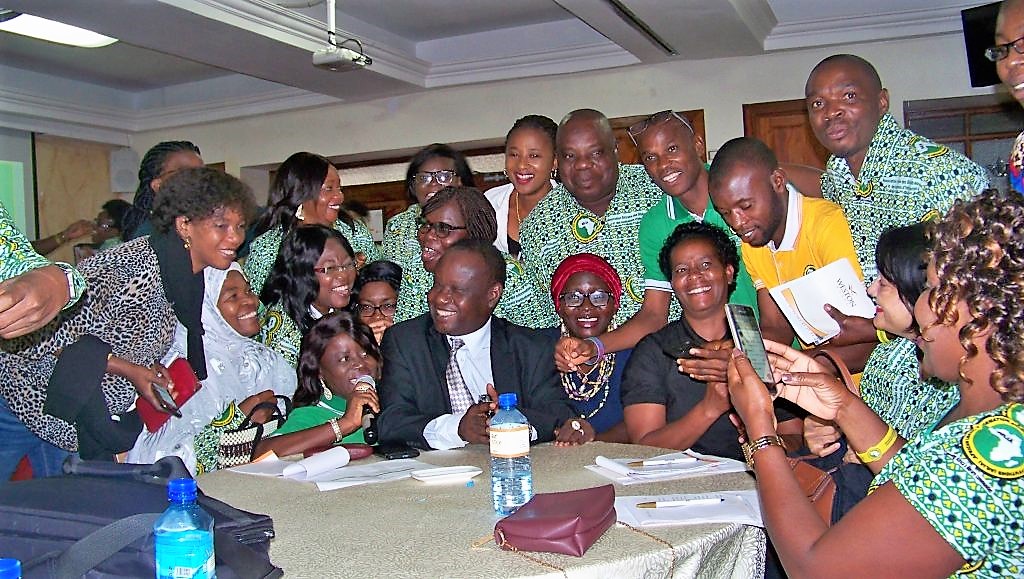
African Library and Information Associations & Institutions (AfLIA) Conference in Nairobi, Kenya, 2019
Image courtesy of AfLIA, CC BY
Report by Leanne Rencken,[1] for OER Africa.
Three inspiring conversations with remarkable African librarians provided me with great hope that our libraries on the African continent are in good hands.
Why did I have these conversations? My mission was to find out more about the ongoing collaboration between the African Library and Information Associations and Institutions (AfLIA) and OER Africa.
OER Africa has developed three learning pathways, as part of its grant from the William and Flora Hewlett Foundation, and, along with AfLIA, is piloting them with university and academic librarians on the continent.
The pilot project focused on three learning pathways:
- Find Open Content is a short tutorial for participants to acquire the skills necessary to search for open content, decipher Creative Commons rights and permissions and evaluate the accuracy and relevance of Open Educational Resources (OER) identified.
- Adapt Open Content provides a rapid solution to adapting open content for new purposes. It covers adaptation options, and how to revise and remix open content.
- Publish using Open Access explains what Open Access is, and why academics might consider publishing in this way. It goes on to discuss publishing options, guidelines, and touches on other Open movements.
I spent a few delightful hours on Zoom calls with Dr Nkem Osuigwe, who is based in Nigeria, but commutes to Accra, Ghana for work, Dr Sarah Kaddu, who is based in Kampala, Uganda and Dr Ayanda Lebele, who is based in Palapye, Botswana.
With their shared vision, curiosity, thirst for knowledge, leadership, and a collection of PhDs, it’s not surprising that I’m in awe of these three women who, in one way or another, are stewards of library science and services on the African continent.
Dr Nkem Osuigwe, who is the Human Capacity Development and Training Director at AfLIA, chatted to me about the pilot, in which 50 librarians across Africa participated, and who, by completing these learning pathways, are testing innovative alternative approaches to continuing professional development (CPD), to reduce dependence on traditional workshop-based professional development.
Dr Osuigwe reveals herself through anecdotes; she is a great storyteller and admits she is driven by curiosity and her love for anything that concerns reading. She is the only librarian in a family of medical professionals, her late father, husband, and children included. She explains that she holds a position of importance in her home, because doctors can’t know everything, and often turn to their in-house librarian for research assistance.
This same thirst for knowledge, and innate hunger to find out more about how the world works led to her appointment at AfLIA and how she approaches her current position.
As she describes it, AfLIA is the platform for all librarians in Africa to come together, learn from each other, and encourage one another. It’s a strong network of different types of libraries, as well as an advocate for better operating environments for libraries on the continent. One of her most vivid memories, from when she first started out at AfLIA, is of a goosebumps-inducing visit to a library in Nakaseke, just outside Kampala. She was struck by how much the humble, two-room establishment influenced and involved the community it served.
"This little library could get news from the radio, TV, newspapers, but also books. They knew when and where it was going to rain, the cost of seedlings, how to get better produce. They were passing this information down to members of the community, so, in turn that made the community go there to find out, ‘where do I sell my bananas today, at what price, how do I sell them, which market will give me higher prices…’ That was the first time I realized that public libraries can really do awesome things when the people that work there understand what it is all about, when they engage their user communities more."
Thanks to this need to know more, see more, and do more, coupled with her networking skills, Dr Osuigwe stumbled across open licensing. She pursued a friendship with Amna Singh of StoryWeaver on Twitter, and, through these interactions was introduced to Pratham Books (India) and its enormously appealing StoryWeaver project. This work sees the creation of openly licensed children’s storybooks that can be translated, copied, and adapted at will, because of the Creative Commons licence used. Once she had made the connection, written a book for the platform, and participated in a StoryWeaver competition to translate children’s stories, Dr Osuigwe had a better idea of the potential for open licensing, what it means for African libraries, and how children can access books in their mother tongue.
And because Dr Osuigwe goes all-in with everything she does, she continued to make fruitful connections, initially via Twitter and then in-person, between AfLIA and Wikimedia, as well as AfLIA and OER Africa. Subsequently, several productive projects have ensued.
For the learning pathways pilot, AfLIA selected potential participants from amongst its tertiary-level librarian community. They received questionnaires to ascertain their knowledge of OER and open licensing, Open Access, and using the Internet to retrieve information. Librarians from nine universities in Botswana, Ghana, Kenya, and Uganda were ultimately selected.
Dr Lebele and Dr Kaddu were two of the participants selected to participate in the pilot project, which consisted of an introductory Zoom call, followed by a call for participants for each learning pathway. The librarians had two weeks to complete the learning pathway(s) they had chosen. Participants also received pre- and post-pilot questionnaires and a user experience survey.
For Dr Kaddu, who works as a lecturer at the East African School of Library and Information Science at Makerere University, CPD is critical, because she’s got to stay relevant to her students, who are a lot more digitally savvy than she was when she studied for the same degree. As she explains it:
"When you look at the information landscape today, you’ll see that it’s characterized by plenty, there is a lot of information available out there, so the question is, how do I navigate all this information?"
She also says that the webinars AfLIA has provided, as well as the digital skills it is supplying to support educators in their daily work, have been well received.
"They raise awareness of existing trends that we might otherwise take a while to get to know. AfLIA, being a continental voice, has been key in unifying all that is needed on the continent, there is one place to go for guidance on curricula, for example, and it’s been very useful."
In fact, Dr Kaddu, who completed the Adapt Open Content and Publish Using Open Content learning pathways, has taken these resources and worked them into her own curriculum, so when her publishing seminars with the masters and doctoral students come up, she is teaching them a lot of what she’s just learnt.
While Dr Osuigwe believes that much of what librarians learn during their formal education can become obsolete in five to ten years, Dr Kaddu reckons that sometimes it feels like three to six months. To counter that, she says:
"You must continuously learn and discover what is out there to make your work better, something that is going to complement what you are doing, to make your work appreciated, otherwise your learners will challenge you. Acknowledge that there is a gap, while you are teaching, and challenge your students to help."
Prior to the pilot project, Dr Kaddu had a vague awareness of OER, and the symbols representing the various Creative Commons licensing options. However, following these tutorials, she says a lot has now been clarified for her, and in turn for her students.
‘They were really awesome, they were well designed, the information was easy to find, the materials were very, very clear,’ she says of the tutorials, and although she only had to complete two of the three, she’s working on learning pathway one in her free time.
Like many others in her line of work, Dr Kaddu is mindful of the fact that ‘academics are supposed to publish’. She says knowing what she now knows, she plans to publish more and is advocating for open content.
"I really want people to put their content out in the public domain, so that it can be utilized. If we publish to a greater audience, who are available to comment on our work, we can only improve. When info is in the open, it attracts many benefits. I no longer want to have it ‘closed’ – that’s selfish, and it’s not taking Africa anywhere. We need to add on to the existing literature, content, and data we have. We want to promote our scholars."
It’s going to take some convincing though. Dr Kaddu says the initial reaction, amongst her students, to publishing using open access, is negative. She says, ‘we need to be into it, to participate in it and promote it, then they will appreciate it’.
Dr Ayanda Lebele is the Director of Library Services at the Botswana International University of Science and Technology (BIUST). She tells me that it’s impossible to talk about her professional self separately from her private self because ‘I’m passionate about librarianship, it’s generally who I am.’ While she has this in common with her colleagues from Nigeria and Uganda, there are other similarities in their approaches to work.
‘For it to be functional, and effective, it’s the people that matter the most,’ says Dr Lebele, describing her team of librarians or, as she sees them, her work family, at BIUST.
To this end, she has entrusted a lot of the processes around CPD to her team, directing them where necessary, but also letting them find their own way. That way, she’s constantly learning as well.
With regards to the learning pathways, she had 16 members of her team sign up for the tutorials. It was a challenge, as they were just going into lockdown in Botswana at the time, so there was the related anxiety, difficulty in adapting to working from home, and data and device limitations.
But she’s pleased to report that they succeeded and are still reaping the benefits. One of her team members, Winnie Jamara, was the self-appointed champion for the completion of the course work, while another, Barulaganye Hulela has taken the knowledge on board and applied it specifically to podcast development.
‘She adapts content we get from the open access platforms and uses it to suit the BIUST context, and to disseminate information to our audience, who we no longer interact with face to face due to COVID-19,’ Dr Lebele explains. ‘Through the pathways we did, we’re able to enhance our service delivery.’
Just as Dr Kaddu admitted that there was some hesitancy in her students adopting the idea of open publishing, Dr Lebele has seen a similar attitude from teaching academics at her own institution. She believes that, as librarians, they have some responsibility towards changing this mindset.
‘We see ourselves as knowledge workers,’ she says.
"We don’t just manage giving people information, we also manage how they participate in knowledge creation. We have a responsibility to help those who don’t have the awareness, to know their role is not just to be reading knowledge created by other people; they also have to package their own knowledge, so that somebody else may benefit from it in a context that best suits their environment."
Having completed the Adapt Open Content and Publish Using Open Content learning pathways, Dr Lebele is a great believer in the subject matter, but would like to see a more basic introduction to open licensing and OER. She explains further, saying we need to take a step back to where people are, bring them on board and build their interest. She’s concerned that ‘people don’t see the need’.
Dr Osuigwe shares this sentiment:
"People inherently want to learn, but the point is that sometimes you don’t know that something exists, and so, you don’t hunger for it. Once you’re curious to know what’s happening in your field, and you dig into it, you stir up that hunger to learn."
Finally, Dr Osuigwe chatted to me about motivation, what will drive librarians to complete these tutorials, and thus embrace this unique opportunity for CPD.
With reference to open licensing and OER, she says:
"This is an area that people do not know much about, and it’s also an area that will help librarians generate more resources for their user communities. Where they can go and learn how to collaborate with others and to create resources if needs be. That’s the motivation for me! I believe that in everybody there’s a curiosity quotient, there’s that element in everyone born in this world to find out what’s next. But you know, life kind of puts out the fire in almost everyone, so what we are trying to do is to reignite that fire to find out what’s next, what can be done, how can this be achieved. This is the adventure!"
If you’d also like to get in on the adventure and find out more about open licensing and OER, you can complete the learning pathways available here on the OER Africa website.
Related articles:
- How has COVID-19 highlighted the need for open access?
- How do I create a Community of Practice for Open Educational Resources?
- Do you want to communicate your research more widely?
- Access the OER Africa communications archive
[1] Leanne Rencken is an enthusiastic, happy person with years of experience in content creation, curation and publishing. She has travelled extensively across Africa, from Botswana where she grew up, to Nigeria, Kenya, Angola and beyond. She believes in the transformative power of great content, no matter the platform or product. Most recently this love of story-telling has led to her to pursuing travel, teaching English as a foreign language, and freelance writing and editing on a wide-range of topics.
Sustainable food systems and climate change are pressing global issues that go hand in hand. Will these challenges be left to the youth because they will be most affected? This article will explore what role OER can play in empowering youth to transform food systems.
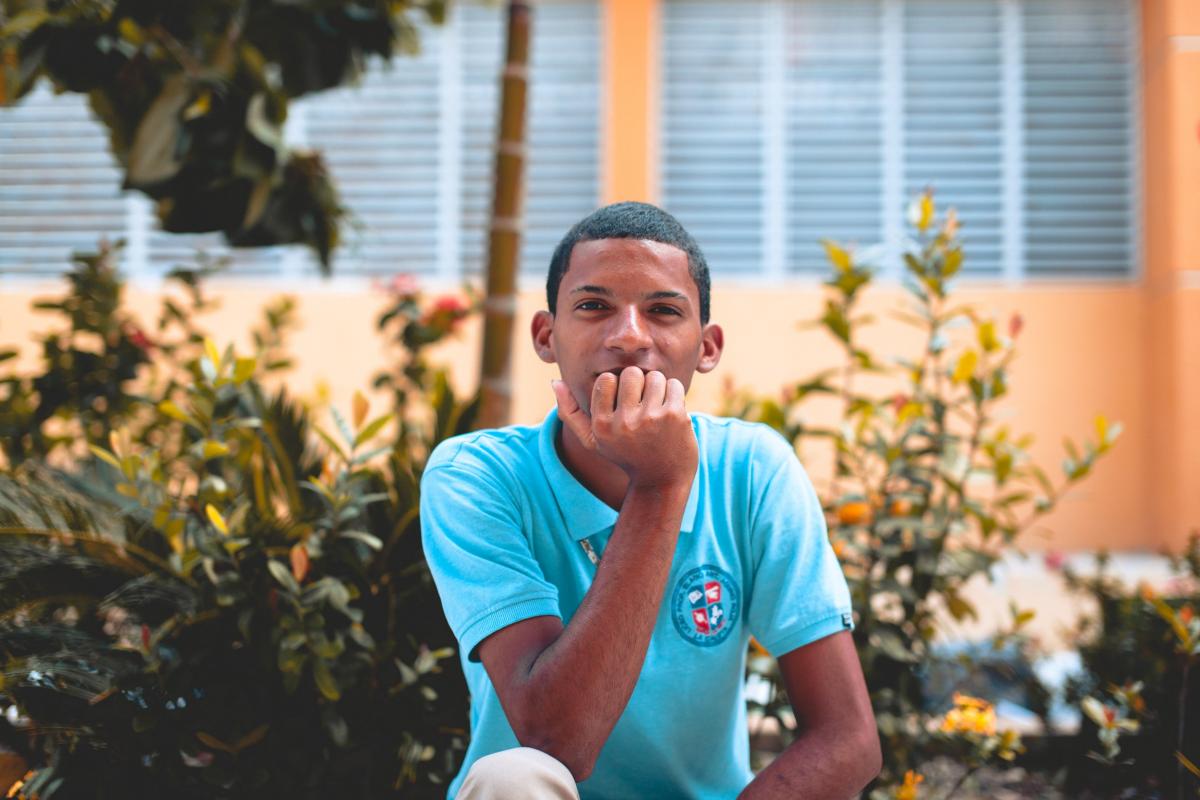
Image courtesy of Billy Chester, Unsplash
On 9 August, 2021 the world’s leading climate scientists delivered their starkest warning yet about the deepening climate emergency. Sustainable food systems and climate change are pressing global issues that go hand in hand. Will these challenges be left to the youth because they will be most affected? This article will explore what role OER can play in empowering youth to transform food systems.
International Youth Day, which takes place on 12 August, aims to bring youth issues and challenges to the attention of the international community while also celebrating the potential of youth as partners in today’s global society.
Glover and Sumberg [1] explain why the youth are an important demographic:
Today's youth generation is the largest in history, and the global population of young people is concentrated in low- and middle-income countries located in South and East Asia and Africa (The World Bank, 2006; IFAD, 2019). The interests and needs of this youth generation are important, not only because they are many, but because they will need–indeed, they are entitled to expect–decent work and livelihoods, as well as long and healthy lives; yet, to achieve this objective for so many people will be challenging in an era of ecological stress. From a development perspective, today's youth generation is on the front line: it will have to cope with the effects of environmental and climate change, which are likely to accelerate and intensify during their lifetimes and those of their children.
The 2021 theme for International Youth Day is ‘Transforming Food Systems: Youth Innovation for Human and Planetary Health’. In Africa, food security and sustainable farming practices have always been important. While the agricultural industry continues to be the largest source of employment in many African countries, off-farm food-related activities are expected to be important for future job opportunities, including for youth.[2]
Stakeholders in the educational and agricultural sectors need to ensure that youth have the support mechanisms to amplify efforts collectively and individually to protect the Earth and life, while integrating biodiversity in the transformation of food systems. Given the planet’s growing population, producing sufficient healthier food sustainably will not ensure human and planetary wellbeing if other crucial challenges are not also tackled, such as social inclusion, health care, biodiversity conservation, and climate change mitigation. [3]
Empowered youths can lead community development efforts to facilitate the improvement of lives in their community, appreciating and supporting cultural differences, and being custodians of the land, water and wildlife. Youth in Africa are expressing strong readiness and passion in actively contributing to the processes of delivering solutions that transform food systems. [4]
The next generation recognises that our future depends on functioning food systems, and at the same time, it is Africa’s youth that holds the power to deliver them. To begin with, young Africans are informed and educated, alert to the twin threats to our prosperity of malnutrition and climate change. We do not farm like our parents and grandparents farmed, nor do we eat the way our forebears ate.
– Mike Nkhombo Khunga, Scaling Up Nutrition (SUN) Global Youth Leader, Malawi, and vice-chair of the UN Food Systems Summit's Action Track 5: building resilience to vulnerabilities, shocks and stresses [5]
How can OER empower youth to fulfil this role?
Technical and Vocational Training (TVET) in agriculture faces specific challenges, such as a lack of formalized training programmes and agriculture not being an aspirational career.[6] OER can be used as an important building block for skills development in the TVET sector. This is especially important in the field of agriculture and food systems, as openly licensed content can be contextualized and adapted to be culturally and environmentally relevant, while documenting agricultural practices can help to share these beyond local communities. Agricultural content for TVET needs to be linked to advances in technology, facilitate innovation, and have greater relevance to a diverse and evolving agricultural sector, with a focus on agribusiness and entrepreneurship. Digital technologies, OER, and open education practices in this sector can provide access to innovative models of agricultural processes and marketing that may not have been accessible before. They can also provide a means for sharing this knowledge from one generation to the next, despite the change in many rural societies where more children are enrolled in school and spend less time in the fields with their elders. Open education practices can, when well implemented, contribute to reduce the costs of producing and distributing course material, expand access, meeting the needs of learners in different contexts, and therefore be beneficial to learners in the developing world.
OERs can contribute to making informal and formal skills training accessible and affordable in the farming and food systems industries. Beyond technical skills, building capacity for effective management, decision-making, communication, and leadership are required to create jobs in the agricultural sector. OERs can be part of finding, implementing, and sharing innovative solutions to make employment in food systems appealing and to strengthen different sectors managing our food from farm to fork, while ensuring the existing knowledge is not lost on the way. These OERs can be integrated or adapted for community development programmes or used for informal learning if they are accessible, thereby enabling and supporting youth to become leaders in the development of sustainable and resilient food systems.
- OER Africa has resources on food security and African agricultural practices, some of which were developed as part of a programme to train household food security facilitators to work as change agents in the areas of agriculture, food and nutrition using participatory learning in a structured environment focusing on households within communities.
All the resources developed for this programme are available here: https://www.oerafrica.org/household-food-security-programme
- The Young Professionals for Agricultural Development website has some suggestions for ways to engage youth in agriculture.
- Digital Green works with partners to create digital solutions to assist rural communities and increase the effectiveness of smallholder farmers in the developing world. These solutions are shared using a CC BY licence and include production and dissemination of community videos to share knowledge [7] and using open-source software to share data to assist farmers boost agricultural productivity and food security.
- African Women in Agricultural Research and Development (AWARD) works toward inclusive, agriculture-driven prosperity for Africa by strengthening the production and dissemination of more gender-responsive agricultural research and innovation. AWARD invests in African scientists, research institutions, and agribusinesses so that they can deliver agricultural innovations that better respond to the needs and priorities of a diversity of women and men across Africa’s agricultural value chains.
- This toolkit synthesizes a decade of learnings and resources from agriculture and forestry mentoring programmes implemented by Young Professionals for Agricultural Development (YPARD), the International Forestry Students’ Association (IFSA) and AWARD.
- This NEPAD concept note provides information on how to curate openly licensed skills development course materials and content aimed at African youth.
There is increasing urgency to tackle global issues such as climate change and food system challenges. African youth lie at the centre of opportunities to galvanize and sustain positive change at a systemic level and OER provide an invaluable tool to assist them with the skills and knowledge to do so.
Related articles
Why is ‘Open Education’ important?
Promoting diversity and inclusion in the OER space
Access the OER Africa communications archive
[1] Glover D and Sumberg J. (2020). Youth and Food Systems Transformation. Frontiers in Sustainable Food Systems. 4:101. https://www.frontiersin.org/articles/10.3389/fsufs.2020.00101/full
[2] Townsend et al., 2017 in Glover D and Sumberg J. (2020). Youth and Food Systems Transformation. Frontiers in Sustainable Food Systems. 4:101. https://www.frontiersin.org/articles/10.3389/fsufs.2020.00101/full
[6] Brown, T., and Majumdar, S. (2020). ‘Agricultural TVET in developing economies: Challenges and possibilities’ UNEVOC Network Discussion Paper. Available from www.unevoc.unesco.org/l/687
[7] Available on YouTube: https://www.youtube.com/user/digitalgreenorg/videos
The Open Access (OA) movement has gained even greater traction over the past 18 months, in an effort to make research on COVID-19 more widely available and to make research in other fields accessible to remote teachers and learners. But what is OA? Why is it increasingly important and how has COVID-19 advanced the OA cause?
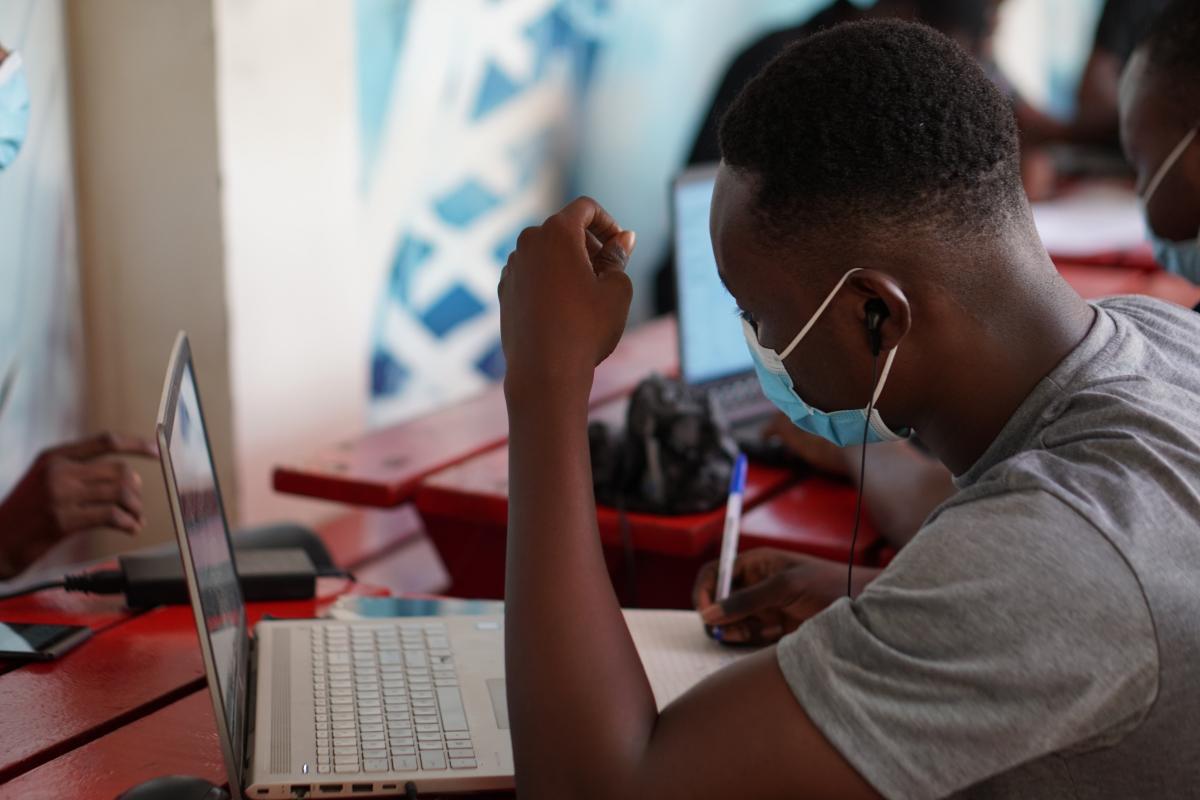
Image courtesy of Kojo Kwarteng, Unsplash
What is Open Access?
As the world continues to grapple with the uncertainties that the COVID-19 pandemic presents, the need for accessible, rigorous, unbiased knowledge has never been more urgent. However, this need stands in the wake of a barrage of misinformation, disinformation, and ‘fake news’.
In spite – or perhaps because – of this, the Open Access (OA) movement has gained even greater traction over the past 18 months, in an effort to make research on COVID-19 more widely available and to make research in other fields accessible to remote teachers and learners. But what is OA? Why is it increasingly important and how has COVID-19 advanced the OA cause?
OA is a set of principles and a range of practices through which research outputs are distributed online, free of cost or other access barriers, providing users with full re-use rights.[1] OA seeks to make research and data available for anyone, anywhere in the world to read, use, and build upon the knowledge, thus making knowledge outputs more valuable to a greater number of people.[2]
Open access can be applied to any published research output, including peer-reviewed and non peer-reviewed academic journal articles, conference papers, theses, book chapters, monographs, research reports, and images. OA journals are categorized using a simple colour system.[3],[4]
Table 1 The OA publishing system
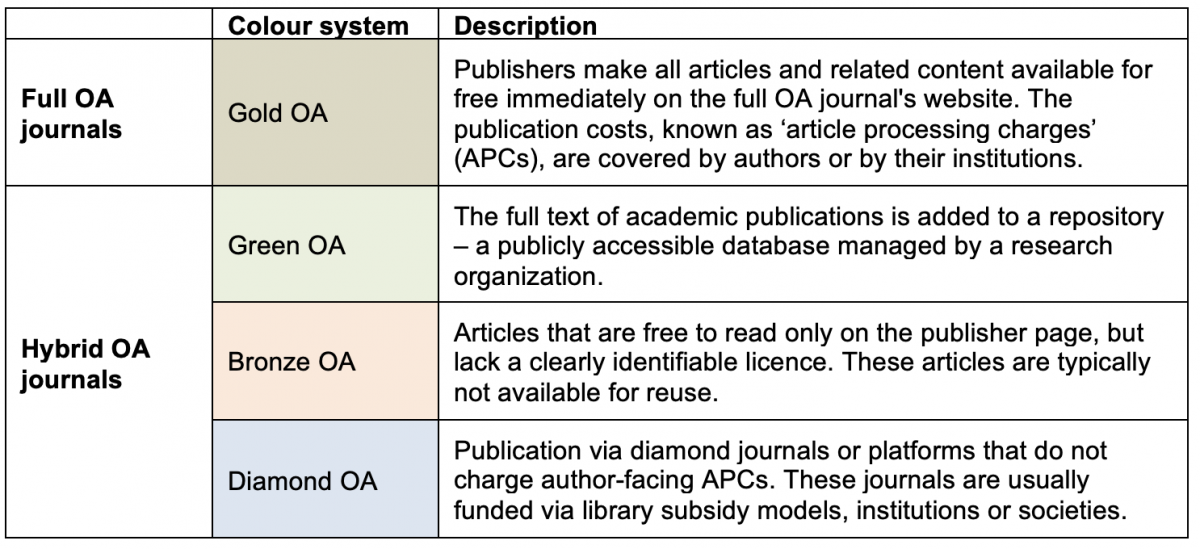
OA can, to an extent, be contrasted with ‘traditional’ publishing models for research outputs, with often exorbitant journal subscription fees that have consistently outpaced the consumer price index by a factor of four to five over the past three decades.[5] The high cost of journal subscription fees has meant that educational institutions, educators, researchers, and students may be locked out by paywalls and often cannot afford to access these articles, or are forced to buy them without knowing whether the content is relevant for their purposes. Moreover, publishing in scholarly peer reviewed journals usually involves long delays from submission to publication, which takes an average of nine months. This is partially due to the length of the peer review process, but can also be attributed to the prevailing tradition of publishing in issues – which has become less relevant because of the digitization of materials. This custom ultimately creates backlogs of manuscripts awaiting publication.[6]
Open Access during COVID-19
Why is OA more relevant now than ever before? The last 18 months has provided an extraordinary research context in which researchers have bypassed traditional systems to provide up-to-date research and findings about the evolving COVID-19 pandemic. As a group of United States-based patient and disease advocacy organisations recently noted, ‘information critical to health should no longer be held hostage by arcane publishing’[7].
Throughout the pandemic, researchers have embraced open publishing platforms and preprint servers to disseminate their findings as rapidly as possible. The first article related to COVID-19 was published on bioRxiv on 19 January 2020 – just 20 days after the Chinese government informed the World Health Organization (WHO) of the impending COVID-19 threat. The article was licensed under a CC BY-NC-ND 4.0 International licence.[8] Some publishers have committed to publishing scientific articles relating to the disease as OA. Others are facilitating rapid open peer review and expediting the publishing of related research. The Pulitzer Prize-winning journalist Michael Hiltzig refers to this convincing demonstration of the value of OA to scientific research as one of the most important positive disruptions caused by COVID-19.[9]
At a practical level, the adoption of open practices has ignited collaboration and interaction amongst the scientific community. As Heather Joseph, the executive director of SPARC explains,
One of the things that COVID is showing us is that when scientists start openly pooling their data and articles, they start to have conversations about science in real time. Instead of waiting months for key findings to be published, scientists are sharing their findings on the sorts of channels many people use every day—such as Slack and Twitter.
This demonstrates how OA is part of the evolution of research publishing and in so doing, how it has contributed to our understanding of the disease. It is easy to see how the greater availability of information has propelled more rapid progress in various areas relating to COVID-19 – freely available scientific information has never been more necessary than in this age, where misinformation from unidentifiable or unrecognised sources muddies the waters between fact and fiction. But how has the pandemic highlighted the need for more people to consider making their research and data OA?
What about other research?
While most COVID-19 related studies were commendably made freely available to all, much of the world’s publicly funded university research remains hidden behind paywalls. However, the tide seems to be turning. Publishers, research institutions, and funders are collaborating to deliver high-quality OA publications for free at the point of publication.[10]
Efforts to remove journal paywalls have also gained significant traction since 2018, when an influential group of research funders announced that the scientists they fund should publish their peer-reviewed papers outside journal paywalls. This initiative, named Plan S, created instantaneous speculation over its efforts to eliminate journal subscription models. After many deliberations over policy, the project officially began in 2021, with 25 funding agencies rolling out similar OA mandates.[11] This has catalysed a significant shift, as an article in Nature explains,
Despite the complexity it’s brought, Plan S has already catalysed a shift in the OA landscape, advocates say. Journals that previously offered no route to make peer-reviewed articles immediately OA now do — even if only for authors with Plan S funders — and there’s been a blossoming of experiments with OA business models.[12]
Other significant developments include the global OA advocacy initiative OA2020’s efforts to implement transformative agreements in transitioning scholarly journals to OA. Transformative agreements allow users to repurpose former subscription payments to cover open publication of a country’s or institution’s research articles, thus eliminating author-facing article processing charges. Transformative agreements also allow one to restructure financial streams, creating enabling conditions for OA publishing and a more transparent, competitive market.[13]
In Africa, Côte d’Ivoire has launched a country-level Open Access repository, while Ethiopian university and government stakeholders have implemented OA policies for repositories, journals and infrastructures. In South Africa, institutions like University of Cape Town and University of the Witwatersrand have made similar inroads in promoting OA, with the former institution developing a continental platform for publishing OA journals, monographs and textbooks in Africa.[14] In addition, countries such as Ghana, Malawi, and Uganda, have finalized their national policies for data and repository management.[15]
These kinds of arrangements have contributed to significant progress in mainstreaming OA. Piwowar et al estimate that, as of 2019, approximately 31% of all journal articles are available as OA and 52% of article views are to OA articles. Given these trends, they project that, by 2025, 44% of all journal articles will be available as OA and 70% of article views will be to OA articles.[16] However, there is still a lot of work to be done, as noted in a recent article:
In addition to and sometimes combined with geopolitical arguments and regional skepticism, active attempts to discredit open access as “bad science” are never far from the surface, e.g. the insinuation that open access publications may not be properly peer reviewed or that the APC model inevitably leads to lots of publications with questionable merit.[17]
This drives home the point that OA requires a consistent commitment to make sustainable – and sometimes incremental – gains in realising its goals. The current COVID-19 crisis highlights the importance of unfettered access to scientific and scholarly information, for researchers, educators, students, journalists and non-academic professionals alike. But sustainable change needs to happen at both the systemic and individual levels. Ultimately, it is not a question of whether OA is better than other publishing models, but rather of how OA can enhance a more equitable publishing ecosystem and thus make knowledge and data more accessible.
For more information on how to publish OA research, OER Africa has created a learning pathway to give you practical guidance for doing so. Visit Publish Using Open Access to access this tutorial. Other learning pathways are available here.
Related articles:
- What is Open Science and how does it relate to open knowledge?
- Sharing Africa’s knowledge through open data
- How can OpenCourseWare help you to improve your courses?
Access the OER Africa communications archive
[2] Open Access Weeks. (2012). PhD comics. Retrieved from https://upload.wikimedia.org/wikipedia/commons/transcoded/7/71/PhD_Comics_Open_Access_Week_2012.ogv/PhD_Comics_Open_Access_Week_2012.ogv.360p.webm
[4] Open Access.nl. (nd). What is Open Access? Retrieved from https://www.openaccess.nl/en/what-is-open-access
[5] Burns, P. (2017). Academic journal publishing is headed for a day of reckoning. The Conversation. Retrieved from https://theconversation.com/academic-journal-publishing-is-headed-for-a-day-of-reckoning-80869
[6] Björk, B. and Solomon, D. (2013). ‘The publishing delay in scholarly peer-reviewed journals’. Journal of Infometrics. Retrieved from https://www.researchgate.net/publication/259165321_The_publishing_delay_in_scholarly_peer-reviewed_journals
[8] Kiley, R. (2020). ‘Open access: how COVID-19 will change the way research findings are shared’. Wellcome. Retrieved from https://wellcome.org/news/open-access-how-covid-19-will-change-way-research-findings-are-shared
[9] Tavernier, W. (2020). ‘COVID-19 demonstrates the value of open access: What happens next?’ Association of College and Research Libraries. Retrieved from https://crln.acrl.org/index.php/crlnews/article/view/24414/32251
[10] Boyle, P. (2021). ‘Covid-19 underlines the need for full open access’. Times Higher Education. Retrieved from https://www.timeshighereducation.com/blog/covid-19-underlines-need-full-open-access
[11] Else, H. (2021). ‘A guide to Plan S: the open-access initiative shaking up science publishing’. Nature. Retrieved from https://www.nature.com/articles/d41586-021-00883-6
[12] Else, H. (2021). ‘A guide to Plan S: the open-access initiative shaking up science publishing’. Nature. Retrieved from https://www.nature.com/articles/d41586-021-00883-6
[13] Open Access 2020. (2020). OA2020 Progress Report. Retrieved from https://oa2020.org/wp-content/uploads/OA2020-Progress-Report-December-2020.pdf
[14] Makoni, M. (2021). New continental platform for open access publishing. University World News. Retrieved from https://www.universityworldnews.com/post.php?story=20210203114558607
[15] Markin, P. (2020). Open Access in Africa, Institutional Repository Development and Open Science Challenges. Open Research Community. Retrieved from https://openresearch.community/posts/open-access-in-africa-institutional-repository-development-and-open-science-challenges?channel_id=2448-players
[16] Piwowar, H., Priem, J. and Orr, R. (2019). ‘The Future of OA: A large-scale analysis projecting Open Access publication and readership’. bioRxiv. Retrieved from https://www.biorxiv.org/content/10.1101/795310v1
[17] Spichtinger, D. (2020). ‘Not yet the default setting – in 2020 open research remains a work in progress’. London School of Economics. Retrieved from https://blogs.lse.ac.uk/impactofsocialsciences/2020/01/17/not-yet-the-default-setting-in-2020-open-research-remains-a-work-in-progress/
OER Africa has been grappling with the complexities surrounding diversity promotion. We have written this article in the hope that it contributes to an ongoing conversation – within our initiative and beyond – on diversity in the OER space.
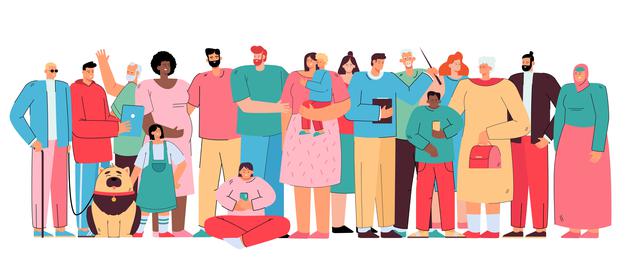
Image courtesy of PCH Vector, Freepik
At OER Africa we were encouraged to see that the UNESCO Recommendation on OER aims to facilitate international cooperation to 'develop a global pool of culturally diverse, locally relevant, gender-sensitive, accessible, educational materials in multiple languages and formats'. This is a powerful ideal, and OER Africa has been grappling with the complexities surrounding diversity promotion. We have written this article in the hope that it contributes to an ongoing conversation – within our initiative and beyond – on diversity in the OER space.
Cultural diversity refers to the practice of including people from varied socio-economic, racial, ethnic, and cultural backgrounds, as well as people of different genders and sexual orientations. This article will focus predominantly on inclusion of people from Africa and the global South.
On 21 May, we celebrated World Day for Cultural Diversity for Dialogue and Development. Despite this, African resources, as well as its people and its languages are underrepresented in global digital knowledge networks. To take one example: Wikipedia has more articles about Paris than it does about the whole of Africa.[1] In addition to a lack of African content, African narratives are often written by people outside Africa, enforcing biases in the content with which Africans engage and in how Africa is represented.
Without knowledge and narratives created by people from Africa, Africans are, from a very young age, prevented from experiencing an accurate representation of their world, in their languages, and from being able to contribute to developing such a representation. This is exacerbated by education systems that are not yet systematically (or systemically) developing the skills young Africans need to contribute to global knowledge networks. These skills include creativity and critical thinking, which could be taught effectively when covering Indigenous Knowledge Systems (IKS), unfortunately an area under-researched and under-taught in African contexts. Creativity and critical thinking allow society a broader perspective, encourage innovative solutions to solving problems and unlock the skill to generate new and useful ideas. Creativity and critical thinking are essential for building self-awareness and agency and unlocking our collaborative futures.
Open licensing offers great promise in this regard, as historically, knowledge production and cultural narratives have been controlled by a minority. More than improving access to knowledge, open licensing can shift the power dynamic and allow more diverse people to be the creators and consumers of knowledge. By improving the diversity of the knowledge that is created, we make it more representative and therefore more accurate. As Clement notes,
When we implement OER, we must continuously ask ourselves ’whose knowledge is being foregrounded and whose view of reality is being entrenched‘ in these materials (Adam et al. 2019)? If decolonization is not foundational to OER implementation, the OER initiative betrays its own philosophy.[2]
As COVID-19 has highlighted, compounding the issues mentioned above is the digital divide, which is widening as many communities do not have access to the Internet or cannot access vital information in their own languages, thereby being excluded from global knowledge networks or participating in them only as passive consumers. However, the influx of mobile phones for access to the Internet has enabled the proliferation of OER access in Africa and beyond. Czerniewicz, Willmers, and Hodgkinson-Williams (2020) explain that, in addition to addressing the cost and lack of access to education materials,
The democratised authorship approach entailed in many forms of OER production is conducive to collaboration and peer-to-peer knowledge production. In this sense, OER can provide a mechanism through which to challenge the Western-oriented worldviews enshrined in traditional textbooks and other teaching materials, and can be used as a tool for addressing transformation in the classroom.[3]
Similarly, Adam, Bali, Hodgkinson-Williams, and Morgan make the point that it is important to critically examine ‘in whose eyes open education is deemed ”valuable”; whose knowledge is being foregrounded and whose view of reality is being entrenched?’[4] It is only through this lens that we can interrogate OERs that may be grounded in coloniality, and move towards an empowering discourse of acceptance and representation. Initiatives to decolonize curricula such as de Beer (2019) [5] provide numerous ideas for making curricula and classrooms less colonial. Examples include: incorporating indigenous knowledge into the teaching of DNA, ethnobotanical knowledge and the making of soaps in science classrooms or laboratories; featuring contextualized practices in health and and agriculture; providing project-and problem-based learning environments for students; using puppets to provide different viewpoints in school classrooms; and using indigenous technologies to solve problems.
Internationally, ‘Achieving the Dream’, which promotes student success in community colleges in the US, shows in Using Open Educational Resources how important OER are. It suggests that, by using OER, culturally responsive educators can adapt and localize content to suit learners’ needs, translate into other languages, incorporate learner content, and ensure that it does not contain bias or stereotypes. Culturally responsive teaching comprises eight competencies, as illustrated in Figure 1. These competencies are relevant for all teaching situations. They include building on students’ prior knowledge and cultural background, accepting that there are multiple ‘ways of knowing’ beyond Western scientific knowledge, and promoting student success rather than competition and ranking.
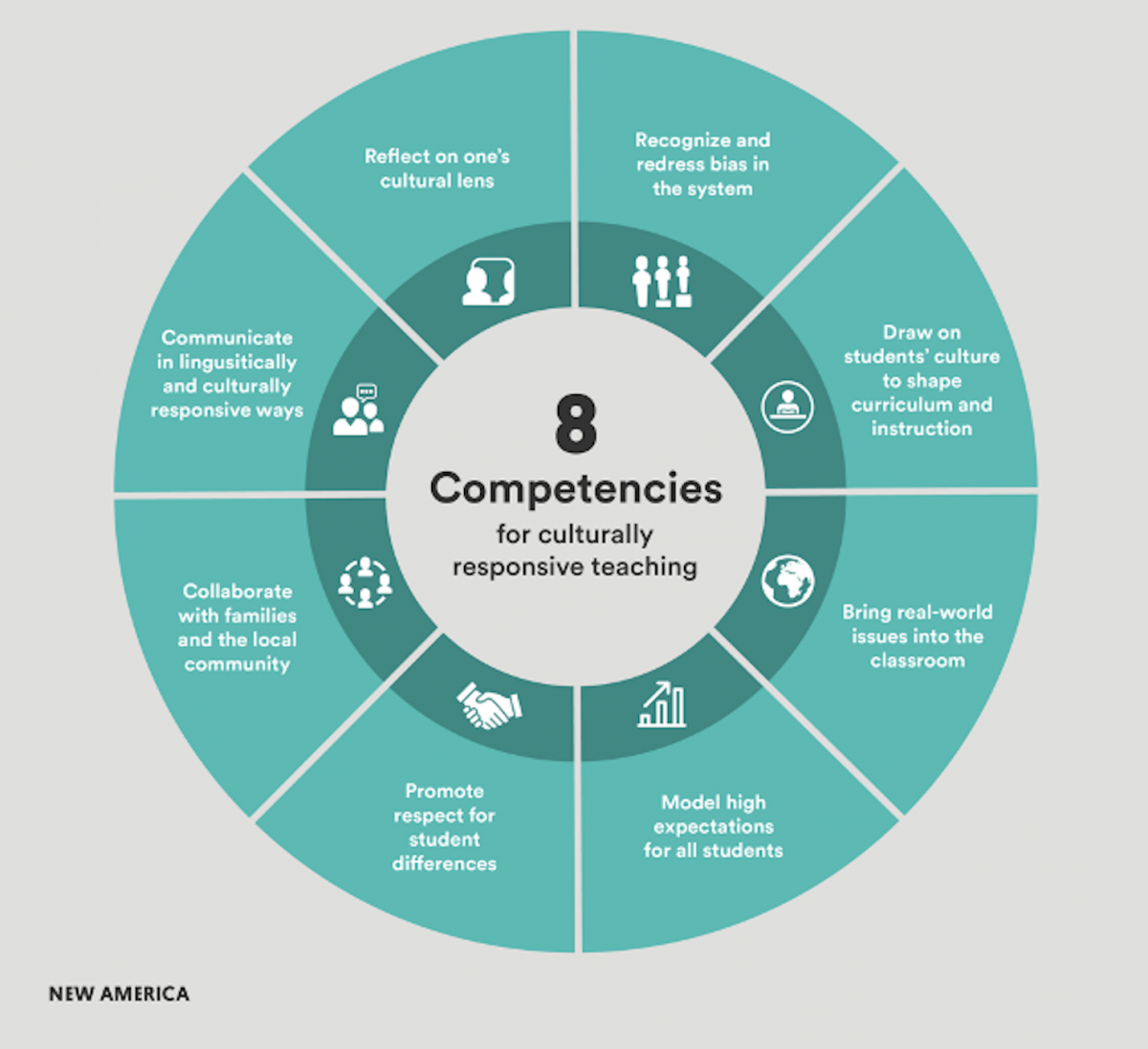
Figure 1: Competencies for Culturally Responsive Teaching
Source: Culturally Responsive Teaching CC BY
Cultural diversity in OER can be promoted through: the exploration of innovative ways of bringing together people from culturally diverse backgrounds and different parts of the world into decision-making processes regarding OER strategy and advocacy efforts; sourcing funding for people in the global South to create and share OER; and tracking progress for any initiative, or community actions towards achieving tangible cultural diversity outcomes espoused in the OER.
Below are some key resources, websites, and portals that promote cultural diversity especially African culture and Africa-created resources.
- WikiAfrica Education engages young Africans through local cultural organizations to create and translate content about and for Africa on Wikipedia. The goal is to get people engaged and inspired to create content for and about Africa in African languages to ensure better representation of African languages online.
- For teacher education, the OER Africa website Teacher Education Network suggests possible resources and ways in which institutions have used OER with their students.
- The Health Informatics Building Blocks (HIBBs) Program was designed to build workforce capacity in resource constrained environments to plan, develop, manage, and use health information and communications technology applications, with the goal of improving the delivery of health care.
- The OER Africa Agshare collaboration programme created openly shareable different types of OER that strengthened agriculture faculties and curricula and created downstream uses of the OER for other stakeholders.
- The African Storybook OER website and its associated apps enable writers from across the continent to develop their own storybooks and immediately publish them on the website. It also enables translation of any of the approved existing storybooks into home languages. Already over 200 languages of Africa are represented on the website. African Storybook is then a repository of openly licensed storybooks for teachers, librarians and parents to access for young children to practise their reading. The storybooks can be read online, downloaded and printed or read offline via the African Storybook Reader App. Most of the storybooks have been developed by African authors, and they are available in multiple languages to encourage the use of home language reading.
- Digital Open Textbooks for Development (DOT4D) is an initiative at the University of Cape Town with a social justice imperative. One of the initiative’s objectives is to ‘Support open textbook publishing activity at UCT that prioritises strategies for integrating student perspective, curriculum transformation, and sustainability.’
- World Digital Library makes primary materials accessible. These include manuscripts, maps, photos, recordings, films, and more from countries and cultures around the world, made available online free of charge.
- The International Library of African Music (ILAM) was established in 1954 by Hugh Tracey, at Rhodes University in South Africa. The library is one of the world’s great repositories of African music. ILAM is devoted to researching the study of music and oral arts in Africa, it preserves thousands of digitized and open accessible historical recordings collections dating as far back as 1929.
- African Online Digital Library (AODL) is an open access digital library of African cultural heritage materials created by Michigan State University in collaboration with museums, archives, scholars, and communities around the world.
Recent developments in the OER space, together with a disproportionate focus on knowledge production from the global North, highlight an urgent need to promote the cultural diversity agenda in a meaningful way that encourages equity and welcomes voices from Africa and other regions in the global South.
[1] Wikimedia Education Initiative: https://www.techrepublic.com/article/for-wikipedias-20th-anniversary-students-across-africa-add-vital-information-to-site/
[2] Clement, K. (2020). Interrogating and Supplementing OER Through a Decolonized Lens. OER and beyond. https://ijoerandbeyond.org/interrogating-and-supplementing-oer-through-a-decolonized-lens/
[3] Czerniewicz, L., Willmers, M. and Hodgkinson-Williams, C. (2020). Pivoting to open education resources. University World News. Retrieved from https://www.universityworldnews.com/post.php?story=2020042910373650
[4] Adam, T., Bali, M., Hodgkinson-Williams, C. and Morgan, T. (2019). Guest Blog: Can we decolonize OER/Open? #DecolonizeOpen. OER19. Retrieved from https://oer19.oerconf.org/news/blog-can-we-decolonize-oer-open-decolonizeopen/#gref
[5] The decolonisation of the curriculum project. Retrieved from https://doi.org/10.4102/aosis.2019.BK133
The open knowledge ecosystem has seen significant growth in the last few years. This communication is about Open Science from an African perspective. It explores examples of how Open Science platforms are being constructed, together with linkages among the different forms of openness.

Image courtesy of Kiran Kumar, Creative Commons (CC BY 2.0)
The open knowledge ecosystem has seen significant growth in the last few years. UNESCO’s November 2019 Open Educational Resource (OER) Recommendation is rightly considered a groundbreaking development in support of open education practices; OER Africa has already explored the significance of the Recommendation in July 2020, August 2020, and November 2020.
What may be less widely known is UNESCO’s role in open knowledge more broadly – Open Access, Open Data, and Open Science. UNESCO also works to link these three ‘opens’ with OER. In UNESCO’s post on its work in support of an Open Science Recommendation, UNESCO writes about these linkages:
[The] UNESCO Recommendation on Open Science will complement the 2017 Recommendation on Science and Scientific Research. It will also build upon the UNESCO Strategy on Open Access to Scientific Information and Research and the new UNESCO Recommendation on Open Educational Resources.
OER Africa discussed Open Access publishing and Open Data in previous posts. This communication is about Open Science from an African perspective. Below you will find examples showing how Open Science platforms are being constructed, together with linkages among the different forms of openness.
Member states tasked UNESCO to develop an Open Science Recommendation at its 40th General Conference, the same one in which the OER Recommendation was approved. UNESCO began multi stakeholder consultations shortly thereafter, which will continue until September 2021.
This is UNESCO’s cogent explanation of Open Science:
The idea behind Open Science is to allow scientific information, data and outputs to be more widely accessible (Open Access) and more reliably harnessed (Open Data) with the active engagement of all the stakeholders (Open to Society).
Figure 1: Concepts linked to Open Science, UNESCO
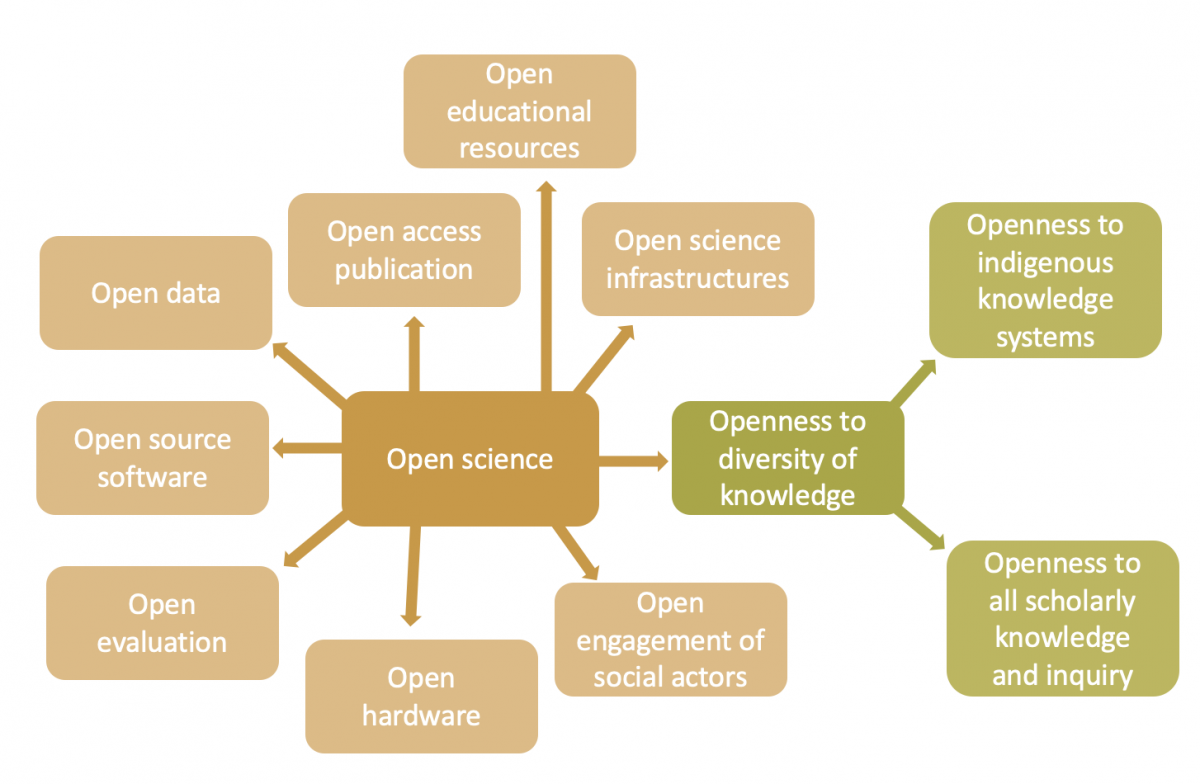
Image adapted from Robbie Ian Morrisson, Wikimedia (CC BY)
The concept of open or openness ties together all these elements. Open Access, Open Data, OER, and open-source hardware all carry licences that permit sharing and reproduction. Open Access and OER content typically use Creative Commons licences, while Open Data licences are largely based on those written by Creative Commons.
Indigenous Knowledge Systems are a part of the Open Science concept, but they are not always easily available to researchers, development experts, or policy makers because they have not been considered part of the development of Western empirical science. In its article on Indigenous Knowledge Systems, SciDevNet explains why Indigenous knowledge is a form of scienceand should not be ignored. UNESCO’s programme on Local and Indigenous Knowledge Systems is trying to bring indigenous knowledge into the open. It is important to bear in mind, however, that some communities are wary of theft of intellectual property by for-profit companies, and the World Intellectual Property Organization (WIPO) is taking a leading role in helping them articulate these fears.[1]
In 2016, a preparatory pilot for the African Open Science Platform (AOSP) began. Its priorities were to:
- Map the current landscape of data/science initiatives in Africa.
- Build a Pan-African open science community and encourage the formation of national open science fora. A notable and crucial success of the pilot in this regard was development of an African community of practice and support, which included relevant government ministries, universities, and pan-African and regional organizations. African networks, such as the African Academy of Sciences, the Network of African Science Academies, the Association of African Universities, the West and Central African Research Network (WACREN), and the UbuntuNet Alliance (the research and education network for Eastern and Southern Africa).
- Develop frameworks for policy, incentives, training, and technical requirements that would inform the operational platform.[2]
The final report was published in 2018. On 29 April 2020, the NRF announced that it would be responsible for hosting the African Open Science Platform project for the next three to five years.
The WACREN is responsible for coordinating African national and regional efforts to build the technical components of the Platform through its LIBSENSE initiative. LIBSENSE was established in 2016 to bring together African research and education networks and academic library communities to advance Open Science in Africa and foster the continent’s participation in Open Access globally.
WACREN and others draw a clear link between Open Science and Open Access, for instance using a national Open Science platform to host Open Access repositories. In a panel session at the 2021 WACREN annual conference, held virtually this year, Owen Iyoha, Managing Director of Nigeria’s Eko-Konnect made the following points about Open Science and infrastructure considerations in the figure below:
Figure 2: Open Science infrastructure for Nigeria

Eko-Konnect plans to include Moodle, the open-source learning platform on its Open Science cloud, which will allow the seamless integration of OERs created at multiple institutions.
OER and Open Science are based on a shared belief that access to knowledge should be freely, openly, and publicly available. In its draft Institutional Open Access Policy Template, LIBSENSE ties together open principles in its section on reward mechanisms by:
Setting up reward mechanisms for researchers using open science practices (e.g. sharing provisional results through open platforms, using open source software and other tools, participation in open collaborative projects, open access to publications and data, using open educational resources etc.).
However, specificity about where OER fits into Open Science is lacking. Where exactly might Open Science take advantage of OER principles and vice-versa? As a start, capacity building and training are integral to efforts to drive Open Science planning and implementation in Africa. If all training materials were openly licensed and made widely available, they would be relevant to a much broader audience and might be adapted to fit different needs. In addition, many African countries and institutions are planning Open Science clouds, including Eko-Konnect in Nigeria. All content related to platform-building could also be openly licensed. Finally, should Open Science clouds host or link to OER, at the very least the OER created for Open Science cloud training and capacity building? The bottom line is for WACREN and others working on Open Science to ensure that OER play an integral role in building OS communities and platforms.
Policy is another issue that would benefit from more sustained attention. There are proposed or actualized polices for Open Access, OER, Open Data, and now Open Science. Some African universities, particularly those in South Africa and East Africa, have their own Open Access policies. A few of these include the University of Cape Town in South Africa; Kenyatta University in Kenya; and Ethiopia, which has a national Open Access policy. LIBSENSE is also working on an Open Access template. Somewhat fewer African universities have distinct OER policies or broader policies that support OER; OER Africa tracks these examples. In addition, research networks such as the African Academy of Sciences have both Open Access and Open Data guidelines. Until now, however, most policy setting has been tackled in silos, with little sustained effort to build knowledge on what options work best. Are individual standalone policies desirable? Should they be integrated into other, existing tools rather than being developed independently? In addition, do university intellectual property policies require revision (where they exist)?
Open Knowledge (OER, Open Access, Open Data, and Open Science) can greatly benefit African knowledge production, access, and utilisation by improving its discoverability and visibility. Open UCT at the University of Cape Town, for example, has usage statistics for each of the resources included in its repository. The National Academic Digital Repository of Ethiopia does the same.
OER Africa will continue to monitor developments, such as the ones we write about above, which impact on higher education on the continent. Please contact us here if there are additional issues you would like us to discuss.
For more articles in this series, click on the links below.
- Open Pedagogy (19 April 2021)
- What role do Creative Commons licences play in OER? (17 March 2021)
- Why is ‘Open Education’ important? (25 February 2021)
- How do I create a Community of Practice for Open Educational Resources? (3 February 2021)
- Do you want to communicate your research more widely? (19 January 2021)
- How can you get involved in the Open COVID Pledge for Education? (9 December 2020)
- How can governments and institutions operationalize the OER Recommendation? (19 November 2020)
- How can you use MOOCs in your teaching? (21 October 2020)
- Online assessment: How do we know if students are learning? (18 September 2020)
- UNESCO’s OER Recommendation Dynamic Coalition Consultations: The way forward (26 August 2020)
- The Open COVID Pledge for Education (12 August 2020)
- How can OpenCourseWare help you to improve your courses? (16 July 2020)
- Evaluating Open Content (2 July 2020)
- Adapting Open Content (25 June 2020)
- Sharing Africa’s knowledge through open data (18 June 2020)
- Sharing Africa’s knowledge through openly licensed publishing (11 June 2020)
- Podcast: OER and their Relevance to the COVID-19 pandemic (5 June 2020)
- Sharing Africa’s knowledge through open African research repositories (29 May 2020)
- Emergency Remote Teaching Webinar Series – All resources available (18 May 2020)
- OER Repositories in Africa (8 May 2020)
- How to Find Open Content (30 April 2020)
- Online (and offline) reading resources for children (23 April 2020)
- Showcasing OER Platforms: OER Africa (15 April 2020)
Are you familiar with open learning as an approach to education? Are open learning and open pedagogy the same thing? What does open pedagogy look like in practice?
In this week’s article, we explore the concepts of open pedagogy and open learning. We also unpack open pedagogy using an interactive learning template.

Are you familiar with open learning as an approach to education? Are open learning and open pedagogy the same thing? What does open pedagogy look like in practice?
Open Learning
In a report prepared by Saide (2000) for the South African Department of Education, the authors dispel certain misconceptions about open learning that have developed over time.
Firstly, open learning is not the same as distance education. The idea of open distance learning creates a false expectation that all distance learning is open. There are many instances of distance learning that do not provide open access or lead to success. In addition, face-to-face learning can be open. Open learning is an approach that has the potential to promote openness within a whole educational system.
Secondly, open learning is relevant to all fields of education, not just adult education.
And finally, open learning goes beyond opening learning through isolated, individual educational projects.
'The principles of open learning provide a set of benchmarks against which all aspects of any educational system (international, national, provincial, or institutional) can be measured. This process can lead to improvements in the underlying design of such system, because it can remove unnecessary closure and consolidate closure where it is important to the efficient and financially viable functioning of the system.' (Saide, 2000)
In this report, Saide (2000) suggests that,
'open learning [is] an approach to education which seeks to remove all unnecessary barriers to learning, while aiming to provide learners with a reasonable chance of success in an education and training system centred on their specific needs and located in multiple arenas of learning.'
Open Pedagogy
There has been much debate about the link between open pedagogy, open educational resources (OER), OER-Enabled Pedagogy (Wiley & Hilton, 2018) and open educational practice (OEP).
In an article published in the International Journal of Open Educational Resources (IJOER), 'Towards a Working Definition of Open Pedagogy,' Witt (2020) proposes a working definition of open pedagogy as 'any pedagogy informed by the practitioners’ conscious identification with the open movement, open access, and open educational resources.' He suggests that OER-enabled pedagogy and open educational practices address the how, [and] open pedagogy addresses the why.
In this spirit we want to share our conception of open pedagogy as part of an open learning approach. We are interested not only in what open pedagogy means, but also in the why and the how. We use a set of open learning principles to help us understand why open pedagogy is necessary, but also what it means in practice.
Open Learning Principles
Over time, Saide (2019) has developed and adapted a set of open learning principles and categorised them as follows:
1. Increasing access for success
- Learners have meaningful and affordable access to opportunities for lifelong learning.
- Unnecessary barriers to access are removed.
- Wherever appropriate, learning provision is flexible, allowing learners to increasingly determine where, when, what and how they learn, as well as the pace at which they will learn.
2. Enabling success
- Providers create the conditions for learner success through learner support, contextually appropriate resources and sound pedagogical practices.
- Learning processes centre on the learners and contexts of learning, build on their experience and encourage active engagement leading to independent and critical thinking.
3. Continuing success
- Prior learning and experience is recognised wherever possible.
- Arrangements for credit transfer and articulation between qualifications facilitate further learning.
The intention is for educational practitioners to apply these principles as part of an ongoing process of evaluation and improvement, to develop meaningful educational opportunities, regardless of the 'mode of delivery' used.
Open pedagogy is not just about open content
Wiley (2013) spoke about open pedagogy as “that set of teaching and learning practices only possible in the context of the free access and 4R permissions characteristic of open educational resources” (Wiley, 2013, final paragraph). Conole (2010) defined open educational practices as “a set of activities and support around the creation, use and re-purposing of Open Educational Resources (OERs)”. So open pedagogy (and open educational practices) assumes access to content and resources in the form of OER.
For us, access can mean many things. Hegarty (2015) associated open pedagogy with attributes such as participatory technologies; people, openness, trust; innovation & creativity; sharing ideas & resources, connected community; learner generated; reflective practice; and peer review. So, we need to think about access to technology, or access to data, for example. Particularly in this time of Covid, when most students are online (if they have access to data and technology) and remote we also think of access to people — each other and their lecturers.
What about access to the learning process? Think about university students you know of who struggle with reading, either because most, if not all, of the reading is in academic English and they do not have the experience of reading those kinds of texts. Or the student who has an educational background that has not prepared them well for post-school study. You may be thinking about a student who has work experience, but not in their direct field of study. For these students, access is about language, level, and what students already know.
In our view, open pedagogy asks the question: how do we provide learning opportunities for students in ways that remove barriers to access, and scaffold and mediate learning in ways that support students to succeed?
Understanding open pedagogy
At the heart of our understanding open pedagogy is understanding how people learn. One of the open learning principles for enabling success is that,
'learning processes centre on the learners and contexts of learning, build on their experience and encourage active engagement leading to independent and critical thinking' (Saide, 2019).'
We have developed a set of requirements for giving practical expression to this principle.
People learn by doing things that lead them to construct their own new knowledge. Reading, creating a mind map, doing an interview, planning a learning session, creating a model, doing an experiment, or teaching a class are all examples of being actively engaged in the learning process. If an action is facilitated or mediated in some way, students begin to understand and reflect on their action, and in that way start to internalise what they have learned.
Telling or transmitting information results in limited learning. For deeper learning to occur, people need to engage in a meaningful activity and then reflect on what they have done to learn something from it. This is an active rather than a passive conception of how we gain new knowledge.
Learning is structured around key activities that build up into identified learning pathways. There are structural links between programmes, modules, units and activities.
An important concept in open pedagogy is the idea of three presences: social presence, teacher presence and cognitive presence.
The most important thing you can do to make online learning accessible, meaningful and successful is to engage students in supportive and collaborative active learning. Create a presence. Create a set of learning activities that engages students in meaningful thought (cognitive presence), discussion with other students (social presence) with you as a critical and compassionate guide (teacher presence). Saide (2020)
Let’s explore the following activity template to unpack open pedagogy a bit more. Scroll down in the block to use the interactive template.
Open pedagogy and open learning principles
Stop and think
Which of the open learning principles are supported by our concept of an open pedagogy?
Our concept of open pedagogy supports student access to active learning, supporting them to reflect, think critically and solve problems. In open pedagogy, the materials “become a mediator” (Moll & Drew 2008), facilitating a conversation between and amongst the students and the teacher and supporting progress through the identified learning pathways. Open pedagogy supports students to succeed and equips them for critical lifelong learning.
Are you open?
Additional Resources
For further ideas about activity based learning, access the following online module: Designing Engaging Learning Activities
Conole, G. (2010). Defining open educational practices (OEP) [Blog post]. http://e4innovation.com/?p=373
Hegarty, B. (2015). Attributes of open pedagogy: A model for using open educational resources. Educational Technology, 3-13. https://upload.wikimedia.org/wikipedia/commons/c/ca/
Laurillard, D. nd. Learning Design
Mhlanga, E. 2009. Enriching online learning experience: the three ‘presences’, Saide.
Moll, I & Drew, S. 2008. Learning, a learning spiral and Materials Design, SAIDE, WIP.
OER Africa. 2020. Online assessment: How do we know if students are learning successfully?
Saide, 2003. What is a Learning-centred Learning Centre? p26.
Saide, 2019. Open learning principles Enabling successful learning
Saide, 2020. Quality Online Teaching and Learning, an online course
Wiley, D. (2013, October 21). What is open pedagogy? Iterating toward openness [Blog post]. http://opencontent.org/blog/archives/2975
Witt, A N. 2020 Towards a Working Definition of Open Pedagogy, IJOER, https://www.ijoer.org/towards-a-working-definition-of-open-pedagogy/
As readers will know, OER Africa is a strong proponent of open educational resources (OER) and open licensing. Creative Commons licences are the ones most frequently used when OER content is produced. There are six of them, which range from very permissive, allowing copying and modification (CC BY), to those that are more restrictive, permitting distribution of a work in its original form, but no modification (CC BY-ND).
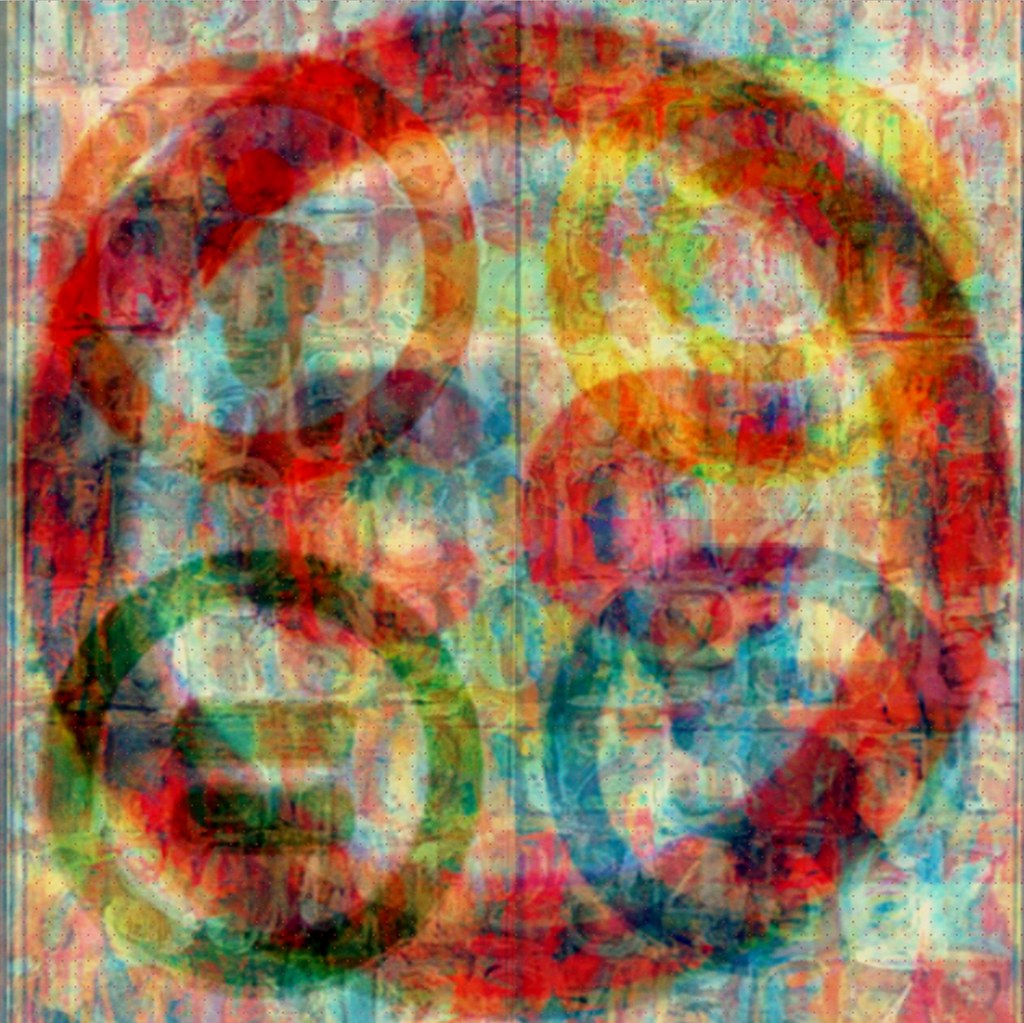
Image courtesy of qthomasbower, CC-BY-SA 2.0
As readers will know, OER Africa is a strong proponent of open educational resources (OER) and open licensing. Creative Commons licences are the ones most frequently used when OER content is produced. There are six of them, which range from very permissive, allowing copying and modification (CC BY), to those that are more restrictive, permitting distribution of a work in its original form, but no modification (CC BY-ND). Users need not request permission to use resources with a CC licence, but the terms of each licence must be met. For more information on CC licensing, go to the OER Africa tutorial on Finding Open Content.
Creative Commons and other organisations discuss OER in the context of five key points called the five Rs – reuse, retain, revise, remix, and redistribute.[1] Retain, reuse, and redistribute mean that users have the right to download, distribute, and keep the content without requesting permission from the resource creator. Revise and remix mean that the user may change the content in some way without asking permission. As an example, the stories on African Storybook and Storyweaver can be reused, retained, revised, remixed, and redistributed. At the tertiary level, all OER Africa content carries a CC BY licence. Go to the OER Africa tutorial on Adapting Open Content for more information on the five Rs.
Although many OER proponents argue that all five Rs are required in an open licence for a resource to be considered truly open, some organisations have opted for more restrictive licences. Two African award-winning early literacy NGOs – Ubongo, headquartered in Dar es Salaam, and the Molteno Institute for Language and Literacy (MILL), based in Johannesburg – have each decided to permit three Rs, but not to allow remixing or revision. MILL limits its resources to a non-commercial and non-derivative (CC BY-NC-ND) licence so that the methodology of its Vula Bula literacy materials can be retained. Ubongo uses the same licences for much the same reason; it does not wish its strict quality assurance methods to be compromised in any way through someone else’s adaptation.
The experience of Ubongo and other organisations with different kinds of CC licences is discussed in Closed or open? Ubongo’s switch from copyright protected to Creative Commons licensing.
In many countries, the high cost of textbooks and financial burdens placed on students have led initiatives to write and publish openly licensed textbooks. Siyavula, a South African NGO, produces open textbooks in mathematics and science in English and Afrikaans that are aligned to the South African curriculum as set by the Department of Basic Education (DBE). It licenses some versions of its textbooks only as CC BY-ND, while others carry a CC BY licence. Textbooks that feature a DBE logo are branded with a CC NY-ND licence to prevent any changes without permission, while the logo does not appear in the CC BY version. The ones in the latter category are downloadable in ePUB format to allow for easy adaptation.
Figure 1 Siyavula textbooks are available in PDF or ePUB formats depending on the licensing conditions.
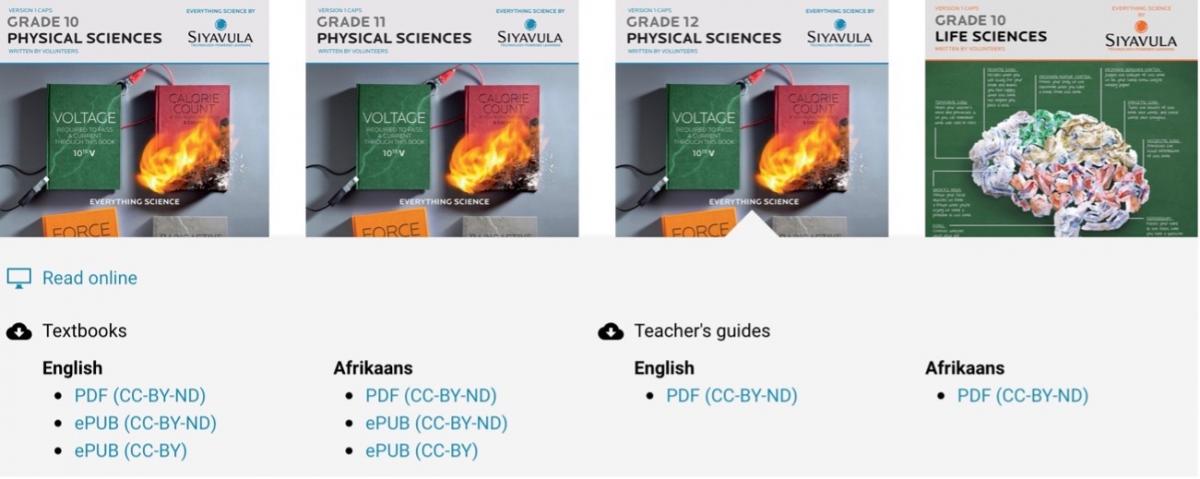
Licence type is an important consideration, but file format is equally significant. By way of example, text document formats such as Word or ePUB files are relatively easy to edit if you have the required software, but their PDF equivalents are not. In addition, video can be particularly challenging to adapt, even if it is legally permissible. Khan Academy (KA) videos are a case in point. KA offers most of its videos with a CC BY-NC-SA licence, which allows for changes in content or language. But adaptation requires software and skills that many educators do not possess.
Thus, OER content creators should consider both the most appropriate licence to apply to their work and the format in which it will be released. In 2015, the University of Cape Town published a three-step guide for academics on open licensing, which includes a discussion of content creator intentions, institutional policy frameworks, and selecting and application of licences.
Figure 2 All resources must be atttributed to the content creator.

Finally, OER content creators must correctly attribute every resource they use while producing their OER. The figure above shows the attribution page of OER Africa’s learning pathway on finding open content. Note that each resource includes information on the licence used.
In conclusion, while the meaning of openness can relatively easily be defined, working out aspects of openness that are most suitable to implement for different kinds of resources is a process that will be strongly influenced by the wider context in which these decisions are being taken. Some organisations want to maximise distribution but are reluctant to permit adaptation of their resources because of potential problems this might create. Others have no objection to their resources being adapted, but those resources are in a format that cannot be easily revised. Still other organisations are unwilling for their content to be reproduced and monetised by commercial publishers, either for ethical reasons or because it might jeopardise their own financial sustainability. This suggests that we need flexible, less prescriptive definitions of OER that will remain relevant for different contexts and needs and that allow people and organisations to move towards greater degrees of openness in ways that work best for them.
For more articles in this series, click on the links below.
- Why is ‘Open Education’ important? (25 February 2021)
- How do I create a Community of Practice for Open Educational Resources? (3 February 2021)
- Do you want to communicate your research more widely? (19 January 2021)
- How can you get involved in the Open COVID Pledge for Education? (9 December 2020)
- How can governments and institutions operationalize the OER Recommendation? (19 November 2020)
- How can you use MOOCs in your teaching? (21 October 2020)
- Online assessment: How do we know if students are learning? (18 September 2020)
- UNESCO’s OER Recommendation Dynamic Coalition Consultations: The way forward (26 August 2020)
- The Open COVID Pledge for Education (12 August 2020)
- How can OpenCourseWare help you to improve your courses? (16 July 2020)
- Evaluating Open Content (2 July 2020)
- Adapting Open Content (25 June 2020)
- Sharing Africa’s knowledge through open data (18 June 2020)
- Sharing Africa’s knowledge through openly licensed publishing (11 June 2020)
- Podcast: OER and their Relevance to the COVID-19 pandemic (5 June 2020)
- Sharing Africa’s knowledge through open African research repositories (29 May 2020)
- Emergency Remote Teaching Webinar Series – All resources available (18 May 2020)
- OER Repositories in Africa (8 May 2020)
- How to Find Open Content (30 April 2020)
- Online (and offline) reading resources for children (23 April 2020)
- Showcasing OER Platforms: OER Africa (15 April 2020)
[1] Open Educational Resources (OER): 5 Rs of OER. (n.d.). Retrieved August 23, 2020, from https://nsufl.libguides.com/oer/5rs
Open Education has the potential to make education more accessible, enable the creation of relevant teaching and learning materials, improve the quality of content, and empower learners to be critical thinkers and knowledge creators. Open Education Week (OE Week), held annually, is an opportunity for actively sharing and learning about the latest achievements in Open Education worldwide.
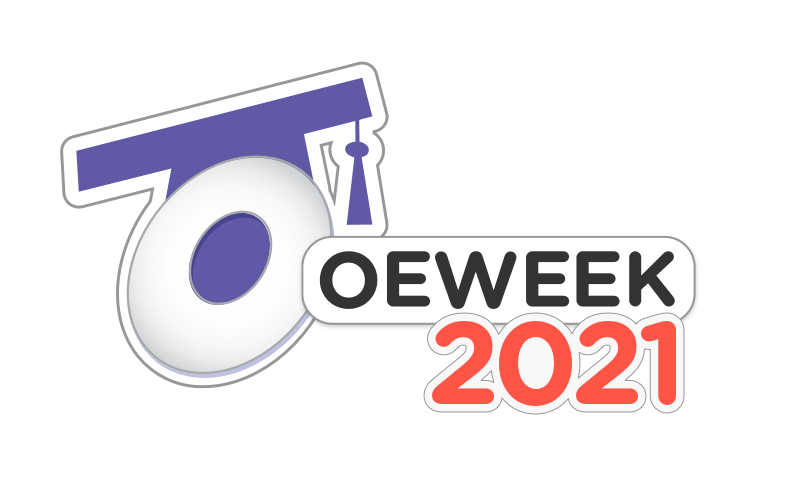
Open Education has the potential to make education more accessible, enable the creation of relevant teaching and learning materials, improve the quality of content, and empower learners to be critical thinkers and knowledge creators. Open Education Week (OE Week), held annually, is an opportunity for actively sharing and learning about the latest achievements in Open Education worldwide. OE Week provides practitioners, educators, and students with an opportunity to gain a greater understanding of open educational practices and be inspired by the OE community. OE Week will be held from 1-5 March 2021.
The term ‘Open Education’ is often used when discussing open educational resources (OER). However the term more broadly refers to a commitment to remove unnecessary barriers to access learning while seeking to ensure high quality educational experiences that will enable success both during and after studies. This commitment includes developing policies and practices of openness in entry requirements (with minimal or no restriction on qualifications), choice of courses, place of study and time, and so on. An open education approach can inform practice in face-to-face education, distance education, and online and blended learning.[1]
Open Education incorporates the key principle of learner-centredness. The learner should be the focus of the educational process and should be regarded as an active participant in an interactive engagement. Cognisance needs to be taken of the learner context, building on their experience wherever possible. Open Education should encourage independent and critical thinking. This is facilitated by regarding the learner as an active participant in the educational process and can be further enhanced by offering learners choices, possibilities, and contesting viewpoints within that process. Teaching independent and critical thinking empowers learners to be able to interact confidently and effectively within society.
Lifelong learning is central to openness. Learning should continue throughout life, rather than being limited to childhood and teenage years, and should be of direct relevance to the needs and life experience of learners. The concept of lifelong learning implies an acknowledgement of the reality that learning is a process in which all people are inevitably involved from birth until death and a consequent attempt to make structured educational opportunities available to people throughout their lives.
Education has become far more accessible to more people through the innovations introduced by Information and Communication Technology (ICT). While ICT has created many new possibilities for reaching learners, it also creates new barriers to access for many. Although online learning can accommodate different ways and styles of learning (making for greater accessibility) and enable the construction of a richer learning environment, all learners potentially face barriers to learning. These barriers may include the high cost of Internet access and technology, technical constraints in the use of technology, a shortage of appropriate resources (in the local language or context), or content that is not designed to be accessible to learners with disabilities.
Harnessing technology and online learning methods can provide access to education for those in remote areas, for the socially disadvantaged, and for the marginalised. If carefully implemented, Open Education can play a potentially important role in achieving the Sustainable Development Goals (SDGs) and enabling lifelong learning. Of course, effective learning design is critical and recognises that people learn differently and require learning resources that are related to their needs and circumstances.
An important element of openness is licensing. Legal frameworks such as Creative Commons help to govern how open a resource is. These licences provide mechanisms to ensure that authors of materials can retain acknowledgement for their work while allowing it to be shared, can restrict commercial activity, and can aim to prevent people from adapting it if they so wish. Open licensing creates possibilities for teachers and learners to access teaching and learning materials that they may not otherwise have been able to access. While e-books for the academic market are becoming more widely available, especially since the COVID-19 pandemic, unaffordable prices, an inability to buy e-books due to a refusal to sell or bundling of titles in packages, and restrictions on research copying are affecting coursework and research in universities. In the UK, libraries say they have struggled with high e-book prices and lack of availability for years, but this situation is now critical because students urgently need digital resources during the pandemic. Follow the hashtag #eBookSOS for more.
Using and creating OER encourages collaboration, so educators are able to share teaching practices and benefit from the ideas of others. Effective OER practices have the potential to improve the quality and reduce the costs of educational materials. This opens the possibility of making previously expensive materials affordably accessible to many. This is one potential solution to the challenges facing learners and teachers in Africa and across the world.
The fundamental principles underlying OER are the freedom to share knowledge and that the knowledge should be legally, socially, and technologically open. OER promote the creation and adaptation of content for different contexts. This is particularly important in Africa as it is the least visible continent online, despite accommodating a population of over a billion people. Content used in Africa is not always created by Africans. By using OER, learners and teachers in Africa are able to find, adapt, and create open content that is tailored to their needs, inclusive, and reflects the local context.
If you are interested in engaging in Open Education practices and networking with colleagues, there are a few ways to participate in OE Week. You can host an event, share OER, or attend activities hosted by others. For more information click here.
Remember all the resources on the OER Africa website are free to use and share. Let us know what you are doing to celebrate OE Week. Tag @OERAfrica in your social media posts and use #OEWeek.
[1] Commonwealth of Learning. (2020). Open and Distance Learning – Key Terms & Definitions [online]. Available from: http://oasis.col.org/bitstream/handle/11599/3558/2020_COL_ODL_KeyTerms_Definitions.pdf [accessed 22 October 2020].
For more articles in this series, click on the links below.
- How do I create a Community of Practice for Open Educational Resources? (3 February 2021)
- Do you want to communicate your research more widely? (19 January 2021)
- How can you get involved in the Open COVID Pledge for Education? (9 December 2020)
- How can governments and institutions operationalize the OER Recommendation? (19 November 2020)
- How can you use MOOCs in your teaching? (21 October 2020)
- Online assessment: How do we know if students are learning? (18 September 2020)
- UNESCO’s OER Recommendation Dynamic Coalition Consultations: The way forward (26 August 2020)
- The Open COVID Pledge for Education (12 August 2020)
- How can OpenCourseWare help you to improve your courses? (16 July 2020)
- Evaluating Open Content (2 July 2020)
- Adapting Open Content (25 June 2020)
- Sharing Africa’s knowledge through open data (18 June 2020)
- Sharing Africa’s knowledge through openly licensed publishing (11 June 2020)
- Podcast: OER and their Relevance to the COVID-19 pandemic (5 June 2020)
- Sharing Africa’s knowledge through open African research repositories (29 May 2020)
- Emergency Remote Teaching Webinar Series – All resources available (18 May 2020)
- OER Repositories in Africa (8 May 2020)
- How to Find Open Content (30 April 2020)
- Online (and offline) reading resources for children (23 April 2020)
- Showcasing OER Platforms: OER Africa (15 April 2020)
Are you looking to interact with people who are interested in Open Education Resources (OER)? Do you have ideas that you want to share with a wider audience and learn more about OER? A Community of Practice (CoP) might be the right place for you.
The term ‘Community of Practice’ was created by Etienne Wenger, who offers a social theory of learning – a school of thought that proposes that humans can acquire new ideas and behaviours by observing others.
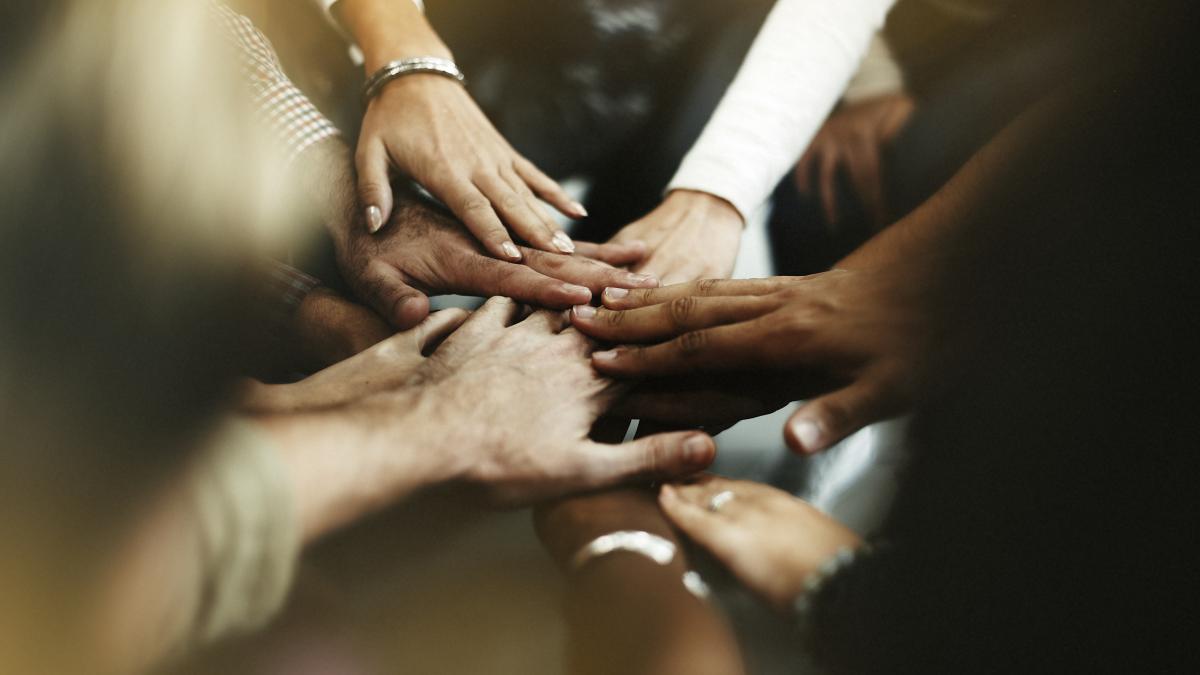
Image courtesy of rawpixel.com via Freepik
What is a Community of Practice?
Are you looking to interact with people who are interested in Open Education Resources (OER)? Do you have ideas that you want to share with a wider audience and learn more about OER? A Community of Practice (CoP) might be the right place for you.
The term ‘Community of Practice’ was created by Etienne Wenger, who offers a social theory of learning – a school of thought that proposes that humans can acquire new ideas and behaviours by observing others. The term has been used in various ways, and usually refers to informal networks that support people to develop shared meaning and engage in knowledge building.[1] A CoP is a group of individuals who share a domain of interest, which they use as a basis for interaction. Members of a CoP for OER might share resources, experiences, problems and solutions, tools, and methodologies. This results in members gaining knowledge from one another and, by extension, contributes to the development of knowledge within the domain of OER and the field of Open Educational Practices (OEPs) more broadly.[2]
A CoP is a great way to conduct advocacy and gain momentum for OER at your institution, within your organisation, or in your social circle. Some CoPs may involve projects like developing an OER strategy or distributing OER grants at an institution, while others may simply be aimed at knowledge sharing.
OER Africa published a report on CoPs, which is accessible here. Parts of this article are based on the report.
According to the report, CoPs have several defining characteristics, as illustrated in the graphic below.
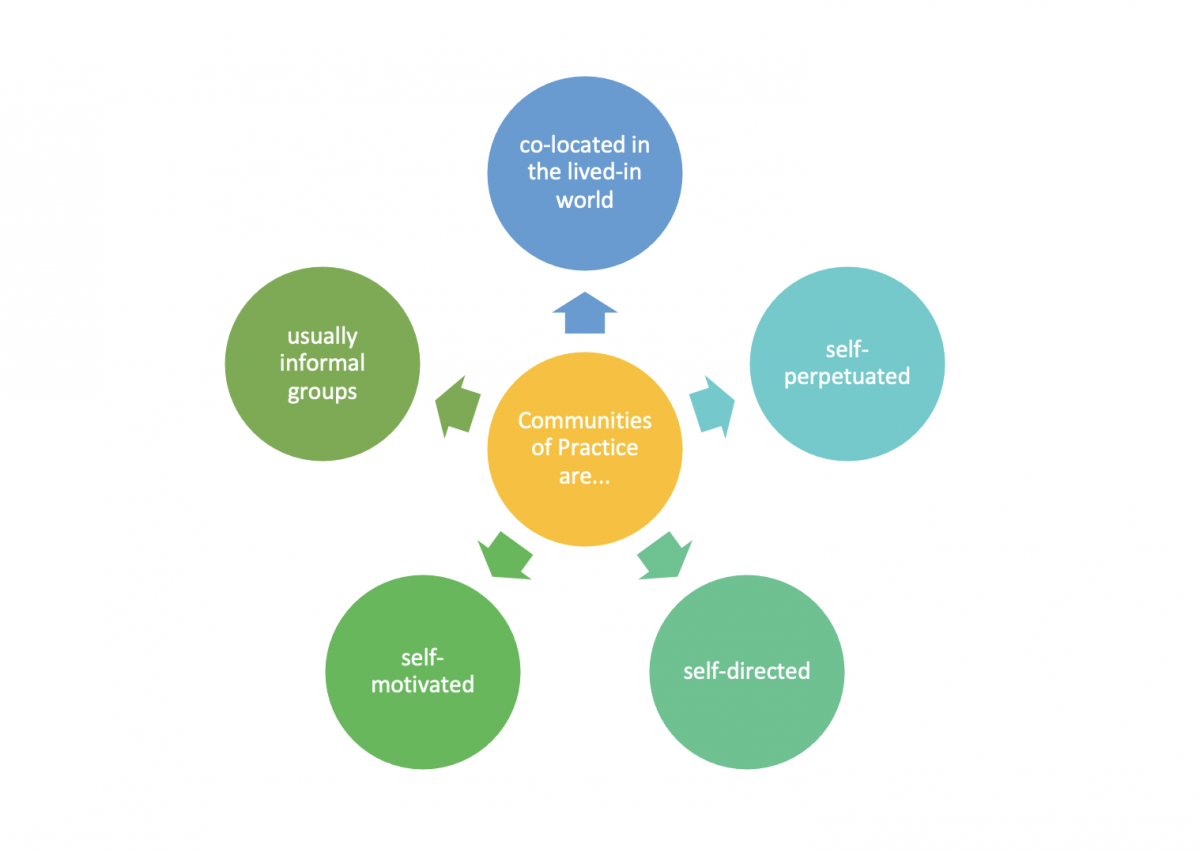
Source: Hoosen, S. (2009). Communities of Practice: A research paper prepared by OER Africa
Important to note is that CoPs can take different forms and they vary across different dimensions; for example, they can be small and tight knit or large and loosely connected. The concept of virtual CoPs has gained increasing popularity as technology and the Internet open opportunities for faster and alternative means of communication with people who are geographically far away from each other. They have also become a very practical means of interacting with people who are interested in a particular subject field since the outbreak of the COVID-19 pandemic and the restrictions it has created on face-to-face interaction and travel.
You can access more resources on CoPs here.
How do I set up a CoP for OER?
The success of a CoP ultimately depends on preparation and involves consideration of a number of key aspects.
- Identify the scope and focus of the CoP for OER: Answer the following questions such as ‘What is the value proposition of the CoP?’ and ‘What will its scope be?’
- Build a case for action: Consider the purpose of the CoP and outline key deliverables over the next one to two years, as well as how the CoP will contribute to the OER movement. Think about how the CoP will satisfy members’ expectations.
- Identify a CoP facilitator: Since relationships are central to one’s sense of community, a facilitator is central to creating and maintaining a robust CoP. The facilitator should have sufficient time available to dedicate to the CoP and should be motivated, creative, and knowledgeable about OER. The facilitator will be responsible for organising meetings, maintaining and distributing knowledge resources, and monitoring the effectiveness of the CoP.
- Identify potential members and criteria for membership: Consider who the best people are to be part of the CoP. It might be useful to think about how to introduce diversity into the group through broad membership, so that there are wide-ranging perspectives. Depending on the scope of the CoP, you might consider approaching anyone from OER practitioners and advocates to librarians and institutional management.
- Highlight the benefits of joining the CoP to potential members: Benefits include faster solutions, reducing duplication of efforts, and enabling people to develop and share new ideas or strategies around OER promotion.
- Identify potential knowledge to share: Get community members to identify knowledge that would be useful to share.
- Decide on an initial technology platform: The platform/s should enable the group to communicate effectively and store resources. They should be easily accessible to all members.
- Consider how the CoP will be governed: Establish clear rules for decision-making and accountability, as well as what resources are available, what the key milestones or deadlines are, and who the stakeholders are, to name a few.
Once you have done the background preparation, you can start planning the official launch of your CoP. At the launch, it is good practice to develop a community charter. Thereafter, the CoP should determine the roles and responsibilities of community members, initiate events and spaces (such as meetings or OER advocacy activities), build a core group to drive the CoP, and find and share knowledge. Once you have passed the initial phase, here are some tips on ensuring that your CoP is effective and sustainable.
How do I find people who are interested in OER?
Struggling to find people who are interested in your preferred subject area? Here are some options for you to consider:
- Reach out to your network: It can be surprising how you might share a common interest in OER with people in your network – even if you haven’t discussed it with them before. They might even be able to put you in contact with someone they know who is interested in OER or looking to gain knowledge.
- Search on LinkedIn: One of the benefits of LinkedIn is that you can search for keywords and come across thought leaders, organisations, different stakeholders, or people with a general interest in OER. You can strike up a conversation by sending a message on LinkedIn.
- Do your research: Use a search engine to look for resources and websites with information about OER. Find out who is producing this knowledge and approach them to gauge their interest in being a CoP member.
Access the links below to see some CoPs for OER, and OEPs more broadly, in action:
- Teacher Education in Sub-Saharan Africa
- OER Commons: Open Education Community of Practice
- BC Open Educational Technology Collaborative
- Community College Consortium for Open Educational Resources
Ultimately, developing a CoP for OER is a wonderful way of learning, sharing knowledge, and advocating for OER use. As long as you maintain a clear sense of the scope of your CoP and ensure that all of the CoP’s activities contribute to its case for action, it can make a valuable contribution to the OER movement.
[1] Hoosen, S. (2009). Communities of Practice: A research paper prepared by OER Africa. Retrieved from https://www.oerafrica.org/system/files/7779/cop1-web_0.pdf?file=1&type=node&id=7779
[2] Gannon-Leary, P. and Fontainha, E. (2007). Communities of Practice and virtual learning communities: benefits, barriers and success factors. eLearning Papers. Retrieved from https://www.oerafrica.org/system/files/7680/communities-practice-and-virtual-learning-communities_0.pdf?file=1&type=node&id=7680
For more articles in this series, click on the links below.
- Do you want to communicate your research more widely? (19 January 2021)
- How can you get involved in the Open COVID Pledge for Education? (9 December 2020)
- How can governments and institutions operationalize the OER Recommendation? (19 November 2020)
- How can you use MOOCs in your teaching? (21 October 2020)
- Online assessment: How do we know if students are learning? (18 September 2020)
- UNESCO’s OER Recommendation Dynamic Coalition Consultations: The way forward (26 August 2020)
- The Open COVID Pledge for Education (12 August 2020)
- How can OpenCourseWare help you to improve your courses? (16 July 2020)
- Evaluating Open Content (2 July 2020)
- Adapting Open Content (25 June 2020)
- Sharing Africa’s knowledge through open data (18 June 2020)
- Sharing Africa’s knowledge through openly licensed publishing (11 June 2020)
- Podcast: OER and their Relevance to the COVID-19 pandemic (5 June 2020)
- Sharing Africa’s knowledge through open African research repositories (29 May 2020)
- Emergency Remote Teaching Webinar Series – All resources available (18 May 2020)
- OER Repositories in Africa (8 May 2020)
- How to Find Open Content (30 April 2020)
- Online (and offline) reading resources for children (23 April 2020)
- Showcasing OER Platforms: OER Africa (15 April 2020)
Most research is only seen by a small number of specialists. Would you like to share your research with those who can use it directly? They can be teachers, policy makers, other stakeholders, or the media. In this post, we explore how you can make your work accessible to a wider audience and release it under an open licence.

Image courtesy of Pixabay
Most research is only seen by a small number of specialists. Would you like to share your research with those who can use it directly? They can be teachers, policy makers, other stakeholders, or the media. OER Africa has created a practical guide to communicating your research findings to a wider audience. In this post, we explore how you can make your work accessible to a wider audience and release it under an open licence.
The need to share scholarship openly
Most academics think that their research is important. Although they publish it in journals for others to read and build on, the reality is that academic journals are aimed at a specialised audience. Journal publication is important, but not necessarily sufficient. If you can find different ways to make your findings available, your research might be of value to a much wider variety of people, including local communities, who could use it to improve their lives, and policy makers, for whom it might provide useful evidence to inform their decisions. You could also help to generate trust in researchers, encourage public participation in important issues, and improve your own communication skills in the process. Professor Jerry John Nutor believes that:
Research is meant to benefit society by raising public awareness and creating products and innovations that enhance development. For research to serve its full purpose, the results must leave the confines of research laboratories and academic journals.
If you find Nutor’s argument compelling, why not think about ways to make your research available and accessible beyond journal publication? In addition, when communicating your research, applying an open licence helps others to disseminate it further, without the need for permission from you.
Becoming a communicator of your research
Most research can and should be communicated to audiences beyond academia. One area of research communication which is developing into a field in its own right is that of science communication, and all researchers can learn from some of the methods that science communicators use to disseminate their research. SciDev.netexplains why accurately and clearly communicating science during the COVID-19 pandemic is essential.
Here are some suggestions to consider:
- Identify the potential audiences for your research and the formats that they are likely to find most accessible. Producing a pamphlet for teachers to use in the classroom would look very different from making a short video for farmers to try out a new technique. Once you have identified your audience, you can plan how best to summarise your findings for them.
- Decide on your key message/s. You are not writing a research paper; you need to decide what you want to tell your audience, and ensure that the message gets across to them early on in your communication. Using a message template can help you; tell your audience:
- Here’s what we know.
- Here’s what’s new.
- Here’s why it matters.
- Use plain language to write your blog, pamphlet, or other communication. Your audience will not want to read jargon or academic writing; it will want to understand your research quickly and easily. Good advice about writing in plain language can be found here.
- Apply an open licence to the new communication you have developed to make it easier for others to share and use. The advantages and types of Creative Commons open licences are explained here.
- Depending on your audience, you may want to translate your new communication into another language.
- Decide where to disseminate the communication you have developed.
Where can you publish your communication?
It is best to start with familiar, local possibilities. These might include a website or newsletter of your own research group, department, or faculty. You could also contact NGOs or local community organisations related to your research to see if they would like to publish your piece. Your institution may have a communications department with which you could work to write a press release or similar. You can also approach your radio stations or newspapers, particularly those that broadcast or publish in local languages that reach a broad audience.
Further afield, there is no one-stop-shop for finding examples of good research communication, but the following sites provide examples of research transformed for non-academic audiences. They are all openly licenced or have an option to publish with a Creative Commons licence. For these sites, you will need to learn how to pitch a story to the editors (i.e. ‘sell your story idea’) before you write it. For any of these, you can also publicise your piece using social media.
- The Conversation is a good example of a forum that many academics use to publish their research for non-specialists to read. The site includes opinion pieces and other issues as well as research findings, and is available in English and French.
- Although it is more journalism-focused, you can contact SciDev.net to pitch a piece of research reformulated as a story.
- You can also create an entry (or edit an existing one) on Wikipedia once you register as an editor. It is available in several languages.
- You can create a channel on YouTube, develop your own videos, and upload them as OER.
In summary, developing the skills of sharing your research more widely than traditional academia is well worth pursuing: it gets you more widely known as a researcher, while also enabling your findings to be used by practitioners, educators, and the general public.
With thanks to Dr Marina Joubert (Stellenbosch University) for advice on dissemination.
For more articles in this series, click on the links below.
- How can you get involved in the Open COVID Pledge for Education? (9 December 2020)
- How can governments and institutions operationalize the OER Recommendation? (19 November 2020)
- How can you use MOOCs in your teaching? (21 October 2020)
- Online assessment: How do we know if students are learning? (18 September 2020)
- UNESCO’s OER Recommendation Dynamic Coalition Consultations: The way forward (26 August 2020)
- The Open COVID Pledge for Education (12 August 2020)
- How can OpenCourseWare help you to improve your courses?(16 July 2020)
- Evaluating Open Content (2 July 2020)
- Adapting Open Content (25 June 2020)
- Sharing Africa’s knowledge through open data (18 June 2020)
- Sharing Africa’s knowledge through openly licensed publishing (11 June 2020)
- Podcast: OER and their Relevance to the COVID-19 pandemic (5 June 2020)
- Sharing Africa’s knowledge through open African research repositories (29 May 2020)
- Emergency Remote Teaching Webinar Series – All resources available (18 May 2020)
- OER Repositories in Africa (8 May 2020)
- How to Find Open Content (30 April 2020)
- Online (and offline) reading resources for children (23 April 2020)
- Showcasing OER Platforms: OER Africa (15 April 2020)
In August, OER Africa introduced the Open COVID Pledge for Education, which was launched at the OER20 Conference earlier that month. OER Africa is proud to be a founding signatory of this Pledge, which encourages individuals and organisations to make their intellectual property available through open licensing arrangements to support educators, learners and decision-makers and assist educational organisations.
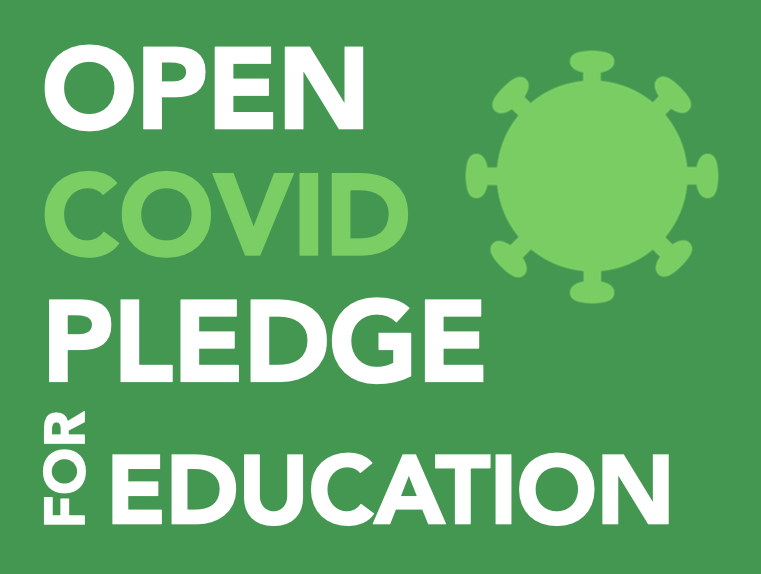
What is the Open COVID Pledge for Education?
In August, OER Africa introduced the Open COVID Pledge for Education, which was launched at the OER20 Conference earlier that month. OER Africa is proud to be a founding signatory of this Pledge, which encourages individuals and organisations to make their intellectual property available through open licensing arrangements to support educators, learners and decision-makers and assist educational organisations.
As the COVID-19 pandemic continues to spread, millions of learners and educational institutions globally have had to place greater reliance on digital communication and media in teaching and learning. The long-term effects of such shifts have yet to be seen, but there is no doubt that those most negatively affected will be learners in under-resourced environments, where access to high-quality educational resources, ICT, and learner support is often limited.
Developed by the Open COVID Coalition and hosted by the Association for Learning Technology (ALT), the Open COVID Pledge for Education responds to this context by drawing from principles highlighted in the UNESCO Recommendation on OER (2019) and building on the Open Education values outlined in the Cape Town Declaration. It has been signed by representatives of many global Open Education Open Education bodies and professional organisations, universities, and individual researchers.
The Pledge asks that signatories commit to sharing Open Educational Resources (OER) for educators to support teaching and learning over the course of the pandemic. It also asks that signatories share practice and policy lessons, such as how individuals or organisations are responding to COVID-19 and what they are learning. In addition, the Pledge encourages signatories to share the following:
- Open data, e.g. from surveys;
- Open access research;
- Unpublished research, organisational research, action research; and
- Open source applications to support open education.
What has happened since the Pledge was launched?
Since its launch, two planning meetings were held online in September and October. These meetings produced an email discussion list, the Twitter account and hashtag, and an informative slide deck and logo. The team also conducted an open webinar in collaboration with the Open Education Special Interest Group to promote the Pledge.
UK-based members of the Open COVID Pledge for Education are currently developing two organisational case studies – one on University College London and the other on the University of Edinburgh – to showcase how they have released OER for educators as well as policy and research purposes under the Pledge. A keynote panel will be held on 15 December 2020 as part of the ALT winter conference, where the two case studies will be launched.
To date, there are 60 organisational signatories and 121 individual signatories and the project team welcomes new signatories.
How can I get involved?
The Open COVID Pledge ultimately aims to build a fairer and more resilient education system. It has been promoted using the @Covid_education Twitter account and #OpenCovid4Ed hashtag; through blog posts on the ALT blog; and on a public email list. You can become involved in the Pledge in various ways:
- Sign the pledge as an individual or organisation
- Upload your logo
- Blog about it, and share using #OpenCovid4Ed
- Join the discussion list by emailing OPEN-COVID-ED@jiscmail.ac.uk
- Spread the word with the Pledge’s Twitter handle and hashtag
- Download the logo here to add to your own websites
For more articles by OER Africa, click on the links below.
- How can governments and institutions operationalize the OER Recommendation? (19 November 2020)
- How can you use MOOCs in your teaching? (21 October 2020)
- Online assessment: How do we know if students are learning? (18 September 2020)
- UNESCO’s OER Recommendation Dynamic Coalition Consultations: The way forward (26 August 2020)
- The Open COVID Pledge for Education (12 August 2020)
- How can OpenCourseWare help you to improve your courses?(16 July 2020)
- Evaluating Open Content (2 July 2020)
- Adapting Open Content (25 June 2020)
- Sharing Africa’s knowledge through open data (18 June 2020)
- Sharing Africa’s knowledge through openly licensed publishing (11 June 2020)
- Podcast: OER and their Relevance to the COVID-19 pandemic (5 June 2020)
- Sharing Africa’s knowledge through open African research repositories (29 May 2020)
- Emergency Remote Teaching Webinar Series – All resources available (18 May 2020)
- OER Repositories in Africa (8 May 2020)
- How to Find Open Content (30 April 2020)
- Online (and offline) reading resources for children (23 April 2020)
- Showcasing OER Platforms: OER Africa (15 April 2020)
- Understanding OER in a Context that Necessitates Remote Learning (9 April 2020)
- OER Africa COVID-19 Statement (3 April 2020)
The Recommendation on Open Educational Resources (OER) (40 C/32) was adopted at the 40th UNESCO General Conference in Paris on 25th November 2019 as the culmination of a long process of UNESCO engagement with the concept of OER. Now that it is adopted and a UNESCO Dynamic Coalition has been discussing the next steps (download workshop report here), this raises the practical question of what steps government and educational institutions at all levels can do to help to operationalize the OER Recommendation.
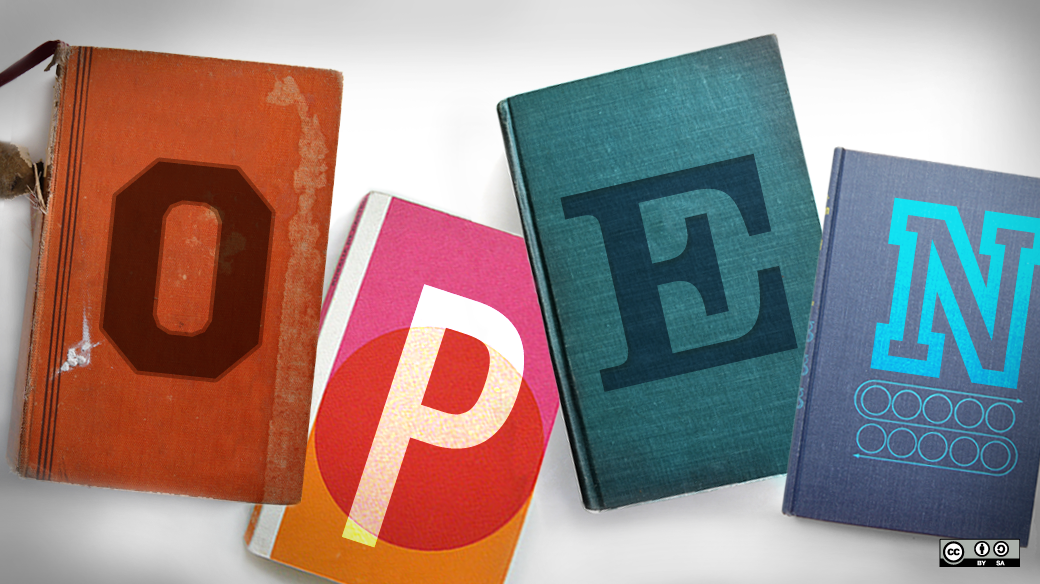
Image courtesy of opensource.com, Flickr
The Recommendation on Open Educational Resources (OER) (40 C/32) was adopted at the 40th UNESCO General Conference in Paris on 25th November, 2019 as the culmination of a long process of UNESCO engagement with the concept of OER. Now that it is adopted and a UNESCO Dynamic Coalition has been discussing the next steps (download workshop report here), this raises the practical question of what steps government and educational institutions at all levels can do to operationalize the OER Recommendation.
To help to unpack the possibilities, OER Africa has been facilitating a process to support UNESCO and its stakeholders to consider what actions they might take in each of the four key areas of the Recommendation:
- Building capacity of stakeholders to create, access, re-use, adapt and redistribute OER;
- Developing supportive policy;
- Encouraging inclusive and equitable quality OER; and
- Nurturing the creation of sustainability models for OER.
- Develop a catalogue of freely available online resources for each Area of Action that governments, networks, institutions, and other stakeholders can draw on for support.
- Create communications and advocacy resources, drilling into detail on specific aspects of the OER Recommendation to provide ideas on possible activities.
- Repackage content for governments and other audiences to explore possible actions and policy reforms that governments might consider when implementing the OER Recommendation.
For more articles in this series, click on the links below.
- How can you use MOOCs in your teaching? (21 October 2020)
- Online assessment: How do we know if students are learning? (18 September 2020)
- UNESCO’s OER Recommendation Dynamic Coalition Consultations: The way forward (26 August 2020)
- The Open COVID Pledge for Education (12 August 2020)
- How can OpenCourseWare help you to improve your courses?(16 July 2020)
- Evaluating Open Content (2 July 2020)
- Adapting Open Content (25 June 2020)
- Sharing Africa’s knowledge through open data (18 June 2020)
- Sharing Africa’s knowledge through openly licensed publishing (11 June 2020)
- Podcast: OER and their Relevance to the COVID-19 pandemic (5 June 2020)
- Sharing Africa’s knowledge through open African research repositories (29 May 2020)
- Emergency Remote Teaching Webinar Series – All resources available (18 May 2020)
- OER Repositories in Africa (8 May, 2020)
- How to Find Open Content (30 April, 2020)
- Online (and offline) reading resources for children (23 April, 2020)
- Showcasing OER Platforms: OER Africa (15 April, 2020)
- Understanding OER in a Context that Necessitates Remote Learning (9 April 2020)
- OER Africa COVID-19 Statement (3 April, 2020)
A few years ago, Massive Open Online Courses (MOOCs) were touted as “the next big thing”. They have developed since then and are part of the current education landscape. Who are they aimed at? Can university faculty members take an existing MOOC and use it in their own courses? How open are MOOCs? Where can you find them?
Image courtesy of Mathieu Plourde, Wikimedia Commons
What are MOOCs?
A few years ago, Massive Open Online Courses (MOOCs) were touted as “the next big thing”. They have developed since then and are part of the current education landscape. Who are they aimed at? Can university faculty members take an existing MOOC and use it in their own courses? How open are MOOCs? Where can you find them?
A MOOC is a course (teaching a specific subject or topic) available online via the Internet, aimed at unlimited participation (hence massive) and open in so far as anyone can enrol (no formal admission process and normally no charge). They are produced by universities, companies (Microsoft, Linux, Canvas, Blackboard) and non-profit initiatives (edX), and are aimed at anyone who wishes to learn about the subjects covered. Most MOOCs are distributed via course providers such as Coursera and Udacity. The extent to which they are considered ‘open’ has changed over time, but also depends on how they are presented online. When they first emerged, MOOCs were typically open in two ways: in enrolment and the fact that their constituent materials were openly licensed. By about 2012, many MOOCs no longer had openly licensed materials available, so their open-ness had diminished (Vollmer, 2012). As most MOOCs available now are not openly licensed, you cannot simply take one (or part of it) and use it in your own course. We suggest other ways in which you might use MOOCs below.
In a previous post, we discussed OpenCourseWare (OCW) as a ‘subset’ of Open Educational Resources (OER). We contrasted OCW with MOOCs, and here we provide a table showing the differences between these two educational tools:

Adapted from Martinez, 2014
A common criticism of MOOCs is their very low completion rate: often as low as 5 to 15%. Critics suggest that such a low rate indicates that learning from MOOCs is usually minimal. However, some specialists are beginning to refer to MOOCs as one of many forms of digital content, proposing that they should be compared with podcasts or educational news sites on the Internet instead of facilitated educational experiences similar to university courses (Ahearn, 2018). Other educationists note that MOOCs could help to widen global access to higher education, but they need careful research to assess the learning experiences that MOOCs can offer (Laurillard & Kennedy, 2017).
How can academic staff best use MOOCs?
Despite being not fully open, university academics can still make use of MOOCs as part of an interactive mix of educational experiences. They can be useful in various ways:
- As professional development for you: you might find that enrolling on a MOOC provides you with recent developments in your own field, which you can later incorporate into your courses.
- As a refresher for your own courses: High quality MOOCs often include recent research or cover topics in innovative ways. By enrolling on a MOOC, you can rethink your own courses, making them more relevant and enriching for your students.
- As a supplement to student learning: You can review MOOCs in your subject areas, and encourage your students to enrol, even if it’s only for a section of the course. You can get them to engage fully and critique the MOOC as part of the learning experience.
The open access article Twelve tips for integrating massive open online course content into classroom teaching suggests various innovative ways in which you might incorporate MOOCs into your teaching.
Where can you find MOOCs?
MOOCs in English are produced mostly by universities in the US, Europe, and Australia. They can be found on some university websites, but the better place to search is through course providers, which collaborate with universities and other organisations. These providers are now marketing themselves as online learning platforms, and some of them charge for the courses – this is another way in which the open-ness of MOOCs has changed. Examples of such platforms are Coursera, edX, and Udacity. If you want to find a MOOC relevant to one of your own courses, the best way is to use a browser and enter “MOOCs in <subject>”. You can then choose from your search results to examine them further.
Relatively few universities in Africa run MOOCs. Exceptions to this include the University of Cape Town, University of the Witwatersrand, and the African Leadership Institution. More institutions are likely to run courses as MOOCs or using online learning platforms in the future. The OER Africa website hosts some MOOC-related resources, such as:
- OER and MOOCs at the National Open University of Nigeria
- Moving forward with TESSA: what is the potential for MOOCs?
- ROER4D: OER in and as MOOCs
In summary, MOOCs appear to have become less open since their original inception before 2012. They can be used by academics in higher education as a form of professional development, and as a supplement to the courses they offer. MOOCs can also assist students wishing to access courses within higher education that otherwise might not be available to them.
References
Ahearn, A. (2018). Stop Asking About Completion Rates: Better Questions to Ask About MOOCs in 2019. Available online at https://www.edsurge.com/news/2018-11-28-stop-asking-about-completion-rates-better-questions-to-ask-about-moocs-in-2019
de Jong, P., Pickering, J., Hendriks, R., Swinnerton, B., Goshtasbpour, F. & Reinders, M. (2020) Twelve tips for integrating massive open online course content into classroom teaching, Medical Teacher, 42:4, 393-397, DOI: 10.1080/0142159X.2019.1571569 (Open Access)
Laurillard, D., & Kennedy, E. (2017). The potential of MOOCs for learning at scale in the Global South. Centre for Global Higher Education, working paper series, Lancaster, UK, 42.
Martinez, S. (2014). OCW (OpenCourseWare) and MOOC (Open Course Where?). In Proceedings of OpenCourseWare Consortium Global 2014: Open Education for a Multicultural World.
Vollmer, T. (2012). Keeping MOOCs Open. Available online at https://creativecommons.org/2012/11/01/keeping-moocs-open/
For more articles in this series, click on the links below.
- Online assessment: How do we know if students are learning? (18 September 2020)
- UNESCO’s OER Recommendation Dynamic Coalition Consultations: The way forward (26 August 2020)
- The Open COVID Pledge for Education (12 August 2020)
- How can OpenCourseWare help you to improve your courses?(16 July 2020)
- Evaluating Open Content (2 July 2020)
- Adapting Open Content (25 June 2020)
- Sharing Africa’s knowledge through open data (18 June 2020)
- Sharing Africa’s knowledge through openly licensed publishing (11 June 2020)
- Podcast: OER and their Relevance to the COVID-19 pandemic (5 June 2020)
- Sharing Africa’s knowledge through open African research repositories (29 May 2020)
- Emergency Remote Teaching Webinar Series – All resources available (18 May 2020)
- OER Repositories in Africa (8 May, 2020)
- How to Find Open Content (30 April, 2020)
- Online (and offline) reading resources for children (23 April, 2020)
- Showcasing OER Platforms: OER Africa (15 April, 2020)
- Understanding OER in a Context that Necessitates Remote Learning (9 April 2020)
- OER Africa COVID-19 Statement (3 April, 2020)
You have been teaching, but what have you been assessing? Can assessment also be about teaching? How do you know students have learned? It is easy to forget that instead of being separate processes, teaching and assessment have a close relationship

Image courtesy of CC-0 Source: pxhere.com
You have been teaching, but what have you been assessing? Can assessment also be about teaching? How do you know students have learned?
It is easy to forget that instead of being separate processes, teaching and assessment have a close relationship – they complement one another and comprise a holistic educational process. COVID-19 has prompted an increase in online interactions with our students. As a result, many educators have had to adjust their teaching and assessment strategies. In this article, we explore online activity-based assessment to support teaching and learning.
Assessment and Feedback
Perhaps one of the most challenging aspects of distance learning and emergency remote teaching during COVID-19 has been the aspect of assessment. In addition to putting your course materials online, you may have been anxious to confirm what students know, and demonstrate whether or not they have met curriculum outcomes. In other words your focus may have been on assessment of learning rather than assessment for learning. We have heard of cases, for example, where students have been allowed back onto campus to do exams, with little or no support for learning in preparation for those exams. It is certainly not fair, reliable, or valid assessment practice to expect students to come and write an exam when they have not had the opportunity and support to work through the activities and content leading up to that exam. Some institutions have managed to implement some form of online learning. Often, however, this has taken the form of asking students to read a textbook and submit an assignment. This is not necessarily very helpful for students struggling in this environment.
If learning is reduced and less meaningful, what are you assessing?
Stop worrying about testing and start thinking about learning
In a post on Inside Higher Ed, in response to the pandemic, Jody Greene writes:
'By attempting to replicate in-person assessments in online settings, we fail to recognize that a change of medium may require a change of design. Especially if your instruction is interrupted close to the time of finals … don’t immediately jump to the conclusion that you can or should just “put the final exam online.” Sorting students and rigorously determining what deserves an A-minus as opposed to a B-plus may not be the most urgent business in the face of a global pandemic. … Think outside the parameters of your original assessments and ask the question, what can we do here that keeps learning happening? What if our first priority in an emergency is not completing testing but giving an opportunity for students to integrate and demonstrate their learning? ... Consult your campus disability resource center to make sure you maintain accessibility and equity.'
Challenge yourself to think about assessment differently. But how do you do that? There are two important considerations.
- Learning is more important than assessing in this context.
- Students need support and feedback
Support Learning
Give students something meaningful to do, preferably supported by communication with their peers and yourself as educator. Primarily the challenge is to find ways of introducing activities into the design of your materials. Rather than just reading text books, lecture notes, and PowerPoint presentations, ask students to critically engage with a reading, analyse case studies, create diagrams, tables or summaries, or conduct observations and interviews.
Students can also support each other. Encourage them to set up their own study groups, if necessary via WhatsApp or email. Build some kind of collaboration into the activities you set, creating and sharing the products of their studies, reflecting together and giving each other feedback.
Be there for students. Write your voice into the materials and engage in a written conversation with them. Ask questions and challenge students to respond in a variety of ways. Try to set times when students can contact you to ask questions and feel your presence, and clarify how they should do so. If you ask them to send you WhatsApp messages, make sure the messages come through, if you give them the option to email make sure you respond to the emails within the agreed turnaround time. It is frustrating for students to send messages or emails to which they never get responses.
Understand the value of formative assessment
Usually the focus is on summative assessment. This often takes the form of an assignment or a written exam after students have completed a section of work. Traditional summative assignments may be more challenging for online students, particularly. Online learning and assessment require more self-direction and self-motivation. Many students are still developing skills like time management. Most institutions have a Learning Management System (LMS), but, if your students only have intermittent access to the internet, they will not necessarily be able to do assessments online on your institution’s LMS.
Formative assessment is an activity, or set of activities, designed to support and enhance learning. It requires ongoing feedback to allow students to see their mistakes and fix them with guidance. This supports cognitive development. Once you have integrated activities into students’ learning, you have already begun to shift the focus to more formative kinds of assessment. An activity such as a quiz can be designed in a way that students engage with a base reading, do the quiz alone, and then compare their thinking with the feedback you provide. Provide written commentary on the activities against which students can check their own understanding. This can be followed up with a conversation between students about their responses. In this way, there is individual study, self-assessment, peer collaboration and formative assessment all built into one activity. This is learning and assessment.
As an exercise for yourself, consider each of the following statements. Are they true or false, in your view?
Note: Scroll down within the block below to complete all eight questions
All these strategies encourage communication, negotiation, and collaboration. Students use feedback they receive on their formative assessments to understand how well they have learned and where they need to focus to prepare for summative assessments. They are also motivated to continue engaging with the course.
Consider integrated summative assessment
In a context where students are not face to face with you or each other, and do not have a reliable connection to the internet, traditional summative assessments can be more challenging.
Summative assessment does not have to be an exam. The formative assessment activities that you have built into your design can form an important part of an integrated summative assessment strategy. Rather than a single exam, consider an assessment strategy that consists of four tasks that build up to a final product, for example, each building on the previous one, improving each time based on the feedback you have provided in between.
This site offers some ideas for thinking about alternative assessment strategies that might suit your context.
Use feedback to build communication and collaboration into assessment
Feedback is probably the most important aspect of assessment in any teaching and learning situation. Feedback can help a student to feel more ‘present’ in a course, and to feel the presence of others more strongly.
Provide feedback that is useful, timely and helps a student to reflect and assess themselves, and is useful for improvement. Encourage students to reflect on each others’ work by inviting comment or asking a question in a chat forum or WhatsApp group, or by sharing their work and requesting an evaluation against agreed criteria. The University of British Columbia in Canada has developed a series of workshops for online teaching. They talk about what makes feedback effective and describe ideas for communicating feedback online. For a useful article giving ideas about the nature and extent of constructive feedback, go to the OER Africa website.
Additional Resources
For alternative assessment ideas in higher education:
- University of Minnesota- Alternative Assessment Strategies
- Alternative assessment in higher education
Access more of our recent content below:
- OER Africa COVID-19 Statement (3 April, 2020)
- Understanding OER in a Context that Necessitates Remote Learning (9 April 2020)
- Showcasing OER Platforms: OER Africa (15 April, 2020)
- Online (and offline) reading resources for children (23 April, 2020)
- How to Find Open Content (30 April, 2020)
- OER Repositories in Africa (8 May, 2020)
- Emergency Remote Teaching Webinar Series – All resources available (18 May 2020)
- Sharing Africa’s knowledge through open African research repositories (29 May 2020)
- Podcast: OER and their Relevance to the COVID-19 pandemic (5 June 2020)
- Sharing Africa’s knowledge through openly licensed publishing (11 June 2020)
- Sharing Africa’s knowledge through open data (18 June 2020)
- Adapting Open Content (25 June 2020)
- Evaluating Open Content (2 July 2020)
- How can OpenCourseWare help you to improve your courses?(16 July 2020)
- The Open COVID Pledge for Education (12 August 2020)
- UNESCO’s OER Recommendation Dynamic Coalition Consultations: The way forward (26 August 2020)
UNESCO recently hosted a set of worldwide public consultations from 22-24 July 2020, the aim being to expand and consolidate commitments to actions and strategies as well as reinforce international cooperation among all stakeholders. As we noted in a recent blog post, OER Africa provided support to UNESCO Dynamic Coalition Working Group Consultation on the OER Recommendation.
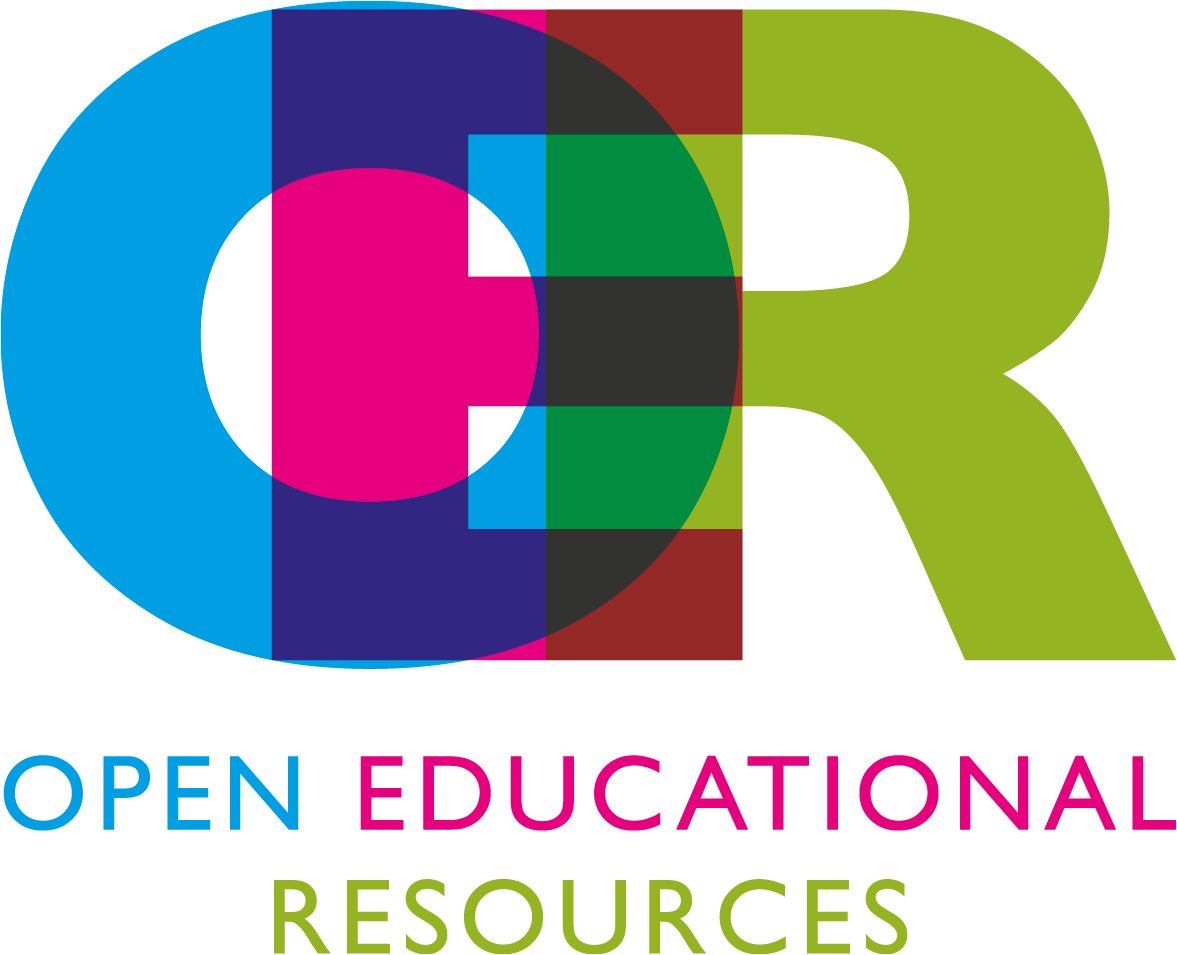
Image courtesy of Markus Büsges Wikimedia Deutschland.
UNESCO recently hosted a set of worldwide public consultations from 22-24 July 2020, the aim being to expand and consolidate commitments to actions and strategies as well as reinforce international cooperation among all stakeholders. As we noted in a recent blog post, OER Africa provided support to UNESCO Dynamic Coalition Working Group Consultation on the OER Recommendation. We are pleased to report that the final report from those consultation sessions is now available for download here. That report also summarizes data collected through the online surveys that led up to the consultation sessions.
The purpose of the three-day consultation process was to:
- Further clarify the priority areas of action per Working Group
- Identify activities and issues related to the establishment of an electronic tool for information sharing and collaboration on the activities of participating organizations.
The consultations provided a platform for rich conversation between a diverse group of participants. Thanks to the efforts of the organizers, facilitators and participants, valuable insights were collected across all four thematic Working Groups, as well as for the themes of the transversal Working Groups, as illustrated below.
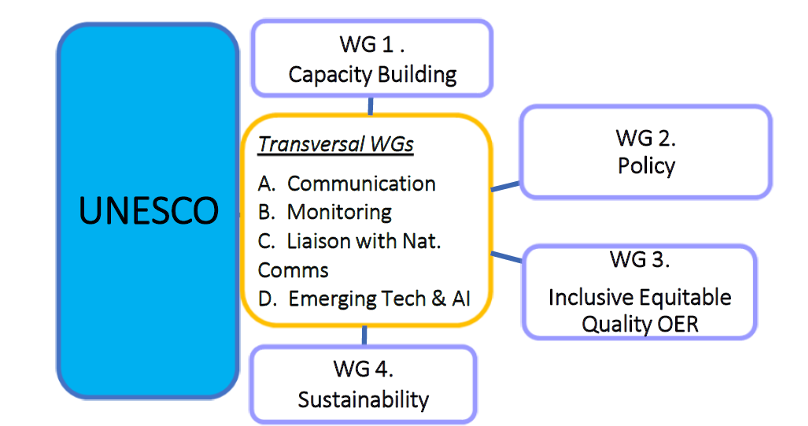
While highlighting pertinent challenges and lessons, the discussions also provided insight into the countless OER-related activities occurring around the world. This speaks to the multifaceted network of individuals, Member States, organizations, institutions, and other stakeholders who can draw from one another in advancing the goals of the UNESCO OER Recommendation.
Notwithstanding challenges in connecting across time zones, the consultations illustrated that there is a strong network of people and organizations keen to support UNESCO in ensuring success in adoption of the OER Recommendation by Member States. Likewise, consultations yielded information on many resources and portals available online that can be harnessed by both Member States and institutions seeking to give practical expression to the OER Recommendation. It was heartening to see how much the OER Community has grown and how this has translated into growing access to openly accessibly resources. A major challenge here, though, remains a need to have materials available in a variety of languages other than English, although there are encouraging signs of diversification over time.
The highest priority moving forward will be to make strong connections with Member States to support their efforts to operationalize the OER Recommendation at national level. Across all Working Group areas and particularly in the Dynamic Coalition Communication Strategy, it will be important to focus on reaching out to and building working relationships with OER champions in government.
Linked to the above, effective communication will be critical to taking forward the OER Recommendation and the work of the Dynamic Coalition. Consequently, the Dynamic Coalition is considering how to develop an electronic tool which will be a means:
- For the community to communicate with one another within and across projects;
- To provide public information on the Coalition’s activities; and
- For stakeholders to collaborate on common projects and activities.
At OER Africa, we are proud to be supporting the work of UNESCO’s Dynamic Coalition and excited to see the process moving forward. We look forward to more widespread operationalization of the OER Recommendation at national and institutional levels over the coming years as these efforts start to bear fruit.
Access more of our recent content below:
- OER Africa COVID-19 Statement (3 April, 2020)
- Understanding OER in a Context that Necessitates Remote Learning (9 April 2020)
- Showcasing OER Platforms: OER Africa (15 April, 2020)
- Online (and offline) reading resources for children (23 April, 2020)
- How to Find Open Content (30 April, 2020)
- OER Repositories in Africa (8 May, 2020)
- Emergency Remote Teaching Webinar Series – All resources available (18 May 2020)
- Sharing Africa’s knowledge through open African research repositories (29 May 2020)
- Podcast: OER and their Relevance to the COVID-19 pandemic (5 June 2020)
- Sharing Africa’s knowledge through openly licensed publishing (11 June 2020)
- Sharing Africa’s knowledge through open data (18 June 2020)
- Adapting Open Content (25 June 2020)
- Evaluating Open Content (2 July 2020)
- How can OpenCourseWare help you to improve your courses?(16 July 2020)
The Open COVID Pledge was launched on 12 August 2020. Within the context of COVID-19, the Pledge encourages individuals and organizations to make their intellectual property available to support educators, students and decision-makers; assist educational organizations; and build a fairer and more resilient education system.
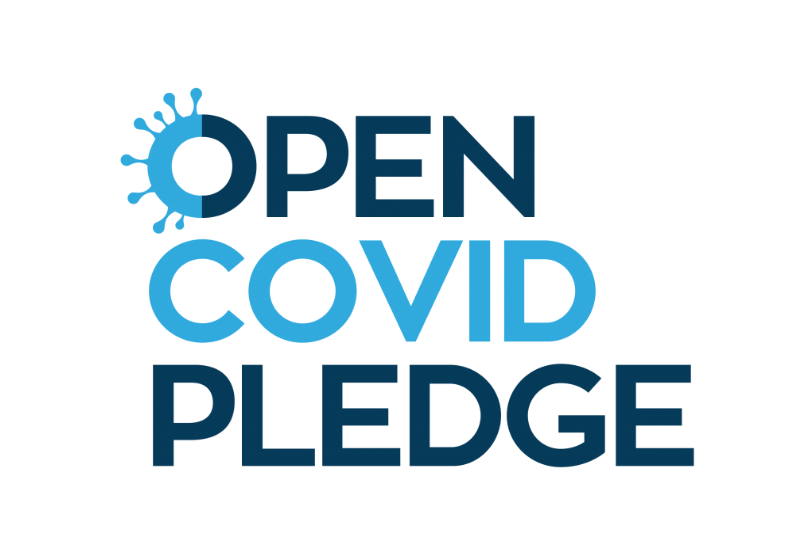
The Open COVID Pledge was launched on 12 August 2020. Within the context of COVID-19, the Pledge encourages individuals and organizations to make their intellectual property available to:
- support educators, students and decision-makers;
- assist educational organizations; and
- build a fairer and more resilient education system.
Developed by the Open COVID Coalition with the support of the Association for Learning Technology, the Pledge has been signed by representatives of many global open education initiatives. OER Africa is proud to be a founding signatory of this Pledge.
Details about the Pledge can be found below.
As we begin to imagine - and to shape - the ‘new normal’ in education, we need every opportunity to learn from each other.
Today, with the support of the Association for Learning Technology (ALT), we are proud to launch the Open COVID Pledge for Education, covering all forms of research, data and know-how that can support the COVID-19 response in education around the world.
Since the start of the pandemic, researchers in medicine and healthcare have openly released their findings to build a shared knowledge base and save lives. Thousands have signed up to the Open COVID Pledge, hosted by Creative Commons: millions of valuable patents and datasets have been put into the public domain. An equivalent pledge for research and know-how in education could have a similar impact - and researchers in digital, open and online education could lead the way.
During lockdown, Open Education Resources (OER) have been critical for keeping students in touch with their learning. There are already several global initiatives to boost OER access and development, like the Open Door initiative hosted by the Commonwealth of Learning, and the OER Dynamic Coalition, launched by UNESCO in March.
But we need more than shared content: we also need credible evidence on which to base day-to-day decisions in practice and policy. We need urgent research into the experiences of teachers and learners. We need shared know-how, especially from experienced online and distance educators and learning technology specialists. (This summer has seen a generous flowering of blog posts, webinars, infographics and how-to courses – but more will be needed as the ‘new normal’ takes root.)
Education globally faces many challenges, not only for the people who work and learn in the sector but for whole organisations and modes of learning. Societies depend on education to improve lives, widen economic participation, and support civic life. Education will be critical to the long-term response to the pandemic crisis.
A recent UNESCO report, Education in a post-COVID world, compared public education explicitly with public health in this respect: “the focus must be on cooperation not competition. We are safe when everybody is safe; we flourish when everybody flourishes”.
The Open COVID Pledge for Education commits people and organisations to sharing what they know, to support the world-wide educational response. Not all research will be shareable as open data. But whether fully open, redacted, anonymised, synthesised or combined with other datasets, data should be shared whenever possible. Not all evidence will look like formal research. But outcomes should be available to everyone who can use them – educators and students around the world, trade unions and stakeholder bodies, funders and policy makers. This is true of organisational research and evidence from practice as well as research that is funded and published more formally.
The Pledge has been signed by representatives of many global open education initiatives. Thanks to them, much of the hard work of building open principles and processes has been done. But the hard work of understanding education in a time of pandemic is still ahead.
Right now, we have a chance to make ‘open’ the default for that work – to make this moment an ‘open’ pivot rather than just an ‘online’ one. Please sign the Pledge here, and persuade other people in your organisation to do the same. With a shared commitment to open knowledge, we can build back education to be more sustainable, more accessible, and fairer for all.
Helen Beetham and Maren Deepwell
Open Covid Coalition
During the week of 20th July, 2020, OER Africa was privileged to be able to participate in, and provide administrative support to, the work of UNESCO’s Dynamic Coalition as its Working Groups convened in virtual consultations to begin preparing plans to support governments around the world in operationalizing the OER Recommendation.
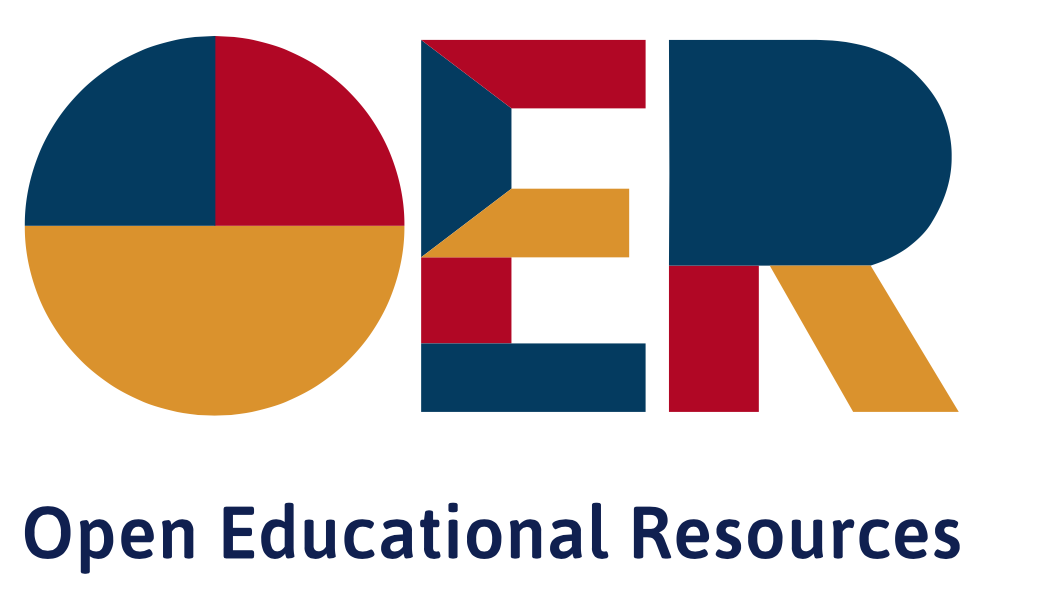
During the week of 20th July, 2020, OER Africa was privileged to be able to participate in, and provide administrative support to, the work of UNESCO’s Dynamic Coalition as its Working Groups convened in virtual consultations to begin preparing plans to support governments around the world in operationalizing the OER Recommendation. This article provides an update on the latest activities of the Dynamic Coalition and offers links to the various resources that are being shared.
The Recommendation on Open Educational Resources (OER) (40 C/32) was adopted at the 40th UNESCO General Conference in Paris on 25th November 2019 as the culmination of a long process of UNESCO engagement with the concept of OER. Following adoption of the OER Recommendation, UNESCO launched the OER Dynamic Coalition on 2 March 2020 to support its widespread adoption. OER Africa has been actively involved in all the processes that led to adoption of the OER Recommendation and continues to support UNESCO in this important work through its engagement in the activities of the Dynamic Coalition. This includes, amongst other activities, chairing the Working Group on Communications as the Dynamic Coalition consults stakeholders to prepare implementation plans.
The multi-stakeholder Coalition aims to expand and consolidate commitments to actions and strategies, as well as reinforce international cooperation among all stakeholders in the four areas of the Recommendation:
-
Building capacity of stakeholders to create, access, re-use, adapt and redistribute OER;
-
Developing supportive policy;
-
Encouraging inclusive and equitable quality OER; and
-
Nurturing the creation of sustainability models for OER.
The Coalition’s webpage is accessible here and the final report is available here.
UNESCO hosted a set of worldwide public consultations from 22-24 July 2020, the aim being to expand and consolidate commitments to actions and strategies as well as reinforce international cooperation among all stakeholders in these four areas. Stakeholders come from all regions of the world and include representatives from government, inter-governmental organizations, NGOs, educational institutions, associations and networks, and research agencies, amongst others. Central to the organization of the event were efforts for geographic balance, gender balance and a multisectoral approach, contributing to a diverse set of inputs and conversations. The consultations aimed to follow-up on an online survey (distributed by UNESCO to participants in the OER Recommendation activities and administered from 10 to 20 July) that collected information on priority areas of action. As such, the objectives were to:
-
Further clarify the priority areas of action per Working Group; and
-
Identify activities and issues related to the establishment of an electronic tool for information sharing and collaboration on the activities of participating organizations.
Due to the global COVID-19 pandemic, all consultations took place online. While this introduced certain challenges, it also allowed more widespread participation from a very diverse group of stakeholders, including many people who likely would not have been able to engage had the sessions been face to face at UNESCO headquarters in Paris. The online meeting formats, allowing simultaneous audio and text-based contributions generated very rich feedback. OER Africa, which is leading the Working Group on Communications for the OER Dynamic Coalition and part of the Advisory Group for the OER Coalition, served as the Rapporteur for Online Consultation. Furthermore, OER Africa has made recordings of all the consultative sessions, as well as the presentations made throughout, accessible on our website here.
The report from these consultations is expected to be completed during August as part of the following programme of activities:
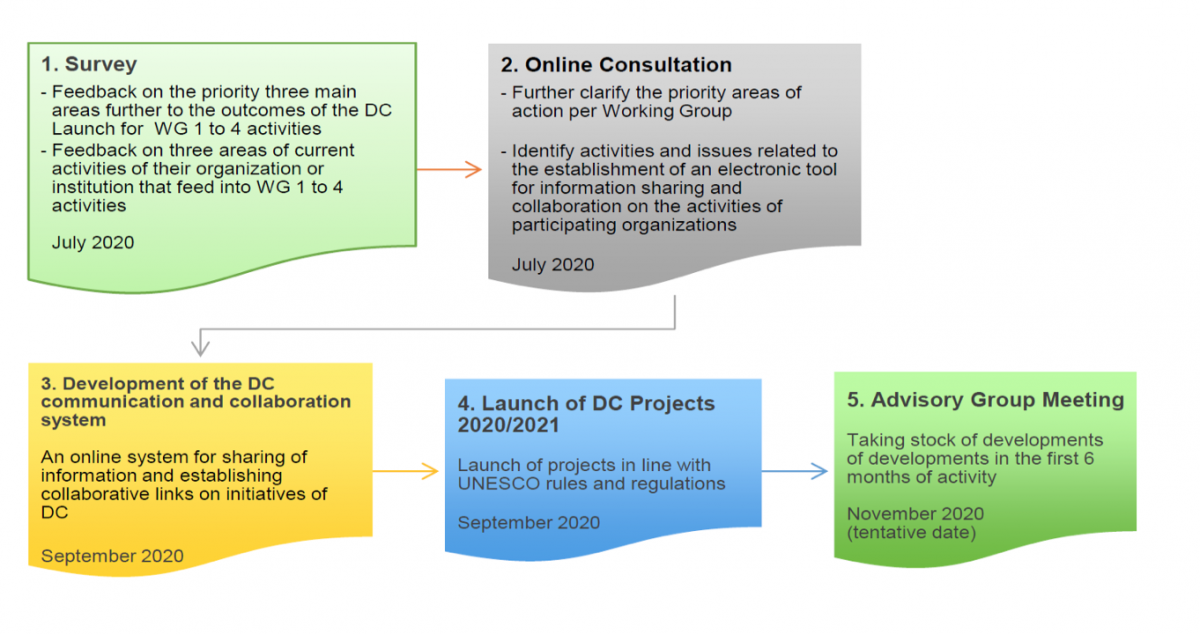
In follow-up articles, we will present the final report when it becomes publicly available and provide further updates on the work of the Dynamic Coalition. We will also explore in more detail some of the suggested actions and associated challenges that may be experienced as UNESCO and its partners (including OER Africa) seek to give practical expression to the goals of the OER Recommendation and thereby ensure that OER practices are adopted on scale in ways that truly help to improving the educational experience for students at all levels around the world.
For more articles in this series, click on the links below.
- OER Africa COVID-19 Statement (3 April, 2020)
- Understanding OER in a Context that Necessitates Remote Learning (9 April 2020)
- Showcasing OER Platforms: OER Africa (15 April, 2020)
- Online (and offline) reading resources for children (23 April, 2020)
- How to Find Open Content (30 April, 2020)
- OER Repositories in Africa (8 May, 2020)
- Emergency Remote Teaching Webinar Series – All resources available (18 May 2020)
- Sharing Africa’s knowledge through open African research repositories (29 May 2020)
- Podcast: OER and their Relevance to the COVID-19 pandemic (5 June 2020)
- Sharing Africa’s knowledge through openly licensed publishing (11 June 2020)
- Sharing Africa’s knowledge through open data (18 June 2020)
- Adapting Open Content (25 June 2020)
- Evaluating Open Content (2 July 2020)
- How can OpenCourseWare help you to improve your courses?
Saide and OER Africa would like to extend their deepest condolences to Professor Tolly Mbwette’s family and friends. Professor Mbwette was the former Vice Chancellor of the Open University of Tanzania.
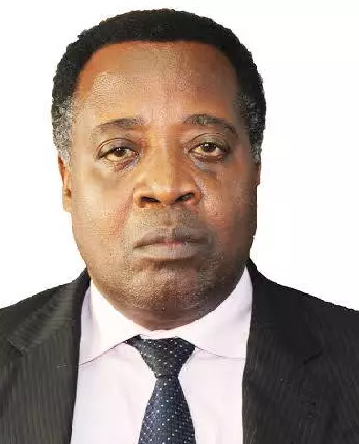
Saide and OER Africa would like to extend their deepest condolences to Professor Tolly Mbwette’s family and friends.
Professor Mbwette was the former Vice Chancellor of the Open University of Tanzania.
We are particularly grateful for Prof Mbwette’s contribution to Saide’s OER Africa initiative to promote use of OER in African universities. He participated actively in the inception gathering for OER Africa in 2008 and in subsequent reviews and strategic planning meetings. He was always available to provide support and advice to the initiative, as well as being a generous and convivial dinner companion.
In one phase of the initiative, he facilitated the commitment of the Open University of Tanzania’s to developing “Academic Digital Fluency” courses as open educational resources. These are available here.
Prof Mbwete was passionate and a great proponent for open learning and distance education in Africa. He firmly believed that distance universities have to play a very active role in expanding access to higher education in Africa. He served in a number of institutions and capacities at continental level to advance his belief and conviction on distance education.
He served as Vice Chairperson of the Executive Board of the African Council for Distance Education (ACDE) between July 2008 and July 2011 as well as one of the two Vice Chairpersons of the IUCEA Governing Board from July 2008 to June 2010.
From September 2009, Prof Mbwette was an Honorary Advisor to the Commonwealth of Learning (COL). In July 2011, he was elected as the President of ACDE for a period of three (3) years
The late Prof Mbwette will be sorely missed by the open and distance education community in African for his passion and commitment. His brilliance, humility and quest to achieve universal education transformed distance and open education. He left a legacy of achieving universal access to high quality higher education in Africa.

Image source: Nick Morrison, Unsplash
What is OpenCourseWare?
- A free and open digital publication of high-quality educational materials, organized as courses.
- Available for use and adaptation under an open licence, such as certain Creative Commons licences.
- Not normally certified.

Source: UCI Open
OER Africa will cover MOOCs in an upcoming article.
Advantages and Disadvantages of using OCW
The main advantage of OCW for academics who are developing courses is the open licence, which enables adaptation and reuse, but other benefits include:
- OCW provides complete modules or courses, which can be very helpful if you are starting a course from scratch, providing you a template from which to work.
- OCW development in an institution can encourage academics to foster and use OER if they have not previously had experience in doing so.
- Course developers can share ideas and curricula openly, examine and adopt courses from other institutions, and potentially put their own courses online.
- By sharing courses openly, institutions can attract new students to enrol and be certified for a formal qualification.
Some disadvantages:
In adopting someone else’s course, you are taking on their pedagogy and course structure, which may not suit your own style. For example, many OCW consist mainly of ‘talking heads’ and presentation slides, which can result in the student being a passive rather than active agent. Modern teaching theory stresses the need for active student engagement to enable them to construct their own knowledge rather than learn a series of facts. A further disadvantage is that many OCW are produced in developed country settings, and cannot easily be transferred to other contexts without considerable adaptation. On the other hand, of course, the open licence allows just this adaptation (though sometimes trying to adapt an existing course can end up taking longer than developing it from scratch if the differences between what is there and what you need is too great).
Where can I find OCW?
OCW available on the Internet can be used in various ways, both by academics in Higher Education Institutions and by other educators. Quality courses from providers such as the Massachusetts Institute of Technology, The Open University (UK) or the University of Michigan can be accessed, and (if they are openly licenced) provide an impetus for lecturers to revise them into contextualised programmes for a developing country context. Academics can encourage their students to work through particular OCW to supplement their own learning. Teachers and other professionals can undertake their own development by working through courses relevant to their practice.
OER Africa has various OCW offerings available:
- The Advanced Certificate in Education (ACE) Mathematics to assist teachers in their understanding upper primary and middle school maths as well as teaching issues relating to mathematical content: https://www.oerafrica.org/acemaths
- The ACE School Leadership and Management is aimed at empowering school leaders to lead and manage schools effectively: https://www.oerafrica.org/advanced-certificate-education
- The Household Food Security Programme aims to train household food security facilitators to work as change agents in the areas of agriculture, food and nutrition, focusing on households within communities.: https://www.oerafrica.org/household-food-security-programme
- The Partnership for Enhanced and Blended Learning (PEBL) assists university partners across East Africa to develop courses that can be offered by participant universities through blended learning: https://www.oerafrica.org/partnership-enhanced-and-blended-learning-pebl
- The Agshare II project, a collaboration between three HEIs in Ethiopia and Uganda on agricultural issues, lists a number of courseware documents under the list of Resources, while Communication Skills courseware developed by the University of Malawi is available at the IADP-SADC Digital Resources Project.
In summary, OCW can assist academics in higher education to improve their own offerings, and encourage them to share their own courses for the benefit of others. OCW can also assist students wishing to access courses within higher education that otherwise might not be available to them. However, as with all OER, you are ultimately responsible for assessing their utility by comparing what you find with your own understanding of what is needed to run your courses successfully.
_____________________
For more articles in this series, click on the links below.
- OER Africa COVID-19 Statement (3 April, 2020)
- Understanding OER in a Context that Necessitates Remote Learning (9 April 2020)
- Showcasing OER Platforms: OER Africa (15 April, 2020)
- Online (and offline) reading resources for children (23 April, 2020)
- How to Find Open Content (30 April, 2020)
- OER Repositories in Africa (8 May, 2020)
- Emergency Remote Teaching Webinar Series – All resources available (18 May 2020)
- Sharing Africa’s knowledge through open African research repositories (29 May 2020)
- Podcast: OER and their Relevance to the COVID-19 pandemic (5 June 2020)
- Sharing Africa’s knowledge through openly licensed publishing (11 June 2020)
- Sharing Africa’s knowledge through open data (18 June 2020)
- Adapting Open Content (25 June 2020)
- Evaluating Open Content (2 July 2020)
How can we be sure that OERs – open education resources – are of high quality? Many educators are concerned when it comes to open content as there appears to be no quality control. It also seems counter-intuitive that resources that are free can also be good.

Photo courtesy of Agence Olloweb, Unsplash
How can we be sure that open education resources (OERs) are of high quality? Many educators are concerned when it comes to open content as there appears to be no quality control. It also seems counter-intuitive that resources that are free can also be good. Many educators prefer the ‘safety net’ that commercially published textbooks offer, even though there is obviously no guarantee that, just because a book costs money, it will definitely be good. The logic is that textbooks have been through a rigorous review process. So why bother with OERs?
Of course, there is no international ‘review board’ vetting everything that is released with a Creative Commons licence (but nor is there any such mechanism for all-rights-reserved copyrighted materials). Regardless of licensing conditions, the onus is always ultimately on the planning to use the resource to assess its value; of course, experience helps to determine what that value might be. However, even for those relatively new to the process, quality assuring an OER is not difficult if guided by a suitable set of criteria.
OER Africa has recently released a learning pathway, or online tutorial, that includes a section on evaluating OER. You can access all of OER Africa’s learning pathways here. Our favourite set of OER quality criteria (see below) was created by British Columbia OER Librarians. The list has been released with an open (CC BY) licence and the six criteria are easy to apply. When you have sourced an OER and are wondering if it is good quality, use the checklist below to do a quick review.
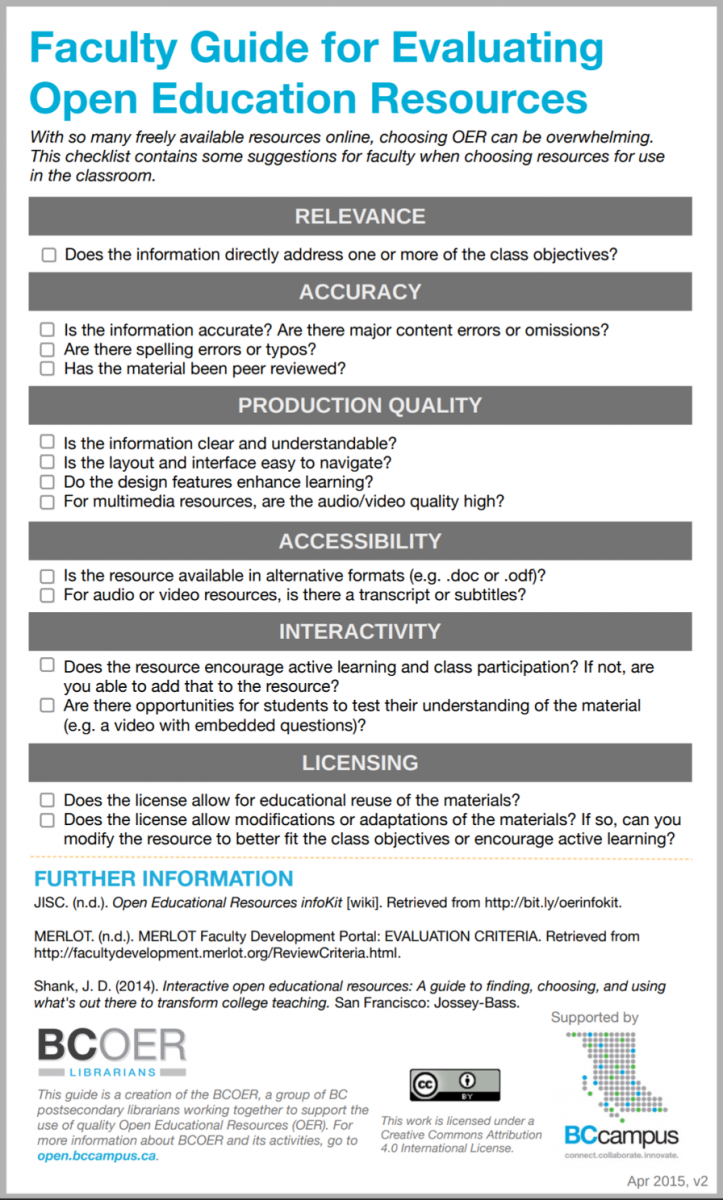
Other resources about developing and using OER are available here, while you can find resources focusing on OER research in Africa here.
_____________________
For more articles in this series, click on the links below.
- OER Africa COVID-19 Statement (3 April, 2020)
- Understanding OER in a Context that Necessitates Remote Learning (9 April 2020)
- Showcasing OER Platforms: OER Africa (15 April, 2020)
- Online (and offline) reading resources for children (23 April, 2020)
- How to Find Open Content (30 April, 2020)
- OER Repositories in Africa (8 May, 2020)
- Emergency Remote Teaching Webinar Series – All resources available (18 May 2020)
- Sharing Africa’s knowledge through open African research repositories (29 May 2020)
- Podcast: OER and their Relevance to the COVID-19 pandemic (5 June 2020)
- Sharing Africa’s knowledge through openly licensed publishing (11 June 2020)
- Sharing Africa’s knowledge through open data (18 June 2020)
- Adapting Open Content (25 June 2020)
What exactly can you do with OER? In what ways are they different from other resources? The beauty of OER is that most of them can be adapted to better suit your teaching and learning environment. They can be revised. It is also possible to ‘stitch’ multiple OER into a new resource, like a patchwork quilt. We call this ‘remixing’ resources.
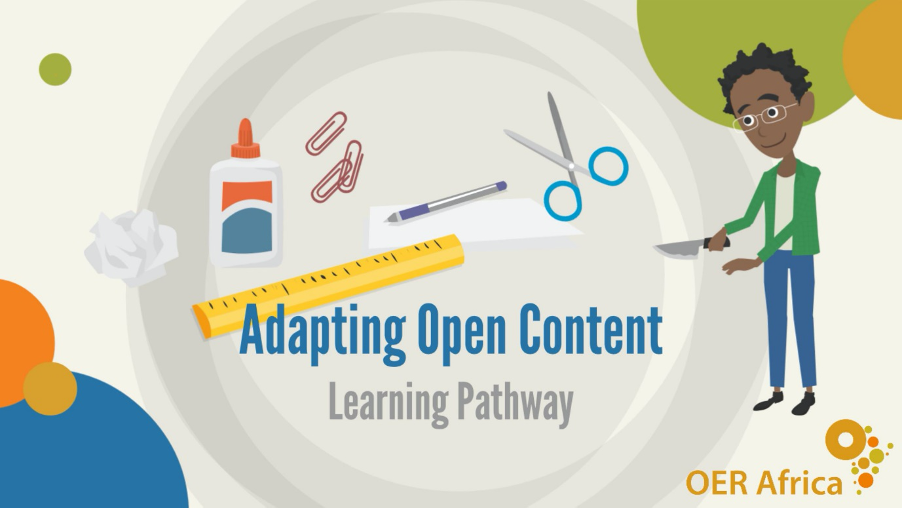
What exactly can you do with OER? In what ways are they different from other resources? The beauty of OER is that most of them can be adapted to better suit your teaching and learning environment. They can be revised: you can re-work the language to make them more accessible to students; cut out and replace images with your own; translate into different languages; and add additional content, questions and exercises.
It is also possible to ‘stitch’ multiple OER into a new resource, like a patchwork quilt. We call this ‘remixing’ resources.
However, there is some skill and know-how required to revise and re-mix well. OER Africa has prepared a concise learning pathway (LP) to help you acquire these practical skills quickly.
The Adapt Open Content learning pathway covers the following themes:
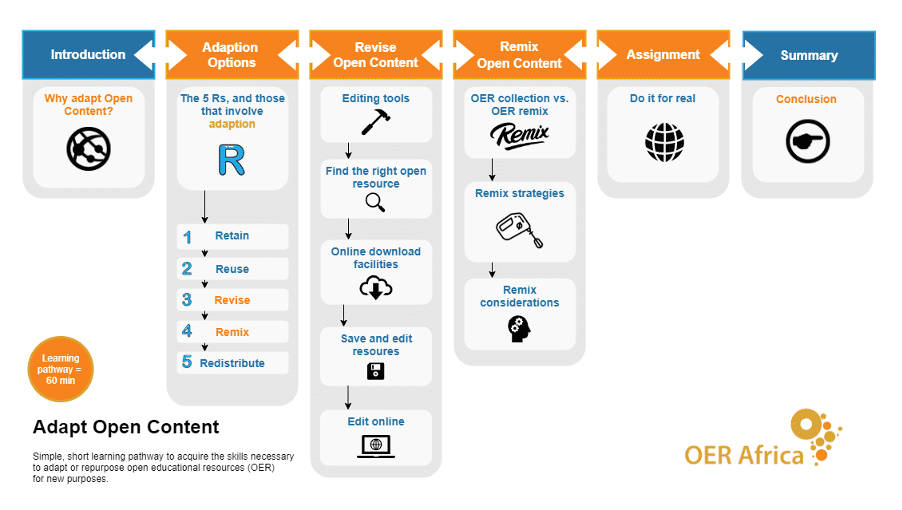
Access the learning pathway on the OER Africa website here.
This LP on Adapting Open Content follows a previous LP that focused on Finding Open Content so if you are not clear how to find a good open resource, make sure you look at that LP too. All the LPs can be accessed here.
____________________
For more articles in this series, click on the links below.
- OER Africa COVID-19 Statement (3 April, 2020)
- Understanding OER in a Context that Necessitates Remote Learning (9 April 2020)
- Showcasing OER Platforms: OER Africa (15 April, 2020)
- Online (and offline) reading resources for children (23 April, 2020)
- How to Find Open Content (30 April, 2020)
- OER Repositories in Africa (8 May, 2020)
- Emergency Remote Teaching Webinar Series – All resources available (18 May 2020)
- Sharing Africa’s knowledge through open African research repositories (29 May 2020)
- Podcast: OER and their Relevance to the COVID-19 pandemic (5 June 2020)
- Sharing Africa’s knowledge through openly licensed publishing (11 June 2020)
- Sharing Africa’s knowledge through open data (19 June 2020)
This post is the third in a series on sharing African research outputs, using open licensing. This post concentrates on open data. Open data means that users can make free use of research data without requesting written permission and without copyright or patent violations.

Photo courtesy of Lukas Blazek, Unsplash
This post is the third in a series on sharing African research outputs, using open licensing. This post concentrates on open data.
Open data means that users can make free use of research data without requesting written permission and without copyright or patent violations. The data are typically stored in a non-proprietary format, which allows editing and analysis. Open data are usually given an ‘Attribution and Share-Alike for Data/Databases’ licence. Just as Creative Commons provides licences for educational and research resources, the Open Data Commons provides a set of legal tools for researchers to use when they make their data open to the public.
OER Africa’s open knowledge primer provides background on basic concepts and their pertinence to African researchers. OER Africa has also created a Learning Pathway – an online tutorial – on publishing using open access. Both resources describe the role of open data.
Why is open data assuming such significance today? Quick release of current and verifiable information on COVID-19 is one reason, of course. More generally, many open access journals, research organizations, and donors now require authors to make their data publicly available, usually by depositing them in an appropriate and approved data repository. The journal, Nature, maintains a list of data repositories that it has evaluated and approved.
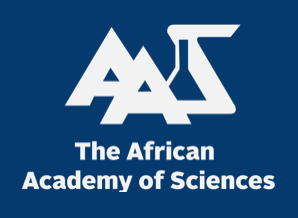
The African Academy of Sciences (AAS) Open Data Guidelines also lists reputable repositories. The Open Knowledge Foundation gives three reasons why open government data is important: it promotes transparency; it can help create innovative business and services that deliver social and commercial value; and it can lead to participation and engagement on the part of the business sector and civil society.

The Open Data for Africa Portal was developed by the African Development Bank (AfDB) in response to the increasing demand for statistical data and indicators relating to Africa. The Portal provides multiple customized tools to gather indicators, analyze them, and export them into multiple formats. Users can search by region or country and by topic. There is also a COVID-19 Situation Room, with data collected by the World Health Organization.
The Open Data for Africa Portal relies on official statistics from governments and international agencies. Open Africa, on the other hand, is driven by volunteers and aims to be the largest independent repository of open data on the African continent. Although a civil society initiative, some government agencies contribute data, such as the South African National Department of Health. Data are available in PDF, CSV, and XLSX. Note that the dataset in the figure below was updated after its release.

Figure 1: South African health care system’s readiness for COVID-19
Open data does not mean sharing confidential information without protecting privacy. Some data qualify for release without any alterations; others must be altered to protect privacy before release. Still other data should not be released at all. The African Academy of Sciences, for example, gives detailed data guidelines for authors to follow, including a section on instances for which data deposit is not required.

Figure 2: When data deposit is not required for AAS Open Research
Making research and related data openly and widely accessible is an essential component of the Open Science movement, the benefits of which are becoming increasingly clear during the COVID-19 pandemic. Open science can also promote scientific collaboration between individuals and research centres.

Africa is becoming an integral part of Open Science. Following a three-year landscape study carried out by the South African Academy of Sciences and the Association of African Universities, the South African Research Foundation has been selected to host the African Open Science Platform (AOSP). The AOSP Strategic Plan delineates the challenges facing African science as research and communications methods worldwide undergo transformation. AOSP believes that the Platform can meet these challenges:
'The Platform’s mission is to put African scientists at the cutting edge of contemporary, data-intensive science as a fundamental resource for a modern society.'
____________________
For more articles in this series, click on the links below.
- OER Africa COVID-19 Statement (3 April, 2020)
- Understanding OER in a Context that Necessitates Remote Learning (9 April 2020)
- Showcasing OER Platforms: OER Africa (15 April, 2020)
- Online (and offline) reading resources for children (23 April, 2020)
- How to Find Open Content (30 April, 2020)
- OER Repositories in Africa (8 May, 2020)
- Emergency Remote Teaching Webinar Series – All resources available (18 May 2020)
- Sharing Africa’s knowledge through open African research repositories (29 May 2020)
- Podcast: OER and their Relevance to the COVID-19 pandemic (5 June 2020)
- Sharing Africa’s knowledge through openly licensed publishing (11 June 2020)
This week, we focus on publishing in high-quality Open Access (OA) journals, with an emphasis on African journals. Open licensing allows for distribution of research literature, primarily online, without cost to the reader.Most OA materials use Creative Commons licences, which lay out the terms under which they can be used and distributed.

Photo courtesy of Patrick Tomasso, Unsplash
This week, we focus on publishing in high-quality Open Access (OA) journals, with an emphasis on African journals. Open licensing allows for distribution of research literature, primarily online, without cost to the reader. Most OA materials use Creative Commons licences, which lay out the terms under which they can be used and distributed. Many OA journals employ a particular Creative Commons Licence, CC BY, which permits distribution, copying, and adaptation without requesting permission. Full attribution is always required, however.
Traditional journals typically meet their costs through subscriptions and selling advertising space, with some charging authors. OA journals usually charge authors a fee, called an Author Processing Charge (APC). The business model thus switches from one in which the subscriber or the advertiser pays the costs to one in which the author must pay. There is also a third mechanism called hybrid publishing. Funders increasingly require their grantees to publish using open access licences. If they publish with traditional journals, because of these donor requirements, these journals permit authors to select a Creative Commons licence for their accepted submissions, but charge a fee for doing so. In addition, some traditional publishers now produce fully OA journals. SHERPA/RoMEO, which is hosted by the University of Nottingham in the UK, maintains a database with information on publisher copyright restrictions and permissions. Note author rights and general conditions, see Figure 1 below.

Figure 1: SHERPA/RoMEO entry for African Journal of AIDS Research

There are two major platforms where you can search for journals. One is the Directory of Open Access Journals (DOAJ); the other is through African Journals Online (AJOL).

AJOL hosts 526 journals, 264 of which are OA. On a national level, the University of Addis Ababa Libraries hosts Ethiopian Journals Online, a repository of 27 Ethiopian OA journals. The Academy of Science of South Africa also maintains Scientific Electronic Library Online (SciELO) SA, which includes a selected collection of peer-reviewed OA South African scholarly journals and forms an integral part of the SciELO Brazil project.
Publishing research in African journals is significant for several reasons. It can give African scientists better global recognition. All too often African research is not accepted in traditional journals because it is not deemed a priority in Western journals or is considered too applied. African journals fill that gap; their peer review is comparable to their North American or European peers; and they are indexed by the same indexing and abstracting services. In addition, African OA journals charge lower Author Processing Charges or absorb costs in other ways. Moreover, the number of high-quality African OA journals continues to grow.
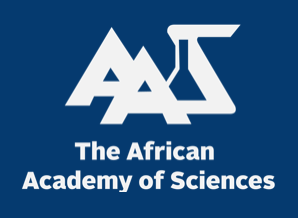
The COVID-19 pandemic demonstrates how well African publishers can speedily disseminate research particularly pertinent to Africa. As an example, the African Academy of Sciences (AAS), which produces AAS Open Research, has a webpage on research and funding opportunities specific to Africa. It also maintains a COVID-19 collection with articles that have been peer reviewed and those that are awaiting peer review. This is an important mechanism to ensure that time-sensitive research becomes immediately available.
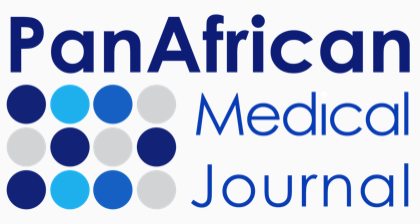
Equally timely, the Pan-African Medical Journal has published a special issue on COVID-19 in Africa. The research articles, essays, and commentaries in this issue are specifically relevant to the continent, for example, on the coronavirus in Nigeria, Morocco, conflict-affected areas of Cameroon, and migrant communities in Sub-Saharan Africa.

The African Population and Health Research Center (APHRC) has started to publish weekly COVID-19 situation reports written by researchers associated with APHRC. They cover topics not usually included in traditional publications, for example supporting communities living in urban informal settlements to protect themselves from COVID-19. Although APHRC’s core business is to conceptualize, implement, and publish long-term evidence-based research, the Centre believes that information on the coronavirus pandemic is so urgent that it decided to publish these weekly briefs focusing on Africa.
Resources on Open Access
OER Africa’s open knowledge primer provides background on basic concepts and their pertinence to African researchers. OER Africa has also created a Learning Pathway (LP) on publishing using open access, which defines terms and will help you acquire the skills necessary to publish or advise on publishing research using OA. Both the primer and the LP will enable you to understand how to identify and select peer-reviewed OA journals that meet international standards. Both provide information on how to evaluate open access journals, an important consideration because some OA publishers use deceptive practices.
Our upcoming post on 25 June 2020 will address the significance of open data as a part of OA publishing.
_________________________
Click on the links below to access other articles in this series.
- OER Africa COVID-19 Statement (3 April, 2020)
- Understanding OER in a Context that Necessitates Remote Learning (9 April 2020)
- Showcasing OER Platforms: OER Africa (15 April, 2020)
- Online (and offline) reading resources for children (23 April, 2020)
- How to Find Open Content (30 April, 2020)
- OER Repositories in Africa (8 May, 2020)
- Emergency Remote Teaching Webinar Series – All resources available (18 May 2020)
- Sharing Africa’s knowledge through open African research repositories (29 May 2020)
- Podcast: OER and their Relevance to the COVID-19 pandemic
This week Mohini Baijnath speaks with Neil Butcher, OER Strategist at OER Africa, about OERs and their relevance in the context of the COVID-19 pandemic. Neil speaks about the challenges that COVID-19 poses to education systems, how OER can be used to support educators and students amidst institutional closures, and what role governments can play in promoting the use of OER.
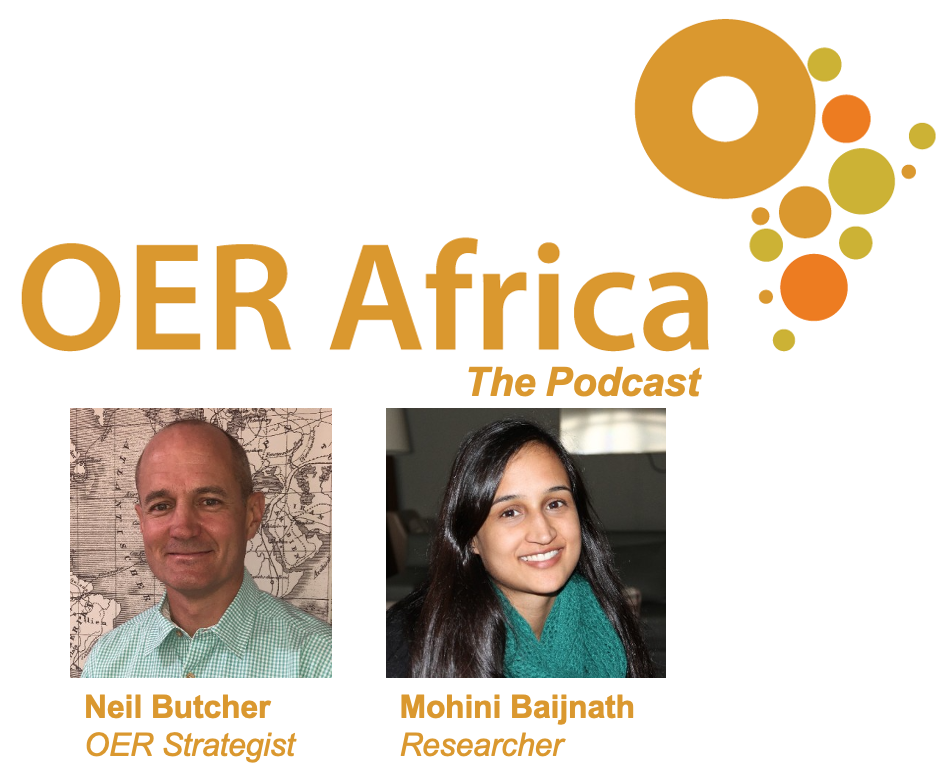
This week Mohini Baijnath speaks with Neil Butcher, OER Strategist at OER Africa, about OERs and their relevance in the context of the COVID-19 pandemic. Neil speaks about the challenges that COVID-19 poses to education systems, how OER can be used to support educators and students amidst institutional closures, and what role governments can play in promoting the use of OER.
Listen to the podcast below.
______________________
Click on the links below to access other articles in this series.
- OER Africa COVID-19 Statement (3 April, 2020)
- Understanding OER in a Context that Necessitates Remote Learning (9 April 2020)
- Showcasing OER Platforms: OER Africa (15 April, 2020)
- Online (and offline) reading resources for children (23 April, 2020)
- How to Find Open Content (30 April, 2020)
- OER Repositories in Africa (8 May, 2020)
- Emergency Remote Teaching Webinar Series – All resources available (18 May 2020)
- Sharing Africa’s knowledge through open African research repositories (29 May 2020)
Open licensing is used for many different kinds of resources – open educational resources (OER), open access research publishing, open data, and more broadly open science. This post discusses developments in access to African research information through repositories that use open licensing.
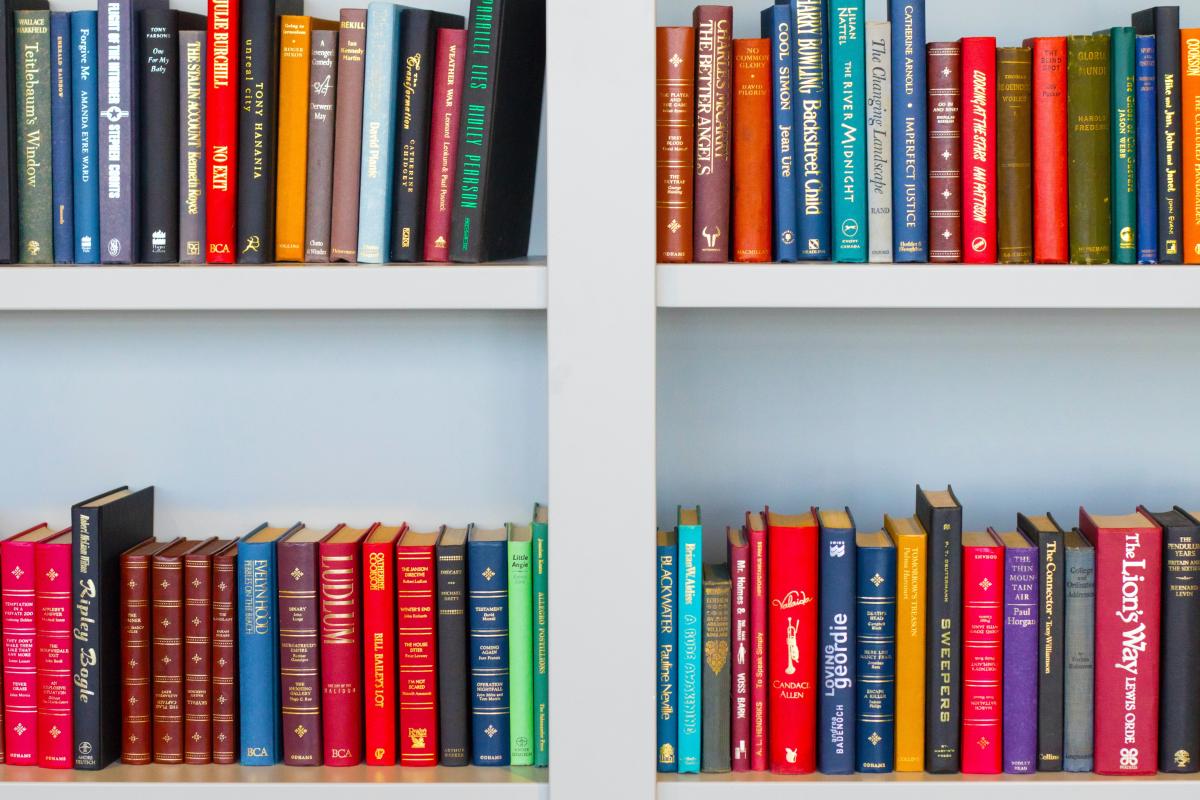
Open licensing is used for many different kinds of resources – open educational resources (OER), open access research publishing, open data, and more broadly open science. This post discusses developments in access to African research information through repositories that use open licensing. All of the resources are freely available and usually carry a Creative Commons or equivalent license.
OER Africa’s open knowledge primer provides a background on basic concepts and their pertinence to African researchers. OER Africa has also created a Learning Pathway on publishing using open access, which defines terms and will help you acquire the skills necessary to publish or advise on publishing research using Open Access (OA).
Like their global counterparts, many African research institutions and universities are increasingly using open licensing to make their research available and visible globally. The number of open access repositories is growing so quickly that it is difficult to keep track of them. The UK International African Institute (IAI) maintains a list that is frequently updated. IAI, in collaboration with AfricarXiv, has created an interactive map of African digital research literature repositories. You can also search on Google or the search engine of your choice by entering the name of an institution or country and repository (though this would require you to know better what you are looking for).
University open access repositories collect student theses and dissertations, case studies, conference papers, and sometimes journal articles. There are also continent-wide repositories. Three are discussed below. One focuses on university research output; one is a pre-print service; and one is discipline specific.
________________________________________
Database of African Theses and Dissertations
The Association of African Universities maintains the Database of African Theses and Dissertations, including Research (DATAD-R). At this writing, universities in six countries contribute to DATAD-R. There are over 29,000 theses and dissertations and 4,700 research articles.
________________________________________
AfricArXiv African Preprint Service
The AfricArXiv African Preprint Service is a part of the worldwide ArXiv movement in the fields of physics, mathematics, computer science, quantitative biology, quantitative finance, statistics, electrical engineering and systems science, and economics. ArXiv has become an important vehicle to speedily pre-publish scientific research and data on the coronavirus. The platform is maintained by Cornell University. Although contributions are not peer reviewed, ArXiv relies on a strong team of scientists as moderators and advisors.
Launched in 2018, AfricArXiv is an initiative of the Project for Open Science. This service allows African scientists to mount preprints of their research for review and discussion by peers in the international scholarly community before publication in a scholarly journal. AfricArXiv, which does not peer review submissions, sees itself as a way for African scientists to circulate their research quickly and freely in order to communicate with others in their field. It does not replace publication in a peer-reviewed journal. AfricArXiv is collaborating with Science Open to collect COVID-19 research in and about Africa.
________________________________________
Regional Universities Forum for Capacity Building in Agriculture (RUFORUM)
RUFORUM, is a continent-wide consortium in 126 African universities and 38 countries. It operates an open access knowledge repository in the broad-based agricultural sciences, with copies of theses and dissertations, journal articles, case studies, briefing papers, policy briefs, posters, presentations, and conference papers from RUFORUM member universities and RUFORUM staff.
_____________________________________________________________________
Click on the links below to access other articles in this series.
- OER Africa COVID-19 Statement (3 April, 2020)
- Understanding OER in a Context that Necessitates Remote Learning (9 April 2020)
- Showcasing OER Platforms: OER Africa (15 April, 2020)
- Online (and offline) reading resources for children (23 April, 2020)
- How to Find Open Content (30 April, 2020)
- OER Repositories in Africa (8 May, 2020)
- Emergency Remote Teaching Webinar Series – All resources available (18 May 2020)
As the spread of COVID-19 continues around the world, face-to-face lectures have ceased in many countries and academics are trying to find practical ways of delivering curricula remotely. In response to this, the Association of African Universities (AAU) and OER Africa presented a series of four webinars on Emergency Remote Teaching (ERT) strategies.
As the spread of COVID-19 continues around the world, face-to-face lectures have ceased in many countries and academics are trying to find practical ways of delivering curricula remotely. In response to this, the Association of African Universities (AAU) and OER Africa presented a series of four webinars on Emergency Remote Teaching (ERT) strategies. In contrast to online learning, which is an experience that is planned from the beginning to be delivered online, ERT refers to ‘a temporary shift of instructional delivery to an alternate delivery mode due to crisis circumstances.’[1]
The webinars were intended to assist academics to implement ERT effectively. They covered a broad range of topics, including how to teach remotely; what content to cover; how to ensure that students are learning effectively; and how to communicate with students. We targeted academics with limited knowledge of online learning, aiming to provide a simple and practical guide to help them implement effective ERT for their students.
Recordings of all four webinars, along with their downloadable resources, are accessible here. To access information for individual webinars, click on the links below.
Webinar 1: Teaching effectively during the campus closure – Tips and tricks
Webinar 2: What to teach during campus closure
Webinar 3: How to know if learning is happening during campus closure
Webinar 4: Communicate effectively during campus closure
_________________________
To further support educators and students, OER Africa is also publishing regular communications on Open Educational Resources (OER) and their relevance within the context of the COVID-19 pandemic and beyond. Click on the links below to access articles in this series.
• OER Africa COVID-19 Statement (3 April, 2020)
• Understanding OER in a Context that Necessitates Remote Learning (9 April 2020)
• Showcasing OER Platforms: OER Africa (15 April, 2020)
• Online (and offline) reading resources for children (23 April, 2020)
• How to Find Open Content (30 April, 2020)
• OER Repositories in Africa (8 May, 2020)
For more, sign up to the newsletter here.
OER courseware is also available on the website. Follow us on social media for links to our news and events.
![]()

[1] Hodges, C., Moore, S., Lockee, B., Trust, T. and Bond, A. (2020). The Difference Between Emergency Remote Teaching and Online Learning. Educause Review. Retrieved from https://er.educause.edu/articles/2020/3/the-difference-between-emergency-remote-teaching-and-online-learning
As the COVID-19 pandemic continues, most African higher education institutions have halted face-to-face classes. But learning can continue, so OER Africa would like to share resources to help you to keep the doors of learning open.
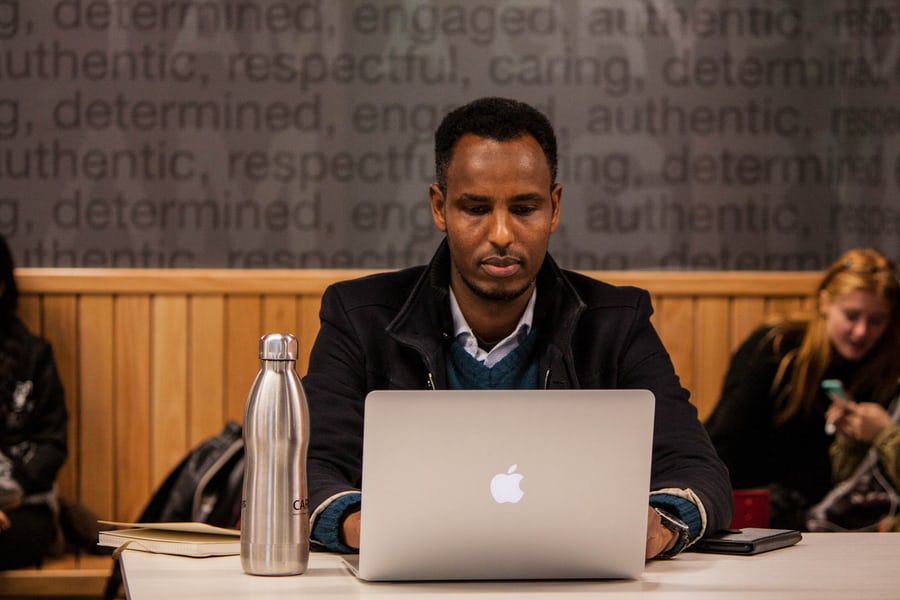
Photo courtesy of Trust Katsande, Unsplash
As the COVID-19 pandemic continues, most African higher education institutions have halted face-to-face classes. But learning can continue, so OER Africa would like to share resources to help you to keep the doors of learning open. In contexts with limited educational means, Open Educational Resources (OER) can contribute to the accessibility of education and can encourage a culture of flexible and collaborative learning, particularly if the learning materials are reused, customized, and shared.
A useful way of accessing such resources is via online knowledge repositories. A knowledge repository is an online database that systematically captures, organizes, and categorizes knowledge-based information. A few examples of OER repositories for the African context are:
Kwame Nkrumah University of Science and Technology (KNUST) OER – KNUST OER seeks to promote open learning through an open exploration that enables faculty, students, and the global academic community to access open licensed educational resources to maximize the impact and reach of their scholarly work through open sharing.
FundaOER, an initiative of VVOB, provides a repository of OERs to advance teaching and learning in Initial Teacher Education and Continuing Professional Development in South Africa. Articles, factsheets, videos, and other types of materials, covering different themes and phases, are freely and openly available on the platform.
The African Veterinary Information Portal (AfriVIP) contains materials pertaining to veterinary science. All its course materials, videos, animations, and images carry an open licence.
OpenUCT is the open access institutional repository of the University of Cape Town (UCT). It makes available and digitally preserves the scholarly outputs produced at UCT, including theses and dissertations, journal articles, book chapters, technical and research reports, and OER. These resources are organized into collections that are mapped against the university's organizational structure.
University World News recently published a list of South African OER, available here
For higher education courseware, the following resources are useful:
- AgShare Pilot and Planning Project
- African Teacher Education Network
- Teacher Education in Sub-Saharan Africa (TESSA)
- OpenStax
- MERLOT
- Middle East Technical University Open Courseware
- Massachusetts Institute of Technology Open Courseware
Following adoption of the UNESCO Open Educational Resources (OER) Recommmendation, UNESCO launched the Dynamic Coalition for the OER Recommendation on 2 March 2020
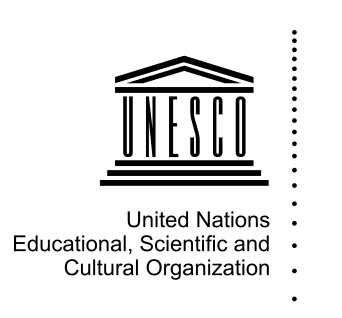
Following adoption of the UNESCO Open Educational Resources (OER) Recommmendation, UNESCO launched the Dynamic Coalition for the OER Recommendation on 2 March 2020.
The multi-stakeholder coalition aims to expand and consolidate commitments to actions and strategies, as well as reinforce international cooperation among all stakeholders in the four areas of the Recommendation:
1. Building capacity of stakeholders to create, access, re-use, adapt and redistribute OER;
2. Developing supportive policy;
3. Encouraging inclusive and equitable quality OER; and
4. Nurturing the creation of sustainability models for OER.
The work of the Dynamic Coalition has become more pertinent amidst the COVID-19 pandemic, as countless educational institutions have closed in response to various lockdown requirements. Millions of students and educators are required to study and work from home, thus necessitating greater use of freely available open and online learning resources.
In support of this, UNESCO has issued a call to support learning and knowledge sharing through OER amidst the COVID-19 crisis. Details about the call are available here.
In recognition of the importance of digital technologies, UNESCO has also launched a page featuring initiatives that it and its partners are involved in to harness the potential of digital technologies against COVID-19. You can access the page here.
While many educators appreciate the value of openly licensed content, the issue is how to find these resources. OER Africa has prepared an interactive, multimedia rich, learning pathway on just this topic. It identifies a suggested simple set of procedures to find open resources that align with your curriculum requirements.

While many educators appreciate the value of openly licensed content, the issue is how to find these resources. Many educators and developers struggle to search for and identify useful resources.
OER Africa has prepared an interactive, multimedia rich, learning pathway on just this topic. It identifies a suggested simple set of procedures to find open resources that align with your curriculum requirements.
The learning pathway is short, concise, and comprises eight segments of approximately 20 minutes each.
The eight segments in the Find Open Content learning pathway cover:
- Why find and use open content?
- What is open licensing?
- Identifying different types of open content
- How to search for open content using Google
- Search for open content using Creative Commons search
- Search for open content on YouTube
- Search for open content in open repositories
- How to evaluate the open content discovered.
Access the learning pathway here
Trying to work out how to best teach your students during university shutdowns due to the COVID-19 crisis? Sign up for a webinar series on Emergency Remote Teaching, hosted by the Association of African Universities (AAU) and OER Africa. Register here.
Trying to work out how to best teach your students during university shutdowns due to the COVID-19 crisis? Sign up for a webinar series on Emergency Remote Teaching, hosted by the Association of African Universities (AAU) and OER Africa.
Register here https://forms.gle/wToc2YCa6QnAQUw37
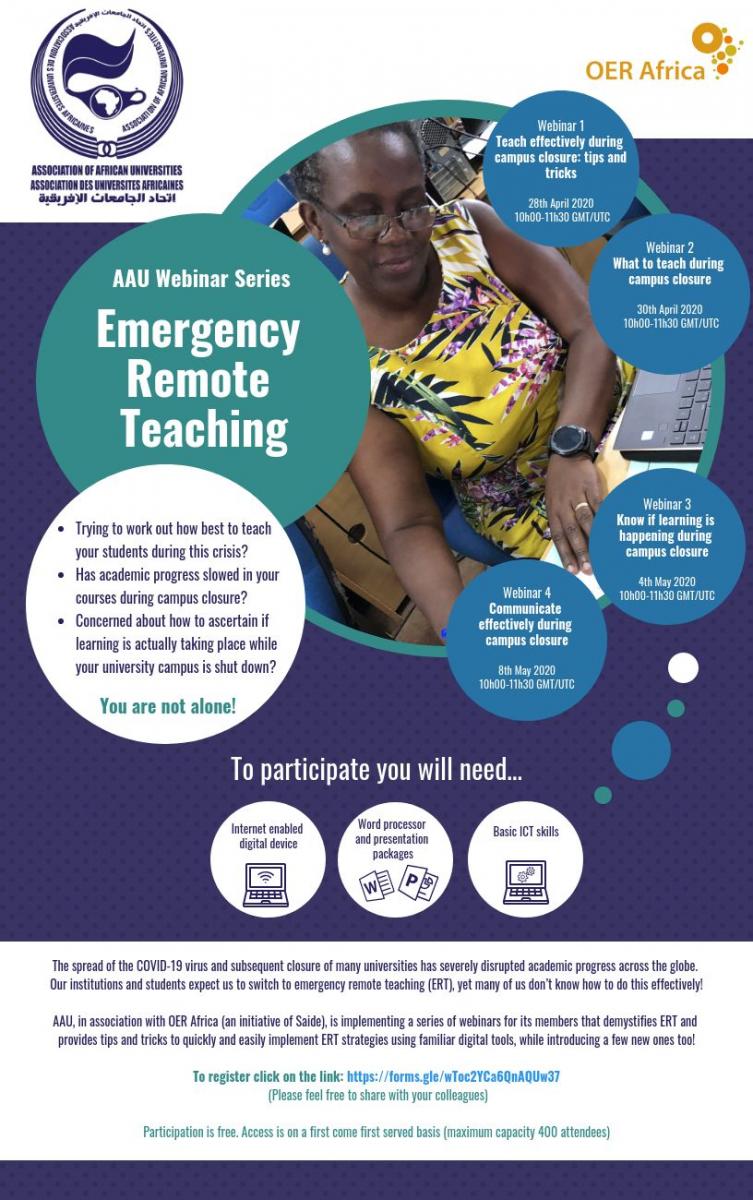
World Book and Copyright Day on 23 April is a celebration to promote the enjoyment of books and reading. Now that so many of us are at home with our children because of COVID-19, we can explore the virtual world of children’s stories – all free to read and many openly licensed. Some wonderful book and reading resources are listed below.

World Book and Copyright Day on 23 April is a celebration to promote the enjoyment of books and reading. Now that so many of us are at home with our children because of COVID-19, we can explore the virtual world of children’s stories – all free to read and many openly licensed. Some wonderful book and reading resources are listed below.
With more than 7,200 children’s stories in 190 African languages, African Storybook has something for every child, from the very young ones just learning to read to older children. It’s possible to search in various ways, including by language and reading level, and to download freely and print. Most of the storybooks are created or translated by local educators and reflect African contexts. There is also an excellent guide for parents, teachers, and librarians on Preparing to Use African Storybooks with Children. Over 4,000 of these storybooks can be found on the ASb reader app. Selected books can be downloaded onto a personal library for offline use.
There are more than 19,000 stories in 234 languages on the StoryWeaver platform. StoryWeaver has created a special page on Reading at Home during the Coronavirus school closures. This page links to: learning resources from grades one to eight; StoryWeaver’s special collection on science, mathematics, and technology; its local-language digital libraries, including African languages; and more.
Book Dash believes that every child should own one hundred books by the age of five. This South African non-profit gathers creative professionals who volunteer to create new, African storybooks that anyone can freely translate, print and distribute. It creates beautiful, high-quality books for young children in all South African languages. They currently have over 100 titles. Book Dash also has a short guide on Tips for Reading with Young Children.
African Storybook, StoryWeaver, and Book Dash use a Creative Commons Attribution (CC BY) licence, which means that you can download, print, share, translate, and adapt all of the stories in their collections.
Nal’ibali (isiXhosa for “here’s the story”) believes that well-established culture of reading can be a real game-changer for education in South Africa. Literacy skills are a strong predictor of future academic success in all subjects – and children who regularly read and hear engaging stories, in languages they understand, are well equipped and motivated to learn to read and write. Nal’ibali promotes reading and writing in mother tongue languages.
Nal’ibali has free to download stories and reading resources for children and teenagers, accessible here
Audible (by Amazon) is a platform that allows you to stream audiobooks. While schools are closed, Audible is allowing free access to stream an incredible collection of stories for children and teenagers, including titles across six different languages. All stories are free to stream on your desktop, laptop, phone or tablet. Note that these titles are currently freely available, but they are protected by full copyright.
The Early Literacy Resource Network
The Early Literacy Resource Network provides links to research and resources on licensing, policies, creation, and use of high-quality children’s materials in the global South. The Teaching Literacy page provides information for teaching reading and literacy skills. For more early literacy resources and information on how Creative Commons licences are used, access Good Stories Don't Grow on Trees: A Guide to Effective Costing of Storybooks in the Global South.
This week, OER Africa shares some resources we consider useful for institutions in the midst of current restrictions of movement and the requirements to introduce remote teaching in many countries due to the COVID-19 pandemic. We have selected resources for universities, school management teams, mathematics, reading and writing, as well as our most popular downloads over the past six months.
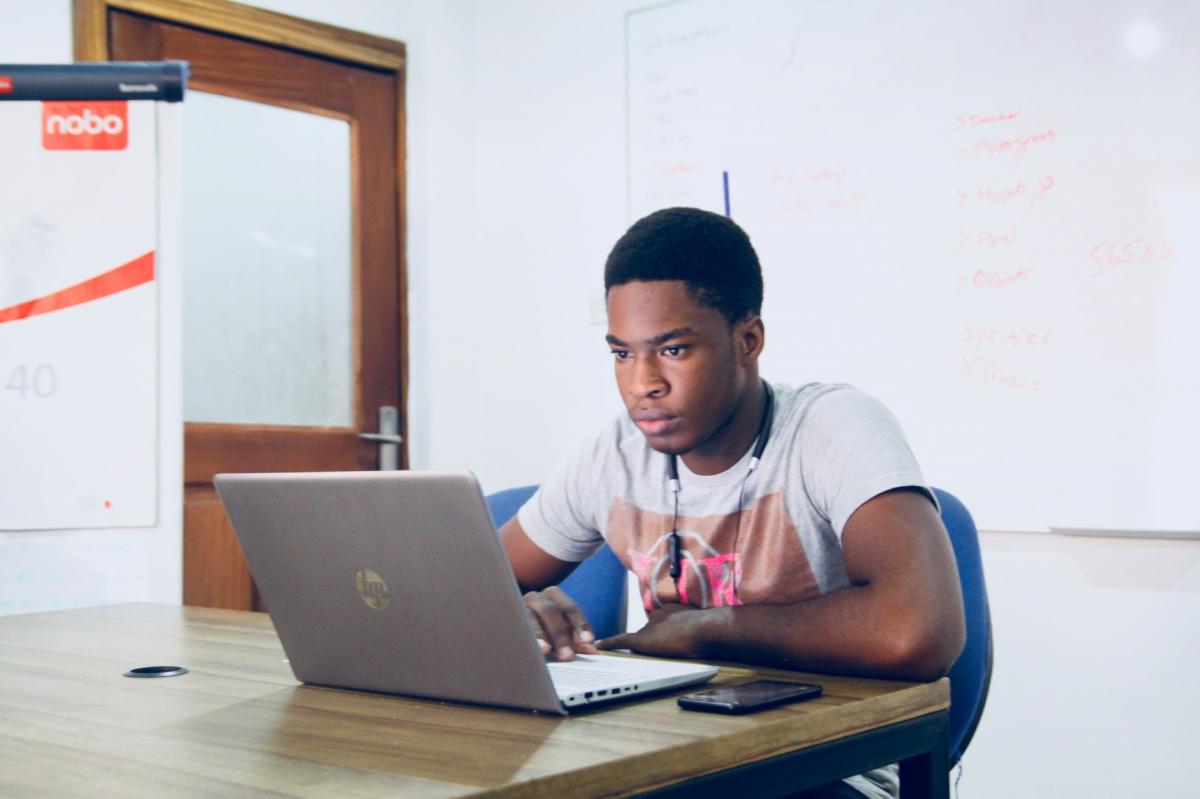 |
Most of these resources have been produced in sub-Saharan Africa for our context.
Resources for universities
- The Commonwealth of Learning’s Guide to Blended Learning
- Policy documents on OER
Resources for School Management Teams
- The Creating a Caring School Series: A Guide for School Management Teams
Resources for Mathematics; Reading and Writing
Although the following resources are not new, their approach to activity-based learning for teachers is still relevant.
- Exploring What It Means To ‘Do’ Mathematics
- Exercises on Teaching Data Handling
- Reading Skills
- Writing Skills
Most popular downloads
Finally, OER Africa’s most downloaded resources include the Being a Teacher series; the Household Food Security programme; and the Farmers Agribusiness Training course.
These resources are a small selection of what is available on the OER Africa website. The website concentrates on Health, Teacher Development, Agriculture and Foundations in Higher Education.
You can search for resources at the top of any page on the website.
As the COVID-19 pandemic has spread, millions of learners and educational institutions globally have had to make rapid, unforeseen changes to how they run their learning programmes. Face-to-face teaching and learning have become impossible in many countries and there is uncertainty over when educational institutions will reopen their doors. This may have long-term effects on school programmes, examinations, and most importantly, learning.
As the COVID-19 pandemic has spread, millions of learners and educational institutions globally have had to make rapid, unforeseen changes to how they run their learning programmes. Face-to-face teaching and learning have become impossible in many countries and there is uncertainty over when educational institutions will reopen their doors. This may have long-term effects on school programmes, examinations, and most importantly, learning.
The pandemic has forced many educators and learners to explore new modes of learning provision such as online learning. It also places much greater emphasis on students being able to engage with educational resources as a primary mode of learning. Fortunately, over the last decade, a growing number of open educational resources (OER) have been made available by people in the education space for others to use. These OER offer great promise in ensuring that a range of educational materials are accessible to learners and educators.
What are OER?
There are many definitions of OER, one of the most comprehensive being:
Open Educational Resources are teaching, learning, and research resources that reside in the public domain or have been released under an intellectual property licence that permits their free use and repurposing by others. OER include full courses, course materials, modules, textbooks, streaming videos, tests, software, and any other tools, materials, or techniques used to support access to knowledge. (Hewlett Foundation, OER Defined)
The Cape Town Open Education Declaration states that OER should be freely shared through open licences that facilitate use, revision, translation, improvement, and sharing by anyone. The materials need to be published in formats that allow for both use and editing, while accommodating manipulation and adoption on various technical platforms. It also requires that materials be made available in formats that are accessible to people with disabilities and people who do not yet have access to the Internet, where possible.
Creative Commons Licences
The most common mechanism to share educational resources openly and legally is by using Creative Commons (CC) licences. Creative Commons ‘provides free, easy‐to use copyright licences to make a simple and standardized way to give the public permission to share and use your creative work – on conditions of your choice’ (Creative Commons, nd).
CC licences provide a wonderful opportunity to translate materials into other languages and use them for varying purposes. This is illustrated in the World Bank’s recent rapid response note, Remote Learning and COVID-19:
A quick inventory of content that can be easily made available via remote learning is a first order of business. Freely available, ‘open education resources’ are plentiful in some languages; in languages where digital learning content is limited, translating existing open education resources from other languages may be worth considering, together with partners. (World Bank, 2020).
Over the years, countless educational materials have been available as OERs and released online. Because they are openly licensed, OERs can be rapidly aggregated and deployed in remote learning contexts to substitute for the loss of face-to-face teaching time caused by institutional shutdowns. With most proprietary educational materials locked behind paywalls and not free to copy or use, OERs can provide educators and students access to free, high quality resources, offered with no threat of litigation from overzealous copyright lawyers.
In our upcoming series of communiques, we will share tutorials designed to provide users the skills to find and adapt OER. We will identify excellent open reading resources for your children while at home, and even how to start to assemble OER into a learning design.
Our next installation will be on showcasing OER platforms. We will look at OER Africa’s activities and highlight some of the useful resources and sections on the website.
Image Credit: Bandita, CC-BY-SA 2.0
We hope that you are doing well and staying safe as South Africa and many other Sub-Saharan African countries adapt to closure of schools and other educational institutions in response to the COVID-19 pandemic.
As people practise social distancing and implement new routines at home, OER Africa would like to reiterate its support for African educators and students to harness the power of open content.
We hope that you are doing well and staying safe as South Africa and many other Sub-Saharan African countries adapt to closure of schools and other educational institutions in response to the COVID-19 pandemic.
As people practise social distancing and implement new routines at home, OER Africa would like to reiterate its support for African educators and students to harness the power of open content. Open content provides a unique opportunity to take advantage of digital learning and to make educational materials accessible.
Open educational resources (OER) include full courses, course materials, modules, textbooks, videos, assessments, software, tools, materials, and techniques used to support access to information. OER Africa’s website provides information on understanding OER, how to access OER, links to OER initiatives in Africa, and actual OER that can be used by academics, teachers, and learners.
In the coming weeks, OER Africa will publish bi-weekly communications on OER and their relevance within the context of the COVID-19 pandemic and beyond.
Take care.
Warm Regards,
The OER Africa Team
The COVID-19 pandemic has affected 363 million learners worldwide (UNESCO, 2020). The Commonwealth of Learning's (COL’s) experience shows that open, distance and online learning, if done well, can have the same outcomes as campus education without requiring teachers and learners to be in the same place at the same time. COL has compiled a selection of resources and tools as a first response to this crisis.
The Commonwealth of Learning (COL), an inter-governmental organisation headquartered in Burnaby, Canada, is committed to promoting learning for sustainable development. It does this through the use of distance learning and online learning technologies. For more than 30 years, COL has used innovative approaches to open the doors of learning not just for formal education but non-formal and informal learning that is accessible, affordable and available to the last person in the queue.
With an increasing number of states, provinces and even whole countries closing institutions of learning as a response to the COVID-19 pandemic, 363 million learners worldwide are being impacted (UNESCO, 2020). How can we ensure that valuable time is not lost and our learners at all levels continue to learn wherever they are?
Many countries are planning to offer online learning as an alternative. COL’s experience shows that open, distance and online learning, if done well, can have the same outcomes as campus education without requiring teachers and learners to be in the same place at the same time. However, we recognise that not all schools, colleges and universities are currently well-prepared to fully utilise these approaches, and COL stands ready to share its expertise and resources to enable stakeholders to keep the doors of learning open for all.
In this time of crisis, a suitable response requires a renewed commitment to sharing and re-using open educational resources (OER); exploring novel ways to enable interaction between learners and other learners, learners and teachers, learners and content using online platforms; and to use appropriate technologies so that no one is left behind.
Some guidelines to consider include:
- Institutions should take emergency policy decisions to adopt alternative ways of teaching, including online learning.
- Ensure that learning is delivered using ICT tools such as radio, TV, mobile devices so that no learner is disadvantaged.
- Identify and use existing OER to provide quality learning.
- Develop and implement strategies for synchronous/asynchronous approaches.
- Encourage teachers to use free resources such as MoodleCloud to conduct online classes.
COL has compiled a selection of resources and tools as a first response to this crisis. The resources can be accessed below.
The eLearning Africa Report 2019 is a leading source of news, information, and analysis about ICT, EdTech, digital technology, learning and development.
The Report looks at the state of education, training, development and technology at this moment of unparalleled change.
The eLearning Africa Report 2019 is a leading source of news, information, and analysis about ICT, EdTech, digital technology, learning and development.
As African leaders seek to make a reality of the African Union's vision of a ‘transformed continent’ by 2063, setting their sights on the creation of the largest single market in the world and, as businesses assess the implications of a ‘fourth industrial revolution,’ the eLearning Africa Report looks at the state of education, training, development and technology at this moment of unparalleled change.
Founded in 2013 by the Open Education Global (previously Open Education Consortium), the goal of Open Education Week is to raise awareness and showcase impact of open education on teaching and learning worldwide. Open Education Week has become one of the most foremost global events recognizing high achievement and excellence in open education.
What is Open Education Week?
Founded in 2013 by the Open Education Global (previously Open Education Consortium), the goal of Open Education Week is to raise awareness and showcase impact of open education on teaching and learning worldwide. Open Education Week has become one of the most foremost global events recognizing high achievement and excellence in open education.
The week-long event spotlights amazing work from over a dozen categories including live, face-to-face events, webinars, projects, and resources.
For more information, visit the Open Education week website: https://www.openeducationweek.org/
For resources and projects, see: https://www.openeducationweek.org/resources
For Open Education Week 2020 online and offline events, check out: https://www.openeducationweek.org/events
Is your organization hosting any events for OE Week? Let us know in the comments below or let us know on Twitter: https://twitter.com/oerafrica
Open Education Week (OEW) aims to raise awareness and showcase the impact of open education on teaching and learning worldwide. It spotlights amazing work from over a dozen categories including live, face-to-face events, webinars, projects, and resources.
Open Education Week (OEW) aims to raise awareness and showcase the impact of open education on teaching and learning worldwide. It spotlights amazing work from over a dozen categories including live, face-to-face events, webinars, projects, and resources.
This year, OEW is taking place on 2-6 March 2020. You can submit an Open Education Week entry in two easy steps Follow the link to find out more.
This report assesses students’ access to educational materials in select institutions within Commonwealth countries. The findings indicate that learners are now engaging with a complex ecosystem of learning materials, both print and digital, in a multitude of differing forms and formats, with various terms of use and durations of sustained access.
This report assesses students’ access to educational materials in select institutions within Commonwealth countries. The findings indicate that learners are now engaging with a complex ecosystem of learning materials, both print and digital, in a multitude of differing forms and formats, with various terms of use and durations of sustained access.
OER Africa was very pleased to note that UNESCO OER Recommendation (40 C/32) was adopted at the 40th UNESCO General Conference in Paris on 25th November 2019. The formal Recommendation is yet to be posted online by UNESCO but the text can be found here. Approval of the Recommendation represents a significant recognition of the concept of open educational resources (OER) and its potential in education by governments around the world.
OER Africa was very pleased to note that UNESCO OER Recommendation (40 C/32) was adopted at the 40th UNESCO General Conference in Paris on 25th November 2019. The formal Recommendation is yet to be posted online by UNESCO but the text can be found here. Approval of the Recommendation represents a significant recognition of the concept of open educational resources (OER) and its potential in education by governments around the world. While 34 Recommendations have been adopted since UNESCO’s inception in 1945, only seven of these pertain to education, so this represents a rare achievement for the OER movement.
This paper demonstrates how the features and affordances of open learning have been developed in new and productive ways to provide school-based continuing professional development for teachers in Zambia.
This paper demonstrates how the features and affordances of open learning have been developed in new and productive ways to provide school-based continuing professional development for teachers in Zambia. It presents and critically reviews data from 200 teachers who have taken part in phase 1 of the Zambian Education School-based Training (ZEST) – a project which, over the next three years, will be scaled-up across Zambia. The project is underpinned by the belief that knowledge about teaching is co-constructed through participation in, and reflection on, practice. Thus, the emphasis is on empowering teachers to work together to develop practices appropriate to their context – open practices. In the study, we describe an on-going process of realist evaluation which enables us to establish at an early stage what works in which contexts and informs on-going project planning. It concludes that this approach to evaluation has the potential to be helpful in understanding open practices and how they can be developed.
A big barrier to lifelong learning can be the cost of resources. There are worldwide initiatives to change this, though, and it’s helpful to know how to use these resources legally.
One such arrangement is Creative Commons, considered to be the global standard for open licences. These were written by legal experts around the world and dedicated to the public domain. They enable teaching and learning resources to be made available in the public domain. This is usually in their digital form under an open licence and without cost other than the cost of access to the internet. Users of the resources may use, adapt and redistribute them with no or few restrictions.
This article looks at how Creative Commons works, and why it enables access to knowledge.
The guidelines describe the whole process for designing and implementing OER policy in seven chapters, each representing a clear phase in the whole process. The chapters introduce the purpose of the phase and provide background information and references with practical examples for illustration.
The guidelines describe the whole process for designing and implementing OER policy in seven chapters, each representing a clear phase in the whole process. The chapters introduce the purpose of the phase and provide background information and references with practical examples for illustration. At the end of each chapter, specific tasks are set for the policy-maker, which will help with formulating of the final OER policy. The guidelines start with an introduction to the potential of OER and then ask the policy-maker to determine the vision of the OER policy she or he has in mind. This policy needs a framework, which determines on what level of the education system the policy will be set (scale) and which sector of the education system the policy will cover (focus). This sets out the first part of the theory of change – i.e., it determines what change is envisaged through the policy.
A gap analysis is then necessary to provide a realistic picture of the challenges and the opportunities that the current educational system, its infrastructure, its key members and the overall policy context present for the new OER policy. This can be used as a backdrop for designing the masterplan, which takes the building blocks present in a standard OER policy and specifies them for the specific policy context. These building blocks indicate what is going to be changed. An implementation plan adopts a strategy for how to realise the masterplan effectively and to ensure that all key stakeholders are involved. This phase includes setting up an evidence base and monitoring framework so that the policy can be adjusted during the implementation phase. Finally, the policy developed needs to be launched, so streamlining and checks against the reality of the context should be carried out. This is where the policy-makers have to focus on the outreach of the policy. In this phase, a policy needs to be officially endorsed by someone in an authoritative position – for example, the cabinet, education minister or president of a country – and by educational leaders, to ensure that it can have an impact on the education system. Moreover, it is important to ensure that the policy has been understood by those it is hoping to influence – i.e., the actors and institutions using OER to make teaching and learning better. Finally, a policy should be ambitious and aim to reach the mainstream in the future. Therefore, a review of implementation and its impacts should lead to a discussion of what shape the next-generation policy should take and how the scope and scale of this policy can be extended.
The key readers of this publication are those directly involved in policy design. The aims of these guidelines are to help these people to:
- Understand essential subject-matter knowledge on OER through a learning-by-doing process
- Develop a set of procedural knowledge on OER policy planning, working through key steps necessary for designing a comprehensive OER policy
- Reinforce the contextual knowledge needed to leverage OER in achieving SDG 4 through assessing the policy context and needs for OER, planning institutionalised programmes and drawing up a contextualised masterplan
- Ensure the commitment to policy adoption and implementation through integrating stakeholder engagement into the policy-planning process and determining adequate policy endorsement and implementation strategies
- Enhance the quality of policy implementation by planning a mechanism for monitoring and evaluation, and working towards an evidence based policy-planning and updating cycle.
The UNESCO Chair on Open and Distance Learning (ODL) at UNISA organised a seminar on Open Education Resources for staff in the university, held on 12th June, 2019. Ephraim Mhlanga and Kirsty von Gogh from Saide and Neil Butcher & Associates respectively facilitated the workshop, which was attended by about 25 participants.
- The World Open Educational Resources Congress (2012), organised by the Commonwealth of Learning (COL) and UNESCO with the generous support of the William and Flora Hewlett Foundation which attracted over 400 participants from 70 countries. The purpose of this Congress was explained to participants, which was to support government support for OER. The Congress adopted the Paris OER Declaration which encouraged governments to openly license educational materials developed with public funds.
- The second World OER Congress that was hosted by the Government of Slovenia in Ljubjana, Slovenia on 18–20 Sept 2017, which aimed at making the transition from commitment to action. Participants were informed that at this conference, the global community identified strategies to harness the potential of OER for achieving inclusive and equitable quality education and lifelong learning for all by 2030.
- 2019 UNESCO OER recommendations, which provide an opportunity for the open education community to work with national governments to help them understand and implement open education recommendations in their countries.
This study by John Hilton III synthesizes results from sixteen efficacy and twenty perceptions studies involving 121,168 students or faculty that examine either (1) OER and student efficacy in higher education settings or (2) the perceptions of college students and/or instructors who have used OER.
Although textbooks are a traditional component in many higher education contexts, their increasing price have led many students to forgo purchasing them and some faculty to seek substitutes. One such alternative is open educational resources (OER). This study by John Hilton III synthesizes results from sixteen efficacy and twenty perceptions studies involving 121,168 students or faculty that examine either (1) OER and student efficacy in higher education settings or (2) the perceptions of college students and/or instructors who have used OER.
COL President and CEO Professor Asha Kanwar delivered a keynote at the eighth Distance Education and Teachers’ Training in Africa (DETA) Conference at the University of Lagos, Nigeria on 24 July 2019.
COL President and CEO Professor Asha Kanwar delivered a keynote address at the eighth Distance Education and Teachers’ Training in Africa (DETA) Conference at the University of Lagos, Nigeria on 24 July 2019.
In her address, ‘Educating the African Learner in an Era of Crises: What are the options?’ Professor Kanwar explored five crises that impact education: climate change, migration and displacement, out-of-school youth, the ‘learning crises’ and the challenge of pedagogy.
On Wednesday 3 April, 2019, Neil Butcher of OER Africa conducted a webinar for librarians, hosted by the African Library & Information Associations & Institutions (AfLIA). The webinar was the first in a series of three on open education resources (OER) for librarians.
On Wednesday 3 April 2019, Neil Butcher of OER Africa conducted a webinar for librarians, hosted by the African Library & Information Associations & Institutions (AfLIA). The webinar was the first in a series of three on open education resources (OER) for librarians. In the webinar, Butcher introduced librarians to OERs, and described the Creative Commons licences licensing conditions. Butcher explained that librarians need to spend time understanding the licences to be able to explain them to library users, so that these users can get maximum value from OERs and also create and share their own work. Butcher discussed the opportunities presented to librarians, students, and academics through the use of OER, as well as various OER repositories to be found online. These OER repositories provide a platform for content creators to show African content to the world, and ensure that African content creators are active in global knowledge networks. Butcher presented examples of African OERs in practice, and explained how institutional policies on OER use and Internet access are essential for African academic libraries. The webinar was well received, and over 100 librarians participated.
In Webinar 2 in the series, held on 17 April 2019, Lisbeth Levey introduced Open Access (OA) publishing and licensing models. Lisbeth described how to determine reputable OA publishers. Dr Tony Lelliott explained how OER and OA intersect, and how good research can help educators prepare up-to-date and relevant learning materials. He identified African institutional repositories and discussed the importance of institutional OA policies and repository management. By the end of this webinar, librarians understood the ramifications of high-cost journal subscriptions, how they can help researchers identify high-quality OA journals, and how to manage institutional repositories. Librarians should be able to situate themselves as champions of OA within the university community. Webinar participants responded with many questions for the presenters, indicating deep engagement with the topic.
Webinar 3, on 2 May 2019, closed out the series by contemplating the implications of OER for librarians. In the first two webinars, librarians learned how to find and assess openly licenced resources. In the final webinar, presented by Kirsty von Gogh, librarians discovered how to integrate what they learned about openly licences resources into their work. With access to openly licenced resources, librarians need to establish processes for managing this content and to find ways of supporting academics and students to access and use high-quality research and resources.
For more on the webinars series, visit: http://web.aflia.net/open-educational-resources-oer-webinar-series-for-african-librarians/
The webinars are available on youtube: https://www.youtube.com/channel/UCPaQeggWf7gVPSkLhYl9_8g
This new publication has been put together by the OER Africa team in partnership with UNESCO IITE. The aim of the research was to shed light on economic and pedagogical value of investing in OER.
This new publication has been put together by the OER Africa team in partnership with UNESCO IITE. The aim of the research was to shed light on economic and pedagogical value of investing in OER.
This free online course on OER from the Commonwealth of Learning has recently been updated. It is interactive and on completion you can download a certificate of participation.
This free online course on OER from the Commonwealth of Learning has recently been updated. It is interactive and on completion you can download a certificate of participation.
Participant Experiences and Financial Impacts: Findings from Year 2 of Achieving the Dream’s OER Degree Initiative.
Participant Experiences and Financial Impacts: Findings from Year 2 of Achieving the Dream’s OER Degree Initiative. This report expands on last year’s report with updated course and enrollment data as well as new findings about students’ perceptions of their OER courses and the institutional costs and actual student savings of OER degree pathways.
As the University of Cape Town’s (UCT) 14-strong portfolio of open online courses continues impacting internationally, six have been singled out as world class by global MOOC monitoring website Class Central, based on participants’ reviews.
As the University of Cape Town’s (UCT) 14-strong portfolio of open online courses continues impacting internationally, six have been singled out as world class by global MOOC monitoring website Class Central, based on participants’ reviews.
Open Praxis has partnered with the Open Education Consortium for the publication of selected papers among those presented in the 2018 Open Education Global Conference.
For a fifth consecutive year, Open Praxis has partnered with the Open Education Consortium for the publication of selected papers among those presented in the 2018 Open Education Global Conference. The conference theme was Transforming Education Through Open Approaches. This latest issue is now available on the Open Praxis website.
The latest JL4D features three articles on OER Research in Africa, including "Learning for Development in the Context of South Africa
The latest JL4D features three articles on OER Research in Africa, including "Learning for Development in the Context of South Africa: Considerations for Open Education Resources in Improving Higher Education Outcomes" by Narend Baijnath CEO of the Council on Higher Education. Kirk Perris of the Commonwealth of Learning reviews the CILT research "Adoption and Impact of OER in the Global South".
The African Virtual University (AVU) has released 1,335 Open Educational Resources (OERs) under the Creative Commons license CC BY 2.5.
The African Virtual University (AVU) has released 1,335 Open Educational Resources (OERs) under the Creative Commons license CC BY 2.5. The new materials include 234 open textbooks or modules, 83 videos and 945 learning objects extracted from the modules. All resources are freely available online at OER@AVU http://oer.avu.org, an initiative launched in 2011 with some 288 open resources. OER@AVU has been a great contribution to the African and global OER communities; as of July 2018, it hosts a total of 1,623 resources available in English, French and Portuguese.
Saide's OER Africa consultant, Brenda Mallinson, will be running a session together with Shadrack Mbogela from the Open University of Tanzania on "Exploring the Digital Fluency course for Academic staff Professional Development" at the e/merge Online Festival.
Saide's OER Africa consultant, Brenda Mallinson, will be running a session together with Shadrack Mbogela from the Open University of Tanzania on "Exploring the Digital Fluency course for Academic staff Professional Development" at the e/merge Online Festival. The workshop was a live stream session on Tuesday 17th July (15:00-17:00) and the materials will be open for at least a week afterwards for participants to engage with the DF courses on the OUT Moodle.
Discover ten key facts about open educational resources (OERs) in an easy to digest format. Each fact is supplemented with links to worldwide resources extending and deepening the core idea.
Discover ten key facts about open educational resources (OERs) in an easy to digest format. Each fact is supplemented with links to worldwide resources extending and deepening the core idea. Learn how OERs help make quality learning accessible, relevant and equitable. Ten Key Facts About OERs is the second in a series by Contact North on current and emerging tools influencing and shaping online learning such as Blended Learning, Learning Analytics, Artificial Intelligence, and Online Proctoring.
Exploring Aspects of Digital Fluency for Blended Teaching and Learning. Workshop presentation by Brenda Mallinson to The First Annual Teaching and Learning Conference 2018 at North West University, South Africa. The workshop was on the digital fluency course developed together with the Open University of Tanzania.
Exploring Aspects of Digital Fluency for Blended Teaching and Learning. Workshop presentation by Brenda Mallinson to The First Annual Teaching and Learning Conference 2018 at North West University, South Africa. The workshop was on the digital fluency course developed together with the Open University of Tanzania.
London School of Economics Press has launched the latest in a succession of new university press initiatives and one that will support the development of high-quality, academic-led, open access publications in the social sciences. Kieran Booluck provides details of the first LSE Press journal and outlines plans for the press to pursue more innovative publications and experiment with new types of content.
London School of Economics Press has launched the latest in a succession of new university press initiatives and one that will support the development of high-quality, academic-led, open access publications in the social sciences. Kieran Booluck provides details of the first LSE Press journal and outlines plans for the press to pursue more innovative publications and experiment with new types of content.
COL has identified the development of OER as a potential answer to the challenges of access to relevant learning resources to ensure inclusive and equitable quality education. Provincial/regional OER policies and guidelines were developed in Sri Lanka, Botswana, and Cameroon involving provincial/regional education policymakers.
COL has identified the development of OER as a potential answer to the challenges of access to relevant learning resources to ensure inclusive and equitable quality education. Provincial/regional OER policies and guidelines were developed in Sri Lanka, Botswana, and Cameroon involving provincial/regional education policymakers. The innovation of this project lies in the collaborative approach adopted for OER policy/guideline development.
The Open Pedagogy Notebook has been set up by Rajiv Jhangiani from Kwantlen Polytechnic University in British Columbia and Robin deRosa from the Plymouth State University in New Hampshire. They are encouraging online submissions of examples of open pedagogical practices from practioners throughout the world.
The Open Pedagogy Notebook has been set up by Rajiv Jhangiani from Kwantlen Polytechnic University in British Columbia and Robin deRosa from the Plymouth State University in New Hampshire. They are encouraging online submissions of examples of open pedagogical practices from practioners throughout the world.
This volume examines aspects of educator and student adoption of OER and engagement in Open Educational Practices (OEP) in secondary and tertiary education as well as teacher professional development in 21 countries in South America, Sub-Saharan Africa and South and Southeast Asia.
This volume examines aspects of educator and student adoption of OER and engagement in Open Educational Practices (OEP) in secondary and tertiary education as well as teacher professional development in 21 countries in South America, Sub-Saharan Africa and South and Southeast Asia.
The BCcampus Open Education Self-Publishing Guide is a reference for individuals or groups wanting to write and self-publish an open textbook. This guide provides details on the preparation, planning, writing, publication, and maintenance of an open textbook. This looks like a very useful resource for the OER Africa partners.
The BCcampus Open Education Self-Publishing Guide is a reference for individuals or groups wanting to write and self-publish an open textbook. This guide provides details on the preparation, planning, writing, publication, and maintenance of an open textbook. This looks like a very useful resource for the OER Africa partners.
An important new resource has just been timeously released during Open Education Week. The question of “what makes a good actor or not” in OER is one that Lisa Petrides, founder and CEO of the Institute for the Study of Knowledge Management in Education, has addressed in a new guide for OER stewardship.
An important new resource has just been timeously released during Open Education Week. The question of “what makes a good actor or not” in OER is one that Lisa Petrides, founder and CEO of the Institute for the Study of Knowledge Management in Education, has addressed in a new guide for OER stewardship.
Ten Year's since the Cape Town Declaration, Melissa Hagemann of the Open Society Foundation reflects on OER developments.
Ten Year's since the Cape Town Declaration, Melissa Hagemann of the Open Society Foundation reflects on OER developments.
The ROER4D project being managed through the University of Cape Town is releasing chapters from their forthcoming online publication. In this chapter the authors report on an investigation into the production and rollout of four MOOCs at UCT in South Africa, and on the experiences of the educators involved in their production.
The ROER4D project being managed through the University of Cape Town is releasing chapters from their forthcoming online publication. In this chapter the authors report on an investigation into the production and rollout of four MOOCs at UCT in South Africa, and on the experiences of the educators involved in their production.
The OpenMed Consortium has recently released materials that form part of a capacity building course entitled "Open Education Fundamentals and Approaches - A Learning Journey to Open Up Teaching in Higher Education". Neil Butcher provides a review.
The OpenMed Consortium has recently released materials that form part of a capacity building course entitled "Open Education Fundamentals and Approaches - A Learning Journey to Open Up Teaching in Higher Education". Neil Butcher provides a review.
Launching OER Degree Pathways: An Early Snapshot of Achieving the Dream’s OER Degree Initiative and Emerging Lessons is a formative evaluation report prepared by SRI International that was released in June, 2017.
Launching OER Degree Pathways: An Early Snapshot of Achieving the Dream’s OER Degree Initiative and Emerging Lessons is a formative evaluation report prepared by SRI International that was released in June, 2017. It is a preliminary report that shares findings from initial surveys and interviews of an initiative to launch ‘OER degrees’ in 38 community colleges across the United States of America, which is being led by Achieving the Dream.
Jenny Glennie and Neil Butcher recently attended the 2nd World OER Congress in Slovenia. South Africa was represented by the Honourable Minister Angie Motshekga, Minister of the Department of Basic Education. Ministers present reaffirmed their committment of the important role of OERs in the attached Ministerial Statement.
Jenny Glennie and Neil Butcher recently attended the 2nd World OER Congress in Slovenia. South Africa was represented by the Honourable Minister Angie Motshekga, Minister of the Department of Basic Education. Ministers present reaffirmed their committment of the important role of OERs in the attached Ministerial Statement.
We have created a PDF of our Supporting Distance Learners online resource that will be used at a workshop to be conducted at the University of Lesotho which others may find useful too.
We have created a PDF of our Supporting Distance Learners online resource that will be used at a workshop to be conducted at the University of Lesotho which others may find useful too.
Amanda Coolidge, Senior Manager , Open Education at BC Campus, and Daniel De Marte, Chief Academic Officer at Tidewater Community College have released an interactive toolkit to support institutions develop open policies. The toolkit is licensed CC BY and institutions are free to reuse it, remix it, revise it, and/or redistribute it.
Amanda Coolidge, Senior Manager , Open Education at BC Campus, and Daniel De Marte, Chief Academic Officer at Tidewater Community College have released an interactive toolkit to support institutions develop open policies. The toolkit is licensed CC BY and institutions are free to reuse it, remix it, revise it, and/or redistribute it.
Everyone talks about OER Policy, but what does it mean? What do OER policies look like in practice? How do they impact OER initiatives? How does our government and our world perceive Open policy?
Everyone talks about OER Policy, but what does it mean? What do OER policies look like in practice? How do they impact OER initiatives? How does our government and our world perceive Open policy?

